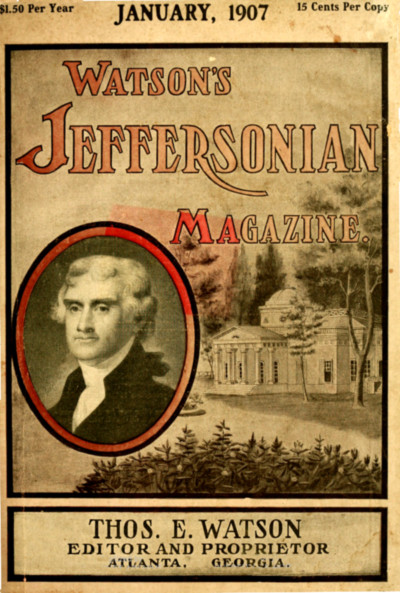
$1.50 Per YearJANUARY, 1907 15 Cents Per Copy
Watson’s
Jeffersonian
Magazine
THOS. E. WATSON
EDITOR AND PROPRIETOR
ATLANTA, GEORGIA
The Project Gutenberg EBook of Watson's Jeffersonian Magazine, by Various This eBook is for the use of anyone anywhere in the United States and most other parts of the world at no cost and with almost no restrictions whatsoever. You may copy it, give it away or re-use it under the terms of the Project Gutenberg License included with this eBook or online at www.gutenberg.org. If you are not located in the United States, you'll have to check the laws of the country where you are located before using this ebook. Title: Watson's Jeffersonian Magazine Author: Various Release Date: July 1, 2020 [EBook #62535] Language: English Character set encoding: ISO-8859-1 *** START OF THIS PROJECT GUTENBERG EBOOK WATSON'S JEFFERSONIAN MAGAZINE *** Produced by hekula03, Harry Lame and the Online Distributed Proofreading Team at https://www.pgdp.net (This book was produced from images made available by the HathiTrust Digital Library.)
Please see the Transcriber’s Notes at the end of this text.

$1.50 Per YearJANUARY, 1907 15 Cents Per Copy
Watson’s
Jeffersonian
Magazine
THOS. E. WATSON
EDITOR AND PROPRIETOR
ATLANTA, GEORGIA
THE
Meridian Life & Trust Co.
OF INDIANAPOLIS
ARTHUR JORDAN, President,
is a mutual old line legal reserve company organized and doing business under The Legal Reserve Compulsory Deposit Law of Indiana, which is acknowledged by the best Insurance Authorities to be the most complete law for the protection of the Insured ever enacted in this or any other country.
Each year the Auditor of the State is required to ascertain the net cash value of all outstanding policies with three and one-half per cent. interest thereon, and the company MUST deposit in his office Government and State Bonds, and first mortgages on real estate of double the value of the mortgage, to secure the cash value.
Economical management as shown by the following figures has placed this conservative company at the head of companies in Indiana, its home state.
Comparative statement showing amount of Insurance gained in the State of Indiana, the home of THE MERIDIAN, in 1905:
| Meridian Life | $3,005,008 |
| State Life, Ind. | 738,358 |
| Reserve Loan, Ind. | 1,223,408 |
| American Central, Ind. | 2,285,556 |
| Inter-State, Ind. | 1,392,408 |
| Penn Mutual, Pa. | 276,249 |
| Aetna Life, Conn. | 438,706 |
A POLICY IN OUR COMPANY
Will “PROTECT” your home and family.
Will “CREATE” wealth.
Will “SAVE” your estate.
Will “GIVE” you a standing of credit.
Will “PAY” off your mortgage at death.
Will “FURNISH” happiness and peace of mind in life.
Will “SUPPORT” you in old age.
Will “SOFTEN” the pangs of death.
Will “GUARANTEE” a dividend not obtained in any other company.
The Meridian Life offers this desirable protection to its policy holders at a cost worth considering.
Let us tell you more about the opportunity we offer you for a safe investment, and protection. Your name, address and age, is all that it will cost you.
SEND IT TODAY.
$1,000,000 WRITTEN DURING FIRST EIGHT MONTHS IN GEORGIA.
LIVE, ENERGETIC REPRESENTATIVES
can secure a contract that will enable them to double their income, in either Georgia or Alabama. Either all, or spare time. Write us for full particulars.
E. C. LESTER, Supt. Southeastern Agency,
600 Austell Building, Atlanta, Ga.
M. C. MORRIS, Director of Agencies, Atlanta, Ga.
Image of page
THE Publishers Failure
Places in our hands the remainder of Their Greatest Publication
Ridpath’s History of the World
9 Massive Royal Octavo Volumes, 4,000 double-column pages, 2,000 superb illustrations.
Brand New, latest edition, down to 1906, beautifully bound in half Morocco
At LESS than even DAMAGED SETS were ever sold
We will name our price only in direct letters to those sending us the Coupon below. Tear off the Coupon, write name and address plainly, and mail to us now before you forget it.
Dr. Ridpath is dead, his work is done, but his family derive an income from his history, and to print our price broadcast, for the sake of more quickly selling these few sets, would cause great injury to future sales.
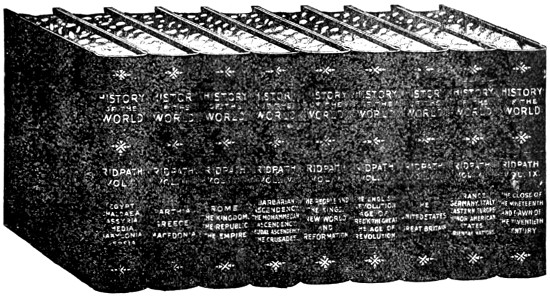
Weighs
55 lbs.
Ridpath takes you back to the dawn of history, long before the Pyramids of Egypt were built; down through the romantic, troubled times of Chaldea’s grandeur and Assyria’s magnificence; of Babylonia’s wealth and luxury; of Greek and Roman splendor; of Mohammedan culture and refinement; of French elegance and British power; to the rise of the Western world, including the complete history of the United States and all other nations down to the close of the Russia-Japan war.
Ridpath’s enviable position as an historian is due to his wonderfully beautiful style, a style no other historian has ever equaled. He pictures the great historical events as though they were happening before your eyes; he carries you with him to see the battles of old; to meet kings and queens and warriors; to sit in the Roman Senate; to march against Saladin and his dark-skinned followers; to sail the southern seas with Drake; to circumnavigate the globe with Magellan; to watch that this line of Greek spearmen work havoc with the Persian hordes on the field of Marathon; to know Napoleon as you know Roosevelt. He combines absorbing interest with supreme reliability, and makes the heroes of history real living men and women, and about them he weaves the rise and fall of empires in such a fascinating style that history becomes as absorbingly interesting as the greatest of fiction.
Ridpath’s History is strongly endorsed by Presidents Harrison, Cleveland, and McKinley, Jefferson Davis, Lew Wallace, John L. Stoddard, Bishop Vincent, Dr. Cuyler, Rabbi Hirsch, Presidents of Ann Harbor, Amherst, Brown, Dartmouth, Tufts, Trinity, Bates, Colby, Smith, Vassar, Yale, and other Colleges, and by the Great American People, 200,000 of whom own and love it.
Ridpath is generally conceded the Greatest History ever written.
$1
Brings the
Complete Set.
Balance
Small Sums
Monthly.
It is the only general history recognized as an authority.
It is so beautifully written your children will learn to love it.
You should know history in these history-making days.
This is your chance to buy for less than ever before.
You may pay in small sums monthly, if you wish.
SEND COUPON TO-DAY AND WE WILL
MAIL SAMPLE PAGES FREE
FOLD HERE, TEAR OUT, SIGN, AND MAIL
FREE
COUPON
Western
Newspaper
Association
204 Dearborn St.
Chicago, Ill.
Please mail, without
cost to me, sample pages
of Ridpath’s History con-
taining his famous “Race
Chart” in colors, map of China
and Japan, diagram of Panama
Canal, etc., and write me full par-
ticulars of your special offer to
Watson’s Jeffersonian Magazine readers
Name........................................................
Address............................................................
Image of page
HOTEL CUMBERLAND
NEW YORK
S. W. Cor. Broadway at 54th Street.
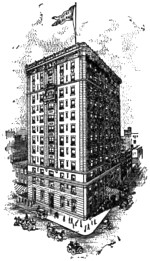
Ideal Location. Near Theatres, Shops, and Central Park. Fine Cuisine. Excellent food and reasonable Prices.
NEW, MODERN AND ABSOLUTELY FIREPROOF.
Within one minute’s walk of 6th Ave. “L” and Subway and accessible to all surface car lines. Transient rates $2.50 with Bath and up.
SEND FOR BOOKLET,
Under the Management of
HARRY P. STIMSON GEO. L. SANBORN
Hotel Touraine.
Buffalo, N. Y.
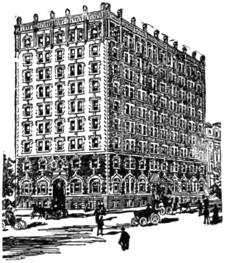
Delaware Avenue at Chippewa St.
ABSOLUTELY FIREPROOF
250 Rooms with Bath and Long Distance Telephone.
EUROPEAN PLAN—$1.50 PER DAY
up with Bath connections
Excellent Music and Grill Room.
C. N. Owen, Proprietor
SEND FOR BOOKLET
STOP AT THE
NEW PRINCESS HOTEL
WHEN AT
ATLANTIC CITY
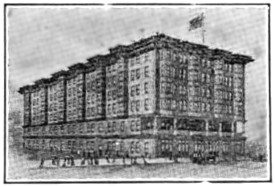
South Carolina Avenue, 200 feet from Beach.
The Princess Hotel is newly furnished throughout with rare taste, and possesses all modern requisites for convenience and comfort of the guests. Golf privileges and privilege of the Atlantic City Yacht Club extended to the guests. American and European Plan.
A BOOKLET will be gladly furnished upon application.
Rates, Running from $12.50 to $30.00 per week, according to the location of the rooms.
For any further information address
CROWELL & COLLIER
The Princess Hotel,
Atlantic City, N. J.
HOTEL NORMANDIE
BROADWAY and 38th STREET, NEW YORK
In the Heart of the City
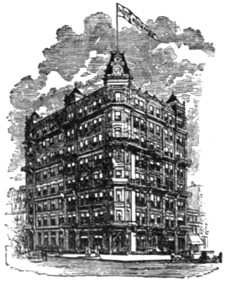
Fireproof European Plan
Single Rooms with Baths and in Suites
$1.50 per Day and Upwards
Center of Amusement and Business District
Telephone in Each Room
The Cuisine Unexcelled
Restaurant and Palm Room
Moderate Prices
SEND FOR BOOKLET.
ELMER E. ALMY, Prop.
Also, Osburn House, Rochester, N. Y.
Image of page
JAMES W. GREEN J. D. WATSON
Green &
Watson
ATTORNEYS AT LAW
THOMSON, GA.
Consulting Counsel THOS. E. WATSON.
Will practice in McDuffie and surrounding counties. Loans negotiated and Collections made on good terms.
WHEN IN
BALTIMORE
STOP AT THE
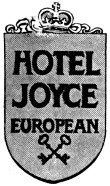
130 Rooms
Elegantly
Furnished
Unexcelled
Cuisine
Rooms
with Bath
and en Suite.
Centrally Located.
Opposite Camden Station
Main Depot B. & O. R. R.
Rates $1.00 per Day
and Upwards
SEND FOR BOOKLET
Hotel Joyce
Baltimore, Md.
A SPLENDID STORY.
—New York Times.
Jack London’s
White Fang.
Cloth, 12mo, $1.50
“Typical, graphic, tense, powerful, gripping the reader with a power that knows no breaking till the story ends. . . . Shows more gentle feeling and more charm than anything else the author has written.” —Chicago Evening Post.
Illustrated in colors from drawings by Charles Livingstone Bull, and with special cover design.
Cloth, 12mo, $1.50
THE MACMILLAN COMPANY,
PUBLISHERS,
64-66 Fifth Avenue. NEW YORK.
Image of page
Speaking of Economy
RED SEAL SHOES
Give double service
at about the same price.
For right down hard ware try our
TUF-HIDE for the whole family and

you’ll save a good slice on the shoe bill.
Sold Everywhere.
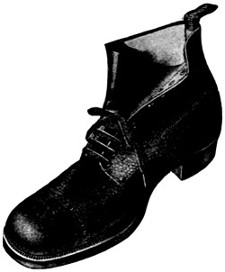
No. 36
$2.50
| No. | 36, | Men’s | $2.50 |
| No. | 112, | Boys | 2.00 |
| No. | 413, | Womens | 2.00 |
| No. | 145, | Misses | 1.75 |
J. K. Orr Shoe Co.,
Georgia
Shoemakers
Look for the
TRADE MARK
ATLANTA, GA.
Watson’s on a Postal
brings a Catalogue.
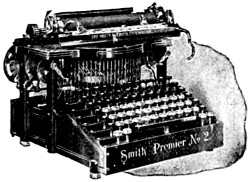
Typewriters
———— AT ————
Half Price
We have a large assortment of all standard machines, which have been slightly used, that we will sell on guarantee, viz:—
| Fay-Sho or Rem-Sho | $25 to $40 | Densmores (All Models) | $15 to $40 |
| Williams (All Models) | $20 to $40 | Smith Premiers | $20 to $60 |
| Remingtons (All Models) | $15 to $60 | Yost (All Models) | $15 to $50 |
Write for special prices on any other machine made. We have them in stock
Atlanta Typewriter Exchange
Seventy-One North Pryor
Street
References: H. M. Ashe Co., Central Bank & Trust Corporation, R. G. Dun & Co.
Image of page
What Will You Do During the Xmas Holidays?
You Are Not In It==Without a Gun.

Anyone Can Afford to Own a Good Gun
| Remington 1 Hammer Gun | $20.00 | Sauer, Hammerless | $65.00 |
| Remington K Hammerless Gun | 23.50 | Stevens No. 325, Hammerless | 20.00 |
| Remington KED Hammerless Gun | 31.50 | 1890 Winchester Repeater, 16 shot, 22 cal. | 10.26 |
| Remington 1 Automatic Gun | 30.00 | 1892 Winchester Repeater, 32, 38 or 44 | 12.50 |
| Remington 2 Automatic Gun | 37.50 | 1903 Winchester Automatic, 22 cal. | 16.04 |
| Parker V-H Hammerless | 37.50 | 1906 Winchester Repeater, 22 short | 8.50 |
| Parker P-H Hammerless | 48.50 | 1902 Winchester Single Shot | 3.50 |
| Fox No. A, Hammerless | 37.50 | 1903 Winchester Single Shot, Thumb Trigger | 3.00 |
| Ithaca F, Hammerless | 21.50 | 1904 Winchester Single Shot, extra heavy | 4.75 |
| Ithaca 1, Hammerless | 27.50 | No. 15 Hamilton | 1.50 |
| Ithaca 2, Hammerless | 45.00 | No. 19 Hamilton | 2.00 |
| Winchester Take Down | 19.44 | Savage, Jr. | 4.00 |
| Winchester Solid Frame | 18.00 | Savage 30-30 | 18.00 |
| Winchester Riot | 18.00 | ||
In presenting this list we only attempt to partially list the large line of
Guns, Ammunition, Hunting
Suits and Sporting Goods,
carried in our stock. We carry all the leading lines.
We guarantee satisfaction to every customer or your money cheerfully refunded
Mail Orders Given Prompt Attention.
KING HARDWARE COMPANY,
53 Peachtree St., ATLANTA, GA.
Image of page
“Yes, do send me a book. . . . Not a bargain book, bought from a haberdasher, but a beautiful book, a book to caress—peculiar, distinctive, individual: A book that hath first caught your eye and then pleased your fancy, written by an author with a tender whim, all right out of his heart. We will read it together in the gloaming, and when the gathering dusk doth blur the page, we’ll sit with hearts too full for speech and think it over.”
Dorothy Wordsworth to Coleridge.
Such a book is
“ANN BOYD” by Will N. Harbin
and
“THE LIFE OF JACKSON” by Mr. Watson
Both begin in this number of Watson’s Jeffersonian Magazine as serials.
IF YOU ARE INTERESTED
IN
Texas Investments
OF ANY KIND OR SIZE
Address
E. C. Robertson,
Kiam Building, Houston, Texas.
Genuine Gold Specimens
Free
Samples of gold ore direct from the mine, sent free. We have a limited amount of stock of an exceptionally attractive and promising Nevada Gold Mine. The company is operated by reliable, responsible and honorable men, whose references are customers of years’ standing, in all parts of the country. This stock is not manipulated by speculators or stock jobbers. It is offered now at a very low price, for rapid development purposes, and will sell at par soon, we believe, going higher as the mine develops. If you want to make money rapidly we advise you to purchase and hold this stock for large and regularly paid dividends. The stock of one Nevada Gold Mine increased 50 per cent in one day; 18 Nevada stocks during October 1906 increased in value Twenty-One Million Dollars. If you like a square deal and to be in the best of company, you will send us your address at once for full particulars.
MANHATTAN INVESTMENT CO.
125 EAST 23D STREET, N. Y.
JEWELRY for CHRISTMAS
Give presents that will be appreciated. Good jewelry satisfies all—sweethearts, wives, mothers, fathers, sisters, brothers or friends. Examine my magnificent brand-new stock. I help you select. Out-of-town orders carefully attended to. Satisfaction guaranteed.
J. C. MELLICHAMP, 70 Whitehall Street
“ATLANTA’S ONLY POPULAR
PRICE JEWELRY STORE”
NEXT DOOR CHAMBERLAIN-
JOHNSON-DU BOSE CO.
Image of page
“Books are the food of youth, the delight of old age; the ornament of prosperity, the refuge and comfort of adversity; a delight at home, and no hindrance abroad; companions by night, in traveling, in the country.”—Cicero.
THOS. E. WATSON’S “STORY OF FRANCE”
In two beautiful volumes for only
eight subscriptions to
WATSON’S JEFFERSONIAN MAGAZINE.
Either Mr. Watson’s Life of Napoleon or Jefferson
for only five subscriptions to
WATSON’S JEFFERSONIAN MAGAZINE.
BETHANY,
A true and thrilling story of the Old South and Civil War,
by Mr. Watson, for only four subscriptions.
We Save You Magazine Money.
Club Rates. Combinations.
Lord Bacon has said that “Reading makes a full man, conversation a ready man, and writing an exact man.” If you want to be full—not physically, but mentally—full of the best information, you should read the best magazine literature. Foremost among the magazines is
The Metropolitan Magazine.
A beautifully illustrated monthly. A well appointed magazine in every department. There’s something in it each month to interest the reader. Are you a subscriber? Why not become one?
Below you will find some very attractive offers to which we direct your attention:
| The Metropolitan Magazine |
Class A. | Class B. | |||
| With one Class A | $1.65 | American Magazine | $1.00 | Automobile | $2.00 |
| With two Class A | 2.30 | American Boy | 1.00 | Motorway | 2.00 |
| With two Class C | 1.70 | American Inventor | 1.00 | Out Door News | 2.00 |
| With one Class C | 2.00 | American Primary Teacher | 1.00 | Outing | 3.00 |
| and one Class A | Baby | 1.00 | Reader | 3.00 | |
| With two Class B | 3.70 | Cosmopolitan | 1.00 | Review of Reviews | 3.00 |
| With one Class A | 3.00 | Farming | 1.00 | Trained Nurse | 2.00 |
| and one Class B | Garden | 1.00 | Class C. | ||
| Metropolitan Magazine |
3.00 | Good Housekeeping | 1.00 | ||
| Home Magazine | 1.00 | American Messenger | $ .50 | ||
| Kindergarten Magazine | 1.00 | Amer. Poul. J. | .50 | ||
| Review of Reviews or | Little Folks | 1.00 | Arkansaw Traveler | .50 | |
| one Class B | Physical Culture | 1.00 | Boys and Girls | .50 | |
| Woman’s Home Com- | Pilgrim | 1.00 | Housekeeper | .50 | |
| panion or one Class A | Suburban Life | 1.50 | Ladies World | .50 | |
| Metropolitan | 3.65 | Success | 1.00 | McCall & Patton | .50 |
| Worlds Work | Times Magazine | 1.50 | Modern Women | .50 | |
| Delineator | Woman’s Home Companion | 1.00 | Modern Priscila | .50 | |
| McClure’s | World To-Day | 1.50 | New Idea Woman’s Magazine | .50 | |
Write for our Catalog.
Watson’s Jeffersonian may be added to any Club for $1.50 extra. Address all orders to
Walker’s Southern Magazine Agency,
212 Leonard Building, Augusta, Georgia.
Image of page
To Our Readers.
The advertising columns of this Magazine will carry into your homes only the announcements of those whom we have reason to believe do a legitimate and honorable business. Almost to the man, our advertisers were prompted to place their contracts with us, not with a single eye to the returns which they hoped to get as a result of using our space, but because they are broadminded men who believe in this Magazine as you do, enthusiastically predicting and welcoming Mr. Watson’s success.
They with others, whose advertisements will appear in our next issue, will continue to extend this evidence of their sincerity and thereby guarantee Watson’s Jeffersonian Magazine a financial success if you as our clientele only patronize them to that extent whereby they can carry their advertisement with us without doing so at a total loss. We are careful as to the character of the advertisements which we carry, which necessarily restricts our revenue from this source, so in your appreciation of this fact we ask you as our friends to so far as possible patronize our advertising friends and in doing so, be careful to mention this Magazine so they may know our people and know they are appreciative.
Image of page
SINCE the time of President Jefferson’s Administration, it has been sufficient guarantee of the quality of an article to know it was bought at GALT’S:: :::: :::: :

GALT & BRO.
ESTABLISHED OVER A CENTURY
Jewellers, Silversmiths, Stationers
1107 PENNSYLVANIA AVENUE
WASHINGTON, D. C.
Christmas
Jewelry
We Guarantee Satisfaction
in our
Service by Mail Department
Give Worth-While Gifts; not necessarily expensive, but good and of permanent
value. Here’s a little bunch of suggestions;
| BROOCHES, From $1.50 up |
Plain gold, enameled, pearl-set, jeweled, hand engraved. |
| SIGNET RINGS, Children’s $1.50 to $5 Women’s $5 to $10 |
Very much sought, splendid for engraved monograms. |
| BARETTES, From $1 to $25 Jeweled $25 to $50 |
The smartest new hair-clasps and veil-pins. |
| SHIRT-WAIST PINS, Silver $1 to $4 Gold $5 to $40 |
Dainty and practical fastenings, more popular than ever. |
| GOLD-BEADS, $6.50 to $20 |
Always stylish and ornaments of real beauty. |
| COMBS, $1.50 to $75 |
The smart coiffure necessitates these; we have some beauties. |
| HAT PINS, Gold $2.50 to $35 Silver 35c to $2.60 |
We have right now the prettiest and largest line we’ve ever carried. |
| BRACELETS, $1.50 to $800 |
Something every woman wants. All styles. Very smart. |
Suggestions Merely. Write to-day for our Catalog W, a splendid book which will be a dependable guide to your holiday shopping. It is full of PICTURES and PRICES. Covers our entire stock of
SILVERWARE, CRYSTAL, PRECIOUS STONES, CHINA CLOCKS, WATCHES, ART WARES,
ORIENTAL BRIC-A-BRAC.
A request brings you the Catalog by return post.
MAIER and BERKELE
The South’s Leading Jewelers
ATLANTA,-GEORGIA
Image of page
BOYS’ INDUSTRIAL SCHOOL,
ROME, GEORGIA.
FOUNDED BY MARTHA BERRY.
THE ONLY SCHOOL IN THE SOUTH FOR BOYS FROM THE COUNTRY EXCLUSIVELY.
NO BOY FROM THE CITY WILL BE ACCEPTED.
Expenses for Board, Tuition and Plain Washing for term of sixteen weeks are $25.50—just one-half the actual cost to the school. The balance due for the expenses of each student is raised by the personal efforts of the founder of the school.
There are now 125 students in attendance, representing twenty-four counties in Georgia. Many of these boys would have no other opportunity to obtain an education.
Here is a golden opportunity for the people of Georgia to help develop the manhood, the citizenship, the sterling Christian Character of the most worthy boys in the State.
$51.00 pays the deficit on one student one year.
$25.50 pays the deficit on one student one term.
WILL YOU NOT AID US IN THIS IMPORTANT WORK? Contributions, large or small, gratefully received.
Address all communications to
MISS MARTHA BERRY, Rome, Ga.
1879——————1906
GEORGIA MILITARY COLLEGE
A UNIVERSITY OF GEORGIA PREPARATORY SCHOOL
MILLEDGEVILLE, GA.
THREE COURSES: Classical, Scientific, Commercial; Music and Art. Honest work done by teachers. Exacted of Students.
GOVERNMENT: Military, after West Point Model. U. S. Army Officer, Commandant of Cadets and Instructor in Military Science, French and Spanish. Military Equipment furnished by U. S. Government.
EXPENSES: Total cost for year of 38 weeks, $150.00. Includes Board and Laundry, two Uniforms. Books from $5.00 to $10.00. This school brings an Education within the reach of the poor boy.
OUR AIM: The complete training of the boy.
Twenty-Seventh Session.
Opened September 4th, 1906.
For New Illustrated Catalogue, Address,
W. E. REYNOLDS, A. M., President, Milledgeville, Ga.
Image of page
The McDuffie Bank
A STATE BANK OF LOANS AND DISCOUNTS.
Thomson, Ga.
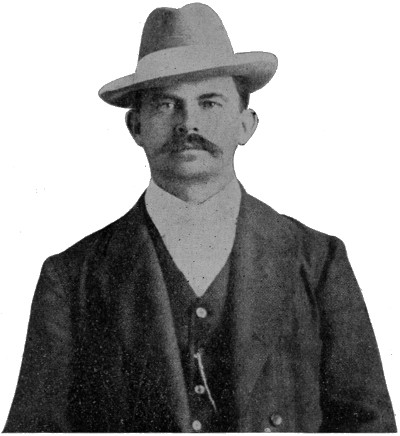
J. F. WATSON. President.
H. T. CLARY,
Vice-President.
W. S. LAZENBY,
Cashier.
J. GLENN STOVALL,
Attorney.
Capital Stock, $25,000.00.
MODERN EQUIPMENT, CONSERVATIVE MANAGEMENT,
COURTEOUS TREATMENT, ACCOUNTS SOLICITED.
DIRECTORS:
J. F. Watson, H. T. Clary,
W. A. Watson, O. S. Lee, B. T. Bussey,
Thos. E. Watson,
J. C. Fanning, W. R. Hadley, J. Durham Watson,
W. S. Lazenby, J. Glenn Stovall.
Image of page
A Request.
Watson’s Jeffersonian Magazine stands for all that is best in the life of the people and the future of the republic. It will advocate those principles for which its editor has so long fought. It is Mr. Watson’s unselfish ambition to establish this Magazine in the minds, hearts and thoughts of our people; to make it a power for the right against the wrong and to make it a factor in moulding the minds of our young manhood and womanhood for the future.
OUR REQUEST.
If you believe in the principles which this Magazine represents. If you would see it succeed, First, read it, every department. Then talk Watson’s Jeffersonian Magazine enthusiastically with every one with whom you come in contact, make up your mind to send at least five (5) yearly subscriptions before our next issue is out, and send them. You will find this an easy task if you will make it a point to call on those whom you know to believe in justice and freedom.
It is impossible to portray in words our appreciation to the many hundreds who have more than granted this request already. We can only predict greater results from them in the near future, which bespeaks our absolute confidence in their unselfish devotion to a cause which has had more than one martyr.
Image of page
The National Sanitary Felt Mattress
Is Superior to the Best Hair Mattress. Noted for its Elasticity, Durability and Comfort.
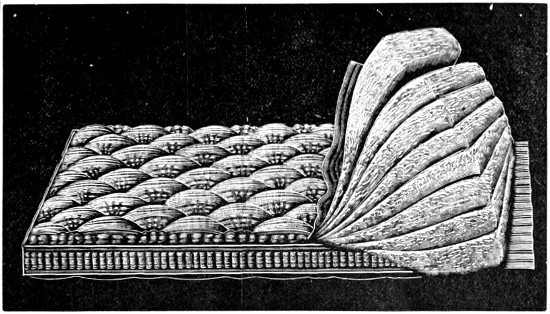
Is as elastic as a feather bed. Is conducive alike to health and repose. Is manufactured from best Staple Cotton woven into layers of Felt by special designed machinery.
OUR GUARANTEE:
Give this mattress a 60-day trial and if it does not fulfill all the conditions of our guarantee, return it to the dealer (if the tick is clean) and your money will be refunded.
The
FAMOUS “FOUR HUNDRED” SPRING
Manufactured by us Exclusively.
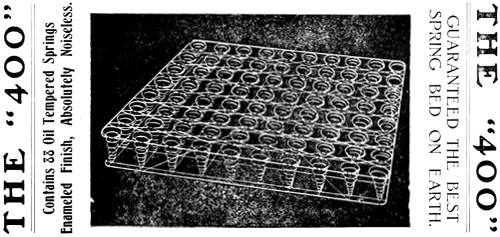
Gholstin-Cunningham Spring Bed Co.
Manufacturers, Atlanta, Georgia.
THE “400”
Contains 88 Oil Tempered Springs
Enameled Finish, Absolutely Noiseless.
GUARANTEED THE BEST
SPRING BED ON EARTH.
THE “400”
Image of page
AN EARNEST REQUEST
Made to All Editors Who Believe in Fair Play.
Gentlemen:
By as foul a deal as was ever made, “Watson’s Magazine,” of New York, has been taken out of my hands.
The written Contract, upon which I relied, has been shamelessly set aside.
A man whom I selected as my personal representative, and placed in the office at a fine salary, which has always been paid, betrayed me.
He and Col. Mann formed a new company, seized the Magazine under legal forms, and are now running it for themselves.
Col. Mann of Town Topics is Editor-in-Chief.
C. Q. DeFrance is Associate Editor and Business Manager.
They have flooded the country with a lying circular letter, intended to deceive the people as to the cause of my withdrawal.
Col. Mann’s name is not even mentioned in this circular.
Almost every statement made about me in that circular is a base, malicious falsehood. They are simply trying to hide their own guilt in a cloud of slanderous fabrications.
In the November number of “Watson’s Magazine” appeared an article with the title of “Explanatory.” It should have been labelled “Defamatory.”
It reeks with venom and lies. Col. Mann wrote part of it, and DeFrance wrote the balance.
These publications of theirs do me the rankest injustice.
I have no mailing list of the magazine which bears my name, and never had one.
Consequently, I am at present powerless to reach the subscribers and readers of “Watson’s Magazine.” I have no way of letting them know the real state of the case.
On account of this very serious disadvantage, I make this appeal to you:
Pray, inform your readers that I am now publishing the genuine Watson’s Jeffersonian Magazine in Atlanta, Ga., of which this is the first number.
And that in the “Foreword” of this number is given a full history of my connection with the New York Magazine, together with my reasons for quitting.
In the interest of Fair Play, I beg that you do me this favor.
It is one which, under similar circumstances you would not ask of me in vain.
THOS. E. WATSON.
THOS. E. WATSON,
Editor and Proprietor.
Vol. I.
JANUARY, 1907
No. 1
| THE BODY-SNATCHERS. Frontispiece. | A. K. Taylor | |
| FOREWORD. | Thos. E. Watson | 3 |
| Illustrated by W. Gordon Nye. | ||
| EDITORIALS. | Thos. E. Watson | 29 |
| Illustrated by W. Gordon Nye and A. K. Taylor. | ||
| The New Year—Mr. Bryan and Mr. Watson.—Socialism at War With Love of Home and Country—National Finance Run Mad—As to Hearst—Ornamental Flag-Poles—Eastern Insurance Companies—Abraham Lincoln’s Silly Biographers—Shoot, Luke, or Give Up the Gun—The Dismissal of those Negro Troops—The Proposed Ship Subsidy—An Appeal to Patriotism—Love Licks—After All, It Depends Upon Who Owns the Ox. | ||
| YOU OLD CONFEDS. Poem. | William E. Fowler | 50 |
| From The Confederate Veteran. | ||
| A SURVEY OF THE WORLD. | Charles J. Bayne | 51 |
| Illustrated with Portraits and Cartoons. | ||
| ANN BOYD. Serial Story. | Will N. Harben | 73 |
| Illustrated by W. Gordon Nye. | ||
| TWELFTH NIGHT. Poem. | Charles J. Bayne | 89 |
| Illustrated, from Painting by Jan Steen. | ||
| LIFE AND TIMES OF ANDREW JACKSON | Thos. E. Watson | 91 |
| Illustrated by W. Gordon Nye. | ||
| THE BLUE CHAMBER. Short Story. | Prosper Merimee | 105 |
| THE LAKE OF THE DISMAL SWAMP. A Legend. | Jeannette Holly | 114 |
| EDUCATIONAL DEPARTMENT. | Thos. E. Watson | 117 |
| Illustrated by W. Gordon Nye. | ||
| BOOK REVIEWS. | Thos. E. Watson | 123 |
| Illustrated. | ||
| A PEEP INTO THE WEEKLY PAPERS. | 125 | |
| LETTERS FROM THE PEOPLE. | 132 | |
| RETURNING THANKS TO MY FRIENDS. | Thos. E. Watson | 141 |
| WITTY FLINGS BY THE PARAGRAPHERS. | 148 | |
Published Monthly by
THOS. E. WATSON
$1.50 Per Year.
Atlanta, Ga.
15 Cents Per Copy
Application made for entry as second class matter at Atlanta Ga. Post Office.
[2]
[3]
Watson’s
Jeffersonian Magazine.
THOS. E. WATSON,
Editor and Proprietor.
Vol. I.
JANUARY, 1907
No. 1
 Before
me lies a Thing, bearing on its cover the legend,
Before
me lies a Thing, bearing on its cover the legend,
“Watson’s Magazine.”
The familiar emblem, the Liberty Bell, is in the center of the space, and below is the address of
“Watson’s Magazine Company,”
121 West 42nd Street, New York.
Opening this Thing and scanning the Table of Contents, I note the absence of the name of Mr. Watson, former Editor-in-Chief.
He’s out.
Nor do I see the name of the former Managing Editor, Mr. Duffy.
He’s out, also.
C. Q. DeFrance is still on deck, however, and Ted Flaacke is still Advertising Manager—with no advertisements to manage.
Then comes a statement of the Contents of the November number. First the old familiar word, “Editorials,” meets my eyes. But the name of the writer is not given.
It used to be Mr. Watson. Who is it now?
The Table of Contents does not state.
The Editor is a Man of Mystery. Was he ashamed of his Editorials, or were the Editorials ashamed of him? Deponent sayeth not—because he doesn’t know.
Everybody else’s name is given, save that of the only man whose name there was any special reason for giving—to wit, The Editor.
Is THIS the way they send you into the world, MY CHILD? Offspring of my hand, my heart and my soul—Benjamin of my old age! Is THIS the orphanage upon which you have fallen?
Glancing down the list of writers who have contributed to this November number, I am startled to find the name of Thos. E. Watson.
Who is he, anyhow? Isn’t he the man whom Colonel Mann and DeFrance have been slandering through the newspapers? Why put his name into this pot?
[4]
Curious to see what Mr. Watson may have written for the Thing, I follow the page reference (103) and find the familiar headline “Educational Department.” This department was my own creation, primarily intended for the instruction of the younger members of the family. Under the headline of “Educational Department,” the Thing puts a list of books.
Some boy wrote to me last winter asking me to name one hundred books which would be useful to the general reader. I made out the list, last February, and mailed it to New York.
In their quandary of dismissing Watson, the man, and holding on to Watson, the Reputation, they fished that list of books out of the waste-basket and published it. They signed my name to it.
That’s the only item in the Thing’s “Educational Department.”
Pitiful!
At the very time when they are slandering me in the newspapers, and denying to me any share in the Magazine which my unpaid labor built up, Mann and DeFrance have the cynical indecency to continue to use my name as a writer for their magazine.
Turning to “Letters From the People,” a Department which owes its creation to me, I find letters praising “Watson’s Magazine.”
The dates are not given. These would have disclosed the fact that the letters were written before the severance of my connection with the Magazine. The writers were my friends, and by their letters they had meant to encourage me in my work.
The cover of the Magazine bears the name
“Watson’s Magazine Company.”
The two individuals who compose this “Company” are Col. W. D. Mann and C. Q. DeFrance—a very precious “Company.”
Of my Magazine, Mann took half, and DeFrance took half.
By what right?
Concede that Col. Mann was entitled to grab half of the Magazine because of the money which he had lost through the stupid mismanagement of the Business Department—where did DeFrance get his right to the other half? He has never done a lick of work for the Magazine that wasn’t paid for at full price.
Where, then, was HIS right to seize, under legal form, one half of the Magazine?
I called him from a very modest position in Nebraska, and put him in the office as my personal and political representative. Starting him at $40 per week, I soon advanced him to $60 per week—a higher salary than he had ever been paid, by far. I trusted him, implicitly. To the last moment, I relied upon him, absolutely.
[5]
And he betrayed me. Often have I, like other men, experienced ingratitude; sometimes perfidy—but never have I been stung by such venomous and unexpected treachery as that of DeFrance.
Let it pass.
***
There is another deceptive inscription upon the cover of the November number of the spurious “Watson’s Magazine.” It is the address,
121 West 42 Street.
That is NOT the true address which should be used now. Colonel Mann has taken the spurious “Watson’s” into the quarters of his Town Topics and Smart Set. You have perhaps heard of Town Topics. Also of Smart Set. And a mighty smart set it is, too.
Hereafter, you might as well address all communications intended for the spurious “Watson’s” in care of Col. Mann’s Town Topics.
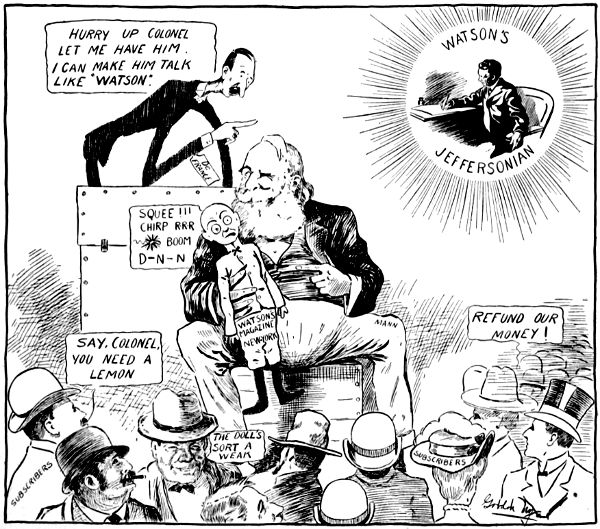
THE FAKIR AND THE MANIKIN. COL. MANN AND DEFRANCE VENTRILOQUISING THE BOGUS “WATSON’S MAGAZINE,” NEW YORK.
[6]
Or, if you prefer, in care of Col. Mann’s Smart Set.
Last March the blustering old scamp who rolls around beneath the name of Colonel W. D. Mann, wanted to remove the genuine “Watson’s Magazine” from 42nd Street over to the Smart Set den.
I declined to let him do it. At that time, DeFrance was still true to me, and he took the same view of the matter. So anxious was he not to get mired up in Town Topics mud that he telegraphed me to stand out against Col. Mann and not allow him to make the removal.
Tray, the faithful, wanted to keep out of bad company. Tray, the unfaithful, has now, of his own free will, got into the bad company which he then avoided.
Watch out, Tray.
***
The first article in the November number of the spurious “Watson’s” is entitled “Explanatory.” Most of it had already appeared in Colonel Mann’s Town Topics. The rest of it bears the earmark of DeFrance.
“Explanatory” was prepared by the present Editors of the New York “Watson’s Magazine”—Col. Mann and DeFrance. Well aware of the fact that the Public would not patronize a Reform magazine edited by such a creature as himself, Col. Mann has rushed into the newspapers with a declaration that he never saw or heard of “Explanatory” until after its appearance in the November “Watson’s.”
What a shameless falsehood!
Col. Mann and DeFrance fixed up that “Explanatory” mess, and Mr. Gordon Nye, the artist, was commissioned to take the “Proofs” to Col. Mann for correction.
Mr. Nye, who is now living with me, assures me that he carried these “Proofs” to Col. Mann’s house on 72nd Street, that Col. Mann read and corrected the “Proofs,” and that he made certain alterations in the article.
Then Mr. Nye took the Proofs of “Explanatory” back to DeFrance, and delivered to that person the orders of the real Editor-in-Chief of the New York “Watson’s Magazine.”
For the real Editor-in-Chief of the bogus “Watson’s Magazine” is Col. Mann, Editor of Town Topics and Smart Set.
Nice Editor-in-Chief for a reform magazine, isn’t he?
***
I am going to give, once for all, a simple statement of the whole transaction, and then I will try to forget it, in higher, nobler work. Nothing is a more thankless task than the narration of the events leading to such a climax as this.
***
After the national election of 1904, I went to New York to hold a conference with our National Chairman, Mr. Ferriss, and with other men[7] who had been prominently identified with our side of the campaign. The conference was held at the office of Mr. Palliser who had been acting manager of the campaign in New York. I also wished to confer with Mr. Brisbane, who had long been urging me to join him in editing the Hearst papers. He had repeatedly written and telegraphed. A definite offer of $10,000 to edit Mr. Hearst’s morning paper, the American, had been made. If I had been ready to accept a thousand dollars per month, there is no doubt that it would have been paid. But while I was powerfully inclined to cooperate with Brisbane, I did not like to be swallowed up in Hearst. Besides, to edit a daily paper necessitated my residence in New York, whereas my interests, as well as local attachments, were too great to make the removal one to which I could readily gain my own consent.
While in this uncertain state of mind, Colonel Mann burst in upon me, at my hotel, in all the glory and pomposity of white whiskers, white hair, wine-colored face, spotted waistcoat, gold-headed cane, baywindow belly, eyes that looked like hard boiled eggs, and a voice thick with high-living and constant use.
As I may have remarked before, he looked just like a picture taken out of a child’s colored picture book.
While he talked to me, I sat there trying to make up my mind as to which he resembled most, an idealized portrayal of Santa Claus, or of John Bull, or of John Barlycorn. I finally decided that he would do for a composite photograph of all three.
This funny looking old chap I had never heard of before. His Town Topics I had never seen—didn’t know of its existence.
He introduced the purpose of his visit by saying that he had heard of Mr. Hearst’s proposition to me. If I had committed myself to Mr. Hearst, he had no more to say; otherwise he had a proposition to submit. Told that I was free, he outlined his project.
He would finance a great national magazine, if I would edit the same.
Casually and lightly, he mentioned $100,000 as the amount he would risk on the venture.
With that amount he had made Smart Set “go,” and he did not doubt that a like amount would make another magazine “go.”
Everything must be in my name—corporation, magazine, signboard, tail-piece and all. Not being particularly ashamed of my name, I had no objection to this.
Inasmuch as I belonged to a political party which had just demonstrated to its own satisfaction that it was the most unpopular political conglomeration on the face of the earth, I imagined that such a fine looking old personage as Col. Mann—calling himself a Democrat—was afraid he would deface his own reputation by associating with a political[8] outcast, like me, and that, therefore, while willing to pocket all the money the magazine might earn, he didn’t want his name to appear.
Considerate old buck, he wouldn’t hurt my feelings by using the plebeian word “salary.” The word “compensation” was likewise too vulgar to be applied to my monthly and yearly stipend. With a rich roll in his deep bass voice, he mentioned the “honorarium” which I was to receive for my work. My “honorarium” was to be $500 per month. Besides, my traveling expenses to and from New York were to be paid.
He emphasized the fact that, under his proposition, I would not have to live in New York. A monthly visit was contemplated, but never made compulsory, save upon the summons of the Board of Directors.
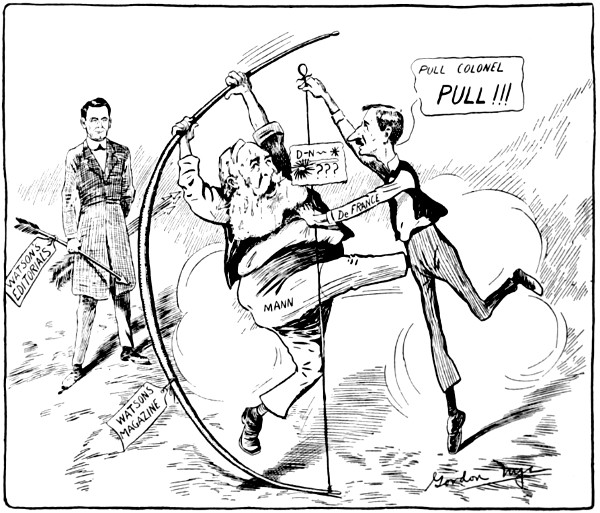
EVEN IF THEY COULD BEND THE BOW, THEY HAVE NOT THE ARROWS.
For several reasons, Col. Mann’s proposition impressed me favorably. First, it preserved my identity. Second, it left me free to say just what I pleased. Third, it did not take me away from my home—to which I am tenderly attached. My ancestors helped to clear the primeval forest off[9] these old red hills of Georgia, and I love them, as I could love no other land under the sun.
For these several reasons, I practically decided, then and there, to accept Col. Mann’s proposition. He saw this—being a shrewd old fellow—and did his utmost to get me to his office, in order that the contract might be drawn up and signed before I left New York.
But I was not quite so much of a greenhorn as all that. I refused to close the deal, then, but asked him to send his proposition, in writing, to me in Georgia.
Returning home, I fell sick. Overwork, mental strain, sleeplessness, worry, etc., stretched me out. Unable to return to New York after Col. Mann had mailed me the proposed contract, I decided to place myself in the hands of a friend.
***
Dr. John H. Girdner, a native of Greenville, Tenn., had been one of my most prominent and active supporters in New York during the campaign of 1904. Previously he had been widely known as the political lieutenant and confidential friend of Mr. Bryan. Previous to that, he was well known as the family physician and political follower of Mr. Cleveland.
Having long been a resident of New York, Dr. Girdner seemed to me the ideal man to represent me in the negotiations with Col. Mann.
The Doctor accepted the trust, and finally sent me the contract for signature. Some alterations in it had been made. One of these, and the most important, was the creation of the office of Associate Editor, at a salary of “not exceeding” $4,000 per year. This office was to be personal to me. That is, I could make and unmake Associate Editors at will, provided Col. Mann did not have to pay them more than $4,000 per year.
In communicating this feature of the contract to me, Dr. Girdner signified his willingness to fill that position. It gave me great pleasure to appoint him. Nothing was ever said by the Doctor or myself concerning the amount that he was to receive, but he assumed, quite correctly, that it would be proper for him to draw the full $4,000, and he began to do so.
Not once did Dr. Girdner intimate to me that a business connection with Col. Mann would disgrace me. How could I suppose that such a connection was undesirable when Dr. Girdner himself was willing to make it? I am sure that the Doctor did not know what all the world now knows.
It cost the Colliers $75,000 and months of hard work, to gather up the evidence which proved what kind of a person Col. Mann is. How could Dr. Girdner know, IN 1904, those facts which it cost Collier $75,000 to prove IN 1905? The Doctor knew no more about it than I did—or he would have warned me to keep out, and would have kept out himself.
[10]
When I went to New York in the mid-winter of 1904-5 to organize the Company, Col. Mann opened another leaf in his book.
He presented a paper containing stock subscriptions to his Syndicate, and asked me to “come in.” I was fool enough to sign for $2,500.
Had the old scamp not over-reached himself, he would have got me for $2,500, besides the $9,000 hereinafter mentioned. But he did overreach himself. He had his man, Daniels, to present another paper for me to sign. It was the lease of the house we were to occupy, 121 West 42nd Street. The amount was $1,200.
Then, I smelt the rat. I not only refused to sign the lease, but, acting under a natural revulsion of feeling, I cancelled my subscription to the Syndicate. Had Col. Mann said a single word against my doing so, I would have cancelled the whole contract—for the suspicion had then crept into my mind that he was—what I now know him to be—A GRAND OLD RASCAL.
***
Why, then, did I go on with the Magazine?
Because I was fastened. Because I had publicly pledged my word. Because the contract gave me complete control of the Magazine, therefore Col. Mann could not hurt it. Me he could hurt; me he did hurt, but the Magazine was, is now, and ever shall be, above and beyond his reach. Thank God!
The soul of the Magazine was the breath of life which Jehovah breathed into me; and Col. Mann can no more defile it by his touch than he can defile me.
***
I commenced working industriously for the Magazine in December 1904. Hundreds of letters were mailed from my house every month. Hundreds of subscribers enrolled themselves and paid their money in advance of the publication. I paid my own assistants, paid the postage, worked for nothing. It wasn’t the money that I was after. Col. Mann saw that, and took every advantage of it.
Not a cent of the small sum that was paid me came out of his pocket. I am glad to be able to say so.
But while money-making was not my purpose, I could not contemplate with any satisfaction the prospect of never being able to get anything for my labor. The Magazine was bearing upon me heavily. The contract only asked 3,000 words per month of me. After the first few numbers, my task was never less than about 20,000 words
All this work I did with my own hand. Mr. Duffy, the Managing Editor, had a stenographer. Mr. Flaacke, Advertising Manager, had a stenographer; Mr. DeFrance, Business Manager, had a stenographer. I am not sure about Mr. Hoffman and the office boy, Robert, but I guess[11] they had one too. The Editor-in-Chief was the only member of the staff who had to do his own work.
Finally, the toil became so irksome—especially during the Georgia campaign of 1906, when Everybody and his Uncle and his Aunt were jumping on me—that I begged DeFrance to allow me six dollars per week for a stenographer. He did so for several weeks and then quit. In ceasing to help me to this pitiful extent, he gave me neither excuse nor explanation.
He himself was all the while drawing his $60 per week, for dictating to a fifteen-dollar-per-week stenographer.
***
“Explanatory” alleges that I usurped authority, and began to discharge employes as though the Magazine were my personal property.
“Explanatory” says that, unfortunately, I was allowed to have my way in a great many business matters.
The new Editors, Mann and DeFrance, give no specifications.
I will give some.
Into the very first number of the Magazine, Col. Mann inserted a full page advertisement of some of his nasty “Smart Set” books. When I saw that advertisement, which had been slipped into the magazine without my knowledge, Ted Flaacke, Advertising Manager, was summoned to my room, and told that there wasn’t money enough in New York to buy space in my Magazine for prurient literature of that sort.
I peremptorily demanded that the filthy thing be kept out, and it was kept out. It is due Mr. Flaacke to say, that he, himself, had known nothing of the ad. until the magazine was out.
This was the beginning of Col. Mann’s displeasure. He realized that he could never make a tool of me—as he is now making of DeFrance.
The Titles of some of those books are as follows:
“An Eclipse of Virtue,”
“Margaret’s Misadventure,”
“Naughty Elizabeth,”
“Sweet Sin,”
“The Ashes of Desire,”
“An Unspeakable Siren,” etc., etc.
Now, it may be that these books are not so bad as their names would indicate—I have never read them—but Col. Mann meant by these titles, to cater to the diseased taste for erotic literature. Hence HE SLIPPED THE AD. IN, without notice to me or to Ted Flaacke. That ad., in our very first number, hurt the magazine seriously. I felt that Col. Mann had no right to degrade the Magazine by making it a distributor of vile books, hence my positive instructions to Mr. Flaacke. In justice to this gentleman, I should say that he agreed with me fully.
[12]
Again: Col. Mann placed the Business Management in the hands of a young coal-dealer who knew nothing whatever about Circulation Management, nor about Business Management of that kind. He was a most amiable young gentleman and perfectly honest. I liked him personally, very much. But, unfortunately, he was addicted to the use of intoxicating liquors—even during business hours—and frequently attempted to perform the duties when too much inebriated to do so. Dr. Girdner first called my attention to this, and then DeFrance. Our business affairs soon suffered so much from the young man’s infirmity, that both Dr. Girdner and DeFrance suggested that we make a change. I took the matter up with Col. Mann, who had himself began to find fault with the young man, and the result was that he was requested to resign.
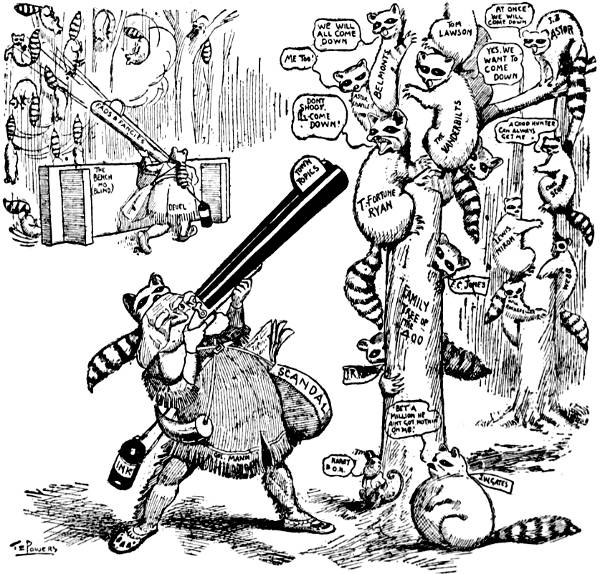
CROCKETT MANN AND THE SOCIETY COONS.
[13]
DeFrance had wanted the young man’s place, and he got it, with an increase of salary. It was at my instance that DeFrance was thus advanced.
***
Every change made by me was made in the interest of economy, and resulted in benefit.
I wanted to make other changes, for the same reason.
We paid Mr. Flaacke in salary and expense account, about $5,000 per year, and never got advertising enough to pay the bill. I wanted to stop that nonsense, and to put Mr. Flaacke on the commission basis.
I shouldn’t wonder if Col. Mann has, himself, now made that very change.
The Managing Editor was getting $50 per week for doing work which his assistant, Mr. Hoffman, could, as I thought, do as well. I wanted to put the work on Mr. Hoffman, and save the larger salary.
I note with interest that Col. Mann has, himself, made that very change.
Thus THEY, THEMSELVES, VINDICATE ME, unintentionally, from the accusations they make.
Col. Mann approved every change I made while I was in charge, and he now makes the other changes for which I contended.
***
When Edgerton went out, it had been demonstrated that the Magazine was not going to “boom” as Colonel Mann had expected, and that economy would be the law of its life.
Seeing that two offices could be combined, at a saving of $45 per week, I made the change, after full consultation with Col. Mann at Col. Mann’s house.
As to Dr. Girdner, Col. Mann had kicked at that from the beginning.
From what others told me, I know that Col. Mann vigorously objected to Dr. Girdner as Associate Editor.
I know that from time to time Col. Mann would inquire, “Does Watson still want that fellow Girdner?” I myself heard Col. Mann find fault with the Doctor for putting two signed articles in one number of the Magazine.
And I myself heard Col. Mann say, to me and others, in his own office, “I don’t believe Dr. Girdner could ever write a good article.”
When Col. Mann asked me whether Dr. Girdner were INDISPENSABLE TO ME, I frankly and truthfully said that he was not. The Colonel wanted to stop that salary. The Doctor was not willing to let his “honorarium” accumulate on the books. Like a sensible man, he was insisting upon drawing what was due him.
[14]
This was hurting Col. Mann. Hurting him very much. Therefore, after first ascertaining that I would remain in office, he put Girdner out, himself. As between an Editor who cashed in his “honorarium,” and one that allowed his to accumulate on the books, who could doubt which the Colonel would prefer?
It was I who insisted that Colonel Mann pay Dr. Girdner a sum which the Doctor naturally claimed as compensation for breach of contract.
Dr. Girdner himself should know best why he quit us, and the Doctor has written me a letter in which he says,
“I resigned the position of associate editor because my salary had
not been paid for several months, and from the methods of the company
and the report of its treasurer I did not think it was likely to be paid
in future.
Very truly yours,
JOHN H. GIRDNER.”
***
“Explanatory” has much to say about my son.
The facts are these:
My son had been under Dr. Girdner’s professional treatment. He soon began to show a marked improvement, and I realized the helpfulness to my boy of giving him something to do. He was naturally eager to work with his father. I, therefore, went to the Business Manager and sought work for my son, just as I would have done for a stranger.
I said, both to Mr. Green and Col. Mann, “I don’t know how he will do, or what he will be worth, but please give him a trial. If he makes good, pay him what the work is worth. If he does not make good, I will not expect you to keep him, and you can charge his salary up to me during the time he will have been here.”
That’s exactly the way it was. My son commenced work, and when I next went to New York all of them told me—and were apparently delighted to tell me—that he had made good.
From Dr. Girdner down, they all spoke affectionately of him, and declared that he was one of the steadiest, quietest employes at the office.
As his strength returned, his usefulness increased and I advanced him to more important and responsible duties than had at first been put upon him.
To encourage my boy, and bring out what was best in him, I did advance him from time to time. Who will blame me for wanting to make a man out of my only son?
It was my most earnest desire to train my son in journalism, so that he could take my place when I should have served out my time and passed away:—to that purpose I still cling with a resolution that nothing can break.
[15]
At the time DeFrance and Col. Mann kicked him out, he was doing the “News Record” and “The Say of Other Editors.” He was doing it well, as the Magazine will show for itself.
He was being paid $40 per week. This was $10 per week less than Edgerton had received for the same work.
When I gave my son the place, another position which he had filled acceptably to the Business Manager, at $15 per week, was abolished. Thus, even at the highest salary ever paid my son, he saved the Company $25 per week.
I am accused of having mistreated Mr. Edgerton. The facts are these: he was already working in New York when he applied to me for a job on the Magazine. I personally requested Col. Mann to take him on. After much hesitation and seeming reluctance, Col. Mann consented. When reductions of expenses became necessary, Mr. Edgerton’s weekly salary was reduced to $40. He told me that he would hold the job until he could get another. I did not think he could render us very good service in that state of mind, and I therefore relieved him of duty. He had already made $1,200 out of the job—probably THE EASIEST MONEY THAT HE HAD EVER EARNED.
***
“Explanatory” says that at a meeting of the Board of Directors in November 1905, I agreed to contribute $5,000 to a fund of $25,000, and then broke my word.
The facts are these:
After repeated efforts to get some satisfaction out of Col. Mann, I was drawn to New York in November 1905 by a most positive written promise of his to settle with me if I would come to see him.
I went.
At Col. Mann’s house on 72nd Street, there was a gathering of the leading stockholders and leading employes. As each reported for his own department the employes were excused, and they went away. Mr. Flaacke spoke his piece and departed. Mr. Duffy, ditto. Finally the assemblage dwindled down to just me and the Colonel.
But, before this, Col. Mann had suggested that we raise some money, and asked me IF I DID NOT HAVE SOME FRIENDS THAT I COULD PREVAIL ON TO “COME IN.” The suggestion was put out of business immediately. I was in the trap all right enough, and I DIDN’T INTEND TO BE USED AS A BAIT. Then he asked if I would not continue to work for the Magazine without pay to the amount of $5,000.
I answered, “Yes.”
In that very connection, however, he had stated, again, his intention to pay me the amount already due, and which he had promised to pay if I would come to New York.
[16]
[17]
But to my amazement he had stated it this way:
“I will pay it, but not now.”
Every one who was present must remember these words.
I said nothing at all in reply, but after all the others had retired, I remained behind and I reminded the Colonel courteously, of his pledge to pay me when I came to New York. I asked that he pay me at least HALF THE AMOUNT DUE.
He hung his head, for an instant only, and then, raising a flushed face, told me he would see what he could do, and give me a reply next day.
He complained of the heavy expense of his recent litigation, alluding of course to the celebrated Collier-Hapgood Libel Case and the subsequent prosecution of himself for perjury.
Next day he wrote me a long, sweet, persuasive letter begging me to wait on him until July, 1906, at which time he would most assuredly pay. It was then that I did what I should have done at first—consulted a New York lawyer.
Mr. Palliser advised me to make an end of the matter then, and I should have taken his advice; but I loved my work and my Magazine, and at the last moment I yielded and let Col. Mann have his own way.
From motives that he is unable to understand or appreciate, I would have continued the unpaid slave of the Magazine, indefinitely, had not he and DeFrance made the situation intolerable. I felt my obligations to the subscribers: my pride in the success of the Magazine which bore my name was deeply involved. This was well known both to Col. Mann and DeFrance, and they presumed, upon it—once too often.
***
It may be asked why I did not cut loose from the Town Topics gang after the exposures in the Collier-Hapgood Case. Simply because Col. Mann had nothing on earth to do with what I regarded as the Magazine, to wit—its policy, its purpose, its message. That was the life of the Magazine. That, in my eyes, was the Magazine.
I did not want to leave the subscribers in the lurch, nor did I want to abandon a field of labor in which I seemed to be doing a good work.
Every man who has a purpose in life and who loves his work, will understand me.
Therefore, when Clark Howell and others jumped on me for being connected with a person who was being denounced throughout the land as a blackmailer, I put the case on the strongest ground by saying, “I am the Magazine.” That was true. DeFrance and Mann were glad enough to have me check defection from the Magazine by saying it THEN.
In a very short while they will WISH THAT THEY HAD ANOTHER METHOD, EQUALLY GOOD, OF CHECKING DEFECTION. The subscribers to[18] the magazine that was mine are not going to endorse what Col. Mann has done, nor remain with a magazine which HE controls—never in the world.
***
If Colonel Mann had not lost his senses, in his haste to grab the Magazine, name and all, he would have foreseen the utter folly of trying to run the thing in my name after I had gone out. A new Magazine, under a new name, he could establish at less expense than he will incur in the vain effort to maintain a Watson’s Magazine without Watson. A child ought to be able to see that. What possible good will my name be to him when he himself publishes the statement that I am out?
The name without the man will be a dead weight to the Magazine, as Col. Mann has, doubtless, begun to find out.
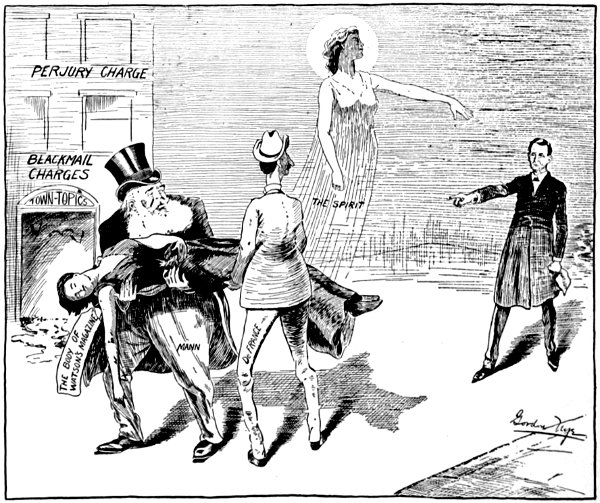
THEY HAVE A CORPSE ON THEIR HANDS; THE SPIRIT ESCAPED THEIR CLUTCH.
[19]
Honesty, in THIS case at least, should have been his POLICY. It would have paid him better in the long run.
Col. Mann rushed into court, got a judgment against the Magazine for $60,000; and sold it, at Sheriff’s sale, to himself.
He actually had the Sheriff to sell my name, and was ass enough to buy it.
But he didn’t buy me, along with the name, and he didn’t buy the spirit of the Magazine when he bought the desks, the iron-safe and the trade name.
The most valuable asset, he could not, and cannot reach.
That’s the Good Will, the Reputation, the Demand!
This is the real asset—THE ONLY ASSET WORTH HAVING.
This asset, in equity and good conscience, belongs to me, by the most sacred of all titles—THE WORKMAN’S RIGHT TO THE PRODUCT OF HIS LABOR.
Since it is mine, I mean to have it—in spite of all that Col. Mann may do.
***
“Explanatory” will seek in vain to convince any considerable number of people that I quit the Magazine on a mere question of salary.
That is the very thing that I always subordinated to other and higher considerations.
In some directions Col. Mann lavished money like a prince; in others, he doled it out like a miser.
Thus he squandered $12,000 in advertisements in daily newspapers, where they were not worth a hill of beans, and REFUSED TO FURNISH MONEY TO PAY ABSOLUTELY NECESSARY POSTAGE on sample copies.
He wasted $5,000 trying to run the advertising department on a fancy schedule, and refused to pay the Authors who supplied us with the necessaries of life. Sometimes the writers who had been so badly treated had to threaten attachments, before they could get their money; and upon one occasion DeFrance had to sneak out of the office to avoid an irate Author who had come upon the scene with the Riot Act in his hand.
Talk about me as the man who acted as if I wanted to “wreck” my namesake? What could damage the Magazine more surely and seriously than such management as this? We got a bad name among writers, because we took their MSS. and then failed to pay. We got a bad name among advertisers, because ads were inserted upon almost any terms. We got a bad name among subscribers, because DeFrance allowed business letters to go unanswered, and because Wm. Green, the Publisher, dribbled the mailing of every issue through TWO FULL WEEKS.
These were the difficulties with which I had to contend. The country is full of people who wanted to patronize us and befriend us and help[20] us, but who became so disgusted at not getting their magazines, and not getting answers to their letters, that they simply quit us in despair.
Would DeFrance like to see a list of their names?
I can furnish him with a good long one.
***
On one occasion Col. Mann was eager to have me send a cablegram, through our State Department, to our Minister at St. Petersburg, offering a thousand dollars to Maxim Gorky—then in prison—for an article for the Magazine.
That very week I had to take the money out of my pocket to pay the girls who worked in the office.
Upon another occasion, he ordered the sale, AS JUNK, of 60,000 copies of the Magazine WHICH HAD ALREADY BEEN WRAPPED AND ADDRESSED AND MADE READY FOR MAILING AS SAMPLE COPIES. They were SOLD AS WASTE PAPER BECAUSE HE REFUSED TO FURNISH MONEY TO PAY POSTAGE.
Colonel Mann’s business was the publishing of magazines. Naturally, I assumed that he was an expert at that business. It never occurred to me that I could be of any service in the business management until his absurd mistakes forced themselves upon my attention.
The Collier trial seemed to establish the fact that his way of making money out of his other magazines was the systematic blackmailing of Society swells and Wall Street thieves.
When he stands his trial for Perjury in the case now pending, the world will doubtless learn other peculiarities which characterize his management of magazines.
***
I wanted the Magazine to be a success, and I knew that it could not succeed as then managed. Hence, my offer to continue, indefinitely, to work without compensation provided I were allowed to make those changes which I knew to be absolutely essential to final success.
To this effect I wrote to the Managing Editor, and to DeFrance. No reply was made by the management.
Then I overcame my repugnance to Col. Mann, and wrote him—telling him what ailed the Magazine, how it could be put on its feet and offering to make a success, of it—without salary in the meanwhile—if he would let me do it.
To my original conditions, however, I added another, namely, that DeFrance must go. After the way in which he had acted, and after the two insulting letters which he had written me, it was no longer possible for us to work together.
Col. Mann did not answer my letter at all.
He had DeFrance to telegraph me a request that I send the Editorials, and a promise that they would treat me right.
[21]
By having DeFrance send the message, I knew that he meant to keep DeFrance—and that let me out.
DeFrance had already notified me that half of my magazine belonged to him, and half to Col. Mann, and there was no arrangement that could be made on that basis.
Besides, Col. Mann, after my letter was written and before its receipt, by him, had rushed into the New York World with an interview which libelled me basely and cruelly.
***
Let me say, in justice to a most estimable gentleman, that I had no quarrel with Mr. Richard Duffy. He is peculiarly well fitted to make a first-class editor of a literary magazine. His standards are high and his judgment sound. He was not, however, particularly suited to a political magazine—never having devoted any special study to Political Economy and Governmental questions. In my contemplated change in the Editorial Staff, I was not actuated by any dislike of Mr. Duffy. My motive was simply that of the mariner who sacrifices a portion of his cargo to save his ship.
***
“Explanatory” makes as much as possible out of the weekly cheque of $125, sent to me “during the busy part of the subscription season.”
Yes, they sent me cheques to the amount of one thousand dollars, at a time when subscriptions were pouring in at the rate of two and three thousand per week.
But “Explanatory” does not state the fact that nine thousand dollars represents the amount of unpaid honest, hard work done by me on the Magazine and that Col. Mann told the newspaper reporters, brazenly, that HE NEVER INTENDED TO PAY A RED CENT OF IT.
Perhaps, the sum-total paid me during the two years would cover my actual expense-account in working for the Magazine. It certainly would not do more than that.
***
“Explanatory” dwells upon my ceasing to visit New York, once a month.
Drawing no salary, paying my own traveling expenses, and being made more or less ill by each of these long trips, I discontinued them. Editorials for a monthly magazine can be written down here in Georgia just about as well as in New York, and postage stamps cost less than railroad tickets.
Everything that I was allowed to do for the Magazine could be done just as well by mail as by personal presence.
As to refusing to make a final trip to seek “an amicable adjustment,” I wrote to DeFrance that the proposition referred to already WAS MY[22] LAST WORD, and that there was no use in my coming to New York to say it again. Col. Mann could accept or reject—I was not going there to listen to any more of his coaxing, bluffing and lies.
Besides, to tell the whole truth, I was not sorry that the time had come when I could cut loose from this fat rascal. After I had worked on and on; after he had broken promise upon promise; after he had sued the Magazine for $60,000 and got an execution against it; after he had shown that he wanted me to continue indefinitely to do ten times as much work as the contract called for, and to never have any share in the reward that might be reaped from my labors; after he had broken the contract by dismissing my son from a position which was my personal appointment; after he had rushed into the newspapers and confirmed my suspicion of his villainous purpose by revealing his utter and shameless disregard for his contracts, THEN my conscience and my judgment concurred in the decision to cut loose from the New York concern and START A MAGAZINE OF MY OWN.
***
Not a second thought have I given to the loss of the $9,000. But THAT wasn’t all. Col. Mann assailed me. The odium of a catastrophe which was the result of his own folly, faithlessness and lack of honor, he tried to cast upon me. In his efforts to escape universal contempt, he lied like a bulletin.
Betrayed by one whom I selected as my personal representative in the office and whom I advanced from Circulation Clerk to Business Manager; accused of a mismanagement which I endeavored in vain to correct; held up to public criticism for mistreatment of employes when I had never uttered an unkind word to a single one of them, high or low, during the whole time of my service, and when I had never made a change in the force that was not sanctioned in advance, by Colonel Mann himself, I now feel that burning sense of the injustice and outrage which any other man of spirit would feel under the same circumstances.
***
With an effrontery which nothing could surpass, the two men who have seized my magazine on the half and half plan are mailing out a circular letter begging Reformers to take shares in the stock of the new Company.
This circular carries Deception on its very face. It purports to hail from “2 West 40th Street.”
What is “2 West 40th Street”?
Why, it is the side-door to the notorious Town Topics den into which DeFrance and Col. Mann have dragged the corpse of “Watson’s Magazine.”
The FRONT of Col. Mann’s trap is on Fifth Avenue.
[23]
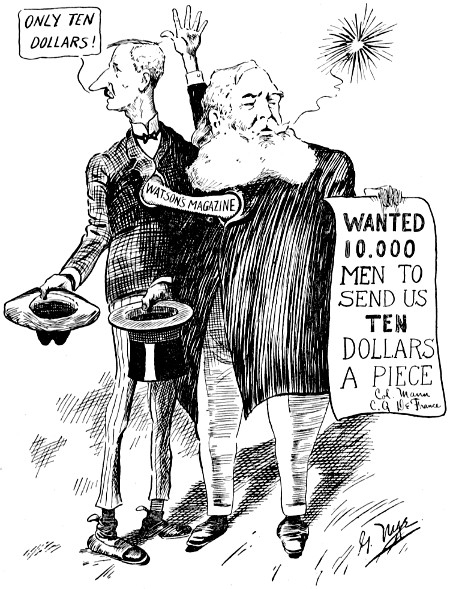
ARCADES AMBO!
[24]
Now DeFrance and Mann knew very well that there wasn’t a decent man in America who would knowingly send a dollar to buy stock of Col. Mann at the Town Topics address. Hence in their efforts to lure pigeons into the net, they use the side-door address which no one who is not familiar with the building would ever know to be the same building.
Oh, the shame of it, DeFrance! And YOU were the man whom I selected AS MY PERSONAL REPRESENTATIVE IN THE OFFICE, and who telegraphed me to Fort Lauderdale last winter urging me to resist Col. Mann’s removal of the Magazine to the Town Topics building!
With pathetic insistence, they are sending out this circular letter from this Town Topics Side-Entrance addressed,
“Dear Friend.”
I wonder how many dear friends Col. Mann imagines himself to possess.
I wonder how many of DeFrance’s dear friends will follow him into that Mann-hole.
The letter makes the modest request that a few thousand ardent admirers of DeFrance buy stock in the Side-Door concern at $10 per share.
DeFrance tearfully ejaculates, “I don’t ask you to donate the Money. Far from it.”
How far from it, he doesn’t say. The confiding individual who bites at that bait, and pours ten dollars into that Mann-hole will see a good deal of ice in August before he will ever see his money again.
Think of the impudent falsehood of the assertion made in this circular letter:
“The magazine, while not yet profitable, has nearly reached that point.” Therefore, send your money to the Side-Door concern right away. Yet, in the next breath, he claims that Col. Mann lost $180,000 in less than two years on the Magazine.
To cap the climax of his wrong-doing, DeFrance actually signs the Begging Letter as Secretary of the People’s Party National Committee.
By what right?
Under whose authority does he act when he thus prostitutes that office to the service of Col. W. D. Mann?
What will our National Committee think of it when they behold their Secretary standing at the Side Door of the Town Topics building and hear him calling for Populists to walk up and enter the Mann-hole, to the tune of “Ten Dollars admission fee, please”?
DeFrance has now stooped to do the very thing that Col. Mann tried vainly to get me to do.
***
I wonder if those New York rascals really thought that I would quietly sit down and twiddle my thumbs while they were making off with “Watson’s Magazine”? I wonder if it never entered into those[25] heads, which were bent together to plot and to scheme, that the consequence of their pretty little game MIGHT be a Revolt of Watson and HIS FRIENDS.
Unless I am greatly mistaken, the subscribers to “Watson’s Magazine” are Mr. Watson’s friends, and THEY ARE GOING TO STAND BY HIM. We shall see.
***
After all, why worry over it? Life is too short to waste many of its precious hours upon such a theme. Looked at in one way, those who thought to crush me have done me a service.
They have put into me, once more, that intensity of energy and purpose which, otherwise, might never have been mine again. What the spur is to the thoroughbred, what the bugle-call is to the cavalier, the recent attempts of my enemies to compass my ruin has been to me.
By the living God! Here is no thought of surrender, no weakness of doubt or hesitation, but a resolution, fixed as hardened steel, to MARCH ON.
What! Be a quitter NOW? Falter or flicker NOW? Lower the flag and stack arms, NOW?
Rather, would I die.
The ear of the world is at last inclined to us, and the heart of mankind is at length being touched by our message.
The long march of the despised Reformer is nearing its end. His final triumph no sane observer, no watchman upon the tower, can longer doubt.
Halt NOW? Never in the world.
Desert NOW? Heaven forbid!
Why, for fifteen years we have walked amid the shadows of social and political ostracism, never swerving an inch from the rocky road of Duty—do they think we shall walk less firmly now, when the sunlight is falling upon the path?
Times have changed. Men have changed. The principles for which we fought have not changed. They have conquered.
The strong man and shrewd politician at the White House laid his attentive ear to the ground, quite a while ago, and heard distant rumblings that taught him useful lessons.
The strong man and shrewd politician at Fair View, Nebraska, has had his attentive ear to the ground and he, likewise, has learned his lesson.
The next time Mr. Watson of Georgia goes to Nebraska for the purpose of helping Mr. Bryan to carry his home State for Reform, I venture the prediction that Mr. Bryan will not leave Nebraska to avoid contact with Mr. Watson—as he did in 1896.
The battle-flag of a great people, inspired by a resistless purpose to assert the right of THE INDIVIDUAL to wrest the government of the[26] country out of the hands of the MONSTER CORPORATION will, beyond all possible doubt, be inscribed with those mottoes which for fifteen years have been our watchwords in the fight and our solace in defeat.
Courage, Comrades—Courage! And Forward March!
***
On this mellow, radiant, opulent day of Indian Summer—when the golden hours step quietly by, leading November into the dim realms which we call the Past—I write these lines; and, having done so, cast behind me that ugly dream, my New York experience.
Betrayed, I will trust again, AND GO ON. Better ten thousand treacheries than loss of faith in my fellow man. Repulsed, I will rally, re-form, and CHARGE AGAIN. Better a hundred defeats than one capitulation.
***
In March 1898, the Populists nominated me for Governor of Georgia. In declining to make the race, my decision was controlled by the fact that our organization had been wrecked by the Traitors who controlled our National Committee, that I myself was exhausted—mentally, physically, financially—and that Populism must henceforth do its work as A LEAVEN TO THE LOAF.
The fatal Fusion of 1896 had done our organization deadly damage, and the Spanish War finished us.
The blare of the bugle drowned the voice of the Reformer. With the Cannon-boom shaking the world, men had no ear for Political economy—or economy of any other sort.
Roosevelt rushed into war paint, and leaped into fame.
Bryan stuck a feather in his cap, and vowed that he, too, would become a soldier in spite of those vile guns.
Hearst, also, went as close to the enemy as McKinley would let him.
How could I talk economics with any prospect of success at such a time?
Loathing the war, foreseeing many of the evil consequences that it has brought upon us, I quit the active agitation of Populism, and shut myself up in my library to write books. But if any soldier of the Southern Confederacy carried away from Appomattox a heavier heart than I took with me into my enforced retirement, it would have been a merciful dispensation of Providence had the Eternal Sleep taken that soldier into her cold, white arms.
What I suffered during those awful years is known to none but the wife who shared my lot and the God who gave me strength to endure it.
***
To continue a hopeless fight with a broken-down organization was not the part of wisdom. The thing to do was to wait, educate the people,[27] let events demonstrate that we had been right, and let the Spirit of Populism enter into and inspire the leaders of other parties.
I knew that OUR PRINCIPLES would finally triumph—as to THE PARTY, that was a secondary consideration.
In taking leave of my comrades in 1898, before quitting the field to go back into the court-house to earn money to pay pressing debts, here is what my letter said to them:
“Let no man believe that I despair of your principles, for I do not. You stand for the yearning, upward-tendency, of the middle and lower classes. You stand where the reformer has always stood; for improvement, for beneficial changes, for recognition of human brotherhood in its highest sense, for equality before the law, and for an industrial system which is not based upon the right of the strong to pillage the weak. You stand as sworn foes of monopoly—not monopoly in the narrow sense of the word—but monopoly of power, of place, of privilege, of wealth, of progress.
“You stand knocking at the closed door of privilege, as the reformer has ever done, and saying to those within, ‘Open wide the doors! Let all who are worthy, enter. Let all who deserve, enjoy. Form no conspiracy against the unborn. Shut out no generations that are to be. God made it all for all. Put no barrier around the good things of life, around the high places of church or state. Make no laws which foster inequality. Establish no Caste. Legalize no robbery under the name of taxes. Give to no person natural or artificial sovereign powers over his fellow men. Open, open wide the doors! Keep the avenues of honor free. Close no entrance to the poorest, the weakest, the humblest. Say to ambition everywhere, the field is clear, the contest fair, come and win your share if you can!’
“Such is Populism. Such is its glorious Gospel. As such, I have loved it with boundless reverence. As its disciples, I have loved you, fought for you, toiled for you, never for one moment doubting that you were right, and that your creed was the same immortal creed which in all ages has challenged wrong, and defied oppression.”
***
Trample the Truth as rudely as you may, even in her death struggle her voice is heard to say:
“I will come again.”
In the darkest hours of the past, when all seemed lost and the weaklings, the timeservers, the fickle minded and the mercenaries were fleeing to cover, I used to say, constantly, confidently, “Courage, friends. Be firm. Don’t lose heart. It will all come right.
“Populism, as a party, may seem to be dead, but the Spirit is immortal. It cannot die. As sure as God lives,
“It will come again.”
And now, after many days, in God’s own time, it HAS come again. From the bottom of my heart and from yours, come thanks to the Lord of the Universe who spared our lives to see this day.
[28]
And the purpose to which every energy I possess shall be devoted, henceforth, is to help those whom the people commission to bring about Reform.
As to Reward, I seek none, expect none, save that of the Inner Voice which says,
Well Done.
With this glance into the Past, necessary to you, as well as to me, let us turn our backs to it, and face the Future—and let us WORK, as we never worked before.
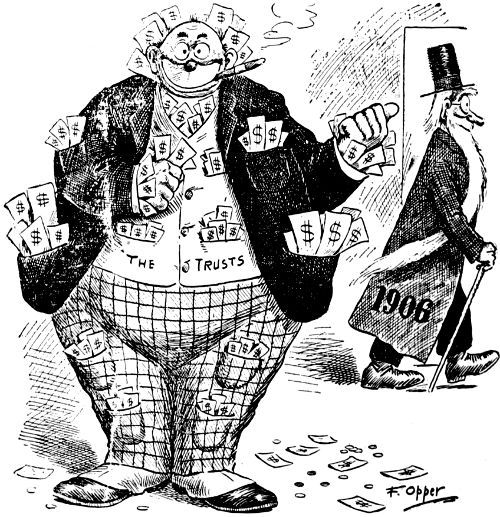
“HE CERTAINLY WAS GOOD TO ME.”
[29]
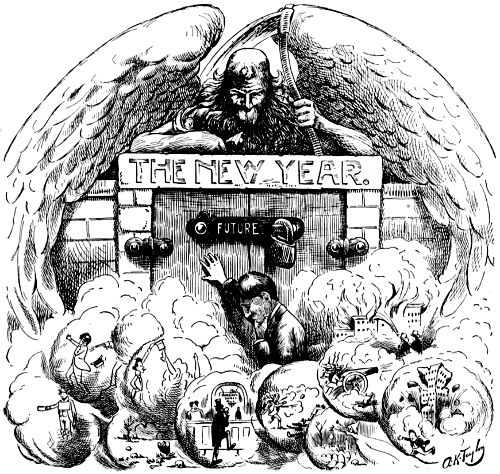
Lead us gently, Father Time, as you take us to the portals of the New Year.
We know not what may be within; and our souls are burdened with fear as we stand here at the door.
Lost, forever lost, is the Confidence with which we used to go bounding into the New Year—as revellers hasten to the feast.
We have met the Unforeseen so often, have mourned where we thought to rejoice, been trampled upon amid the horrors of panic and defeat where we had so stoutly fought for victory and reward, that our hearts are sadly subdued, Father Time.
***
We did not SEEK this awful life-woe, Father Time.
Thrust, from some great outer darkness, into the hurly burly called Life, we gaze upward at the stars in helpless[30] ignorance of what it all may mean; and some Irresistable Force pushes us, pushes us, swiftly, inexorably, onward to another outer darkness that fills us with speechless awe.
***
Have mercy on us, Father Time. We have been beaten with many stripes, and are covered with many wounds.
God! How we have suffered!
We knew nothing at the beginning, and we know but little now; and, for every lesson that we have learned, we have been made to pay in heart-aches and scalding tears.
Always struggling, often down, always anxious for the Morrow, often in torture Today, we have stumbled forward, Father Time, still looking for the smooth road and the sunny sky and the bright Companionship of Success and Peace.
Shall we NEVER see Carcassonne, Father Time?
***
We shudder when we think of what you did to us during the Old Year, Father Time.
Ah, but you were hard on us—bitter hard. Our little ones panted for a breath of fresh air, Father Time; and they died like flies, in noisome, reeking, crowded tenements, because there was not, in all God’s Universe—where there’s light and air for every flower that flecks the field—a breath of fresh air for the little children of the slums.
Ah, it was pitiful, Father Time!
Our feeble ones, young and old, perished miserably of cold and hunger, in the midst of a land that worships the Good God, and amid such an accumulation of wealth as was never known before since the Morning stars looked down upon a newly-made world.
Poverty, Crime, Vice, Drunkenness, Riot, War, Famine, Pestilence, Earthquake, Conflagration have glutted their awful appetites upon us during the Old Year, Father Time. To WHAT are you leading us in the New?
Will the heart of the world grow harder and harder, Father Time?
Will the greed of human avarice demand still larger sacrifice of human lives?
Will the Selfishness of Class gorge itself still further upon ravenous conquest, and remorseless exploitation?
Shall the cry of the White Slave NEVER reach Heaven, Father Time?
Shall the song of the angels who hung over the infant Christ, NEVER throb, a living principle, in man’s government of man?
Is the Reformer always to be the Martyr, Father Time?
Is Wrong NEVER to be dethroned?
***
Oh, Father Time! We tremble as we feel you leading us toward the door of the New Year. Beyond that portal we cannot see, and we dread it—as children dread the dark.
Deal gently with us in the New Year, Father Time.
Give us strength to bear the Cross—for we know that we must bear it.
Give us courage for the battle, for we know that we must fight it.
Give us patience to endure, for we know that we shall need it.
Give us Charity that thinks not evil of the Just, and which will stretch forth the helpful hand to lift our weaker Brother out of the mire, rather than the cruel scorn which passes him by, or thrusts him further down.
Give us Faith in the Right which no defeat can disturb, no discouragement undermine.
Give us the Love of Truth which no temptation can seduce and no menace intimidate.
Give us the Fortitude which, through the cloud and the gloom and the sorrow of apparent Failure, can see the distant pinnacles upon which the everlasting sunlight rests.
Give us the Pride which will suffer no contamination, no compromise of[31] self-respect, no wilful desertion of honest conviction.
Give us the Purpose that never turns and the Hope that never dies.
And, Father Time, should the New Year, into which you are taking us, have upon its calendar that day in which the few who love us shall be bowed down in sackcloth and ashes, let THAT day, like all the other days, find us ON DUTY—faithful unto the end.
When I was in Nebraska in 1904 Mr. Bryan showed me every courtesy; therefore, it was most appropriate for me to reciprocate at the first opportunity. When Mr. Bryan reached the State of Georgia, during his recent tour of the South, I wrote him a note which he gave to the press, and which our readers have doubtless seen.
Not long afterwards the following personal acknowledgement was received:
September 22nd, 1906.
Hon. Thos. E. Watson.
My Dear Mr. Watson:
I received your letter at Augusta and thank you very much for your cordial greeting.
I am sorry that it was impossible for us to stop over with you. It is gratifying to know from what I have learned that we are going to be able to act together in the coming contest. There has been a remarkable change in public sentiment, so that things that were formerly denounced as radical are now regarded as not only quite reasonable, but even necessary. If you come our way, we shall be glad again to see you, only hoping that you may have more time than when you last visited us. Mrs. Bryan joins me in best wishes.
Very truly yours,
W. J. BRYAN.
***
Mr. Bryan says: “It is gratifying to know from what I have learned that we are going to be able to act together in the coming contest.”
Nothing would give me greater pleasure than to see the National Democratic party undergo a general casting out of the unclean spirits that have taken possession of it. If it should become truly Democratic, if it should return to the principles of the fathers, if it should renounce Hamilton and all his works, if it should rebaptize itself in the creed of Jefferson, if its National organization should expel every tool of the Trusts, every agent of Wall street, every beneficiary of special Privilege—then the Democratic party would stand for substantially the same things as The People’s Party.
That being so, why should we not be able “to act together?”
Party names are nothing. Principles are everything. True reformers think more of having the work done than of getting the credit. Many Populists condemned me in 1905 for advising them to support Hoke Smith for Governor of Georgia. No Populist condemns me now. Everybody realizes that there are more Populists in Georgia today than there ever were before.
Read once more the strong, manly letter which Hoke Smith wrote for the first issue of the Weekly Jeffersonian, and then remember that thirteen years ago the writer was a member of Cleveland’s Cabinet—then you will realize how immensely the man has grown.
[32]
Well, his Democratic followers have grown with him, and we Jeffersonians vastly outnumber the moss-backs throughout the State of Georgia.
***
As Mr. Bryan says, a great change is coming over the people. Doctrines which were scouted a few years ago are shouted now. Radicals who were hooted, howled down and rotten-egged a few years ago are getting bouquets now. The Hearst editorials and speeches read like Populist harangues of 1892. The Bryan platform of 1906 embraces what was considered the wildest plank of the People’s Party platform of 1891.
“Act together,” William? Why not—if you take our principles for your creed and reorganize your old party to fit your new faith?
***
That all true reformers may find a way to “act together” is a consummation devoutly to be wished. A conference between Bryan, Hearst and myself for that purpose was suggested immediately after the election of 1904, but neither Mr. Bryan nor Mr. Hearst seemed to approve.
What may happen between now and 1908 no one can foretell, but I am still hoping that some honorable plan may be hit upon which will enable all true-hearted reformers to “act TOGETHER” and overthrow this fearful system which enables the privileged few to plunder the unprivileged many.
In a recent issue of a leading Socialist paper the following gem of thought is to be found:
“‘Patriotism’ is a nickname for ‘Prejudice.’”
Do you know why the Socialist flouts patriotism and calls it prejudice?
Think a little, and you will see. You love your country because your home is a part of it; and you love your home because it is your individual haven of refuge from the storms of life—the individual kingdom in which you are lord and master and in which you enjoy, with your wife, your children, and your friends, whatever happiness life can give.
The man never lived who would NOT fight for his home—HOWEVER HUMBLE.
The man never lived who would fight for the tenement house in which he chances to be a lodger. The home is ever sacred—the hotel never is. The reason is plain enough. The home is yours, individually; the hotel is everybody’s generally. Now, the Socialist strikes at individualism. He doesn’t want to own your home by any title that gives you individual control of it. He wants everybody’s home to belong to you, and your home to belong to everybody. In other words, the homes of the people are to be owned collectively. If society sees fit to say to you “Move on,” out you go. Society will substitute its title for your title, its will for your will, its control for your control. The home that Socialism will permit you to use this year may be allotted to some one else another year.
Under these conditions no man would love his home any more than he would love his room in a hotel. Under these conditions, the citizen would have no greater inducement to make permanent improvements upon his home, than he would have to make improvements upon the hotel.
Love of home being destroyed, love of country would also be destroyed. Patriotism, being founded upon love[33] of home, would perish under Socialism, for the simple reason that the foundations would be gone. Under Socialism, the most beautiful feature of civilized life would disappear. Home life, as we know it, would be impossible. The song of “Home, Sweet Home,” would thrill no responsive chords in the human heart. The tender pathos of Burns’ “Cotter’s Saturday Night,” would not be felt. Socialism would answer with a universal YES, Sir Walter Scott’s ringing challenge,
The Washington Post is authority for the statement that the President will, in his next Message, again urge upon Congress the necessity for Currency Reform.
The MONEY QUESTION, as you will remember IS SETTLED; it is only THE CURRENCY that needs REFORM.
Bryan says THE MONEY QUESTION IS SETTLED; ditto Roosevelt; ditto Secretary Shaw; ditto the big bugs of BOTH the dear old political parties.
Yet, with equal unanimity and fervor, they all say that THE NEED OF CURRENCY REFORM is something fierce.
Peculiar, isn’t it?
***
When the people want financial legislation that will restore the system of The Fathers, it is THE MONEY QUESTION, and it’s SETTLED. The old party leaders, one and all, agree upon THAT.
Politically, therefore, THAT question is Res Adjudicata, and must not be spoken of any more.
But when the corporations want financial legislation which will tend still further to make our National Treasury a huge Reservoir from which the National Banks and their allies can draw strength, support and profit—why, THEN, it is a matter of CURRENCY REFORM, and if Congress doesn’t give the Money Power everything it demands, the Country will go to the “demnition bow-wows.”
That’s how it is, my son.
The moguls of high finance declare that what our currency system needs is greater “elasticity.” The India rubber quality is wanting, it seems. The present system doesn’t stretch readily enough. The Moguls declare that the “rigidity” of the currency system threatens us with calamitous conditions at the prospect of which the imagination becomes exhausted and quits business.
Those two words, “elasticity” and “rigidity” are being featured in all the Mogul talk, all the Mogul papers—and are being dutifully repeated by all the Mogul Senators and Representatives.
***
Yet, there isn’t a particle of sound common sense in all this cant about elasticity and rigidity.
When the currency system of the body-politic is healthy and normal, there can be no question of elasticity and rigidity. Like the circulation of the blood in the human body, the circulation of money will take care of itself.
Once get the system right, and nature will do the rest.
If the Physician tells you that YOUR CIRCULATION IS BAD—you KNOW what that means.
Your system is out of order. The blood goes about its business, without any help from YOU, PROVIDED YOUR SYSTEM IS KEPT IN ORDER.
[34]
You don’t have to pump blood away from center to the extremities; THE BLOOD WILL GO THERE, OF ITSELF, IF YOUR BODILY SYSTEM IS IN THE PROPER, NORMAL, SOUND CONDITION.
It is just so with, the circulation of money in the body politic; if the system is RIGHT, THE MONEY CIRCULATION WILL REGULATE ITSELF BY NATURAL LAWS.
***
Elasticity—Rigidity—two words that are cunningly employed to disguise the purpose of the Moguls of National finance. Those conspirators mean to drive the Government still further away from the Constitutional system of the Fathers. They mean to push still further the usurped power of the National Banks to create and control the supply and distribution of the Currency.
“Currency Reform” means nothing more nor less than that.
***
Government loans to the common people, at four per cent, or even at two per cent, would seem to be more statesmanlike, in all respects, than this eternal lending of government money to Wall Street without any interest at all.
Why should Uncle Sam furnish gamblers money to speculate with? Can any good reason be given for it? Does it seem to be fair to legitimate business men? Is it just to the taxpayers? Can it be RIGHT?
Yet the Wall Street gamblers got nearly ($30,000,000) thirty million dollars from the U. S. Treasury in one lump. Upon this huge sum of public money, the speculators will pay no interest at all.
Is it right?
***
According to the official statement for Nov. 12th, 1906, THE GOVERNMENT has now increased its loans to the National Banks to the stupendous TOTAL of $147,000,000.
Never before has the gratuitous loan been so large. Who can defend such a policy? Who would not BE ASHAMED to appear before an audience of intelligent voters to advocate the wisdom and the propriety of such GOVERNMENTAL FAVORITISM as this?
You laughed at the Farmers’ Alliance when it favored government loans to the people, on the best of security, at two per cent interest. Yet you say nothing against government loans to a few pet National Banks FREE OF INTEREST, and upon DOUBTFUL SECURITY.
Part of that LOAN OF ONE HUNDRED AND FORTY-SEVEN MILLIONS is secured by Chicago Municipal Bonds, called, I believe, the Sanitary Bonds. Would you not prefer to lend YOUR Money upon a good farm, or upon warehouse certificates for cotton?
***
The farmers would be only too glad to pay the Government FOUR PER CENT for that money which THE PET BANKS GET FOR NOTHING. Four per cent interest upon one hundred and forty-seven million dollars is a tidy sum. Figure it out and you will see, that it is about SIX MILLION DOLLARS. That’s a neat sum to be GIVEN AWAY EVERY YEAR, isn’t it?
***
Consider this also: You, the Common People, are the taxpayers who put that money into the U. S. Treasury. The pet National Banks pay, practically, none of it.
Yet THEY have the use of YOUR money FREE. If YOU get the use of a dollar of it, YOU MUST GO TO THEM FOR TERMS.
Tough, isn’t it?
No wonder the money supply is congested. So long as the Government TAXES IT OUT OF THE POCKETS OF THE MANY, and delivers it over TO THE FEW, there is bound to be congestion.
Yet, the Pet National Banks are moving heaven and earth, RIGHT NOW, to have CONGRESS LEGISLATE IN FAVOR OF GREATER CONGESTION. The power of the Few over the Many must be[35] increased by additional legislation. Otherwise, the bottom will drop out and Perdition will have us by the nape of the neck. When eminently respectable cabinet officers, congressmen, editors, etc., tell you that THE PRESENT SYSTEM OF RUNNING THE FINANCES IN FAVOR OF WALL STREET SPECULATORS AND PET BANKS is safe and sane, and that all we need is to make it a little more so, BELIEVE EVERY WORD OF IT AND VOTE ACCORDINGLY.
On the contrary, when some discredited crank tells you that it is an infernal shame to use the law-making machinery in that manner, howl him down, at once.
Don’t lend to the taxpayer his own money at four per cent. That’s paternalism—and it STINKS.
Take the taxpayers’ money and LEND IT TO THE PET BANKS without any interest.
That’s statesmanship—and it SMELLS LIKE ATTAR OF ROSES.
The case against Plutocracy gained an advance upon the Docket by the New York gubernatorial contest, but, unless I am much mistaken, two national figures came out of it with mud on their boots.
One of these is W. R. Hearst.
The other is W. J. Bryan.
When Max Ihmsen advised Mr. Hearst to come to terms with Murphy, the striped Tammany Boss, he disgusted thousands of sincere Hearstites, not only in New York but throughout the Union.
The deal was too bad.
It took Hearst out of the class of Reformers and put him into that of self-seeking Politicians.
It created in the minds of his disinterested friends the suspicion that he posed as a Reformer to serve the purpose of a personal ambition.
***
Boss Murphy is a rich specimen of the Boss—the man who is in politics for Money, who cares nothing for Principle, who has no conception of Duty, who would not understand what you meant if you talked to him about Moral Obligation, who amasses wealth by screening from adverse legislation the rascals that rob the Public under corporate names, who makes it possible for invaluable public franchises to be stolen with impunity, and who renders it easy for the robbers that grabbed the property to use it to oppress and exploit the people from whom it was stolen.
I know that Murphy is the worst representative of that class of Bosses because the Hearst newspapers told me so.
I know that he has used his power, as Tammany Chief, to protect such robbers of the Public as Belmont, Morgan, Rogers and Ryan, because Mr. Hearst has told me so with “damnable iteration” and convincing emphasis these many years.
At the breakfast table, he reminded me of it in his morning paper, The American.
At the supper table, he recalled the fact to my memory in his evening paper, The Journal.
In fact, he gave me no chance to forget it.
Murphy, a protector of Crime, Murphy, a tool of the Plunderbund; Murphy, the stuffer of ballot-boxes; Murphy, the ally of Murderers and thieves; Murphy, the inciter to assassination; Murphy, who robbed New York in the interest of Ryan and Belmont;[36] Murphy, who ought to be in the Penitentiary garbed in convict stripes—THIS Murphy became so familiar to me in the Hearst newspapers that I would have felt the loss of something habitual, and therefore necessary, had my friend Hearst ceased to grind the coffee-mill.
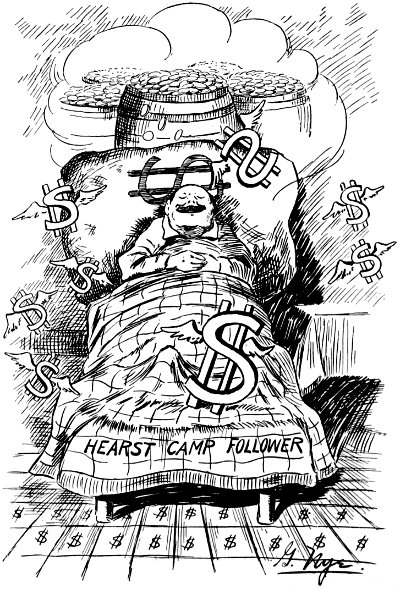
DREAMING OF 1908.
Yet Max Ihmsen deliberately planned a coalition between denouncer[37] and denounced, between the Angel of Reform and the Devil of Plutocracy, between the Champion of the “Common People” and the hireling of the Plunderbund, between the man who cried “Stop thief” and the rogue who was making off with the stolen goods.
It was too bad.
It shocked the Sense of Right of ten thousands of enthusiastic Hearstites who had believed in him as an honest leader. * * *
See the Consequences of this foul and fatal deal:
First—the loss of that most valuable asset, the real reformers of The Independence League;
Second—the revulsion of feeling among disinterested Democrats and Republicans who were supporting Hearst on principle;
Third—the calling back to robust life of the almost defunct Boss, Murphy;
Fourth—the complete rehabilitation of Tammany;
Fifth—the surrender to the Plunderbund of the State Supreme Court for fourteen years;
Sixth—the restoration to his place of power and hurtfulness of Thomas Grady, the most debauched legislative corruptionist in America.
I know that Grady is that kind of man, because the Hearst papers have assured me of it so often that no doubt upon the subject disturbs the absolute serenity of my fixed opinion.
***
As these net results of the New York election loom up clearly above the dust and noise of the conflict, it is natural that Mr. Hearst will be seen to have dimmed his halo very considerably; and the fact that Murphy, after securing to himself and his gang all the benefits of the coalition, turned upon Hearst at the last moment and put the knife into him, will cause no tears ANYWHERE.
That’s just what Hearst ought to have known would happen—for he had said things about Murphy which no man, born of woman, could possibly forgive.
***
But Bryan put a shadow upon his radiance, also.
He swallowed the Hearst programme all the way through—from soup and fish to cheese and coffee. His stomach balked at nothing. The ousting of Democratic delegations which had been elected to the Buffalo Convention; the packing of that Convention with delegations which had not been elected; the throw down of The Independence League; the guillotining of the Independent candidates; the repudiation of the honest labor-champion, Thomas Rock, and the endorsement of the Plunderbund corruptionist, Thomas Grady; the fix-up of the Judiciary ticket in which three Judges were allotted to Hearst while Murphy calmly pocketed seven—Bryan’s gorge rose at none of these things. One and all, they slid down his gullet like rain-water down a tin valley.
Just think if it!
In 1904, Bryan was making 60 speeches a day for Parker—Judge Alton B. Parker—whom he described as “the Moses of Democracy.”
In 1906, he was writing, telegraphing, telephoning and so forth for W. R. Hearst, the exact CONTRAST to Parker.
Heavens, what a leap!
From Parker to Hearst—from Greenland’s icy mountains to India’s coral strand.
Never saw such a jump before in my life.
And Bryan is going to find that it will require considerable dexterity to fit his crown on straight, after that trouser-splitting leap.
Hearst has not changed in principle; Parker has not changed in principle; yet within two short years Mr. Bryan has advocated EACH OF THEM with equal fervor.
[38]
Quit playing Politician, William, or you will do yourself irreparable injury.
Fly your flag as Reformer and hold your sword straight before you.
Don’t again call such a man as Parker “the Moses of Democracy.”
Don’t endorse Hearst, when he is WRONG!
Condemn the wrong, and thus encourage Hearst to mend his ways, to retire Max Ihmsen, and THUS MAKE his powerful newspapers, more useful, more effective in the grand cause of Reform.
The Pennsylvania politicians decided that the state needed a new Capitol. The people were told that unless a better state house were erected Pennsylvania would be pointed at with scorn, viewed with alarm, and otherwise treated in a disrespectful and uncomfortable manner.
So, the politicians, contractors, material men, jobbers, lobbyists, dead-beats, plain thieves and so forth, went forward and in due time a new capitol for Pennsylvania was evolved.
Costing how much?
Thirteen million dollars, my son.
The house, itself, cost only $4,000,000.
But, then, you see, it had to be furnished.
The “furnishings” of the new state house cost the tax payers of Pennsylvania $9,000,000.
As a sample of said furnishings, consider the one item of flag staff.
What would such a magnificent new capitol be without a flag flying above it?
Of course, the state house must be surmounted by the flag.
And how can the flag do itself credit, away up there in the heavens, without a pole to fly from?
Of course, there must be a flag pole.
So, the pole was put in place, and the flag was braced to the pole.
At what cost, please?
Why, the flag pole cost $850. Not $8.50, but $850.
So, at least, it appears upon the expense-account.
What was the flag pole made of?
Why, it was just the round body of a large pine tree.
Nothing else, my son.
The probability is that any sawmill in the country would have furnished such a tree for $25.
The labor of preparing the tree for use as a flag pole might have cost another $25.
Fifty dollars ought to have covered the entire cost.
But then, you see, the gang that was bossing the job needed money; therefore, the State of Pennsylvania was supplied with a fifty-dollar flag pole for the moderate sum of $850.
***
But the country is adorned with numerous other flag poles of the same variety.
One of them is Paul Morton, President of The Equitable Assurance Society.
No institution in this land of the free has a flag pole that is more expensive.
Paul Morton costs the policy holders of the Equitable $80,000 per year. Not $8,000—which would be a fair price—but $80,000—which is a gouge.
Just how many men, equally capable, could be found to fill his place at $10,000 per year, it would be impossible to say; but there is no doubt whatever that Paul himself would[39] have served the Society just as well upon a salary of $25,000.
But then, you see, he wanted more. So he took it.
Flag poles come high—under certain circumstances.
***
Life Insurance, properly done, is of vast benefit to the Insured. Life Insurance, improperly done, is of vast benefit,—to the Insurer. Those Eastern Companies got too gay. Their higher officers became corrupt. Under various flimsy pretexts, they began to plunder the Insured. Local agents, who did the hard work, got small pay. State agents and National officers drew princely salaries,—and did little to show for it.
Some of those Eastern Companies have been building Insurance Business on the same principle that gave an exhibition of itself in the building of the new State House of Pennsylvania.
Everybody knows that the taxpayers of Pennsylvania have been robbed. Everybody knows, equally well, that the Policy-holders of those Eastern Companies have been plundered.
From the standpoint of such rascals as the McCurdy gang, the Policy-holder resembled an Irish potato, in that he had eyes yet saw not.
The blind Policy-holder, who could never see that he was being robbed, became a jest among the thieves who spent his money in riotous living.
Life Insurance is all right—when the Insurer is.
Before you allow the Insurance Company to examine YOU, examine the Insurance Company.
The process of making a saint out of Abraham Lincoln goes bravely on. His latest biographer, Mr. Hill, clears him of the charge of “telling stories just to amuse people.” Mr. Hill—a sober and worthy man, no doubt—produces a witness by the name of Ewing, who being duly sworn, deposes and says:
“I never heard Mr. Lincoln tell a story for its own sake or simply to raise a laugh. He used stories to illustrate a point, but the idea that he sat around and matched yarns like a commercial traveller is utterly false.”
Why should the Lincoln biographers strive and strain to establish the fact that HE NEVER “SAT AROUND AND MATCHED YARNS LIKE A COMMERCIAL TRAVELLER?”
Is it any disgrace to sit around, occasionally, and swap yarns, “like a commercial traveller?”
If so, the men who are TRULY RESPECTABLE are the dull fellows who can neither tell a joke, nor enjoy one. Some of the best and brightest men that ever lived have prided themselves upon their gifts in that very line. To be a good story-teller is to possess the golden key that unlocks almost every social door.
Daniel Webster revelled in a good story; so did Clay; so did Tom Corwin; so did Robert Toombs, and Alexander H. Stephens.
As a mental relaxation and recreation, there are, in fact, few things that serve better than “to sit around and match yarns like a commercial traveller.”
***
The truth about Lincoln is that he was a man, and a great man, but no saint.
The last time I was in New York (November, 1905), my friend, Hon. T. H. Tibbles, of Nebraska, was there,[40] also, and we talked of Lincoln, whom Mr. Tibbles had known.
And one of the very things which Mr. Tibbles had seen and heard Mr. Lincoln do was “to sit around and match yarns like a commercial traveller.”
***
Mr. Tibbles told me how, being at a certain place, his attention was attracted by repeated bursts of loud laughter, coming from a certain room. His youthful curiosity being excited, he followed the sound to the room from which it came. The sight that met his eyes was this: Abraham Lincoln was sitting in a chair, with his big feet upon a table in front of him; around him were grouped a number of men, to whom Mr. Lincoln was telling side-splitting yarns.
Tibbles joined the audience and got his share of the fun.
What of it?
Does that lower Lincoln in any sensible man’s eyes?
No. Let the Miss Nancy brigade go off to one side and talk about the nebular hypothesis, or some other nice, well-bred subject. For my part, I would prefer, occasionally, “to sit around and match yarns like a commercial traveller.”
***
I asked Mr. Tibbles whether the stories that he heard Mr. Lincoln telling were smutty.
At some future time, when I find, after a careful field-glass scrutiny of the horizon, that I have no other row on hand, and am feeling the need of one very badly, I am going to tell you Tibbles’ answer.
Most men are presumed to have sense enough to know when the sun is up, and when it is down.
To no mortal on this earth is it a matter of vital importance to know the exact moment it rises and sets.
Even if any inquisitive lunatic wanted to know, he couldn’t find out, for the simple reason that the hour of sunrise and sunset varies with every mile of the earth’s surface, and is earlier to the man at the foot of the mountain than to the man on top.
In the military establishments of the world, however, it is considered to be a matter of life and death to know just when the sun rises and just when he sets. So extremely indispensable is this piece of daily information that a gun, a cannon we mean, must be fired to proclaim the tidings.
“Boom!”—the sun is up.
“Boom!”—he’s down.
Whereupon, your true soldier can sleep with a conscience childlike in its freedom from care.
Otherwise not.
If that gun (mind you, a cannon) was not fired, solemnly and formally fired, every time the sun rose and every time he set, the military breast would be racked with rude alarms, and the military mind would be tossed to and fro with dread forebodings.
To fire off a musket wouldn’t do; wouldn’t begin to do.
It would be unconstitutional, if not actually anarchistic and revolutionary.
To start the day without firing a cannon—why the military establishment could no more perform its traditionary functions without a cannon salute to the coming and going of the sun than one of the old parties could exist without stuffed ballot boxes.
Therefore, the custom is fixed—rooted, as it were, in the soil of our[41] civilization. It is one of the greatest advantages we have over our untutored ancestors.
However much they may have yearned to shoot the sun up and shoot it down, they couldn’t do it. They had nothing to shoot with. They were so completely engulfed in the currents of stupidity and barbarism that they just had to trust to their eyes to know when the sun was up, or was down.
You might ask how the soldiers do on cloudy days. You might ask, with unseasonable levity, if the army doesn’t have to go by the clock when the sun is not to be seen. And you might, out of your desire to be smart and show yourself off, ask whether the army couldn’t go by the clock as well on fair days as on foul ones.
But such questions as these will do you no good, and they would cause you to lose friends. They are irrelevant impertinences.
For, you see, when anything has been done a long time, the presumption is that there is sense in doing it that way.
Therefore, all nice and respectable people put salt in the fire when the screech owl twitters, and make a cross mark and spit in it, whenever they turn back in their tracks. We all do this because the custom has age and good sense on its side.
If you think you can prance through the world smashing steady old customs which have been handed down to us from time immemorial, you are in a fair way to get yourself into trouble.
Consequently, if you don’t like the way the armies of the world spend the people’s money shooting for the sun, you had just as well make up your mind to the wisdom of laying low, and paying your share of the expenses.
Every two years, your chosen representatives in Congress approve the item in the Military Appropriation Bill which gives $20,600 to the army to shoot the sun-shoots with.
Now, if you don’t like it what are you going to do about it?
The soldiers are not going to go by clocks or by eyes—they are going to shoot those cannon, at all the military posts, every time the sun rises and every time he sets.
And you will continue to pay the expenses, as formerly.
What else are you here for?
“Boom!”—the sun’s up.
“Boom!”—he’s down.
And it only costs $20,600.
See how great a thing it is to be civilized.
We shouldn’t be surprised if the sun had lots of amusement watching us fools down here.
Boom!!!
What else could the President have done?
He is Commander-in-Chief of the Army: certain members of a certain battalion “shoot up” a certain town destroying property, terrorizing a peaceful community and committing murder.
The Commander-in-Chief endeavors to discover the identity of the guilty parties. He fails. He then appeals to the honor of the battalion, asking that the innocent point out the guilty. By no other method can the red-handed rioters and murderers be identified and brought to Justice.
The battalion is deaf to the appeal.
The innocent refuse to point out the guilty.
[42]
The innocent elect to make a common cause with the guilty.
Therefore, THEY, THEMSELVES, BECOME GUILTY of the highest crimes, as Accessories after the Fact.
In law and morals, there is not an innocent man left in that battalion, whose every member deliberately conceals the murderers, aids and abets them after full knowledge of the crime.
Considering them all as guilty, the President ordered their dishonorable discharge.
Why not?
They had committed crimes involving turpitude, degrading the uniform.
They had sullenly defied the President’s appeal to their honor, and hence his notice to disband them.
The innocent had elected to share the guilt of the guilty, and thus the whole battalion was guilty.
***
Fanatical friends of the blacks say that the President should not have punished the innocent.
Nor did he.
He who conceals a murderer giving him aid and comfort, is himself a party to the crime.
What legal principle is older and sounder than that?
The fanatics overlook it.
The President did not.
Nor will those who consider the facts without passion and seek to judge the case without prejudice.
Apparently, the fanatics intend to convulse the Congress and the country over this matter of the Negro Troops.
Let it not be forgotten that even now the fanatics do not propose that the originally innocent negroes shall be required to point out those originally guilty.
The fanatics demand that the President back down, and that the order for the dismissal of the negroes be countermanded.
Thus, the originally guilty will be forever screened, and the crimes they committed will forever go unwhipt of Justice.
The President has been right and should be sustained.
To allow these fanatics and these negroes to triumph over the President, would be to exalt the criminal and to degrade the Just Judge.
If that had been a battalion of white men, nothing would have been said about it.
But it was a lot of negroes—consequently the fanatics got busy.
A FAT MAN who was talking loud enough to disturb his fellow-passengers on the train, said:
“What we need now is the Ship Subsidy, and the Panama Canal and”—the rest was of the same sort. He had read something like this in a newspaper, and had SEEN IT THERE SO OFTEN that he had come to the conclusion it must necessarily be true.
In this way some men get what they call their opinions.
Not YOU, of course. You get yours BY THINKING FOR YOURSELF. I know that this is so, because YOU TOLD ME SO YOURSELF.
“We need a Ship Subsidy,” declared the fat man, with emphasis and decision. So “WE” do—but who are the “WE?”
The WE who need a Ship Subsidy are the Privileged, the beneficiaries of Class Legislation, the Trusts which gorge themselves upon unjust advantages.
In order that we may enable the[43] Manufacturing Class to enjoy a Monopoly at home while they undersell the foreign Manufacturer in the foreign market, we have put a fictitious, UNNATURAL VALUE TO THE MATERIALS OUT OF WHICH SHIPS ARE BUILT.
Consequently it costs MORE to build a ship in the United States than anywhere else in the world.
Now, our Navigation laws will not allow the national flag to protect an American vessel UNLESS THAT VESSEL IS BUILT IN THE UNITED STATES.
Result:
The foreigner has come WITH HIS CHEAPER VESSEL and borne off our carrying trade.
Our infernal Tariff and Navigation laws have driven our flag from the seas, by making it IMPOSSIBLE FOR THE AMERICAN MERCHANT TO BUY HIS SHIP ABROAD, OR TO BUILD ONE AT HOME ON SUCH TERMS AS WILL ENABLE HIM TO COMPETE WITH THE FOREIGN-BUILT SHIP.
Isn’t that plain enough, WHEN YOU STOP TO THINK IT OVER?
But the fat man declared that what WE need is the Ship Subsidy Bill.
What IS the Ship Subsidy Bill?
Why, it is a proposition that the Government shall, in effect, take money out of the National Treasury TO MAKE GOOD TO THE SEA MERCHANT THE DIFFERENCE BETWEEN THE FOREIGN AND HOME PRICE OF THE SHIP.
That’s the GIST of it, my son.
At your expense, the government has created the Trust which makes it impossible for an American to build a ship that can compete for ocean-going freight.
At your expense, that impossibility is to be abolished. The difference in price between the cheap foreign-built ship and the dear home-built ship IS TO BE MADE UP OUT OF YOUR MONEY.
At your expense, the Trust will therefore be ABLE TO COMPETE for the ocean business.
At your expense, the Trusts themselves will scoop the Carriers’ profit upon the transportation of the Trust-made goods which ARE SOLD ABROAD CHEAPER THAN THEY ARE SOLD AT HOME.
You catch it all around, don’t you, son?
***
Yes, the fat man was right.
We DO need a Ship Subsidy—we Trusts.
We want to maintain our monopoly at home, and we will do it. We want to continue to undersell the foreigner in the market and we will do it. We want, furthermore, to rake into our own coffers the profits now reaped by the foreigner who controls ocean transportation.
We COULD do this by lowering the Tariff, but that would derange our entire Class-law fabric. That would endanger our monopoly of the home market.
Consequently, the only way for us to get what WE want, is to have the Government grant us a Subsidy which will make good to us THAT DIFFERENCE IN PRICE between home-made and foreign-made vessels WHICH OUR TRUST-CREATING TARIFF HAS CAUSED.
Thus we, the Privileged, will unload upon the Unprivileged BOTH LOADS,—that of the Trust, and that of OUR escape from THE ONE CONSEQUENCE of the trust WHICH HURTS US.
***
There is only one incident to the Protective system which is a drawback to the Trusts.
That is THE IMPOSSIBILITY OF CONTROLLING OCEAN TRANSPORTATION.
Every OTHER incident to the Protective System HELPS THE TRUSTS AND HURTS THE PEOPLE.
The one incident which HURTS THE TRUSTS AND HELPS THE PEOPLE must be dealt with.
We must so manage that ocean transportation shall likewise belong to the Trusts.
How?
[44]
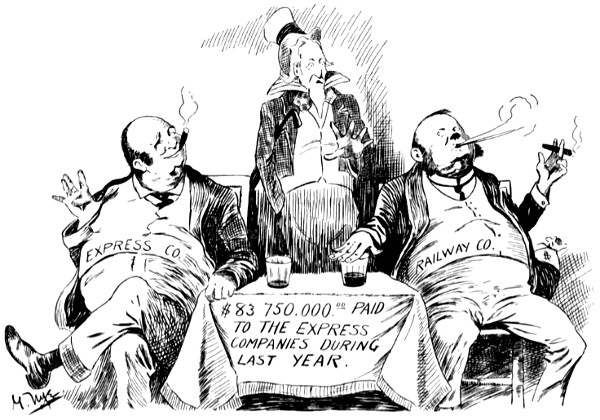
NOW YOU SEE WHY YOU DON’T GET THE PARCELS POST.
[45]
By giving to the merchant marine a sum of money out of the public treasury, over and above the freight which is earned.
Then, indeed, every incident of the Protective System will present a harmonious color-scheme, for THE TRUSTS WILL HAVE HOGGED THE WHOLE BUSINESS.
And that donation out of your tax money, which is intended to save the Trusts from the injurious burden of their own damnable Tariff System is the Ship Subsidy which the fat man said we need.
So long as the Protective System hurts the Common People it is a national blessing and must be gratefully sustained: but the moment the same system pinches the Protected Interests, they must rob you under the form of Ship Subsidy to get back what they lose by their own tariff.
Signs are plentiful that tens of thousands of honest Democrats and Republicans are profoundly dissatisfied with the trend of recent events.
We look to the State, and no beacon light gives us confidence.
The time was when our rulers loved the people, trusted the people, worked for the people. Those were the times when there was light on the hearth, plenty on the board, and hope in the hearts of the people.
Those were the times when our rulers remembered that our forefathers came here to build a temple, a government, differing in all vital respects from the hateful systems of the Old World.
For this very purpose—that of establishing a system entirely different from that of Europe—our forefathers braved the perils of the deep; fought hunger and faced death; battled with the wilderness and the savages it held; determined to die free, rather than live slaves.
In Europe they were fettered by class laws, class privileges, class tyrannies.
They were crowded out from a fair competition for a share of nature’s bounties by monopolies, chartered wrongs, statutory abuses, legalized spoliations.
Braver than we, their degenerate sons, they counted life worth nothing unless freedom went with it, and their coming here was a sublime protest against the Old World system of Class-law and special privilege.
What have we, today, as the result of all their heroism, and suffering and success?
We have our rulers aping everything Europe does, and fitting upon us, forever, the abominable system our forefathers fled to escape.
Where are class laws more insolently dominant than here?
Where is Special Privilege more tyranically exacting than here?
Where are monopolies more contemptuous of law and public welfare than here?
What people are greater slaves to misgovernment than you whose low-priced products must bear the strain of untaxed bonds, useless offices, and a steady growth of ever increasing salaries?
Who pay nine-tenths of all the taxes?
The many who toil.
Who gets the lion’s share of all the wealth produced?
The few who do not toil.
In what country do the laborers, in[46] shop and mine and mill and field, produce more of the good things of life than ours?
It cannot be named.
In what country has nature opened her royal hands with a more regal bounty?
It cannot be named.
Has there been any failure of harvest?
No.
Has there been pestilence, invasion, or civil strife?
No.
Then why is it that the signal guns of distress sound all along the commercial seas, telling of brave ships going down?
Why is it that the feet of the homeless and the unemployed beat the pavements of our great cities with a never-ending march?
Oh, brothers! why are so many hearths chill and dark, so many hungry mouths unfed, so many despairing souls weighed down with the nameless dread of the unknown future?
We have left the beaten track of our fathers. We have let the old landmarks be forgotten. We have gone after strange gods.
We have foresworn the faith upon which our republic was founded, and are being led back to the system our ancestors came here to shun. Why can’t we all see it? Why can’t we all act together? Why can’t we lay down prejudice, pride and passion, and devote our noblest efforts to the salvation of our country?
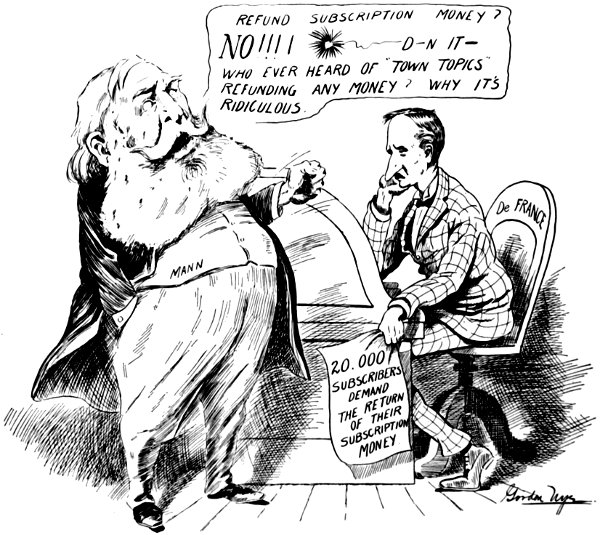
AN ABSURD PROPOSITION.
[47]
How can the Republican party cut loose from its Morgan-isms, its McKinley-isms, its Carnegie-isms, its John Sherman-isms, its Standard Oil-isms, its Steel Trust-isms.
How can the Democratic party cut loose from its Cleveland-isms, its Carlisle-isms, its Wall Street-isms, its Whiskey Trust-isms, its Sugar Trust-isms?
Neither will ever cut loose.
In the coils of the serpents of the sea, Laocoon may struggle, but will nevertheless be powerless to escape.
Why cannot WE cut loose from these corrupt and class ruled organizations, as Jefferson cut loose from Federalism, as Jackson cut loose from National Republicanism?
While we dispute as to names and organizations, the State suffers. While we quibble over technicalities of political practice, liberty asks in vain for help.
Would it were not so!
Would that we could agree where we differ, unite where we divide, and love where we hate.
Would that some divine touch of duty could lift us all to the summits of patriotism where the only rivalry would be that of service—the only purpose that of redeeming the land from those who despoil it.
Call the party what you please—names are nothing—but let us have a Union of all patriots who believe in equal and exact justice to all men, without special privilege to any. Let us have a democracy ruled by the people, instead of this greedy, corrupt, heartless plutocracy ruled by corporate money.
The Saturday Evening Post says that “Max Ihmsen, Hearst’s chief political adviser, was once a theatrical advance agent.”
Was once?
When did he quit?
Judging from the way he managed Hearst’s New York campaign, he’s as much of what he once was as he ever was—if not more.
***
That brightest and best of newspapers, the Washington Post, suggests that some Frenchman snuff out the wretched little cad, libertine, and aristocratic brute, Boni Castellane.
Granting that the snuffing out suggestion is a good one, why should a Frenchman be asked to shoot the contemptible and loathsome creature?
The American lady whose money he squandered, whose jaws he slapped, and whose life he wrecked, has three able-bodied brothers—why should the Gould brothers wait for a Frenchman to take hold of the snuffing out job?
***
Joseph H. Choate, being asked to define the difference between Cleveland and Roosevelt, answered, “Mr. Cleveland is too lazy to hunt and Mr. Roosevelt is too restless to fish.”
But see what a happy middle-course Mr. Bryan takes. When too restless to fish, he hunts; and when too lazy to hunt, he catches fish. In other words, you never can put your eye on him when he isn’t after it.
***
The Moguls of High Finance have about worked out their plans for an elastic currency.
[48]
Their own notes are to be used as money, and the only thing back of the notes will be “the general credit of the Banks.”
How pleasant it is to witness the process by which national finance simplifies itself and acquires that suppleness of joint which the Moguls call “elasticity.”
A Money system which rests upon a bottle of ink, a quire of paper, and a printing press is so simple that even a wayfaring fool may comprehend it.
And when it comes to pass that any Mogul of Finance can turn himself, in the twinkle of an eye, into a Paper-money Mill, our currency will be “elastic” to beat the band.
Go it, Moguls!
***
The brilliant paragrapher of the Atlanta Journal writes:
“The only thing lacking about the dismissal of those negro troops was that they should have been disbanded in Boston.”
Inasmuch as nearly all of “those negro troops” will be given permission to re-enlist, it isn’t clear to my mind that Boston couldn’t have enjoyed the episode quite as much as any other city—Atlanta, for instance.
***
The same paragrapher who is really one of the brightest of the bunch, remarks:
“Stonewall Jackson once declared that ‘nothing justifies profanity.’ But then he never tried being Speaker of the House.”
While we are at it, let’s put the case stronger than that.
What’s being Speaker of the House to living in a town like Thomson, whose name the outside world spells in seven different ways?
What’s being Speaker of the House to having a fat knave and a lean sneak doing business under your name in such a den as Town Topics?
What’s being Speaker of the House to having the fat knave and the lean sneak virtually tell the world, in a magazine bearing your name, that you are wealthy and therefore could afford to work for them for nothing?
What’s being Speaker of the House to having your own friends invited, by the Secretary of your National Committee, to come round to the SIDE DOOR of the Town Topics den, and drop ten dollars, each, into the Mann-hole?
Dear me! When it comes to claiming credit for not cussing, I could name several things that dwarf the proportions of the Speakership of the House.
Mr. Roosevelt went down to Panama to take a look at that big ditch which nobody seems to be digging very fast. Thus far the trench appears to be just large enough to hold the millions of dollars that the taxpayers are pouring into it.
While he was down there it is to be hoped that Mr. Roosevelt gave close scrutiny to the place where the administration of Jules Grevy, President of the Republic of France, slid into that same ditch. By marking the place, carefully, Mr. Roosevelt may possibly prevent his own administration from tumbling into the same hole.
***
They are raising a rumpus in Government circles because the liquor dealers are bottling whiskey in bottles—bearing the official stamp—that do not contain full measure.
It doesn’t much matter. The less whiskey the bottle holds the better for the man who holds the bottle.
Don’t shoot!
[49]
On the Pacific Coast there is an intense hostility to the yellow man.
The whites are at daggers’ point with Chinamen and Japanese.
Race hatred, you see.
Recently, the authorities of San Francisco have separated the two races in the schools.
Jap. children are not allowed in the white schools. Yellow must not mix with white. Contact is contaminating. Separate class-rooms, separate play-grounds, separate everything—so runs the educational order of the day.
Yet those white people of the Pacific Coast pretend that they cannot understand the attitude of the Southern whites to the negro.
It is all right for THEM to cultivate race-hatred of the yellow man, but all wrong for US to indulge race-hatred of the black man.
Queer kettle of fish, isn’t it?
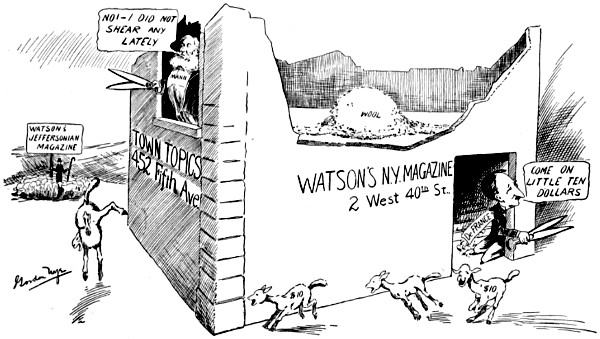
NO MATTER WHICH ONE DOES THE CLIPPING, THE WOOL HEAP GETS IT JUST THE SAME.
[50]
—From the Confederate Veteran.
[51]
The close of the old year and the beginning of the new finds the civilized world in a state of parliamentary deliberation, with the establishment of additional parliaments in various dependencies as one of the leading subjects of deliberation. The lawmakers of practically every nation in the two hemispheres are now in session, so the discussion of budgets and the agitation of reforms furnish ever-changing subjects of public interest.
The American mind has been moving forward from its varied and conflicting analyses of the recent elections to the concrete measures which will be introduced in Congress, and still it is unable to fix its attention definitely on serious subjects while the holiday spirit is in the air. Members of Congress themselves feel that they are merely in Washington for a few days to outline a program for a later date.
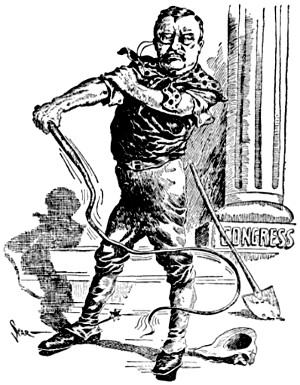
New York Globe
“NOW TO BUSINESS.”
Congress convened on the first Monday in December, and on the following day the President’s message was transmitted to that body. It is generally agreed that Mr. Roosevelt’s communications to the federal law-makers are increasingly partaking of the nature of open letters to the American people rather than being definite suggestions to the House and Senate of the measures which should be enacted at the current session into law. The present document is no exception to that rule. It is largely made up of homilies which recall the waggish comment of Tom Reed about “Roosevelt’s delightful enthusiasm over his discovery of the Ten Commandments.” Such is practically the view of The Washington Herald, for instance, which says that “Congress will regard the counsels of the President as the obiter dicta of a distinguished publicist, awakening the public conscience, but without special bearing on the work of the present session.”
The forces of reform were delighted to find him advocating a law prohibiting corporations from contributing[52] to campaign funds, the failure to pass which during the first session of the present Congress, when reform was in the air, was the subject of considerable criticism. It is pointed out that he does not now go so far as to advise that all contributions shall be made public. He is quoted, since the transmission of his message, as favoring a return to the large insurance companies of the funds they contributed to the last Republican campaign, and this has brought forth the question from his critics: Why disgorge only the contributions of the insurance companies, when the funds belonging to stock-holders, as well as to policy-holders, have been used by various corporations to influence elections?
One of those homilies to which reference has been made is the President’s discussion of lynching and the race question. No one will take issue with him on what he says on the subject—unless it be on the statement that two thirds of the lynchings are for crimes other than rape. He quotes Ex-Gov. Candler as saying that he had, within one month, saved a dozen innocent negroes from lynching. After still further discussion of the question, the President advocates the infliction of the death penalty for rape and urges that assault with intent to commit this crime be made a capital offense, “at least in the discretion of the court.”
All this is, of course, a matter with which the states alone can deal, except in the territories under the exclusive jurisdiction of the federal government. On the general subject of lynching, The Brooklyn Eagle says that “the President is right in his preachment, but would be tempted to ignore it if he were in private life, and a citizen of a Southern state.”
The relations of labor and capital come in for considerable discussion, and the cause of labor is well sustained. The President advocates a rigid enforcement of the eight-hour law, where practicable, a conservative use of injunctions, and an investigation of the conditions of the labor of children and women.
Senator Beveridge is already primed with a bill which will reach the child labor question, through the elastic Interstate Commerce Commission, by prohibiting the interstate transportation of commodities on which child labor has been employed.
The President favors the enlargement of the Employers’ Liability bill, passed at the last session of Congress, so as to place the “entire risk of the trade” upon the employer, and he favors federal investigation of controversies between labor and capital.
He advocates an enlargement of the meat inspection bill, so as to provide for placing the date of inspection on the label and throwing the cost of inspection on the packers.
He urges the more complete control of corporations in general, “by a national license law, or in other fashion,” which is one of the utterances anticipated with the keenest interest.
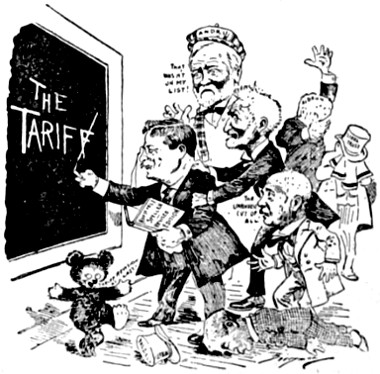
Washington Post
TEDDY’S ONLY TARIFF REFORM.
[53]
He comes out for an inheritance tax, an income tax, and mildly urges a ship subsidy and currency reform.
A bill providing for free trade with the Philippines passed the House in the last session, but it met its death in the Senate at the hands of members who feared that it would seriously affect the beet sugar industry. The President again recommends the adoption of this measure, or at least a reduction in the Philippine tariff; and, as one result of his visit to Porto Rico, he asks that the inhabitants be granted United States citizenship. A special message on this subject, it is said, will go to Congress later.
His utterances on the Japanese question are perhaps the most sensational in the entire document. At least they have proven so, from two points of view. After paying a splendid tribute to the “little brown men” of the Orient, and advocating the adoption of naturalization laws in their behalf, he makes an attack upon the principle of state rights which has attracted more than ordinary attention. The exclusion of Japanese children from the public schools of San Francisco, which is discussed more at length elsewhere, has occupied a foremost place in the public mind for some time, and it is generally conceded to have largely resolved itself into a question of state rights, and the power of the federal government to force an observance of international treaties on the individual states, particularly where state laws alone are involved. The President demands that the civil and criminal laws of the federal government be so amended as to “enable the President to enforce the rights of aliens under treaties.”
Further along he made some nebulous threats about employing all the force of the army and navy in behalf of the Japanese, if necessary, and at once the California representatives were, themselves, up in arms. The President hastened to explain that he had been misunderstood—that he only meant to say that he would protect the Japanese from mob violence, by aid of the army and navy, if necessary, so the members from the Pacific slope are satisfied.
In the meantime the President has instructed the department of justice in California to make a test case of the state law segregating “the children of Mongolian parentage” from the whites in public schools, and it is believed that the matter will thus be settled.
The remainder of the message is devoted to the Rio conference, the situation in Cuba, Central America and Alaska, the maintenance of the navy at its present efficiency, and the approaching session of the second peace conference at the Hague.
While various public men have selected a variety of sentences from the Presidential Message as being particularly striking, our readers may have a natural curiosity to know what sentence in the message of the President most impressed our Editor-in-Chief. His section of the Magazine had been closed before the President’s message was made public, but in a private letter to me, Mr. Watson remarks that the finest sentence to be found in Mr. Roosevelt’s recent message to Congress, is this:
“Neither a nation, nor an individual, can surrender conscience to another’s keeping. A just war is far better for the soul of a nation than the most prosperous peace obtained by acquiescence to any wrong or injustice.”
Mr. Watson thinks that the manner in which the President emphasizes the fact that a nation, like an individual,[54] should not consent to live under dishonorable conditions, was very fine.
***
In addition to the editorial expressions which have been incidentally quoted in the foregoing summary of the message, The New York World says that “if Roosevelt would advocate tariff reform and if Mr. Bryan would stop advocating government ownership of railroads, they would be substantially in accord.” The New York Tribune says “the message is characterized throughout by that courage with which the President habitually faces public questions.” The New York Press thinks the reading of it must have given the trust-owners “a night of restless slumbers.” The New York American calls it “the most ambitious state paper of his career.” The New York Times thinks the wisest counsel the President gives Congress is to “obviate the evil of prohibiting all combinations of capital, whether good or bad.” The New York Sun devotes its criticisms chiefly to those matters affecting the judiciary.
The echoes of the Presidential message had scarcely died away, when the President communicated to the Senate a long list of nominations which included many changes in his Cabinet. Root, Taft and Wilson will remain where they are. Charles Jerome Bonaparte, will become Attorney General; Secretary Victor H. Metcalf, Secretary of the Navy; Oscar S. Straus, of New York, Secretary of Commerce and Labor; George B. Cortelyou, Secretary of the Treasury, in place of Leslie M. Shaw, who is to resign, and Mr. Cortelyou will be succeeded in the Post Office by Mr. George V. L. Meyer; James R. Garfield, Secretary of the Interior.
The appointment of Attorney General Moody to a position on the Supreme Court Bench has brought forth considerable criticism. Before him, in that capacity, must come for review much of the litigation in which he, as prosecuting attorney for the government, has been interested. Nearly forty million dollars in various suits are being held up for a hearing before a full bench. According to established precedent, Mr. Moody should not pass upon them, after having been identified with them in the Department of Justice. No definite opposition to his confirmation is manifested, however.
The general elections are receding farther and farther into the past, and public interest in the matter is abating. The returns in the state of New York, showing the election of the entire Democratic ticket with the exception of the head, have been interpreted according to the personal views of the interpreters, but the truth seems to be that there was a general uprising in favor of reform, brought largely to the forefront by Hearst, but that the personality of Hearst himself, coupled with his adhesion to Boss Murphy, was something that the people would not stand for, and hence his defeat. Representative Jas. W. Wadsworth paid the penalty of his opposition to the meat inspection bill, and will not be in the Sixtieth Congress.
WHEN THE SIXTIETH CONGRESS CONVENES
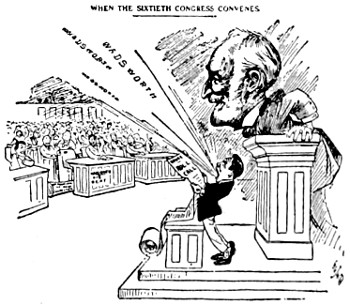
Washington Herald
[55]
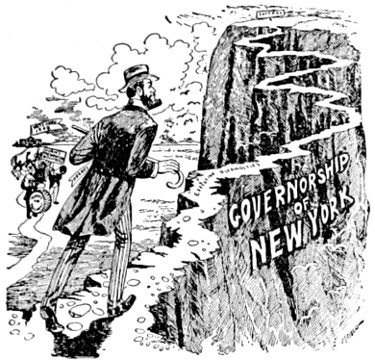
Brooklyn Eagle
“DON’T DISTRACT HIS ATTENTION.”
A survey of the elections as a whole shows that the Republican majority in the Sixtieth Congress will drop from 112 to 58. The Republicans carried every Northern state by reduced majorities, and the Democrats carried every Southern state, in many instances by increased majorities, at the same time redeeming Missouri from the Republican ranks into which she passed for the first time with the Roosevelt tidal wave. In the lower house of the Sixtieth Congress there will be an even hundred new members.
The Republicans of the Senate, will probably make a gain of four members. The terms of thirty senators will expire on March 4, 1907, fifteen of them being Democrats and fifteen Republicans. Patterson, of Colorado, Guerin, of Oregon—appointed to succeed the late Senator Mitchell, who died in disgrace—Dubois, of Idaho, and Clark, of Montana, are the four Democrats who will probably be succeeded by Republicans. Then the Republicans in the Senate will have more than a two-thirds majority.
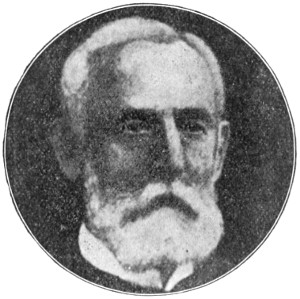
SENATOR JOHN F. DRYDEN.
Senator Dryden, the life insurance president of New Jersey, doesn’t know whether the legislature in January is going to re-elect him or not—and no one else seems to know any more than he does. The Republican majority is very close, and there is considerable defection in the ranks. He may be opposed by Gov. Edward S. Stokes.
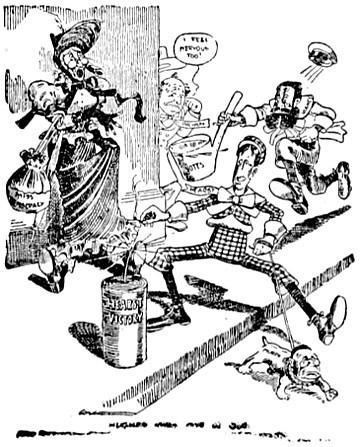
Chicago Inter-Ocean
“HUGHES WILL PUT IT OUT.”
Pennsylvania went Republican all right, but it was not exactly as “Maine went for Governor Kent.” Edwin S. Stuart—the first bachelor in a generation, by the way, to occupy the Keystone White House—is conceded to be “a very nice man,” so the Republicans elected him over the fusion candidate, Emery. It is charged in some quarters that his election indicates that Pennsylvania has recovered from her spasm of[56] righteousness and reform, but the fact remains that Boss Penrose is now asking that things be done instead of demanding them, as he formerly did, after the manner of the Quay school in which he was educated.
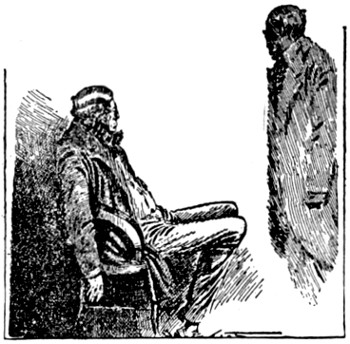
New York Mail
THE MAN THAT BEAT HEARST.
New Hampshire has a peculiar election system. If no candidate receives a majority over all, the election is thrown into the legislature. Hon. Charles M. Floyd, Republican, received a plurality, but not a majority. His election by the legislature is assured, however.
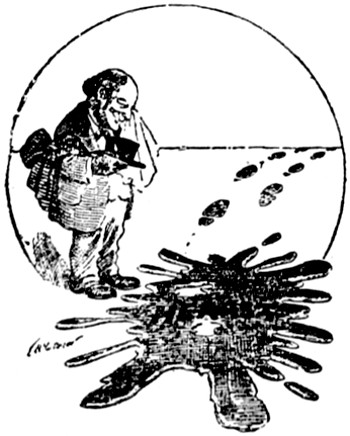
MR. BRYAN—“ALAS, POOR HEARST! I KNEW HIM WELL!”
—Chicago Tribune.
The election of James O. Davidson as governor of Wisconsin was hailed as a victory for the anti-Follette forces, since they had opposed his nomination, but the junior senator made his influence felt in no uncertain way elsewhere, notably in the defeat of Representative Babcock, who has served seven terms in the house, and for a long period was the official fat-fryer of the Republican Congressional Campaign Committee.
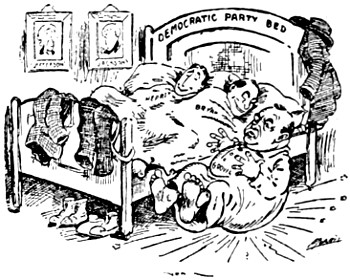
Spokane Spokesman
“SHOVED OUT.”
The new state of Oklahoma selected Democratic members of the constitutional convention and will stand by Jeffersonian principles. Some effort is being made to embody white supremacy provisions in the organic law which is being framed, and this has started a discussion as to whether the President, under those circumstances, would issue the proclamation admitting the new state to the Union. It is recalled that under somewhat similar circumstances the statehood of Missouri was held up for fifteen months.
Such is a running review of the results of the elections, but, as previously indicated, the measures to which Congress will devote its attention after the Christmas holidays are the center of interest.
A concerted effort is being made to force the administration to take up the subject of tariff reform, notwithstanding the fact that the President ignored the subject in his message.
[57]
One of the notable conventions of the year was that of the National Divorce Congress which assembled in Philadelphia on Nov. 19 and 20 for the purpose of formulating a uniform divorce law which, it is hoped, would be enacted by all the states of the Union. It was the legislature of Pennsylvania which took the initiative in this matter, not only by codifying and examining its own laws, but by arranging a conference, through Governor Pennypacker, to discuss the matter of uniform divorce laws. This conference was held in Washington last February and a committee was appointed to draw up a model bill to present to all the states. Thirty states and territories were represented at the Congress in Philadelphia and the grounds for absolute divorce, as presented by the committee and adopted by the Congress were:
1. Adultery.
2. Bigamy, at the suit of the innocent and injured party to the first marriage.
3. Conviction and sentence for crime, followed by continuous imprisonment for at least two years, or under indeterminate sentence for at least one year.
4. Extreme cruelty, endangering life or health.
5. Wilful desertion for two years.
6. Habitual drunkenness for two years.
About the least pacific section of our united country just at present is the Pacific slope. The action of the Board of Education of San Francisco in excluding Japanese children from the regular public schools of the city, and requiring that they be segregated in schools set aside exclusively for them, has aroused the deepest interest all over the country, and its echoes are reverberating on the shores of the Chrysanthemum kingdom. It is becoming increasingly evident that the matter of excluding the Japanese from the public schools is not the crux of the matter. It is but a symptom of a very general condition of dislike and distrust. The people of California frankly declare that the more they see of the Japanese the less they like them and that since the Russo-Japanese war, as one resident of the state puts it, “the Japs are getting too blamed cockey.” The Californians assert that they have the sympathy and support of the entire Pacific slope in their determination to hold the Japanese in check. They point to the fact that the little brown men practically dominate the labor situation in Hawaii, and that they are making that territory merely a half-way house to California, which they will likewise over-run. The labor unions, which are particularly strong on the slope are strong in their antagonism to the Japanese.
It is boldly declared by many representative citizens of California that they will not stop short of introducing a bill in this or the Sixtieth Congress excluding the Japanese from the United States on practically the same terms as are now applied to the Chinese, who are held in some quarters to be more desirable.
Many interesting questions of national and international law are involved in the present situation.
Those who advocate a federal law excluding the Japanese are reminded that the existing treaty, which was negotiated by Mr. Gresham in Mr. Cleveland’s second administration, provides that “this treaty shall go into operation on the 17th day of July, 1899 and shall remain in force for a period of twelve years from that date.” Twelve months’ notice, from the time of expiration, must also be given by either party, if such party desires to terminate the agreement. Notice of termination cannot be given,[58] therefore, until July 19, 1911, and until July 1912, it must continue as the supreme law of the land. Consequently the adoption of a Japanese exclusion law cannot become effective for five years and a half. The President’s advocacy of naturalization for the Japanese is not received kindly on the slope. In addition to all this Mayor Schmitz and Abe Ruef, the political “boss,” have been indicted for extortion.
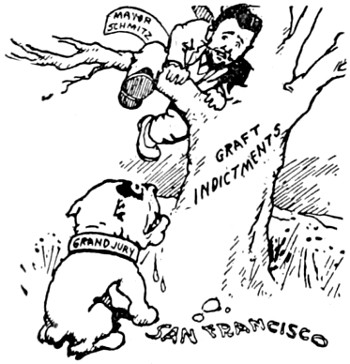
TREED!
Philadelphia North American
The month of November was marked by the announcement of the most general increase in the wages of employes ever recorded in this country during so short a period. This increase was made, for the most part, by the railroads and other large corporate interests and chiefly affects employes whose salaries are less than $200 a month. In many instances the advance began with the first of December, while in others it becomes effective with the new year.
It would be a difficult matter to make anything like an approximate estimate of this golden harvest which is to go into the pockets of the laboring men. It is said by those who are in a position to know, that the advance in wages announced by the railroads during the month of November would alone amount to $20,000,000 annually, affecting 200,000 employes. Even so conservative an authority as The Chicago Evening Post thinks it entirely probable that the advance in the wages of railroad employes becoming effective on the first of the year will reach something like $100,000,000 a year, while others place it still higher. The Steel Trust and the street railroads have also advanced wages.
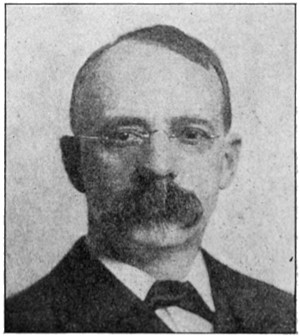
EDWARD H. HARRIMAN.
It is only fair to say, in dwelling upon this general advance in the wages of labor in so many departments of industry, that, according to the mercantile agencies, the cost of living is higher now than it has been at any time in twenty years, and the continuance of agitation and discontent in certain quarters is held to be justifiable for the reason that the purchasing power of a dollar is so much less than formerly that it is no more than off-set by an increase of ten per cent in wages.
The final triumph of Edward H. Harriman over President Stuyvesant Fish, of the Illinois Central, after a long and bitter feud extending over[59] many years, is still a topic of absorbing interest in the railroad world and to the public in general. At a special meeting of the directors of the road held in New York early in November Mr. Fish was defeated for re-election by a vote of eight to four, the thirteenth director, Vice-President Welling, being confined to his bed from an illness of which he died a few days later. The formal complaint made against President Fish was that he had not observed the “harmony” agreement of last July, when it was at one time proposed that a special committee should solicit proxies, and not Mr. Fish personally. He was charged with arrogating to himself alone “the duty and function resting upon the entire board,” and not being able to “distinguish between the powers and duties of the president and those of the directors of the corporation.” The purpose of the board was known before-hand and it was no surprise when James T. Harahan, one of the vice-presidents, was chosen to succeed Mr. Fish.
The nomination was seconded by Charles A. Peabody, President of the Mutual Life Insurance Company, which was one of the many reasons sustaining the belief on the part of Mr. Fish’s friends that his refusal to take part in the “white-washing” of the Mutual officials was really responsible for his overthrow. It is recalled that Harriman made threats at the time that he would make reprisal on Fish for his refusal to knuckle under.
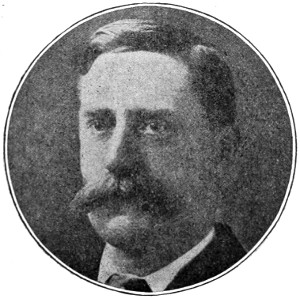
STUYVESANT FISH.
In the meantime Mr. Fish announced his intention of carrying the matter into the courts. The constitution of the state of Illinois provides that “no railroad corporation shall consolidate its stock, property or franchises with any other railroad corporation owning a parallel or competing line. A majority of the directors of any railroad corporation now incorporated, or hereafter to be incorporated by the laws of this state, shall be citizens and residents of this state.” Of the directors of the Illinois Central only three, at the time of the recent election, were residents of the state of Illinois. They were Gov. Deneen, who is an ex-officio director by reason of his office as governor, James T. Harahan, the new president, and John C. Welling, who has since died. It is not denied that for thirteen years a majority of the directors have not been “citizens and residents of Illinois,” and the scope of the immediate issue is enlarged by the fact that if the courts hold the present board to be illegal, so also will be the work of every board for the past thirteen years, including issues of stocks, bonds, etc.
Harriman’s control of so vast a system of railroads is naturally regarded as a menace. The Union Pacific and the Southern Pacific, of which he is absolute master, aggregate 15,000 miles, with an outstanding capitalization of $1,031,000,000. The Chicago & Alton and the Illinois Central, which he practically controls, have a mileage of 6,668, with a capitalization of over $380,728,223. He is largely in control of the Baltimore & Ohio, the Reading and the Central of New Jersey railroads, with a mileage of 7,255 and a capitalization of practically $770,000,000. He is a stockholder and director in Erie, which[60] has a mileage of 2,553 and a capitalization of $382,900,000. Thus he is a moving spirit and to a large extent the dominant figure in 31,000 miles of railroad, with a capitalization of more than two billions and a half of dollars. It is not surprising that an investigation on the part of the Interstate Commerce Commission is now announced.
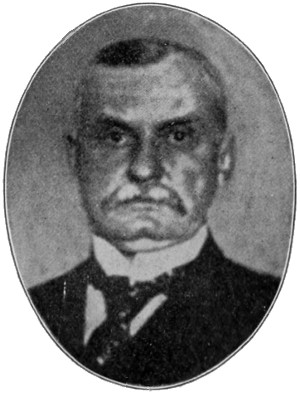
THOMAS F. RYAN.
One of the recent surprises in Wall street was the resignation of Thomas F. Ryan as a director from more than twenty railroads and industrial corporations, including the leading trusts of the country. Coincident with his retirement came the announcement that he was one of a number of American capitalists who had secured from King Leopold of Belgium certain rights in 8,400,000 acres of land in the Congo Free State, for the purpose of developing the rubber and mineral resources, building railroads and otherwise exploiting that vast territory.
An effort is being made in Congress to have this government join in an investigation of conditions in the Congo and several of Leopold’s lobbyists are in hot water.
No event in recent years has created a more profound sensation than the tragic death of President Samuel Spencer, of the Southern railroad, who was killed in a rear-end collision on his own road on the morning of Thanksgiving day. Mr. Spencer was a native Georgian, and worked his way through all the grades of his calling to the presidency he held at the time of his death. Many personal tributes have been paid to Mr. Spencer, but the fact that he was a victim to the inefficiency of his own railroad system has been commented upon with decided emphasis. Readers of The Jeffersonian Magazine will recall the heated controversy last summer between Mr. Watson and the editor of The Macon Telegraph. The latter criticised Mr. Watson for making the point that Mr. Spencer, as a railroad manager, squeezed too much money out of the South into the pockets of Wall street millionaires, allowing his road to become dangerous, allowing employes to be overworked, allowing bridges to become decayed, refusing to double-track where double tracking was needed and refusing to employ a sufficient number of men to do the amount of work necessary in the proper operation of the property. The text from which Mr. Watson preached was the official commendation of Mr. Spencer by the voting trustees of the Southern Railway Holding Company. They praised him because he had, during the last thirteen years, doubled their property, trebled the gross earnings, and increased the net earnings, over and above all operating expenses, more than 525 per cent. He took this report and proved that instead of being something for Mr. Spencer to be proud of, it was something to make him ashamed, since it proved conclusively that the road was being run simply from the standpoint of those who wanted dividends and who did not care how unsatisfactory was the service, nor how many lives were lost because of the failure to adopt safety appliances, double tracks, and by failure to abolish the deadly grade crossings. Mr. Watson feels that the fate which has overtaken Mr. Spencer is the most appalling proof that could be furnished that he was right in his contentions.
[61]
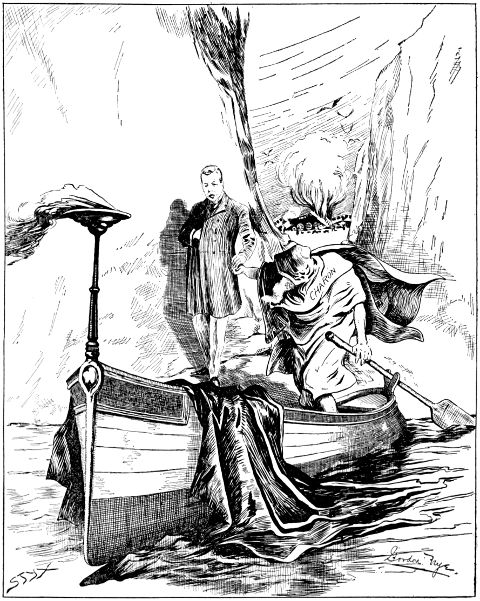
“HE WAS DEAF TO ALL WARNINGS, AND AT LENGTH HIS OWN TURN CAME.”
[62]
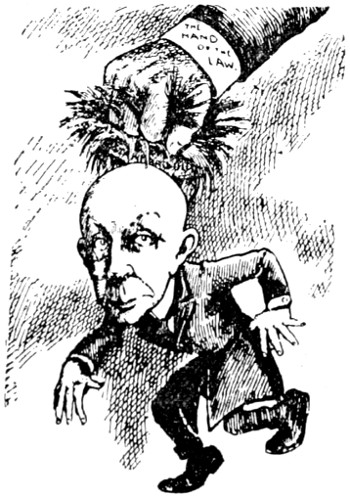
TOO CLOSE FOR COMFORT
The hand of the law will get old John D. himself
yet.
—Minneapolis Journal.
The press of this country and England view the matter in the same light. The Brooklyn Eagle, in discussing the matter, says, “We can only deplore this very able man’s loss. We can only hope that his sacrifice may result in no further disregard of the precautions that would have averted it, had those precautions been observed. Until that time,” continues the Eagle, “we may expect preventable ‘accidents’ which wear every quality of murder except its intent.” The Pall Mall Gazette, of London, founded by W. T. Stead, expresses the hope that Mr. Spencer’s death “will arouse those responsible for the management of American railroads to a feeling that it is desirable to make them safer.” The statistics of accidental deaths in America, says The Gazette, “are appalling to the English mind, but seem to have little effect in America. But the inclusion of directors among the victims is almost proverbial as the surest route to reform.”
In spite of these solemn warnings another fatal rear-end collision occurred on the Southern within ten days, a short distance from the scene of the former accident.
Mr. Spencer has been succeeded, as President of the Southern, by Mr. W. W. Finley, formerly second vice-president of the road.
The most definite and concrete form which the agitation against trusts and combines has ever assumed in this country, and the most interesting legal step the government has taken in a generation, was the filing of a bill in equity, by United States Attorney General Moody, on Nov. 15, in the Eighth Judicial Circuit, in St. Louis, Mo., against the Standard Oil Company, of New Jersey, and seventy of its subsidiary corporations and limited partnerships, as well as against seven of the leading officers and directors of the big trust, to have the combination dissolved under the Sherman Anti-Trust law, as being in restraint of trade and commerce. The government, for nearly two years, has been gathering information on which to base some such action. But last June the attorney general appointed two assistants, Messrs. F. B. Kellogg and C. B. Morrison, to act with Assistant Attorney General Purdy in gathering information as to the transgressions of the Oil Trust in the business of refining, transporting, distributing and selling oil throughout the United States.
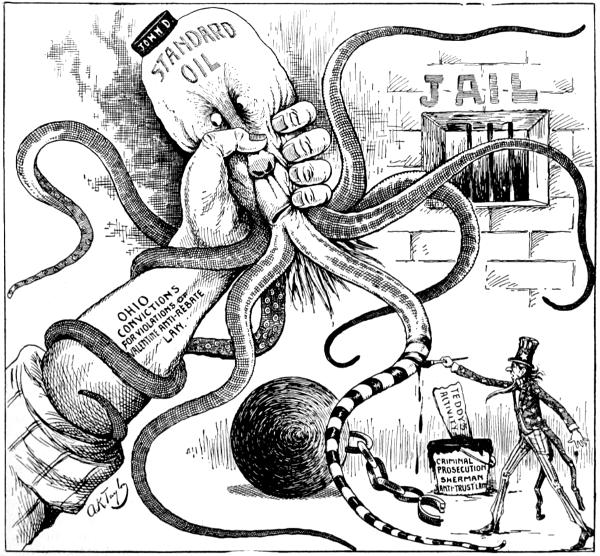
THE STRIPES MAY GO ON YET, IF YOU DON’T WATCH OUT.
Their report was such as to justify legal action on the part of the Department of Justice, and after the information had been carefully examined[63] by the President and the Cabinet, the bill in equity was filed. The recital of alleged facts in this petition, is virtually a history of the Standard Oil Company from its infancy to the present time. It sets forth that the Standard Oil Company, of New Jersey, with its seventy allied corporations and limited partnerships, produces, transports and sells about 90 per cent of the refined oil products used in this country and about the same proportion of the refined oil exported from the United States; that this practical monopoly has been procured by a course of action which, beginning in 1870, has continued, in the main, under the same persons down to the present time; that these persons now surviving are John D. Rockefeller. William Rockefeller, Henry H. Rogers, Henry M. Flagler, John A. Archbold, Oliver H. Payne and Chas. M. Pratt; that their design throughout has been the suppression of competition in the production, transportation and sale of refined oil and to obtain a monopoly therein; that between 1870 and 1882 the purpose was effected by agreements between many persons and corporations engaged in this business; that in the latter year the business was made certain by vesting in nine trustees, including five of[64] the persons named above, sufficient stock in the thirty-nine corporations then concerned to suppress competition among themselves; that this plan was acted upon until it was declared illegal by the Supreme Court of Ohio, in an action against the Standard Oil Company of Ohio, one of said corporations, in 1892; that during the seven years following, the same individual defendants, as a majority of the liquidating trustees, were pretending to liquidate the trust, but as a matter of fact were managing all the corporations in the same old way and were exercising the same control over them; that in 1899 the individual defendants increased the capital stock of the Standard Oil Company, of New Jersey, from $10,000,000 to $110,000,000; that the company was then a producing and selling corporation, and that they added to its functions the power of purchasing stock in other companies, and practically all the powers exercised by the trustees under the unlawful agreement of 1882; that the Standard Oil Company, of New Jersey, then taking the place of the trustees, acquired all the stock of the corporations theretofore held and controlled by the trusts, paying therefor by the issue of its own shares in exchange; that the President of the Board of Trustees became the president of the Standard Oil Company, of New Jersey, that the trust assumed the direction of the business of the Standard Oil Company, of New Jersey, and has continued it ever since.
After this summary of Standard Oil history, the petition goes on to say that the purpose and effect of the corporation as a holding company was precisely the same as the purpose and effect of the appointment of the trustees previously referred to, namely: to suppress competition between the corporations and limited partnerships, whose stock was first held by the trusts and then by the Standard Oil Company, of New Jersey; that by the foregoing methods, and by securing railroad rates which discriminated in favor of the corporations whose stock was held by the holding company, the latter was enabled to secure a monopoly in large sections of the country, with the result that prices to consumers are much higher in those sections than in sections where competition, to some extent, prevails.
The bill further sets forth that from 1882 to 1895 the Standard paid dividends amounting to $512,000,000 on a professed valuation of a trifle less than $70,000,000, besides accumulating a surplus “of unknown magnitude,” and that for the last nine years the dividends have run from 33 to 48 per cent.
Almost on the very day that this bill was filed the Standard declared a quarterly dividend which aggregated $10,000,000.
In filing this bill Attorney General Moody said that the question of criminal prosecution would be left “for future consideration.”
Whatever may be the disposition of the Attorney General of the United States in regard to the criminal prosecution of Standard Oil officers and directors, there seems to be no doubt as to the attitude of Prosecutor David, of the state of Ohio. The grand jury of Hancock county has returned an indictment against the Standard Oil Company, of Ohio, and against John D. Rockefeller, president of the Standard Oil Company, of New Jersey, as well as three directors of the subsidiary corporation in the Buckeye state. Previous proceedings against the same defendants, taken on an information brought before the Probate Court of that state, are now being held up, pending the decision of the higher court as to the jurisdiction of the court below. The present indictments by the grand jury are based on the evidence adduced in the previous trial.[65] Conviction would subject the defendant company to a maximum fine of five thousand dollars, which, however, it is believed, may be imposed for ever day covered in the indictments. Mr. Rockefeller and the directors of the subsidiary company would be subject to the same fine and to imprisonment for a period of from six months to one year. More recently Prosecutor David is quoted as expressing the belief that he has sufficient evidence to bring not only Mr. Rockefeller, but all the highest officials of the controlling company before the Ohio courts.
In the meantime he has taken steps to secure an alternative writ of mandamus against the Buckeye Pipe Line Company, said to be owned by the Standard Oil Company and operated in such a manner as to stifle competition, requiring that the defendant provide for the public equal and just facilities and demanding that they fix a schedule of rates.
In St. Louis the Federal grand jury has brought in two indictments, with a total of seventy-two counts, against the Waters-Pierce Oil Company for violation of the Elkins Anti-Rebate law. If convicted on all the counts the maximum penalties would exceed a million and a half dollars.
The proceedings taken by the attorney general of Texas to oust the same company from that state have developed a collateral sensation of great size. Attorney General Davidson demands of the defendant company certain vouchers which, it is alleged, will show that Senator Joseph W. Bailey was paid various sums of money by the Waters-Pierce Company to secure its readmission to the state, and gives out that if this evidence is not forthcoming, secondary evidence will be offered to establish the alleged fact. Senator Bailey indignantly denies that he received any such sums, and announces that he will prosecute for perjury anyone who swears to the existence of such evidence. Senator Bailey has already been nominated by primary, but his re-election will come before the legislature which convenes in January.
In the meantime the New York Central Railroad and the Sugar Trust have been fined heavily for, respectively, giving and receiving rebates.
One of the results of the investigation conducted by the Armstrong committee into the affairs of the New York and the Mutual Life insurance companies was the enactment of legislation providing that the affairs of the two companies should be taken out of the hands of the existing boards of trustees, that all outstanding proxies should be invalidated and that the policy holders should be given an opportunity to choose the men who should thereafter manage the affairs of the two companies. In pursuance of this law the policy holders began voting on Nov. 18 and continued to cast their ballots for or against the administration tickets until Dec. 18. In the New York Life the administration ticket consisted of “the best of the old trustees,” together with some new blood, while an opposition ticket was presented by the International Policy-Holders Committee, of which the Hon. Richard Olney was chairman. In the Mutual contest there were three tickets: an administration ticket, the United Committee’s ticket and a fusion ticket. The second of these was so called because it was the product of the united efforts of the Mutual Policy Holders’ committee and the International Policy Holders’ committee of which Mr. Samuel Untermyer was the chief organizer and sponsor. The fusion ticket was made up of candidates from the administration and the Mutual Policy Holders’ respective rosters. At the time we go to press the result of the elections is not known.
[66]
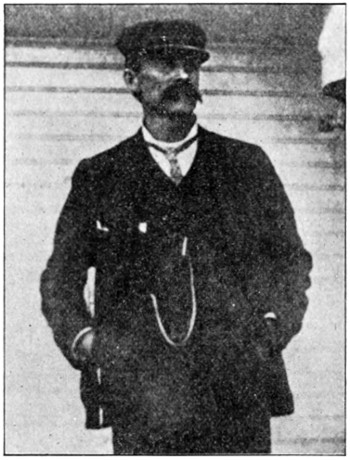
ROBERT E. PEARY.
Commander Robert E. Peary has returned from his expedition to reach the north pole. After suffering innumerable hardships he reached a latitude of 87 degrees and 6 minutes. This was within 203 miles of the coveted goal and thirty-four miles farther than the point reached by the Duke of Abruzzi expedition, which had hitherto held the record.
Up in Canada they are still telling the story of the habitant who, when told that the Queen was dead, asked, “Who is Queen now?” He was told that there was no Queen, but a King had ascended the throne, whereupon the admiring peasant exclaimed, “My, what a pull he must have with Laurier!”
The Canadian parliament assembled at Ottawa on Nov. 22—four months earlier than usual—with its Liberal majority practically unimpaired, and the Premier continues to hold the pre-eminence in Canadian affairs indicated by the artless tribute of the habitant.
The Dominion has not escaped the muck-rakers, and the Conservatives are bringing wholesale charges of corruption at the polls.
On Nov. 29 Minister of Finance Fielding introduced his long anticipated tariff bill. Briefly stated, this measure provides for an intermediate tariff, the rates of which shall be between the preferential rates conceded to the mother country and the general tariff which applies to other countries. This intermediate tariff may be held out as a basis of reciprocity negotiations with such countries as show a disposition to meet the Canadian government half way.
The situation in Central and South America is unusually quiet. As a result of the President’s visit, the working forces on the Panama Canal have been completely reorganized. It has been definitely decided not to appoint a governor of the Canal Zone to succeed Magoon, and an order has been promulgated to give Chairman Shonts more complete control over the administration portion of canal construction, while Chief Engineer Stevens is placed in absolute control over Panama. Bids for the contract to complete the canal will be opened Jan. 12.
Cipriano Castro, the fire-eating President of Venezuela, may not be dead, but he will soon work himself to death denying the charge unless he does something definite before long. It is evident that he is in a very low state of health, and the end may come at any time.
Alfonso Penna was inaugurated President of Brazil on Nov. 16. He is in thorough accord with the efforts to establish closer trade relations between his country and the United States.
Argentina holds her own as the most prosperous and progressive of South[67] American states, and Chili is rapidly recovering from the disastrous earthquake which visited her last fall.
The youth of the land, and even the children of larger growth, will be glad to know that according to recent investigations the Island of Juan Fernandez, so dear to the hearts of every boy who has grown up on Robinson Crusoe, was not sunk into the sea by the disaster, as at first announced, but remains intact.
Gov. Magoon has declared vacant the seats of the senators and representatives elected to the Cuban Congress in 1905, and another election will be held. The rivalry of Moderates and Liberals continues, while the Liberals, particularly, are divided among themselves. It is evident that American occupation of the island must continue for some time.
That order of history which is “philosophy teaching by example” has been moving steadily and persistently over the face of Europe toward a policy which the fathers of our own republic foresaw and adopted a hundred and twenty years ago. Perhaps the most pronounced feature of Liberalism in the Old World today is the conviction that the separation of church and state must become an accomplished fact. A movement so vast could not be carried forward without being complicated in some measure with bigotry and fanaticism, but on the whole it may be said that it is inspired and sustained by the highest motives of state policy.
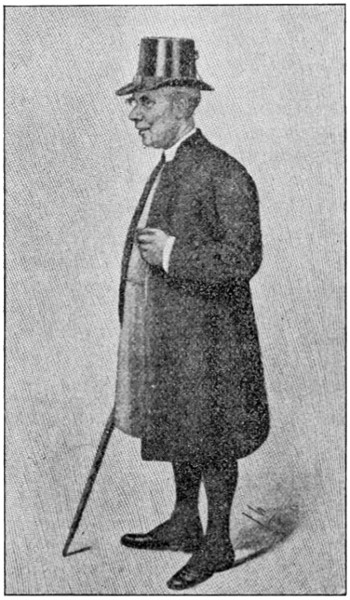
From a Drawing by “Spy.”
THE ARCHBISHOP OF CANTERBURY.
The present Liberal ministry in England, which succeeded the Balfour government, appealed to the country on the issue of free trade and was overwhelmingly sustained. But since that time it is safe to say that the Education bill, introduced by Augustine Birrell, President of the Board of Education—and whimsically called the “Birreligious bill”—has been the measure most discussed by the British people and the world at large. Briefly stated, this bill provides that, beginning with January of next year, only such schools as are provided by the local educational authorities throughout England shall be recognized as public schools, and after that date no public funds can legally be spent on any other schools. In other words, if the present denominational voluntary schools wish to receive government support they must become public schools, and as such must be content with the same undenominational teaching that is given in other public schools. The bill provides, further, that attendance shall not be compulsory, and that there shall be no religious test for teachers chosen by the local authorities. In those schools which are taken over by the educational[68] authorities from the religious organizations—by the consent of the latter, of course—religious instruction may be given two mornings a week, but not by the regular staff of teachers, and not at the public expense. The bill further provides that $5,000,000 shall be appropriated for educational purposes by the government.
This measure, which has set all England in a ferment, was passed by the House of Commons, but in the House of Lords it met vigorous opposition, particularly from the spiritual peers, headed by the Archbishop of Canterbury. On Dec. 6 it passed the upper house, so mutilated as to be unacceptable to the Commons. The agitation in favor of mending or ending the chamber of peers has been coming prominently forward. No basis of compromise between the upper and lower house has yet been found. Since the Education bill is sent back to the House of Commons with its most vital features stricken out, the Liberal Government will probably go on to other legislation, equally unacceptable to the peers, and thus force them to reject a number of measures which are demanded by the people. They will then appeal to the country, and the ending of a system of hereditary legislators may be involved in the popular mandate.
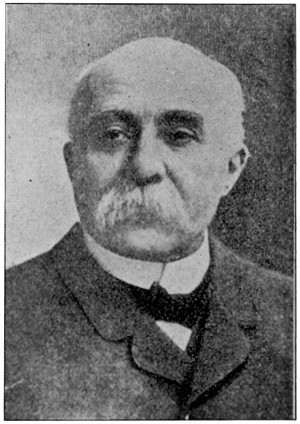
PREMIER GEORGES CLEMENCEAU.
On the Liberal program is a bill abolishing plural voting. Under the present system of property qualification a large landowner may not only vote where he resides but in every other place where he has property, and as the elections do not occur in England, as they do in this country, on one and the same day, it is entirely practicable for such a landowner actually to vote for half a dozen parliamentary candidates. Of course the peers will oppose any reform of the present system of plural voting, and thereby will come in collision with popular sentiment again. The land tenure bill, by which a tenant may secure greater permanency in his lease or compensation for improvements in case he is dispossessed, and the trades unions bill, exempting the funds of labor unions from damage suits against members of such unions who may commit a tort, are also in the Liberal program, and both will be resisted by the upper house, thereby contributing to its own undoing.
While in England there are issues which dispute the first place with the Education bill, there can be no doubt as to the pre-eminence, just at this time, of the administration of the law providing for separation of Church and State in France. It was early in December, 1905, that the French Senate adopted a measure which abrogated the Concordat, signed in 1801 by the First Napoleon and Pope Pius VII. This measure had already passed the Chamber of Deputies in July. In France the churches are owned by the state and the clergy[69], regardless of denomination, are supported by the government, a member of the cabinet known as the Minister of Public Worship, having supervision of ecclesiastical affairs. According to the terms of the new bill, no newly made clergyman of any denomination is to receive support from the government of the republic. Those now getting it from the state will continue to do so, but the appropriations are to be decreased as the pensions and salaries of the clergyman now in office expire or are withdrawn. The churches and other places of religious worship will continue to belong to the state, but they are to be leased to congregations of the churches or denominations now worshipping in them. The Vatican is bitterly opposing the separation act, and there has been considerable delay in forming the associations to take over the church property under the terms of the law. Originally it was provided that the period during which these associations should be formed would expire on December 11, 1906, but there is no intention on the part of the Clemenceau ministry, which came into power late in October, to persecute the church. M. Briand, Minister of Public Worship and the author of the bill, announced in the Chamber of Deputies on Nov. 10, that church property not claimed by the “cultural associations” by Dec. 11 would pass under control of the state and finally go to the communes at the end of the ensuing year, but that in the meantime the churches will remain at the disposition of the clergy. The way is thus left open to the Vatican by the admission of the possibility that church property can be granted by state decree to associations formed before December 11, 1907.
The government’s inventories of church property were completed without arousing as much hostility as they did in the beginning but as we go to press great excitement prevails.
Not only is the French government pursuing a peaceful policy toward the church, as far as possible, but a humane measure is now pending which is well worthy of an era of civilization and enlightenment. A parliamentary commission, to which the matter was referred, has, by a vote of eight to two, reported in favor of abolishing the death penalty, and substituting life imprisonment. In extreme cases, solitary confinement is recommended. It is not generally known, perhaps, that many of the leading countries of Europe have long since abolished the death penalty, except in trials by court martial. It seems a mockery that Russia should be no exception to this rule, but in point of fact it was the Empress Catherine the Great who took the initiative in abolishing capital punishment. That the law is apparently disregarded is due to the fact that the greater part of Russia is subjected to what is known as “the minor state of siege,” which admits of the application of military law to the trial of political prisoners. Capital punishment was abolished in Greece forty odd years ago, and since that time Roumania, Portugal, and the Netherlands in the order named, have followed suit. It has been in comparatively recent years that Italy, Switzerland and Norway adopted the same measure of clemency, on the other side of the water, and Brazil and Venezuela in the southern part of our own hemisphere. So the civilized countries which still retain capital punishment are the United States, Great Britain, Germany, Sweden, Austria and Spain.
The leaven of Liberalism has been working mightily in the direction of the severance of church and state in the land of the Inquisition.
[70]
The weak and capricious youngster who occupies the throne of Spain sent assurances to the Pope, late in October, of his filial attachment, and all that sort of thing. Six days later he signed the Associations bill, which had just passed the Chamber of Deputies, restricting the power and influence of the church in a degree but slightly less than in France. Then he made a little speech. There is an old Spanish custom that the premier should give a banquet at the end of each year that he and his colleagues in the ministry have been continuously in office. In view of the fact, as the young king recalled, that one hundred and twelve ministers had taken the oath before him during the four years and a half since his coronation, there had been no banquets at the expense of an incumbent premier. Alfonso, in signing the Associations bill, expressed the hope that Gen. Lopez Dominguez, who was then at the head of the Liberal ministry, with a large Liberal majority behind him in the Cortes, “would be able to reintroduce so pleasant a custom.”
And the premier said he hoped so, too.
Having passed the lower house and received the signature of the king, the reform measure which is agitating all Spain went back to the Senate. It must pass that body, and again receive the signature of the king, to become the law of the land.
Since 1876, when the Roman Catholic Church was reestablished as the state religion of Spain, after a period of seven years of freedom of thought, of education, of burial, etc., the Liberals have been slowly regaining the liberties secured by the revolution of 1868. The church has made strenuous resistance and has pursued a reactionary policy which has finally aroused all the liberal and progressive forces. The state already provided that marriages between Roman Catholics must be recorded in the civil register in order to have legal validity, but the church contends that civil unions are valid only when they are performed according to canon law. The church has also arrayed itself against the municipal control of cemeteries, and demands that the custom of setting apart certain sections of such cemeteries for the burial of foreigners and non-Catholic Spaniards shall be discontinued. Now the Liberals, who are in power, have taken the bit in their teeth, so to speak. It is proposed to emancipate the schools from monastic teaching, and to require a state registration of all the monastic orders in Spain, of which there is a large and increasing number since the agitation began in France. In short the state will insist upon the absolute control of civil marriages, the municipal control of the cemeteries, and a strict regulation of the monastic orders.
In the meantime Gen. Dominguez will not give that dinner. One faction in the Cortes thought that some time should be devoted to a consideration of the budget, as well as to the separation act, and he was forced to resign. A new cabinet was formed which lasted just three days—including a Sunday—and resigned. The Marquis de Armijo has succeeded in forming another cabinet, with old Gen. Weyler, by the way, as minister of war, and he is endeavoring to go on—with what success remains to be seen.
It is becoming very evident that the Triple Alliance, consisting of Italy, Germany and Austria, is becoming weaker every year. The feebleness with which Italy supported Germany’s pretentions in the Algeciras conference aroused the resentment of the Kaiser, who made it a point to telegraph his thanks to Austria for the part she took on that[71] same occasion, thereby administering a silent rebuke to the kingdom beyond the Alps. This luke-warmness on the part of Italy is but one of many elements which go to establish the isolation of Germany among European powers. Prince von Buelow, the German chancellor, in an address at the opening of the Reichstag, did the best he could to convince the world that his imperial master had no sinister designs against anybody, but the powers still look upon the Kaiser with suspicion, and it is very apparent that he feels it keenly.
In the meantime France and England are drawing closer and closer together. The Anglo-Russian “understanding” is said to be very satisfactory at present. The rumor went that the basis of this understanding between the Czar and King Edward was that both governments should keep out of Tibet, that lower Persia should be given over to England as her sphere of influence, while Russia confined herself to the northern part, and finally that England should consent to the opening of the Dardanelles to the Russian Black Sea fleet. The last item discredits the whole program.
***
The rumor runs that the Shah of Persia is practically dying and his son has been called to assume the regency. The Shah, before he was taken ill, granted a national parliament to his people, of which, however, little has been heard of late. What the policy of his son would be if he should succeed permanently to the throne is problematical, but behind the occupant of the Persian throne and the policy he may adopt, there is always the shadow of what is called, by acknowledged pre-eminence, “the Eastern question,” which will continue to exist until Russia can get some satisfactory port where her fleets will not be frozen up in winter and she may be free to sail the seas with her men-of-war and her merchant-men.
***
The elections for the Russian duma have not yet been held, but the assembly is expected to convene by March 1. The government is improving the time disfranchising everybody who is likely to be hostile to the divine right of kings, is executing or exiling political prisoners, while the peasants are being systematically robbed of the relief sent to prevent them from starving during the prevailing famine.
***
The lower house of the Austrian parliament, after a stormy agitation of more than a year, has passed a bill granting the franchise to every male Austrian over twenty-four years of age who is able to read and write, and has been a resident for at least a year in the place where an election is held. The upper house is not inclined to accept the bill, demanding two votes for married men over 35 years of age, but it is hoped that a compromise may be effected.
***
In the Far East, China is becoming more and more suspicious of Japan’s intentions in Manchuria, and is discouraging the attendance of Chinese students upon Japanese schools and colleges. Strong measures have been taken to suppress the use of opium within ten years.
***
Australia is still gasping at the decision of Western Australia to withdraw from the commonwealth and set up a government of its own.
In this movement, the Western section probably has the entire sympathy of Ex-Governor Bill Stone, of Pennsylvania, who is busy just now advocating the separation of the Western half of his own state from the Eastern half, so contaminated by wicked Philadelphia!
[72]
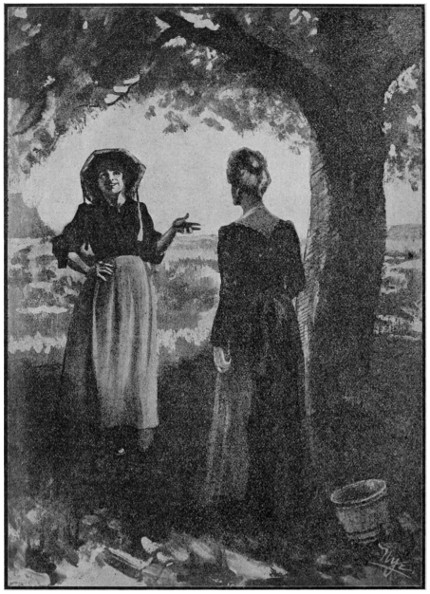
“I RECKON YOU’VE GOT SOMETHING TO TELL ME.”
[73]
 Ann
Boyd stood at the
open door of her corn-house,
a square, one-storied
hut made of the
trunks of young pine-trees,
the bark of
which, being worm-eaten,
was crumbling from the smooth
hard-wood. She had a tin pail on her
arm, and was selecting “nubbins” for
her cow from the great heap of
husked corn which, like a mound of
golden nuggets, lay within. The
strong-jawed animal could crunch the
dwarfed ears, grain and corn together,
when they were stirred into a mush
made of wheat-bran and dish-water.
Ann
Boyd stood at the
open door of her corn-house,
a square, one-storied
hut made of the
trunks of young pine-trees,
the bark of
which, being worm-eaten,
was crumbling from the smooth
hard-wood. She had a tin pail on her
arm, and was selecting “nubbins” for
her cow from the great heap of
husked corn which, like a mound of
golden nuggets, lay within. The
strong-jawed animal could crunch the
dwarfed ears, grain and corn together,
when they were stirred into a mush
made of wheat-bran and dish-water.
Mrs. Boyd, although past fifty, showed certain signs of having been a good-looking woman. Her features were regular, but her once slight and erect figure was now heavy, and bent as if from toil. Her hair, which in her youth had been a luxuriant golden brown, was now thinner and liberally streaked with gray. From her eyes deep wrinkles diverged, and the corners of her firm mouth were drawn downward. Her face, even in repose, wore an almost constant frown, and this habit had deeply gashed her forehead with lines that deepened when she was angry.
With her pail on her arm, she was turning back towards her cottage, which stood about a hundred yards to the right, beneath the shade of two giant oaks, when she heard her name called from the main-travelled road, which led past her farm, on to Darley, ten miles away.
“Oh, it’s you, Mrs. Waycroft!” she exclaimed, without change of countenance, as the head and shoulders of a neighbor appeared above the rail-fence. “I couldn’t imagine who it was calling me.”
“Yes, it was me,” the woman said, as Mrs. Boyd reached the fence and rested her pail on the top rail. “I hain’t seed you since I seed you at church, Sunday. I tried to get over yesterday, but was too busy with one thing and another.”
“I reckon you have had your hands full planting cotton,” said Mrs. Boyd. “I didn’t expect you; besides, I’ve had all I could do in my own field.”
“Yes, my boys have been hard at it,” said Mrs. Waycroft. “I don’t go to the field myself, like you do. I reckon I ain’t hardy enough, but keeping things for them to eat and the house in order takes all my time.”
“I reckon,” said Mrs. Boyd, studying the woman’s face closely under the faded black poke-bonnet—“I reckon you’ve got something to tell me. You generally have. I wish I could not care a snap of the finger what folks say, but I’m only a natural woman. I want to hear things sometimes when I know they will make me so mad that I won’t eat a bite for days.”
[74]
Mrs. Waycroft looked down at the ground. “Well,” she began, “I reckon you know thar would be considerable talk after what happened at meeting Sunday. You know a thing like that naturally would stir up a quiet community like this.”
“Yes, when I think of it I can see there would be enough said, but I’m used to being the chief subject of idle talk. I’ve had twenty odd years of it, Mary Waycroft, though this public row was rather unexpected. I didn’t look for abuse from the very pulpit in God’s house, if it is His. I didn’t know you were there. I didn’t know a friendly soul was nigh.”
“Yes, I was there clean through from the opening hymn. A bolt from heaven on a sunny day couldn’t have astonished me more than I was when you come in and walked straight up the middle aisle, and sat down just as if you’d been coming there regular for all them years. I reckon you had your own private reasons for making the break.”
“Yes, I did.” The wrinkled mouth of the speaker twitched nervously. “I’d been thinking it out, Mrs. Waycroft, for a long time and trying to pray over it, and at last I come to the conclusion that if I didn’t go to church like the rest, it was an open admission that I acknowledged myself worse than others, and so I determined to go—I determined to go if it killed me.”
“And to think you was rewarded that way!” answered Mrs. Waycroft; “it’s a shame! Ann Boyd, it’s a dirty shame!”
“It will be a long time before I darken a church door again,” said Mrs. Boyd. “If I’m ever seen there it will be after I’m dead and they take me there feet foremost to preach over my body. I didn’t look around, but I knew they were all whispering about me.”
“You never saw the like in your life, Ann,” the visitor said. “Heads were bumping together to the damagement of new spring hats, and everybody was asking what it meant. Some said that, after meeting, you was going up and give your hand to Brother Bazemore and ask him to take you back, as a member, but he evidently didn’t think you had a purpose like that, or he wouldn’t have opened up on you as he did. Of course, everybody thar knowed he was hitting at you.”
“Oh yes, they all knew, and he had no reason for thinking I wanted to ask any favor, for he knows too well what I think of him. He hates the ground I walk on. He has been openly against me ever since he come to my house and asked me to let the Sunday-school picnic at my spring and in my grove. I reckon I gave it to him pretty heavy that day, for all I’d been hearing about what he had to say of me had made me mad. I let him get out his proposal as politely as such a sneaking man could, and then I showed him where I stood. Here Mrs. Waycroft, I’ve been treated like a dog and an outcast by every member of his church for the last twenty years, called the vilest names a woman ever bore by his so-called Christian gang, and then, when they want something I’ve got—something that nobody else can furnish quite as suitable for their purpose—why he saunters over to my house holding the skirts of his long coat as if afraid of contamination, and calmly demands the use of my property—property that I’ve slaved in the hot sun and sleet and rain to pay for with hard work. Oh, I was mad! You see, that was too much, and I reckon he never in all his life got such a tongue-lashing. When I came in last Sunday and sat down, I saw his eyes flash, and knew if he got half an excuse he would let out on me. I was sorry I’d come then, but there was no backing out after I’d got there.”
“When he took his text I knew he meant it for you,” said the other woman. “I have never seen a madder man in the pulpit, never in my[75] life. While he was talking, he never once looked at you, though he knew everybody else was doing nothing else. Then I seed you rise to your feet. He stopped to take a drink from his goblet, and you could ’a’ heard a pin fall, it was so still. I reckon the rest thought like I did, that you was going right up to him and pull his hair or slap his jaws. You looked like you hardly knowed what you was doing, and, for one, I tuck a free breath when you walked straight out of the house. What you did was exactly right, as most fair-minded folks will admit, though I’m here to tell you, my friend, that you won’t find fair-minded folks very plentiful hereabouts. The fair-minded ones are over there in that graveyard.”
Mrs. Boyd stroked her quivering lips with her hard, brown hand, and said, softly: “I wasn’t going to sit there and listen to any more of it. I’d thrown aside pride and principle and gone to do my duty to my religion, as I saw it, and thought maybe some of them—one or two, at least—would meet me part of the way, but I couldn’t listen to a two hours’ tirade about me and my—my misfortune. If I’d stayed any longer, I’d have spoken back to him, and that would have been exactly what he and some of the rest would have wanted, for then they could have made a case against me in court for disturbing public worship, and imposed a heavy fine. They can’t bear to think that, in spite of all their persecution, I’ve gone ahead and paid my debts and prospered in a way that they never could do with all their sanctimony.”
There was silence for a moment. A gentle breeze stirred the leaves of the trees and the blades of long grass beside the road. There was a far-away tinkling of cow and sheep bells in the lush-green pastures which stretched out towards the frowning mountain against which the setting sun was levelling its rays.
“You say you haven’t seen anybody since Sunday,” remarked the loitering woman, in restrained, tentative tones.
“No, I’ve been right here. Why did you ask me that?”
“Well, you see, Ann,” was the slow answer, “talking at the rate Bazemore was to your face, don’t you think it would be natural for him to—to sort o’ rub it on even heavier behind your back, after you got up that way and went out so sudden.”
“I never thought of it, but I can see now that it would be just like him.” Mrs. Boyd took a deep breath and lowered her pail to the ground. “Yes,” she went on, reflectively, as she drew herself up again and leaned on the fence, “I reckon he got good and mad when I got up and left.”
“Huh!” The other woman smiled. “He was so mad he could hardly speak. He fairly gulped, his eyes flashed, and he was as white as a bunch of cotton. He poured out another goblet of water that he had no idea of drinking, and his hand shook so much that the glass tinkled like a bell against the mouth of the pitcher. You must have got as far as the hitching-rack before his fury busted out. I reckon what he said was the most unbecoming thing that a stout, able-bodied man ever hurled at a defenseless woman’s back.”
There was another pause. Mrs. Boyd’s expectant face was as hard as stone; her dark-gray eyes were two burning fires in their shadowy orbits.
“What did he say?” she asked. “You might as well tell me.”
Mrs. Waycroft avoided her companion’s fierce stare. “He looked down at the place where you sat, Ann. right steady for a minute, then he said: ‘I’m glad that woman had the common decency to sit on a seat by herself while she was here; but I hope when meeting is over that some of you brethren will take the bench out in the woods and burn it. I’ll pay for a new one out of my own pocket.[76]’”
“Oh!” The exclamation seemed wrung from her when off her guard, and Mrs. Boyd clutched the rail of the fence so tightly that her strong nails sunk into the soft wood. “He said that! He said that about me!”
“Yes, and he ought to have been ashamed of himself,” said Mrs. Waycroft; “and if he had been anything else than a preacher, surely some of the men there—men you have befriended—would not have set still and let it pass.”
“But they did let it pass,” said Mrs. Boyd, bitterly; “they did let it pass, one and all.”
“Oh yes, nobody would dare, in this section, to criticise a preacher,” said the other. “What any little, spindle-legged parson says goes the same as the word of God out here in the backwoods. I’d have left the church myself, but I knowed you’d want to hear what was said; besides, they all know I’m your friend.”
“Yes, they all know you are the only white woman that ever comes near me. But what else did he say?”
“Oh, he had lots to say. He said he hadn’t mentioned no names, but it was always the hit dog that yelped, and that you had made yourself a target by leaving as you did. He went on to say that, in his opinion, all that was proved at court against you away back there was just. He said some folks misunderstood Scripture when it come to deal with your sort and stripe. He said some argued that a church door ought always to be wide open to any sinner whatsoever, but that in your daily conduct of holding every coin so tight that the eagle on it squeals, and in giving nothing to send the Bible to the heathens, and being eternally at strife with your neighbors, you had showed, he said, that no good influence could be brought to bear on you, and that people who was really trying to live upright lives ought to shun you like they would a catching disease. He ’lowed you’d had the same Christian chance in your bringing-up, and a better education than most gals, and had deliberately throwed it all up and gone your headstrong way. In his opinion, it would be wrong to condone your past, and tell folks you stood an equal chance with the rising generation fetched up under the rod and Biblical injunction by parents who knowed what lasting scars the fires of sin could burn in a living soul. He said the community had treated you right, in sloughing away from you, ever since you was found out, because you had never showed a minutes’ open repentance. You’d helt your head, he thought, if possible, higher than ever, and in not receiving the social sanction of your neighbors, it looked like you was determined to become the richest woman in the state for no other reason than to prove that wrong prospered.”
The speaker paused in her recital. The listener, her face set and dark with fury, glanced towards the cottage. “Come in,” she said, huskily; “people might pass along and know what we are talking about, and, somehow, I don’t want to give them that satisfaction.”
“That’s a fact,” said Mrs. Waycroft; “they say I fetch you every bit of gossip, anyway. A few have quit speaking to me. Bazemore would himself, if he didn’t look to me once a month for my contribution. I hope what I’ve told you won’t upset you, Ann, but you always say you want to know what’s going on. It struck me that the whole congregation was about the most heartless body of human beings I ever saw packed together in one bunch.”
“I want you to tell me one other thing,” said Mrs. Boyd, tensely, as they were entering the front doorway of the cottage—“was Jane Hemingway there?”
“Oh yes, by a large majority. I forgot to tell you about her. I had my eyes on her, too, for I knowed it would tickle her nigh to death, and it[77] did. When you left she actually giggled out loud and turned back an’ whispered to the Mayfield girls. Her old, yellow face fairly shone, she was that glad, and when Bazemore went on talking about you and burning that bench, she fairly doubled up, with her handkerchief clapped over her mouth.”
Mrs. Boyd drew a stiff-backed chair from beneath the dining-table and pushed it towards her guest. “There is not in hell itself, Mary Waycroft, a hatred stronger than I feel right now for that woman. She is a fiend in human shape. That miserable creature has hounded me every minute since we were girls together. As God is my judge, I believe I could kill her and not suffer remorse. There was a time when my disposition was as sweet and gentle as any girl’s, but she changed it. She has made me what I am. She is responsible for it all. I might have gone on—after my—my misfortune, and lived in some sort of harmony with my kind if it hadn’t been for her.”
“I know that,” said the other woman, as she sat down and folded her cloth bonnet in her thin hands. “I really believe you’d have been a different woman, as you say, after—after your trouble if she had let you alone.”
Mrs. Boyd seated herself in another chair near the open door, and looked out at a flock of chickens and ducks which had gathered at the step and were noisily clamoring for food.
“I saw two things that made my blood boil as I was leaving the church,” said she. “I saw Abe Longley, who has been using my pasture for his cattle free of charge for the last ten years. I caught sight of his face, and it made me mad to think he’d sit there and never say a word in defence of the woman he’d been using all that time; and then I saw George Wilson, just as indifferent, near the door, when I’ve been favoring him and his shabby store with all my trade when I could have done better by going on to Darley. I reckon neither of those two men said the slightest thing when Bazemore advised the—burning of the bench I’d sat on.”
“Oh no, of course not!” said Mrs. Waycroft, “nobody said a word. They wouldn’t have dared, Ann.”
“Well, they will both hear from me,” said Mrs. Boyd, “and in a way that they won’t forget soon. I tell you, Mary Waycroft, this thing has reached a climax. That burning bench is going to be my war-torch. They say I’ve been at strife with my neighbors all along; well, they’ll see now. I struggled and struggled with pride to get up to the point of going to church again, and that’s the reception I got.”
“It’s a pity to entertain hard feelings, but I don’t blame you a single bit,” said Mrs. Waycroft, sympathetically. “As I look at it, you have done all you can to live in harmony, and they simply won’t have it. They might be different if it wasn’t for that meddlesome old Jane Hemingway. She keeps them stirred up. She and her daughter is half starving to death, while you—” Mrs. Waycroft glanced round the room at the warm rag carpet of many colors, at the neat fire-screen made of newspaper pictures pasted on a crude frame of wood, and, higher, to the mantel-piece, whose sole ornament was a Seth Thomas clock, with the Tower of London in glaring colors on the glass door—“while you don’t ask anybody any odds. Instead of starving, gold dollars seem to roll up to your door of their own accord and fall in a heap. They tell me even that cotton factory which you invested in, and which Mrs. Hemingway said had busted and gone up the spout, is really doing well.”
“The stock has doubled in value,” said Mrs. Boyd, simply. “I don’t know how to account for my making money. I reckon it’s simply good judgment and a habit of throwing nothing away. The factory got to a[78] pretty low ebb, and the people lost faith in it, and were offering their stock at half price. My judgment told me it would pull through as soon as times improved, and I bought an interest in it at a low figure. I was right; it proved to be a fine investment.”
“I was sorter sorry for Virginia Hemingway, Sunday,” said Mrs. Waycroft. “When her mother was making such an exhibition of herself in gloating over the way you was treated, the poor girl looked like she was ashamed, and pulled Jane’s apron like she was trying to keep her quiet. I reckon you hain’t got nothing against the girl, Ann?”
“Nothing except that she is that devilish woman’s offspring,” said Mrs. Boyd. “It’s hard to dislike her; she’s pretty—by all odds the prettiest and sweetest-looking young woman in this county. Her mother in her prime never saw the day she was anything like her. They say Virginia isn’t much of a hand to gossip and abuse folks. I reckon her mother’s ways have disgusted her.”
“I reckon that’s it,” said the other woman, as she rose to go. “I know I love to look at her; she does my old eyes good. At meeting I sometimes gaze steady at her for several minutes on a stretch. Sitting beside that hard, crabbed old thing, the girl certainly does look out of place. She deserves a better fate than to be tied to such a woman. I reckon she’ll be picked up pretty soon by some of these young men—that is, if Jane will give her any sort of showing. Jane is so suspicious of folks that she hardly lets Virginia out of her sight. Well, I must be going. Since my husband’s death I’ve had my hands full on the farm; he did a lots to help out, even about the kitchen. Good-bye. I can see what I’ve said has made a change in you, Ann. I never saw you look quite so different.”
“Yes, the whole thing has kind o’ jerked me round,” replied Mrs. Boyd. “I’ve taken entirely too much off of these people—let them run over me dry-shod; but I’ll show them a thing or two. They won’t let me live in peace, and now they can try the other thing.” And Ann Boyd stood in the doorway and watched the visitor trudge slowly away.
“Yes,” she mused, as she looked out into the falling dusk, “they are trying to drive me to the wall with their sneers and lashing tongues. But I’ll show then that a worm can turn.”
The next morning, after a frugal breakfast of milk and cornmeal pancake, prepared over an open fireplace on live coals, which reddened her cheeks and bare arms, Mrs. Boyd pinned up her skirts till their edges hung on a level with the tops of her coarse, calf-skin shoes. She then climbed over the brier-grown rail-fence with the agility of a hunter and waded through the high, dew-soaked weeds and grass in the direction of the rising sun. The meadow was like a rolling green sea settling down to calmness after a storm. Here and there a tuft of dewy broom-sedge held up to her vision a sheaf of green hung with sparkling diamonds, emeralds, and rubies, and far ahead ran a crystal creek in and out among gracefully drooping willows and erect young reeds.
“That’s his brindle heifer now,” the trudging woman said, harshly. “And over beyond the hay-stack and cotton-shed is his muley cow and calf. Huh, I reckon I’ll make them strike a lively trot! It will be some time before they get grass as rich as mine inside of them to furnish milk and butter for Abe Longley and his sanctimonious lay-out.”
Slowly walking around the animals, she finally got them together and drove them from her pasture to the small road which ran along the foot of the mountain towards their owne[79]r’s farm-house, the gray roof of which rose above the leafy trees in the distance. To drive the animals out, she had found it necessary to lower a panel of her fence, and she was replacing the rails laboriously, one by one, when she heard a voice from the woodland on the mountain-side, a tract of unproductive land owned by the man whose cows she was ejecting. It was Abe Longley himself, and in some surprise he hurried down the rugged steep, a woodman’s axe on his shoulder. He was a gaunt, slender man, gray and grizzled, past sixty years of age, with a tuft of stiff beard on his chin, which gave his otherwise smooth-shaven face a forbidding expression.
“Hold on thar, Sister Boyd!” he called out, cheerily, though he seemed evidently to be trying to keep from betraying the impatience he evidently felt. “You must be getting nigh-sighted in yore old age. As shore as you are a foot high them’s my cattle, an’ not yourn. Why, I knowed my brindle from clean up at my woodpile, a full quarter from here. I seed yore mistake an’ hollered then, but I reckon you are gettin’ deef as well as blind. I driv’ ’em in not twenty minutes ago, as I come on to do my cuttin’.”
“I know you did, Abe Longley,” and Mrs. Boyd stooped to grasp and raise the last rail and carefully put it in place; “I know they are yours. My eyesight’s good enough. I know good and well they are yours, and that is the very reason I made them hump themselves to get off my property.”
“But—but,” and the farmer, thoroughly puzzled, lowered his glittering axe and stared wonderingly—“but you know, Sister Boyd, that you told me with your own mouth that, being as I’d traded off my own pasture-land to Dixon for my strip o’ wheat in the bottom, that I was at liberty to use yourn how and when I liked, and, now—why, I’ll be dad-blamed if I understand you one bit.”
“Well, I understand what I’m about, Abe Longley, if you don’t!” retorted the owner of the land. “I did say you could pasture on it, but I didn’t say you could for all time and eternity; and I now give you due notice if I ever see any four-footed animal of yours inside of my fences I’ll run them out with an ounce of buckshot in their hides.”
“Well, well, well!” Longley cried, at the end of his resources, as he leaned on his smooth axe-handle with one hand and clutched his beard with the other. “I don’t know what to make of yore conduct. I can’t do without the use of your land. There hain’t a bit that I could rent or buy for love or money on either side of me for miles around. When folks find a man’s in need of land, they stick the price up clean out of sight. I was tellin’ Sue the other day that we was in luck havin’ sech a neighbor—one that would do so much to help a body in a plight.”
“Yes, I’m very good and kind,” sneered Mrs. Boyd, her sharp eyes ablaze with indignation, “and last Sunday in meeting you and a lot of other able-bodied men sat still and let that foul-mouthed Bazemore say that even the wooden bench I sat on ought to be taken out and burned for the public good. You sat there and listened to that, and when he was through you got up and sung the doxology and bowed your head while that makeshift of a preacher called down God’s benediction on you. If you think I’m going to keep a pasture for such a man as you to fatten your stock on, you need a guardian to look after you.”
“Oh, I see,” Longley exclaimed, a crestfallen look on him. “You are goin’ to blame us all for what he said, and you are mad at everybody that heard it. But you are dead wrong, Ann Boyd—dead wrong. You can’t make over public opinion, and you’d ’a’ been better off years ago if you hadn’t been so busy trying to do[80] it, whether or no. Folks would let you alone if you’d ’a’ showed a more repentant sperit, and not held your head so high and been so spiteful. I reckon the most o’ your trouble—that is, the reason it’s lasted so long, is due to the women-folks more than the men of the community, anyhow. You see, it sorter rubs women’s wool the wrong way to see about the only prosperity a body can see in the entire county falling at the feet of the one—well, the one least expected to have sech things—the one, I mought say, who hadn’t lived exactly up to the best precepts.”
“I don’t go to men like you for my precepts,” the woman hurled at him, “and I haven’t got any time for palavering. All I want to do is to give you due notice not to trespass on my land, and I’ve done that plain enough, I reckon.”
Abe Longley’s thin face showed anger that was even stronger than his avarice; he stepped nearer to her, his eyes flashing, his wide upper-lip twitching nervously. “Do you know,” he said, “that it’s purty foolhardy of you to take up a fight like that agin a whole community. You know you hain’t agoin’ to make a softer bed to lie on. You know, if you find fault with me for not denouncin’ Bazemore, you may as well find fault with every living soul that was under reach o’ his voice, fer nobody budged or said a word in yore defence.”
“I’m taking up a fight with no one,” the woman said, firmly. “They can listen to what they want to listen to. The only thing I’m going to do in future is to see that no person uses me for profit and then willingly sees me spat upon. That’s all I’ve got to say to you.” And, turning, she walked away, leaving him standing as if rooted among his trees on the brown mountain-side.
“He’ll go home and tell his wife, and she’ll gad about and fire the whole community against me,” Mrs. Boyd mused; “but I don’t care. I’ll have my rights if I die for it.”
An hour later, in another dress and a freshly washed and ironed gingham bonnet, she fed her chickens from a pan of wet cornmeal dough, locked up her house carefully, fastened down the window-sashes on the inside by placing sticks above the movable ones, and trudged down the road to George Wilson’s country-store at the crossing of the roads which led respectively to Springtown, hard-by on one side, and Darley, farther away on the other.
The store was a long, frame building which had once been whitewashed, but was now only a fuzzy, weather-beaten gray. As was usual in such structures, the front walls of planks rose higher than the pointed roof, and held large and elaborate lettering which might be read quite a distance away. Thereon the young storekeeper made the questionable statement that a better price for produce was given at his establishment than at Darley, where high rent, taxes, and clerk-hire had to be paid, and, moreover, that his goods were sold cheaper because, unlike the town dealers, he lived on the products from his own farm and employed no help. In front of the store, convenient alike to both roads, stood a rustic hitching-rack made of unbarked oaken poles into which railway spikes had been driven, and on which horseshoes had been nailed to hold the reins of any customer’s mount. On the ample porch of the store stood a new machine for the hulling of peas, several ploughs, and a red-painted device for the dropping and covering of seed-corn. On the walls within hung various pieces of tinware and harnesses and saddles, and the two rows of shelving held a good assortment of general merchandise.
As Mrs. Boyd entered the store, Wilson, a blond young man with an ample mustache, stood behind the counter talking to an Atlanta drummer[81] who had driven out from Darley to sell the storekeeper some dry-goods and notions, and he did not come to her at once, but delayed to see the drummer make an entry in his order-book; then he advanced to her.
“Excuse me, Mrs. Boyd,” he smiled, “I am ordering some new prints for you ladies, and I wanted to see that he got the number of bolts down right. This is early for you to be out, isn’t it? It’s been many a day since I’ve seen you pass this way before dinner. I took a sort of liberty with you yesterday, knowing how good-natured you are. Dave Prixon was going your way with his empty wagon, and, as I was about to run low on your favorite brand of flour, I sent you a barrel and put it on your account at the old price. I thought you’d keep it. You may have some yet on hand, but this will come handy when you get out.”
“But I don’t intend to keep it,” replied the woman, under her bonnet, and her voice sounded harsh and crisp. “I haven’t touched it. It’s out in the yard where Prixon dumped it. If it was to rain on it I reckon it would mildew. It wouldn’t be my loss. I didn’t order it put there.”
“Why, Mrs. Boyd!” and Wilson’s tone and surprised glance at the drummer caused that dapper young man to prick up his ears and move nearer; “why, it’s the best brand I handle, and you said the last gave you particular satisfaction, so I naturally—”
“Well, I don’t want it; I didn’t order it, and I don’t intend to have you nor no one else unloading stuff in my front yard whenever you take a notion and want to make money by the transaction. Deduct that from my bill, and tell me what I owe you. I want to settle in full.”
“But—but—” Wilson had never seemed to the commercial traveller to be so much disturbed; he was actually pale, and his long hands, which rested on the smooth surface of the counter, were trembling—“but I don’t understand,” he floundered. “It’s only the middle of the month, Mrs. Boyd, and I never run up accounts till the end. You are not going off, are you?”
“Oh no,” and the woman pushed back her bonnet and eyed him almost fiercely, “you needn’t any of you think that. I’m going to stay right on here; but I’ll tell you what I am going to do, George Wilson—I’m going to buy my supplies in the future at Darley. You see, since this talk of burning the very bench I sit on in the house of God, which you and your ilk set and listen to, why—”
“Oh, Mrs. Boyd,” he broke in, “now don’t go and blame me for what Brother Bazemore said when he was—”
“Brother Bazemore!” The woman flared up and brought her clinched hand down on the counter. “I’ll never as long as I live let another dollar of my money pass into the hands of a man who calls that man brother. You sat still and raised no protest against what he said, and that ends business between us for all time. There is no use talking about it. Make out my account, and don’t keep me standing here to be stared at like I was a curiosity in a side-show.”
“All right, Mrs. Boyd; I’m sorry,” faltered Wilson, with a glance at the drummer, who, feeling that he had been alluded to, moved discreetly across the room and leaned against the opposite counter. “I’ll go back to the desk and make it out.”
She stood motionless where he had left her till he came back with her account in his hand, then from a leather bag she counted out the money and paid it to him. The further faint, half-fearful apologies which Wilson ventured on making seemed to fall on closed ears, and, with the receipted bill in her bag, she strode from the house. He followed her to the door and stood looking after her as she angrily trudged back towards her farm.
“Well, well,” he sighed, as the[82] drummer came to his elbow and stared at him wonderingly, “there goes the best and most profitable customer I’ve had since I began selling goods. It’s made me sick at heart, Masters. I don’t see how I can do without her, and yet I don’t blame her one bit—not a bit, so help me God.”
Wilson turned, and with a frown went moodily back to his desk and sat down on the high stool gloomily eyeing the page in a ledger which he had just consulted.
“By George, that woman’s a corker,” said the drummer, sociably, as he came back and stood near the long wood-stove. “Of course, I don’t know what it’s all about, but she’s her own boss, I’ll stake good money on that.”
“She’s about the sharpest and in many ways the strongest woman in the state,” said the storekeeper, with a sigh. “Good Lord, Masters, she’s been my main-stay ever since I opened this shack, and now to think because that loud-mouthed Bazemore, who expects me to pay a good part of his salary, takes a notion to rip her up the back in meeting, why—”
“Oh, I see!” cried the drummer—“I understand it now. I heard about that at Darley. So she’s the woman! Well, I’m glad I got a good look at her. I see a lot of queer things in going about over the country, but I don’t think I ever ran across just her sort.”
“She’s had a devil of a life, Masters, from the time she was a blooming, pretty young girl till now that she is at war with everybody within miles of her. She’s always been a study to me. She’s treated me more like a son than anything else—doing everything in her power to help me along, buying, by George, things sometimes that I knew she didn’t need because it would help me out, and now, because I didn’t get up in meeting last Sunday and call that man down she holds me accountable. I don’t know but what she’s right. Why should I take her hard-earned money and sit still and allow her to be abused? She’s simply got pride, and, lots of it, and it’s bad hurt.”
“But what was it all about?” the drummer inquired.
“The start of it was away back when she was a girl, as I said,” began the storekeeper. “You’ve heard of Colonel Preston Chester, our biggest planter, who lives a mile from here—old-time chap, fighter of duels, officer in the army, and all that?”
“Oh yes, I’ve seen him; in fact, I was at college at the State University with his son Langdon. He was a terrible fellow—very wild and reckless, full half the time, and playing poker every night. He was never known to pay a debt, even to his best friends.”
“Langdon is a chip off of the old block,” said Wilson. “His father was just like him when he was a young man. Between you and me, the Colonel never had a conscience; old as he now is, he will sit and laugh about his pranks right in the presence of his son. It’s no wonder the boy turned out like he did. Well, away back when this Mrs. Boyd was a young and pretty girl, the daughter of honest, hard-working people, who owned a little farm back of his place, he took an idle fancy to her. I’m telling you now what has gradually leaked out in one way and another since. He evidently won her entire confidence, made her believe he was going to marry her, and, as he was a dashing young fellow, she must have fallen in love with him. Nobody knows how that was, but one thing is sure, and that is that he was seen about with her almost constantly for a whole year, and then he stopped off suddenly. The report went out that he’d made up his mind to get married to a young woman in Alabama who had a lot of money, and he did go off and bring home the present Mrs. Chester, Langdon’s mother. Well, old-timers[83] say young Ann Boyd took it hard, stayed close in at home and wasn’t seen out for a couple of years. Then she came out again, and they say she was better-looking than ever and a great deal more serious and sensible. Joe Boyd was a young farmer those days, and a sort of dandy, and he fell in love with her and hung about her day and night, never seeming willing to let her out of his sight. Several other fellows, they say, was after her, but she seemed to like Joe the best, but nothing he’d do or say would make her accept him. I can see through it now, looking back on what has since leaked out, but nobody understood it then, for she had evidently got over her attachment for Colonel Chester, and Joe was a promising fellow, strong, good-looking, and a great beau and flirt among women, half a dozen being in love with him, but Ann simply wouldn’t take him, and it was the talk of the whole county. He was simply desperate, folks say, going about boring everybody he met with his love affair. Finally her mother and father and all her friends got after her to marry Joe, and she gave in. And then folks wondered more than ever why she’d delayed for she was more in love with her husband than anybody had any reason to expect. They were happy, too. A child was born, a little girl, and that seemed to make them happier. Then Mrs. Boyd’s mother and father died, and she came into the farm, and the Boyds were comfortable in every way. Then what do you think happened?”
“I’ve been wondering all along,” the drummer laughed. “I can see you’re holding something up your sleeve.”
“Well, this happened. Colonel Chester’s wife was, even then, a homely woman, about as old as he was, and not at all attractive aside from her money, and marrying hadn’t made him any the less devilish. They say he saw Mrs. Boyd at meeting one day and hardly took his eyes off of her during preaching. She had developed into about the most stunning-looking woman anywhere about, and knew how to dress, which was something Mrs. Chester, with all her chances, had never seemed to get onto. Well, that was the start of it, and from that day on Chester seemed to have nothing on his mind but the good looks of his old sweetheart. Folks saw him on his horse riding about where he could get to meet her, and then it got reported that he was actually forcing himself on her to such an extent that Joe Boyd was worked up over it, aided by the eternal gab of all the women in the section.”
“Did Colonel Chester’s wife get onto it?” the drummer wanted to know.
“It don’t seem like she did,” answered Wilson. “She was away visiting her folks in the South most of the time, with Langdon, who was a baby then, and it may be that she didn’t care. Some folks thought she was weak-minded; she never seemed to have any will of her own, but left the Colonel to manage her affairs without a word.”
“Well, go on with your story,” urged the drummer.
“There isn’t much more to tell about the poor woman,” continued Wilson. “As I said, Chester got to forcing himself on her, and I reckon she didn’t want to tell her husband what she was trying to forget for fear of a shooting scrape, in which Joe would get the worst of it; but this happened: Joe was off at court in Darley and sent word home to his wife that he was to be held all night on a jury. The man that took the message rode home alongside of Chester and told him about it. Well, I reckon, all hell broke out in Chester that night. He was a drinking man, and he tanked up, and, as his wife was away, he had plenty of liberty. Well, he simply went over to Joe Boyd’s house and went in. It was about ten o’clock. My honest[84] conviction is, no matter what others think, that she tried her level best to make him leave without rousing the neighborhood, but he wouldn’t go, but sat there in the dark with his coat off, telling her he loved her more than her husband did, and that he never had loved his wife and that he was crazy for her, and the like. How long this went on with her imploring and praying to him to go, I don’t know; but, at any rate, they both heard the gate-latch click and Joe Boyd come right up the gravel-walk. I reckon the poor woman was scared clean out of her senses, for she made no outcry, and Chester went to a window, his coat on his arm, and was climbing out when Joe, who couldn’t get in at the front door was making for the one in the rear, met him face to face.”
“Great goodness!” ejaculated the commercial traveller.
“Well, you bet, the devil was to pay,” went on the storekeeper grimly. “Chester was mad and reckless, and, being hot with liquor, and regarding Boyd as far beneath him socially, instead of making satisfactory explanations, they say he simply swore at Boyd and stalked away. Dumfounded, Boyd went inside to his miserable wife and demanded an explanation. She has since learned how to use her wits with the best in the land, but she was young then, and so, by her silence, she made matters worse for herself. He forced her to explain, and, seeing no other way out of the affair, she decided to throw herself on his mercy and make a clean breast of things she and her family had kept back all the time. Well, sir, she confessed to what had happened away back before Chester had deserted her, no doubt telling a straight story of her absolute purity and faithfulness to Boyd after marriage. Poor old Joe! He wasn’t a fighting man, and, instead of following Chester and demanding satisfaction, he stayed at home that night, no doubt suffering the agony of the damned and trying to make up his mind to believe in his wife and to stand by her. As it looks now, he evidently decided to make the best of it, and might have succeeded, but somehow it got out about Chester being caught there, and that started gossip so hot that her life and his became almost unbearable. It might have died a natural death in time, but Mrs. Boyd had an enemy, Mrs. Jane Hemingway, who had been one of the girls who was in love with Joe Boyd. It seems that she had never got over Joe’s marrying another woman, and when she heard this scandal she nagged and teased Joe about his babyishness in being willing to believe his wife, and told him so many lies that Boyd finally quit staying at home, sulking about in the mountains, and making trips away till he finally applied for a divorce. Ignorant and inexperienced as she was, and proud, Mrs. Boyd made no defence, and the whole thing went his way with very little publicity. But the hardest part for her to bear was when, having the court’s decree to take charge of his child, Boyd came and took it away.”
“Good gracious! that was tough, wasn’t it?” exclaimed the drummer.
“That’s what it was, and they say it fairly upset her mind. They expected her to fight like a tiger for her young, but at the time they came for it she only seemed stupefied. The little girl was only three years old, but they say Ann came in the room and said she was going to ask the child if it was willing to leave her, and they say she calmly put the question, and the baby, not knowing what she meant, said, ‘Yes.’ Then they say Ann talked to it as if it were a grown person, and told her to go, that she’d never give her a thought in the future, and never wanted to lay eyes on her again.”
“That was pitiful, wasn’t it?” said Masters. “By George, we don’t dream of what is going on in the hearts of men and women we meet face to face every day. And tha[85]t’s what started her in the life she’s since led.”
“Yes, she lived in her house like a hermit, never going out unless she absolutely had to. She had an old-fashioned loom in a shed-room adjoining her house, and night and day people passing along the road could hear her thumping away on it. She kept a lot of fine sheep, feeding and shearing them herself, and out of the wool she wove a certain kind of jean cloth which she sold at a fancy figure. I’ve seen wagon loads of it pass along the road billed to a big house in Atlanta. This went on for several years, and then it was noticed that she was accumulating money. She was buying all the land she could around her house, as if to force folks as far from her as possible, and she turned the soil to good purpose, for she knew how to work it. She hired negroes for cash, when others were paying in old clothes and scraps, and, as she went to the field with them and worked in the sun and rain like a man, she got more out of her planting than the average farmer.”
“So she’s really well off?” said the drummer.
“Got more than almost anybody else in the county,” said Wilson. “She’s got stocks in all sorts of things, and owns houses on the main street in Darley, which she keeps well rented. It seems like, not having anything else to amuse her, she turned her big brain to economy and money-making, and I’ve always thought she did it to hit back at the community. You see, the more she makes, the more her less fortunate neighbors dislike her, and she loves to get even as far as possible.”
“And has she had no associates at all?” Masters wanted to know.
“Well, yes, there is one woman, a Mrs. Waycroft, who has always been intimate with her. She is the only—I started to say she was the only one, but there was a poor mountain fellow, Luke King, a barefoot boy who had a fine character, a big brain on him, and no education. His parents were poor, and did little for him. They say Mrs. Boyd sort of took pity on him and used to buy books and papers for him, and that she really taught him to read and write. She sent him off to school, and got him on his feet till he was able to find work in a newspaper office over at Canton, where he became a boss typesetter. I’ve always thought that her misfortune had never quite killed her natural impulses, for she certainly got fond of that fellow. I had an exhibition of both his regard and hers right here at the store. He’d come in to buy something or other, and was waiting about the stove one cold winter day, when a big mountain chap made a light remark about Mrs. Boyd. He was a head taller than Luke King was, but the boy sprang at him like a panther and knocked the fellow down. They had the bloodiest fight I ever saw, and it was several minutes before they could be separated. Luke had damaged the chap pretty badly, but he was able to stand, while the boy keeled over in a dead faint on the floor, bruised inside some way. The big fellow, fearing arrest, mounted his horse and went away, and several of us were doing what we could with cold water and whiskey to bring the boy around when who should come in but Ann herself. She was passing the store, and some one told her about it. People who think she has no heart and is as cold as stone ought to have seen her that day. In all my life I never saw such a terrible face on a human being. I was actually afraid of her. She was all fury and all tenderness combined. She looked down at him in all his blood and bruises and white face, and got down on her knees by him. I saw a great big sob rise up in her, although her back was to me, and shake her from head to foot, and then she was still, simply stroking back his damp, tangled hair. ‘My poor boy,’ I heard her say, ‘you can’t fight my battles. God Himself has[86] failed to do that, but I won’t forget this—never—never!’”
“Lord, that was strong!” said Masters. “She must be wonderful!”
“She is more wonderful than her narrow-minded enemies dream of,” returned the storekeeper. “You see, its her pride that keeps her from showing her fine feelings, and it’s her secluded life that makes them misunderstand her. Well, she brought her wagon and took the boy away. That was another queer thing,” Wilson added. “She evidently had started to take him to her house, for she drove as far as the gate and then stopped there to study a moment, and finally turned round and drove him to the poor cabin his folks lived in. You see, she was afraid that even that would cause talk, and it would. Old Jane Hemingway would have fed on that morsel for months, as unreasonable as it would have been. Ann sent a doctor, though, and every delicacy the market afforded, and the boy was soon out. It wasn’t long afterward that Luke King went to college at Knoxville, and now he’s away in the West somewhere. His mother, after his father’s death, married a trifling fellow, Mark Bruce, and that brought on some dispute between her and her son, who had tried to keep her from marrying such a man. They say Luke told her if she did marry Bruce he’d go away and never even write home, and so far, they say, he has kept his word. Nobody knows where he is or what he’s doing unless it is Mrs. Boyd, and she never talks. I can’t keep from thinking he’s done well, though, for he had a big head on him and a lot of determination.”
“And this Mrs. Hemingway, her enemy,” said the drummer tentatively, “you say she was evidently the woman’s rival at one time. But it seems she married some one else.”
“Oh yes, she suddenly accepted Tom Hemingway, an old bachelor, who had been trying to marry her for a long time. Most people thought she did it to hide her feelings when Joe Boyd got married. She treated Tom like a dog, making him do everything she wanted, and he was daft about her till he died, just a couple of weeks after his child was born, who, by-the-way, has grown up to be the prettiest girl in all the country, and that’s another feature in the story,” the storekeeper smiled. “You see, Mrs. Boyd looks upon old Jane as the prime cause of her losing her own child, and I understand she hates the girl as much as she does her mother.”
A man had come into the store and stood leaning against a show-case on the side devoted to groceries.
“There’s a customer,” said the drummer; “don’t let me keep you, old man; you know you’ve got to look at my samples some time to-day.”
“Well, I’ll go see what he wants,” said Wilson, “and then I’ll look through your line, though I don’t feel a bit like it, after losing the best regular customer I have.”
The drummer had opened his sample-case on the desk when Wilson came back.
“You say the woman’s husband took the child away,” remarked the drummer; “did he go far?”
“They first settled away out in Texas,” replied Wilson, “but Joe Boyd, not having his wife’s wonderful head to guide him, failed at farming there, and only about three years ago he came back to this country and bought a little piece of land over in Gilmer—the county that joins this one.”
“Oh, so near as that! Then perhaps she has seen her daughter and—”
“Oh no, they’ve never met,” said Wilson, as he took a sample pair of men’s suspenders from the case and tested the elastic by stretching it between his hands. “I know that for certain. She was in here one morning waiting for one of her teams to pass to take her to Darley, when a peddler opened his pack of tin-ware and tried to sell her some pieces I[87] was out of. He heard me call her by name, and, to be agreeable, he asked her if she was any kin to Joe Boyd and his daughter, over in Gilmer. I could have choked the fool for his stupidity. I tried to catch his eye to warn him, but he was intent on selling her a bill, and took no notice of anything else. I saw her stare at him steady for a second or two, then she seemed to swallow something, and said, ‘No, they are no kin of mine.’ And then what did the skunk do but try to make capital out of that. ‘Well, you may be glad,’ he said, ‘that they are no kin, for they are as near the ragged edge as any folks I ever ran across.’ He went on to say he stayed overnight at Boyd’s cabin and that they had hardly anything but streak-o’-lean-streak-o’-fat meat and corn-bread to offer him, and that the girl had the worst temper he’d ever seen. Mrs. Boyd, I reckon to hide her face, was looking at some of the fellow’s pans, and he seemed to think he was on the right line, and so he kept talking. Old Joe, he said, had struck him as a good-natured, lazy sort of come-easy-go-easy mountaineer, but the girl looked stuck up, like she thought she was some better than appearances would indicate. He said she was a tall, gawky sort of girl, with no good looks to brag of, and he couldn’t for the life of him see what she had to make her so proud.
“I wondered what Mrs. Boyd was going to do, but she was equal to that emergency, as she always has been in everything. She held one of his pans up in the light and tilted her bonnet back on her head, I thought, to let me see she wasn’t hiding anything, and said, as unconcerned as if he’d never mentioned a delicate subject. ‘Look here,’ she said, thumping the bottom of the pan with her finger, ‘if you expect to do any business with me, you’ll have to bring copper-bottom ware to me. I don’t buy shoddy stuff from any one. These pans will rust through in two months. I’ll take half a dozen, but I’m only doing it to pay you for the time spent on me. It is a bad investment for any one to buy cheap, stamped ware.’”
(To be Continued.)
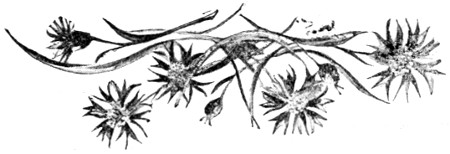
[88]
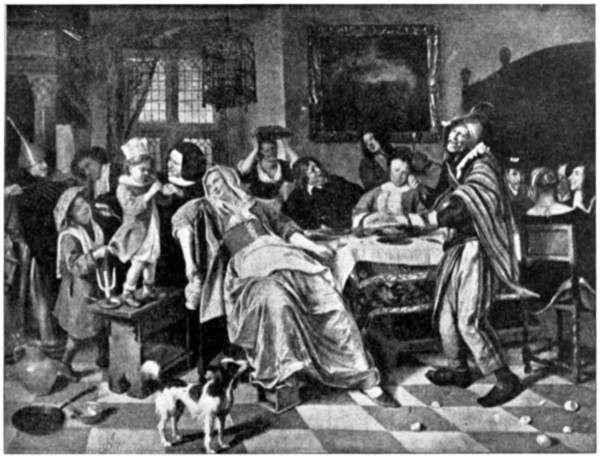
TWELFTH NIGHT.
From Painting by Jan Steen.
[89]
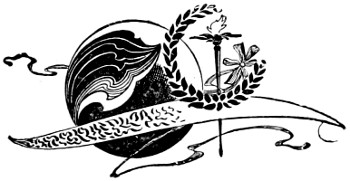
[90]
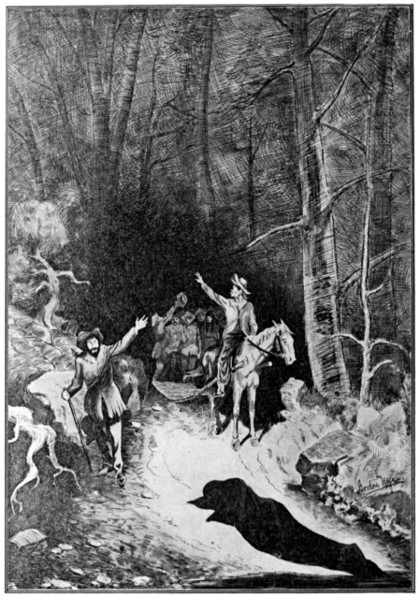
“THE BODY HAD ROLLED OFF THE SLED.”
[91]
 Andrew
Jackson was born on March 15,
1767.
Andrew
Jackson was born on March 15,
1767.
There has been a hot dispute over the place of his birth, but the weight of the legal evidence favors South Carolina.
His parents were immigrants from the northern part of Ireland, where the people are mainly Presbyterians in religion, and where there is an inter-mixture of Scotch blood; but there seems to be no positive proof that the Jacksons belonged to the over-worked family of Scotch-Irish.
They were poor people, living at Carrickfergus, linen weavers by trade, and, if any one of them had ever been prominent in any way, the story is lost. The most painstaking researches made by enthusiastic hero-worshipers have failed to trace the Jackson lineage to a single cattle-lifting lord, or to any other member of that upper world into which the biographical snob is so eager to cast his anchor.
The Jacksons were plain, common, industrious, honest folks, who held a respectable, independent place in their own community, but who were not so prosperous as to resist the temptation to try their fortunes in the New World.
Hugh Jackson, brother to Andrew’s father, had been a soldier in a British regiment, and had served in America. He was present at Braddock’s defeat, and may have known Fausett, the Virginia scout, who is said to have given the rash British general the wound of which he died. (See note.)
Note:
“The Virginia provincials, under Washington, by their knowledge of border warfare, and cool courage, alone saved the day.
“Braddock was himself mortally wounded by a provincial named Fausett. A brother of the latter had disobeyed the silly orders of the General, that the troops should not take position behind the trees, when Braddock rode up and struck him down. Fausett who saw the whole transaction, immediately drew up his rifle and shot him through the lungs.”
“The Great West,” Howe.
Apparently, Hugh Jackson became interested in the efforts of the Catawba Land Company to colonize its holdings in the Carolinas, for upon his return to Ireland he began to get together a band of kinspeople, neighbors and friends, for the purpose of emigrating to America.
Among those whom Hugh Jackson persuaded was his brother,[92] Andrew. But, before everything could be got ready for the voyage, Hugh Jackson fell in love with the daughter of well-to-do parents, and married her; and the wife of Hugh was so satisfactory in herself and her surroundings that the happy husband decided to remain in the old country—his wife having vetoed his emigration scheme.
His brother Andrew, however, had probably already made his arrangements to go to America, and, having got unsettled, found it not so easy to sink back into his former life; therefore, after some hesitation, he and the three Crawfords, one of whom was the husband of his wife’s sister, took ship for Charleston.
Upon his coming to North Carolina, it seems that Andrew Jackson was too poor to buy land. Instead, therefore, of locating in the Waxhaws Settlement, where most of the immigrants from Carrickfergus had bought homes, he went to Twelve-mile Creek, a branch of the Catawba.
Here he was seven miles distant from the Waxhaws Settlement, and was face to face with the gigantic task of carving out a farm from the wilderness.
The historian, the orator, the painter, have been eager in the duty of blazoning the deeds of our pioneer missionaries, law-makers and soldiers. The names of these heroes live, and deserve to live, in letters of light upon the records of our country. But, to our pioneer farmers, justice has never been done. Theirs was a combat calling for every soldierly trait of John Smith and Miles Standish. The patient courage which swung the axe, in the depths of primeval woods, was no less heroic than the bravery which made the musket conquer. The toil of the warrior’s march was slight by comparison with the homely, but exhausting, work of preparing the soil for the sowing of seed. The arrows of the red men were not more deadly to the soldier than were the fevers which rose from the swamps and pulled down the settler as he struggled to open out his farm.
In the South, in the East, in the West, the story of the pioneer plowman of America is one of dauntless courage, of quiet heroism. He found the New World a wilderness and he has well-nigh made it a garden. His axe, his spade, his hoe, his plow, his muscle, his brain, his very heart and soul have all been enlisted in the work; and never once have his lips uttered the craven’s plea for “Protection.” Never once has he gone to the doors of legislation begging special favors. Never once has he lied to government and people for the purpose of securing a selfish advantage at the expense of his fellowman.
No. He has not only not demanded of the government either Protection or Privilege, but he has submitted—yes, for one hundred years he has submitted!—to be robbed of a portion of his annual produce in order that our Infant Industry Capitalists should be able to build up the corporate power which now, in the form of Trusts, dominates the Republic and secures the lion’s share of all the wealth created in every field of industry.
Like many another pioneer of the American wilderness, Andrew Jackson found the task too hard. He died under the strain. The impression which his famous son had as to the immediate[93] cause of his death was that he ruptured a blood vessel in the handling of a heavy log.
The body of the hero who had fallen in the fight for his wife and little ones—the fight to make a home for them in the wilderness—was buried in the graveyard of the Waxhaw Settlement church. In after years, when efforts were made to identify the spot it could not be done.
***
According to local tradition, there was held at the cabin-home of the dead man the grewsome “wake” which was customary among the Irish in the Old Country. Relatives from the Waxhaw settlement came out to Jackson’s “clearing,” when they learned that he was no more; and, after preparing the body for burial, their grief gradually wore itself out, and the whiskey-jug became the ruling factor of the occasion. As lamentation gave place to revelry, it is said that “the corpse came in for his share of the refreshments.” What this may mean, each reader shall judge for himself.
The same tradition claims that the body was hauled from the cabin to the graveyard upon a rough wooden frame or sled, and that such was the disorder of the journey that the corpse was jolted off the sled and “tumbled on its face in a little bottom,” on the banks of Waxhaw Creek, near the crossing.
The man who was riding the horse, which was hitched to the sled, had not known that he had lost his load until one of the funeral party in advance, happening to look back, saw “the sled bouncing up and down, in a very light way.”
They had to go back miles before they came to the spot where the body had rolled off the sled.
The numerous biographers of Andrew Jackson have shunned this local tradition as something entirely too horrible to put in print; yet books are only valuable to the extent that they tell the truth. The story is useful as an illustration of the extreme roughness of frontier conditions at that time; the poverty of the Jacksons, and the rude simplicity of border funerals.
The immigrant had gone into the unbroken wilderness to build his log cabin; and apparently there was no wagon road from his “clearing” to the Waxhaw Settlement.
The use of the wooden frame or sled to carry the body on, would indicate more strongly the lack of a road than the lack of a wagon, for, even though the Jacksons had no such vehicle, the Waxhaw relatives would have brought one if there had been a passable road. The corpse, tumbling off the sled and being left behind on its face in the little bottom, is uncanny, but to the dead the uncanny is not the uncommon.
The brilliant soldier—son of the Emperor Charles V—Don John of Austria, who broke the sea-power of the Turks in the battle of Lepanto, died dismally in the Netherlands; and his body was carried on horse-back to Spain, in two sacks—half of the body in one sack and half in the other.
When Abraham Lincoln died, his face discolored so rapidly that those in charge, to save the feelings of the people who would want to gaze upon the revered features, painted out the shocking[94] discoloration; and, thus artificially masked, the martyred President was borne to his tomb.
***
The widow Jackson and her two little boys did not go back to the distant, lonely cabin on Twelve Mile Creek. From the church-ground where the husband and father had been buried, they went to the home of George McCamie, who had married Mrs. Jackson’s sister. Here, within a fortnight of the funeral, a son was born to the widow; and this son she named Andrew, after his father.
As soon as she was able to travel, the widow Jackson left the McCamie home and went to live with James Crawford, her brother-in-law.
Mrs. Crawford was an invalid, and Mrs. Jackson took charge of the Crawford housekeeping. Thus she and two of her boys lived for several years, the oldest son, Hugh, remaining with George McCamie.
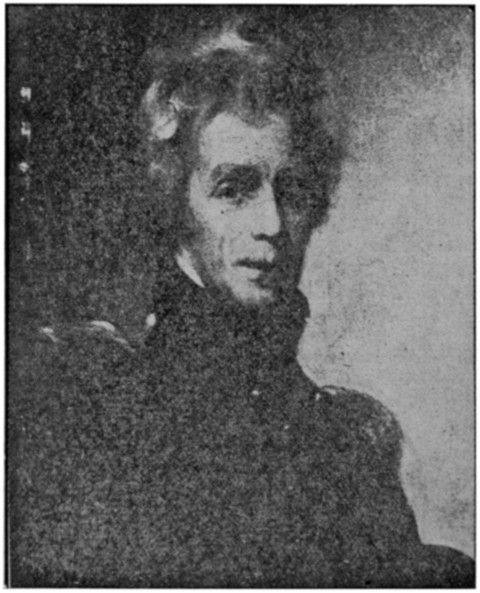
ANDREW JACKSON.
The family name of Andrew Jackson’s mother was Hutchinson. She had, at least, a primary English education, for it was she who taught Andrew to read. That she was a woman of strong, lovable traits, is proven by the sound advice she impressed upon the mind of her great son, and by the passionate attachment to her which he carried throughout his life.
[95]
After the battle of New Orleans, when the victor had been crowned with laurel in the Cathedral and acclaimed like a demi-god through the streets, it was of his mother that he spoke to the officers whom he was about to disband—their glorious work being done.
“Gentlemen, if only SHE could have lived to see this day!”
As you follow the narrative of Andrew Jackson’s career, you will hear him say many things that you will not approve, will see him do many things which you cannot applaud, but when you recall that at the very top-notch of his success and his pride, his heart stayed in the right place, and was sore because his mother could not be there to gladden her old eyes with the glory of her son—you will forgive him much in his life that was harsh and cruel and utterly wrong.
During each Winter, for two or three years, after he had reached the age of seven, Andrew Jackson was sent to the old-field school of a Mr. Branch. After this, he attended the select school which a Presbyterian preacher, Dr. David Humphreys, taught in the Waxhaw settlement. He appears to have been going to this higher school in the spring of 1780, when the inroad of Tarleton created a panic in that portion of the Carolinas. At some later period of his youth, he is said to have attended the old Queen College or Seminary at Charlotte a couple of terms, but the time is not definitely known.
As to education, therefore, it may be safely stated that Andrew Jackson enjoyed much more than the ordinary advantage of a back-woods boy of his time. At the age of ten, he had become so good a reader that he was often chosen to read the newspaper to the assembled neighbors; and he remembered with pride, in after years, that he had thus had the honor of “reading out loud” the Declaration of Independence upon its arrival in the Waxhaws. For a lad of ten this was, indeed, something to remember with honest pride.
He also learned to write “a good hand,” which can be easily read even to this day: he was well up in arithmetic, and was fond of geography: grammar he detested, as most of us did. While yet a school-boy he wrote a composition which was in the nature of a patriotic proclamation, reminding his countrymen that they must expect occasional defeats and that they could hope to win only by steady effort and resolute courage.
From the advent of Tarleton, in 1780, and the Buford Massacre, until the surrender of Cornwallis, the widow Jackson and her boys were tossed hither and thither in the whirlwind of the Revolutionary War. The people of the Carolinas were divided, as they were in other states, some being Tories and in favor of remaining as subjects of Great Britain, while the majority were Whigs, and in favor of Independence.
The feud between the two local factions waxed bitter, splitting into savage groups almost every neighborhood, and often setting in hostile array, the one against the other, members of the same family.
The troops sent over to this country by King George committed many atrocities, some of which historians have shrunk[96] from recording, but it is also true that many a nameless horror was perpetrated by our own people upon each other. In the later stages of the conflict, almost no mercy was shown by Tory to Whig, or by Whig to Tory.
After Gates’ disastrous defeat at Camden, Andrew Jackson made his home for a while at the house of Mrs. Wilson, a distant connection of Mrs. Jackson. This lady lived a few miles from Charlotte. During his stay with her, Andrew made himself useful pulling fodder, going to mill, driving the cows to pasture, gathering vegetables for the table, carrying in the wood, and taking farm tools to the blacksmith shop to be mended.
Mrs. Wilson had a son who became Andrew Jackson’s playmate and friend; and this son, who was afterward a prominent minister of the Gospel, used to relate that whenever young Jackson went to the blacksmith shop he would bring back with him some new weapon, spear, club, tomahawk, or grass blade with which to kill the British.
Dr. Wilson remembered having told his mother one day, when speaking of Jackson, “Mother, Andy will fight his way in the world.”
A girl of the neighborhood, who became in due time Mrs. Smart, happened to see Andrew Jackson as he passed along the road, on his way to the home of Mrs. Wilson.
She described the lad as being almost a scarecrow. He was riding a little grass-fed pony or colt, which was so small that the long thin legs of “the gangling fellow,” Jackson, could almost meet under the horse’s belly. The rider wore a wide-brimmed hat which flapped down over his face, which was yellow and worn. His figure was covered with dust, and as this Knight of the Sorrowful Countenance galloped along the road, he and his shabby little horse presented the forlornest spectacle that had ever greeted the laughing eyes of the girl who was to become known in Jacksonian annals as Mrs. Susan Smart.
Hugh Jackson, the oldest of the three boys, joined the band of patriots which was raised and equipped, at his own expense, by that noble leader, Colonel William R. Davie, of South Carolina. Only sixteen years of age, Hugh Jackson left the field hospital, where he had been suffering from fever, and joined in the assault upon Stono Ferry. The excitement, the exertion, the heat of the day (June 20, 1779), brought on a relapse, and the gallant youth died.
As to Andrew Jackson, he himself said,
“Take it altogether, I saw and heard a good deal of war in those days, but did nothing toward it myself worth mention.”
However, he further stated that he acted for Colonel Davie as mounted orderly, or messenger, “being a good rider and familiar with all the roads in those regions.”
He witnessed the battles of Hanging Rock and Hobkirk’s Mill, and took part in a skirmish with the Tories at the house of Captain Sands.
Andrew and Robert Jackson were taken prisoners, and it was while so held that the boys were ordered, Robert first and then Andrew, to clean the boots of one of Tarleton’s lieutenants.[97] Both refused, and to each was dealt a savage sabre-cut which had much to do with Robert’s death soon afterward, and which gave to Andrew a scar and a hatred which he bore to his grave.
To the rescue of her boys, came Mother Jackson, she who was “as gentle as a dove and as brave as a lioness.”
The lads were so young, and were in such a desperate plight with smallpox, that the British officers were perhaps glad to get rid of such an encumbrance; at any rate they were released or exchanged, and the forlorn group, the mother and her sick boys, journeyed back to their home.
But Robert was already so far gone that he died; and when the smallpox left Andrew he was a mere skeleton. “It took me all the rest of the year (1781) to recover my strength and get flesh enough to hide my bones.”
To the sacred cause of liberty, Elizabeth Jackson had already given two of her sons. The third had barely escaped a like fate. But the golden-hearted woman was not to be cast down, or taught cowardly prudence. No sooner was Andrew out of danger, than she sent him to the home of Joseph White, another brother-in-law, and set out, herself, to carry food and medicine to the sick and wounded patriots who were confined in the British hulks in Charleston Harbor.
Braver, it may be, than the soldier himself is the battlefield nurse who brings water to his parched lips, bandages to his bleeding wound, tender ministrations to his dying hours.
May it yet come to pass that some time, SOME TIME, in the unfolding of higher and better things, these angels of Mercy, the Good Women of the Christian Nations, may be able to rush in between the lines, as once happened in the days of old, and stay the hands lifted to shed human blood!
Elizabeth Jackson, in the spirit of consecration, went to what seemed to her the post of duty, thinking nothing of the cost to herself.
They were in prison—her neighbors, friends, compatriots—and she did visit them. She brought to the suffering prisoners words of comfort; messages from home; the motherly sympathy which heals like a balsam; the kind word which is sweeter than myrrh.
Then the ministering angel, the best of all created things, a good woman, passed out of the ship, carrying with her the deadly fever which knew no difference betwixt the good and the bad. After a brief illness she died, and she was buried near Charleston; but, like her husband, her dust lies in a grave that cannot be found.
After the loss of his mother (in the fall of 1781), Andrew Jackson remained with Joseph White, a saddler by trade, helping him in his shop, in the making and mending of saddles and harness. At the same time, he read everything he could lay his hands on—books, pamphlets and newspapers. His uncle’s father was a local magistrate, possessed of a book of law forms and rules of common practice. Most young men would lay such a book underneath a volume of Sermons, and then spread a layer[98] of dust over both; but Andrew Jackson afterward said that he read and re-read the law book until he knew it by heart.
But at this period in his growth an unfortunate thing happened. The death of his father and his brothers had left Andrew Jackson the heir-at-law to a considerable part of the estate of Hugh Jackson, of Carrickfergus, his grandfather.
The amount, some fifteen hundred or two thousand dollars, was just about enough to unsettle the average young man, jostling him out of the routine of dull, monotonous industry—saddle-mending, for example.
The legal representative of the Hugh Jackson estate, in America, was the William Barton, of Charleston, at whose house Elizabeth Jackson had died. Why it was that he turned over the money to the young man before he became of age is not explained. Perhaps Andrew wanted the money, and had made up his mind to get it. If so, the conduct of Barton is comprehensible. Whenever Andrew Jackson wanted a thing and made up his mind to get it, he could become a most troublesome customer. At all events, Mr. Barton paid over the money to the boy, and the boy sowed wild oats with it.
He bought a fine horse, and fine equipments for the horse; he bought fine raiment for his own person, including a gold watch; he bought a fine pair of pistols, so that he would be ready in case it became desirable to shoot somebody. In short, he went to going all the gaits of a fast young man, until his money was gone.
At the last, he made a bet which would have swept away even his horse, had he lost; but luck favored him; he won; and it is a convincing proof of his inborn good sense that he immediately paid up his debts, and rode his fine horse away from Charleston and its allurements.
Studying Law!
To that stage had Andrew Jackson came, in 1785, steered by the unseen forces which govern the world. It is doubtful whether he himself could have explained how he happened to drift into that profession rather than some other.
In the finding of one’s life-work there is much more of feeling around in the dark than is generally supposed. Cervantes did not begin to write Don Quixote until he had tried success by many routes, and had landed on the wrong side of a prison door. Bacon’s best work was done after his disgrace as an officer of state and after Queen Elizabeth had expressed the weighty opinion that he didn’t know much law.
Oliver Goldsmith, the neglected physician, wrote “The Deserted Village” and “The Vicar of Wakefield” after he had waited in vain for patients bringing fees.
Had Napoleon been a success as an author, he might never have meddled with politics.
[99]
Had General Lew Wallace been a success as a soldier, he might never have written “Ben Hur.”
Had U. S. Grant been a money-maker at the outbreak of the Civil War, he might never have commanded on the winning side at Appomattox.
Had Sam Houston been able to wear with credit the harness of social and political existence in Tennessee, he might never have thrown himself amid the wilder men of the Southwest and won fame as a builder of empire!
Patrick Henry’s failure in other fields shunted him into the legal profession; and Jefferson’s partial failure as a lawyer became a stepping-stone into the higher calling of practical statesmanship.
Happy is the man who can find out, early in life, the work which he is best fitted to do. Among the most pitiable of the wretched is he who grows old at a task which, too late, he learns was not set for him.
The gray-haired school-teacher or commonplace preacher, who realizes that he should have been a merchant, lawyer, doctor or civil engineer, is pathetic. To know what to try to do is the great problem, and it may be that even the men who succeed in their chosen calling could have rendered mankind better service in some other field.
Henry Brougham’s shrewd old mother bewailed his quitting the House of Commons to don the robes of Lord Chancellor: Dr. Samuel Johnson lamented the fate which never gave him a chance to try his hand in Parliament: Edmund Burke writhed under Goldsmith’s famous lashing of him “who to party gave up what was meant for mankind.”
What is it that draws the most ambitious men of modern times into “the study of law”?
The reward, of course. All things considered, no other profession offers so great a return upon the investment of time, talent and industry.
While the nations are standing in arms, clothed in steel from head to foot, the purpose is not so much to fight as to discourage attack from without and insurrection from within. The standing army gives the education whose watchword is “Obey!” It cultivates the class-pride and prejudice upon which caste rule is built. It interests millions of citizens in the maintenance of “Law and Order”—the law which imposes the yoke of the ruling caste and the order which restrains its victims from revolt.
The military profession, therefore, is one which irresistibly attracts very many aspirants to influence, to position, to power; but even the military profession does not win over so many ambitious young men as does “the study of the law.”
In the building up of our civilization we have complicated matters to such an extent that the lawyer is indispensable, almost omnipotent.
Does the layman know anything about his own rights as a citizen? Very little. Upon the simplest things only is he informed. At every turn he finds himself under the necessity of getting help from the lawyer. Great is the corporation—the[100] bank, the railroad, the trust—but the corporation dares not move a step without a lawyer in the pilot-house.
From the Justice’s Court in the rural district and the Mayor’s Court in the village, all the way up to Presidential policies and Governmental problems, the lawyer is the doctor who must be called in to look at the tongue of the difficulty, and to write out a prescription.
In the business world the lawyer levies his tribute upon the great and the small, the rich and the poor, the hayseed farmer and the silk-hat financier.
Our Wall Street Money-Kings would no more think of organizing a rascally scheme of High Finance without the help of lawyers than the buccaneers of old would have thought of flying the pirate flag without guns on board.
In the political world the lawyer is omnipresent, indispensable.
Who organizes the Machine and steers the Boss on his cruise, keeping him off the reefs and bars of the Criminal Code?
The lawyer.
Who maps out the campaign, devises a fraud upon the people which the statute cannot quite reach, and then, after the election has been stolen from the people, shows the Boss how to keep the stolen goods in defiance of right and in spite of the legal proceedings?
The lawyer.
Who is it that the beneficiaries of class-legislation naturally select to advance their claims, voice their demands, guard their interests in the legislatures of states, in the Congress of the United States, in the Cabinet of the President?
The lawyer.
Under our system, so complex has it become, the man who wants to do right doesn’t know how. Except in the simplest transactions, a lawyer must show him how. If, on the contrary, a bad man wants to do wrong, but wants to escape punishment, he needs, and can generally get, a lawyer to show him the way.
The innocent man, accused of crime, needs a lawyer; is not safe without one, and may be convicted, even then, if he happens to employ a sorry one, who can be outwitted by the prosecution.
The guilty man, accused of crime, needs a lawyer; is not safe without one; and if he employs a good one, while the prosecution is managed by a sorry one, the jury may be forced to turn him loose, although they feel that he is “as guilty as a dog.”
Thus, looked at from the standpoint of mere ambition, sordid selfishness, the “study of law” powerfully attracts young men who want to get on in the world.
But there is another point of view—thank God!
It is not every student of Blackstone or Coke who licks his chops, by anticipation, over the sweets of mental prostitution.
It is not every student of the law who means to become the jackal to the lion, the doer of dirty work for hire, the seller of divinely fashioned genius to the highest bidder—with the morals of a harlot, without that excuse of dire necessity which the harlot can often give.
In most cases the boy who comes to the study of the law is[101] actuated by nobler motives, a higher purpose. A generous ambition to gain knowledge, to fit himself for a leader’s place among men, to arm himself with the weapons which enable him to fight the battles of the weak and to defend the right against the wrong, find place in his mind and heart, just as they do in the beautiful language of the oath which he must take.
Almost in the very words—and quite in the identical spirit—that ancient Chivalry solemnly swore the Knight-Errant to his duty, pledging him to champion the cause of the weak and the oppressed, the oath of office consecrates the young lawyer to his work by the same holy vows. For it must be remembered that no profession has a more glorious tradition and heritage than that of the law.
The Crusaders who have in modern times gone forth to redeem the Holy Sepulchre of Truth from the Infidel have been led, by whom?
The lawyer.
The Knight-Errant who rode forth, panoplied in burnished steel, to break the chains, lift the yoke, batter down the prison door of the captive, the weak, the oppressed, has been, whom?
The lawyer.
Great was Mirabeau, but he dreamt only of changing France into a constitutional monarchy, leaving Divine Right on the throne and hereditary Privilege in force.
It was Danton, the lawyer, who led the Revolution, and sketched the Democratic state, in which all the people should rule for the benefit of all.
It was the lawyer who led in the long, hard fight for Civil liberty in England; the lawyer who slew the monsters of her Criminal Code; the lawyer who armed the private citizen with school-book and ballot.
It was the lawyer who pleaded Ireland’s cause at the bar of Public Opinion, wrung from British intolerance Religious Freedom, compelled the recognition of the Irishman’s rights in Irish land, and so won upon the conscience and the fear of the ruling caste that the triumph of the Cause of Ireland has become a question of time rather than a matter of doubt.
In our own history, whose record is better than that of the lawyer?
Would our forefathers ever have gone to war with Great Britain had they awaited the lead of Benjamin Franklin, John Dickinson and George Washington?
Never in the world.
Not until Patrick Henry and Dabney Carr and Thomas Jefferson and James Otis and John Adams and Alexander Hamilton, the hot-headed young lawyers, had fired the woods, and the flames were leaping onward with a rush which none could stop, did those more cautious and conservative citizens, Franklin, Dickinson and Washington, commit themselves to the movement of the Colonies against the Mother Country.
The lawyer lit the signal fires of that Revolution, the lawyer wrote the Declaration of Independence, the lawyer framed the Constitution, the lawyer organized the Government. The lawyer[102] struck down Feudalism in America, wrote the statute for Religious Liberty, swung wide the doors of individual opportunity, and forged, ready for use, every weapon against tyranny which a free people need to protect themselves from oppression.
Even at that early period there was another side to the shield, not so bright as that which I have presented, but, throughout the Revolutionary Era, the patriotic service of the lawyer was so splendidly conspicuous that the reverse side of the shield was as the spot on the sun.
When Andrew Jackson rode into Salisbury, N. C. (1785), and put up at the Rowan House, the old-fashioned tavern, he was eighteen years old, and had already gone to the school of experience, to an extent which few of his future competitors for national honor had equaled.
His boyhood had breathed in the hot atmosphere of war. The sound of musketry, of rifle fire, of cannon play, had been familiar to his ear. The sight of bloodshed, scenes of carnage, the ruthless deeds of Tory hate and Whig revenge had burnt their impressions upon mind and heart. The dangers amid which he had lived, the hardships which he had endured, the lust of victory and the panic of defeat, the sudden flight from the deadly attack, the narrow escape from awful death, the loss of his brothers and mother, the imprisonment and maltreatment of himself, the wild disorders and appalling cruelties of foreign invasion added to Civil strife—all these things were factors in the molding of Andrew Jackson.
When he entered the office of Spruce McCay to read law under that influential attorney, he had already given evidence of the traits of character which afterward made him one of the best loved and best hated men that ever lived.
It had already been shown that he would fight at the drop of a hat; that he was headstrong, impatient of contradiction, and overbearing. Weaker boys who turned to him for protection got it. He would “take up” for the small boy, and, if need were, wage his battle. He was high-tempered, quick as powder, hard to get along with—and the boy who laughed at him because he had what was called “a slobber mouth” had to run or fight.
He had shown that he was fond of outdoor life, outdoor sport games, and recreations. He loved to hunt, was a good shot, an expert horseman and rode admirably, excelled in running and jumping. Some say that even when thrown by a stronger man he “wouldn’t stay throwed”; others relate that John Lewis could out-jump him and throw him down; and that when John Lewis threw him, Andy did “stay throwed.” That he was believed to have a generous nature is proven by the fact that he is said to have been a great friend to this same John Lewis.
The eighteen-year old Jackson had already shown his fondness for gambling at cards, on chicken fights and horse races, on the throw of a dicebox, on almost any sort of game or contest. He was known also as a wild young fellow who would drink too much whisky, indulge in too many coarse practical jokes, and who, when inflamed by anger, could out-curse anybody in all the regions round about.
[103]
During his stay of two years in Salisbury Jackson’s character continued to unfold itself along those lines. He was not much of a student; it is not recorded that he did any office work for Spruce McCay; nor does any biographer explain how it was that he paid for his board and lodging.
It seems that he kept his horse, and that he was active in horse-racing, cock-fighting, card-playing circles; but it is not probable that he relied upon his winnings to pay his way.
How, then, did he do it?
Perhaps his work as school-teacher should be assigned to this period of his life, and it is possible that some remnant of his legacy may have tided him over.
Illustrative of the rougher side of his character is the practical joke which he played upon the eminent respectabilities of Salisbury by sending cards of invitation to the Christmas ball to two notorious strumpets of the town. The unclean birds came to the ball, as per Andrew Jackson’s cards, and the uproar in the fowl-house was considerable. But Andy was a great favorite with the ladies—as “wild” young men have ever been—and he succeeded in getting rid of the disturbers and at the same time holding the admiration of the eminently respectable.
Another anecdote of the period represents him engaged with boon companions in a carousal, which lasted throughout the night and wound up with a general smashing of all the furniture in the room.
A flood of light is poured upon his standing with the “unco’ good and rigidly righteous” at this time by the exclamation of the old lady of Salisbury, who, on being told, forty years later, that Andrew Jackson was a candidate for President, cried out:
“What! Jackson up for President? Jackson? Andrew Jackson? The Jackson that used to live in Salisbury? Why, when he was here, he was such a rake that my husband would not bring him into the house! It is true, he might have taken him out to the stable to weigh horses for a race, and might drink a glass of whisky with him there. Well, if Andrew Jackson can be President, anybody can.”
From the office of Judge Spruce McCay Jackson went to that of Colonel John Stokes, where he continued his studies until he thought himself ready for admission to the Bar. In the spring of 1787 he applied for and received his license to practice law.
For a year after his admission to the Bar he appears to have lived at a village in Martinsville, N. C., where two friends of his kept a store. Tradition says that he helped them in running the business, and that he accepted a local position as constable or deputy-sheriff. At any rate, he realized soon that he was gaining no foothold in North Carolina, and he made up his mind to try his fortune in the new country beyond the mountains, where Robertson and Donelson and Sevier were planting the beginning of another state on the Cumberland.
Before we follow Jackson into Tennessee, let us pause “to take his picture.”
He was tall and slender—standing six feet and one inch in height. Carrying himself straight as a ramrod, and stepping[104] with a quick, springing clearlift walk, he made the impression upon the observer that he was as active as a cat—lithe, sinewy, tough, and with not a lazy bone in his body.
He had a shock of red hair, and a pair of fine blue eyes, which rested unwinkingly upon one in conversation, and which blazed when he was aroused. His face was sallow, freckled, long, thin, angular, with a fighting jaw.
His bearing toward men was open, frank, confident, self-assertive.
Toward women he was deferential, most attentive and polite. Surprising as it may seem, there is no room for doubt that Andrew Jackson’s manner toward ladies was from the first, captivating to a marked degree. By the time he reached the age of eighteen he had developed a taste for good dressing. The same trait which led him to want the finest-looking horse, the richest caparison, the best pistols and guns, the best dogs and game chickens, led him to choose for himself a style of wearing apparel, both in the material and the make, which was far above the average of the backwoods.
Some of his lady friends went to the courthouse the day he was examined for admission to the Bar, and one of these has left a description of him as he then appeared.
Those who recall Albert Gallatin’s statement that Jackson, when in Congress, looked and dressed like an uncouth backwoodsman may not be able to reconcile his testimony with that of Mrs. Anne Rutherford, who says:
“He always dressed neat and tidy, and carried himself as if he was a rich man’s son.
“The day he was licensed he had on a new suit, with a broadcloth coat, ruffled shirt, and other garments in the best of fashion.”
There is no disputing about taste; and the reader is left to the conclusion that a style of dressing which appeared to be the best of fashion to a country girl of North Carolina may have seemed “irregular” to such a cosmopolitan gentleman as Gallatin.
The red breeches of Thomas Jefferson had been “the best of fashion” in Paris, but when he wore them in New York, as a member of Washington’s Cabinet, social rumblings were heard and social upheavals feared.
(To be Continued.)

[105]
 A
young man was
walking up and down
the waiting room of a
railway station, in an
agitated condition. He
wore blue spectacles,
and, although he had
not a cold, he used his
pocket-handkerchief incessantly. He
held a little black bag in his left hand
which, as I learned later, contained a
silk dressing-gown and a pair of Turkish
pantaloons.
A
young man was
walking up and down
the waiting room of a
railway station, in an
agitated condition. He
wore blue spectacles,
and, although he had
not a cold, he used his
pocket-handkerchief incessantly. He
held a little black bag in his left hand
which, as I learned later, contained a
silk dressing-gown and a pair of Turkish
pantaloons.
Every now and again he went to the door and looked into the street, then he drew out his watch and consulted the station clock. The train did not leave for an hour; but there are people who always imagine they will be late. This train was not for people in a pressing hurry; there were very few first-class carriages in it. It was not an hour at which stock-brokers left, after business was finished, to go to their country homes for dinner. When travellers began to appear, a Parisian would have recognized from their bearing that they were either farmers, or small suburban tradesmen. Nevertheless, every time anyone came into the station, or a carriage drew up at the door, the heart of the young man with the blue spectacles became inflated like a balloon, his knees trembled, his bag almost fell from his hands, and his glasses off his nose, where, we may mention in passing, they were seated crookedly.
His agitation increased when, after a long wait, a woman appeared by a side door, from precisely the direction in which he had kept a constant lookout. She was dressed in black with a thick veil over her face, and she held a brown morocco leather bag in her hand, containing, as I subsequently discovered, a wondrous morning-gown and blue satin slippers. The woman and the young man advanced towards each other looking to right and left, but never in front of them. They came up to one another, shook hands, and stood several minutes without speaking a word, trembling and gasping, a prey to one of those intense emotions for which I would give in exchange a hundred years of a philosopher’s life.
“Leon,” said the young woman, when she had summoned up courage to speak (I had forgotten to mention that she was young and pretty)—“Leon, what a happy thought! I should never have recognized you with those blue spectacles.”
“What a happy thought!” said Leon. “I should never have known you under that black veil.”
“What a happy thought!” she repeated. “Let us be quick to take our seats; suppose the train were to start without us!...” (and she squeezed his arm tightly). “No one will suspect us. I am now with Clara and her husband, on the way to their country house, where, tomorrow, I must say good-bye to her; ... and,” she added, laughing and lowering her head, “she left an hour ago;[106] and tomorrow, ... after passing the last evening with her, ... (again she pressed his arm), tomorrow in the morning, she will leave me at the station, where I shall meet Ursula, whom I sent on ahead to my aunt’s.... Oh! I have arranged everything. Let us take our tickets.... They cannot possibly guess who we are. Oh! suppose they ask our names at the inn? I have forgotten them already....”
“Monsieur and Madame Duru.”
“Oh no! Not Duru. There was a shoemaker called that at the pension.”
“Dumont, then?”
“Daumont.”
“Very well. But no one will ask us.”
The bell rang, the door of the waiting-room opened, and the carefully veiled young woman rushed into a carriage with her youthful companion. The bell rang a second time, and the door of their compartment was closed.
“We are alone!” they exclaimed delightedly.
But, almost at the same moment, a man of about fifty, dressed completely in black, with a grave and bored expression, entered the carriage and settled himself in a corner. The engine whistled, and the train began to move. The two young people drew back as far as they could from their unwelcome neighbor and began to whisper in English as an additional precaution.
“Monsieur,” said the other traveller, in the same tongue, and with a much purer British accent, “if you have secrets to tell each other, you had better not tell them in English before me, for I am an Englishman. I am extremely sorry to annoy you; but there was only a single man in the other compartment, and I make it a rule never to travel alone with one man only.... He had the face of a Judas and this might have tempted him.”
He pointed to his travelling-bag, which he had thrown before him on the cushion.
“But I shall read if I do not go to sleep.”
And, indeed, he did make a gallant effort to sleep. He opened his bag, drew out a comfortable cap, put it on his head, and kept his eyes shut for several minutes; then he reopened them with a gesture of impatience, searched in his bag for his spectacles, then for a Greek book. At length he settled himself to read, with an air of deep attention. While getting his book out of the bag he displaced many things piled up hap-hazard. Among others, he drew out of the depths of the bag a large bundle of Bank of England notes, placed it on the seat opposite him, and, before putting it back in the bag, he showed it to the young man, and asked him if there was a place in N—— where he could change banknotes.
“Probably, as it is on the route to England.”
N—— was the place to which the young people were going. There is quite a tidy little hotel at N——, where people seldom stop except on Saturday evenings. It is held out that the rooms are good, but the host and his helpers are far enough away from Paris to indulge in this provincial vice. The young man whom I have already called by the name of Leon, had been recommended to this hotel some time previously, when he was minus blue spectacles, and, upon his recommendation, his companion and friend had seemed desirous of visiting it.
She was, moreover, at that time in such a condition of mind that the walls of a prison would have seemed delightful, if they had enclosed Leon with her.
In the meantime the train journeyed on; the Englishman read his Greek book, without looking towards his companions, who conversed in that low tone that only lovers can hear.[107] Perhaps I shall not astonish my readers when I tell them that these two were lovers in the fullest acceptation of the term, and what was still more deplorable, they were not married, because there were reasons which placed an obstacle in the way of their desire.
They reached N——, and the Englishman got out first. Whilst Leon helped his friend to descend from the carriage without showing her legs, a man jumped on to the platform from the next compartment. He was pale, even sallow; his eyes were sunken and bloodshot, and his beard unkempt, a sign by which great criminals are often detected. His dress was clean, but worn almost threadbare. His coat, once black, but now grey at the back and by the elbows, was buttoned up to his chin, probably to hide a waistcoat still more shabby. He went up to the Englishman and put on a deferential tone.
“Uncle!” he said.
“Leave me alone, you wretch!” cried the Englishman, whose grey eyes flashed with anger; and he took a step forward to leave the station.
“Don’t drive me to despair,” replied the other, with a piteous and yet at the same time menacing accent.
“Will you be good enough to hold my bag for a moment?” said the old Englishman, throwing his travelling-bag at Leon’s feet.
He then took the man who had accosted him by the arm, and led, or rather pushed, him into a corner, where he hoped they would not be overheard, and there he seemed to address him roughly for a moment. He then drew some papers from his pocket, crumpled them up, and put them in the hand of the man who had called him uncle. The latter took the papers without offering any thanks, and almost immediately took himself off and disappeared.
As there is but one hotel in N—— it was not surprising that, after a short interval, all the characters of this veracious story met together there. In France every traveller who has the good fortune to have a well-dressed wife on his arm is certain to obtain the best room in any hotel; so firmly is it believed that we are the politest nation in Europe.
If the bedroom that was assigned to Leon was the best, it would be rash to conclude that it was perfect. It had a great walnut bedstead, with chintz curtains, on which was printed in violet the magic story of Pyramis and Thisbe. The walls were covered with a colored paper representing a view of Naples and a multitude of people; unfortunately, idle and impertinent visitors had drawn moustaches and pipes to all the figures, both male and female, and many silly things had been scribbled in lead-pencil in rhyme and prose on the sky and ocean. Upon this background hung several engravings: “Louis Philippe taking the Oath of the Charter of 1830,” “The first Interview between Julia and Saint-Preux,” “Waiting for Happiness,” and “Regrets,” after M. Dubuffe. This room was called the Blue Chamber, because the two arm-chairs to left and right of the fireplace were upholstered in Utrecht velvet of that color; but for a number of years they had been covered with wrappers of grey glazed calico edged with red braid.
Whilst the hotel servants crowded round the new arrival and offered their services, Leon, who, although in love, was not destitute of common sense, went to order dinner. It required all his eloquence and various kinds of bribes to extract the promise of a dinner by themselves alone. Great was his dismay when he learnt that in the principal dining-room, which was next his room, the officers of the 3rd Hussars, who were about to relieve the officers of the 3rd Chasseurs at N——, were going to join at a farewell dinner that very day, which would be a lively affair. The host swore by all his gods that, except a[108] certain amount of gaiety which was natural to every French soldier, the officers of the Hussars and Chasseurs were known throughout the town for their gentlemanly and discreet behavior, and that their proximity would not inconvenience madam in the least; the officers were in the habit of rising from table before midnight.
As Leon went back to the Blue Chamber but slightly reassured, he noticed that the Englishman occupied the other room next his. The door was open, and the Englishman sat at a table upon which were a glass and a bottle. He was looking at the ceiling with profound attention, as though he were counting the flies walking on it.
“What matter if they are so near,” said Leon to himself. “The Englishman will soon be tipsy, and the Hussars will leave before midnight.”
On entering the Blue Chamber his first care was to make sure that the communicating doors were tightly locked, and that they had bolts to them. There were double doors on the Englishman’s side, and the walls were thick. The partition was thinner on the Hussars’ side, but the door had a lock and a bolt. After all, this was a more effectual barrier to curiosity than the blinds of a carriage, and how many people think they are hidden from the world in a hackney carriage!
Assuredly the most opulent imagination could certainly never have pictured a more complete state of happiness than that of these two young lovers, who, after waiting so long, found themselves alone and far away from jealous and prying eyes, preparing to relate their past sufferings at their ease and to taste the delights of a perfect reunion. But the devil always finds out a way to pour his drop of wormwood into the cup of happiness.
Johnson was not the first who wrote—he took it from a Greek writer—that no man could say, “Today I shall be happy.” This truth was recognized at a very remote period by the greatest philosophers, and yet is ignored by a certain number of mortals, and especially by most lovers.
Whilst taking a poorly served dinner in the Blue Chamber from some dishes filched from the Hussars’ and the Chasseurs’ banquet, Leon and his lover were much disturbed by the conversation in which the gentlemen in the neighboring room were engaged. They held forth on abstruse subjects concerning strategy and tactics, which I shall refrain from repeating.
There were a succession of wild stories—nearly all of them broad and accompanied by shrieks of laughter, in which it was often difficult for our lovers not to join. Leon’s friend was no prude; but there are things one prefers not to hear, particularly during a tete-a-tete with the man one loves. The situation became more and more embarrassing, and when they were taking in the officers’ dessert, Leon felt he must go downstairs to beg the host to tell the gentlemen that he had an invalid wife in the room adjoining theirs, and they would deem it a matter of courtesy if a little less noise were made.
The noise was nothing out of the way for a regimental dinner, and the host was taken aback and did not know what to reply. Just when Leon gave his message for the officers, a waiter asked for champagne for the Hussars, and a maidservant for port wine for the Englishman.
“I told him there was none,” she added.
“You are a fool. I have every kind of wine. I will go and find him some. Port is it? Bring me the bottle of ratafia, a bottle of quince and a small decanter of brandy.”
When the host had concocted the port in a trice, he went into the large dining-room to execute Leon’s commission, which at first roused a furious storm.
Then a deep voice, which dominated all the others, asked what kind of a[109] woman their neighbor was. There was a brief silence before the host replied—
“Really, gentlemen, I do not know how to answer you. She is very pretty and very shy. Marie-Jeanne says she has a wedding ring on her finger. She is probably a bride come here on her honeymoon, as so many others come here.”
“A bride?” exclaimed forty voices. “She must come and clink glasses with us! We will drink to her health and teach the husband his conjugal duties!”
At these words there was a great jingling of spurs, and our lovers trembled, fearing that their room was about to be taken by storm. All at once a voice was raised which stopped the manœuvre. It evidently belonged to a commanding officer. He reproached the officers with their want of politeness, ordered them to sit down again and to talk decently, without shouting. Then he added some words too low to be heard in the Blue Chamber. He was listened to with deference, but, nevertheless, not without exciting a certain amount of covert hilarity. From that moment there was comparative quiet in the officers’ room; and our lovers, blessing the salutary reign of discipline, began to talk together with more freedom.... But after such confusion it was a little time before they regained that peace of mind which anxiety, the worries of travelling, and, worse than all, the loud merriment of their neighbors, had so greatly agitated. This was not very difficult to accomplish, however, at their age, and they had very soon forgotten all the troubles of their adventurous expedition in thinking of its more important consequences.
They thought peace was declared with the Hussars. Alas! it was but a truce. Just when they expected it least, when they were a thousand leagues away from this sublunary world, twenty-four trumpets, supported by several trombones, struck up the air well known to French soldiers, “La victoire est nous!” How could anyone withstand such a tempest? The poor lovers might well complain.
***
But they had not much longer to complain, for at the end the officers left the dining-room, filed past the door of the Blue Chamber with a great clattering of spurs and sabres, and shouted one after the other—
“Good night, madam bride!”
Then all noise ceased. No, I am mistaken; the Englishman came out into the passage and cried out—
“Waiter! bring me another bottle of the same port.”
Quiet was restored in the hotel of N——. The night was fine and the moon at the full. From time immemorial lovers have been pleased to gaze at our satellite. Leon and his lover opened their window, which looked on a small garden, and breathed with delight the fresh air, which was filled with the scent of a bower of clematis.
They had not looked long, however, before a man came to walk in the garden. His head was bowed, his arms crossed, and he had a cigar in his mouth, Leon thought he recognized the nephew of the Englishman who was fond of good port wine.
***
I dislike useless details, and besides, I do not feel called upon to tell the reader things he can readily imagine, nor to relate all that happened hour by hour in the inn at N——. I will merely say that the candle which burned on the fireless mantle-piece of the Blue Chamber was more than half consumed when a strange sound issued from the Englishman’s room, in which there had been silence until now; it was like the fall of a heavy body. To this noise was added a kind of cracking, quite as odd, followed by a smothered cry and several inarticulate words like an oath. The two young[110] occupants of the Blue Chamber shuddered. Perhaps they had been waked up suddenly by it. The noise seemed a sinister one to both of them, for they could not explain it.
“Our friend the Englishman is dreaming,” said Leon, trying to force a smile.
But although he wanted to reassure his companion, he shivered involuntarily. Two or three minutes afterwards a door in the corridor opened cautiously, as it seemed, then closed very quietly. They heard a slow and unsteady footstep which appeared to be trying to disguise its gait.
“What a cursed inn!” exclaimed Leon.
“Ah, it is a paradise!” replied the young woman, letting her head fall on Leon’s shoulder. “I am dead with sleep....”
She sighed, and was very soon fast asleep again.
A famous moralist has said that men are never garrulous when they have all their heart’s desire. It is not surprising, therefore, that Leon made no further attempt to renew the conversation or to discourse upon the noises in the hotel at N——. Nevertheless, he was preoccupied, and his imagination pieced together many events to which in another mood he would have paid no attention. The evil countenance of the Englishman’s nephew returned to his memory. There was hatred in the look that he threw at his uncle even while he spoke humbly to him, doubtless because he was asking for money.
What would be easier than for a man, still young and vigorous, and desperate besides, to climb from the garden to the window of the next room? Moreover, he was staying at the hotel, and would walk in the garden after dark, perhaps ... quite possibly ... undoubtedly, he knew that his uncle’s black bag contained a thick bundle of bank-notes.... And that heavy blow, like the blow of a club on a bald head! ... that stifled cry! ... that fearful oath! and those steps afterwards! That nephew looked like an assassin.... But people do not assassinate in a hotel full of officers. Surely the Englishman, like a wise man, had locked himself in, specially knowing the rogue was about.... He evidently mistrusted him, since he had not wished to accost him bag in hand.... But why allow such hideous thoughts when one is so happy?
Thus did Leon cogitate to himself. In the midst of his thoughts, which I will refrain from analyzing at greater length, and which passed in his mind like so many confused dreams, he fixed his eyes mechanically on the door of communication between the Blue Chamber and the Englishman’s room.
In France, doors fit badly. Between this one and the floor there was a space of nearly an inch. Suddenly, from this space, which was hardly lighted by the reflection from the polished floor, there appeared something blackish and flat, like a knife blade, for the edge which the candlelight caught showed a thin line which shone brightly. It moved slowly in the direction of a little blue-satin slipper, which had been carelessly thrown close to this door. Was it some insect like a centipede?... No, it was no insect. It had no definite shape.... Two or three brown streams, each with its line of light on its edges, had come through into the room. Their pace quickened, for the floor was a sloaping one.... They came on rapidly and touched the little slipper. There was no longer any doubt! It was a liquid, and that liquid, the color of which could now be distinctly seen by the candlelight, was blood! While Leon, paralyzed with horror, watched these frightful streams, the young woman slept on peacefully, her regular breathing warming her lover’s neck and shoulder.
***
The care which Leon had taken in[111] ordering the dinner on their arrival at the inn of N—— adequately proved that he had a pretty level head, a high degree of intelligence and that he could look ahead. He did not in this emergency belie the character we have already indicated. He did not stir, and the whole strength of his mind was strained to keep this resolve in the presence of the frightful disaster which threatened him.
I can imagine that most of my readers, and, above all, my lady readers, filled with heroic sentiments, will blame the conduct of Leon on this occasion for remaining motionless. They will tell me he ought to have rushed to the Englishman’s room and arrested the murderer, or, at least, to have pulled his bell and rung up the people of the hotel. To this I reply that, in the first case, the bells in French inns are only room ornaments, and their cords do not correspond to any metallic apparatus. I would add respectfully, but decidedly, that, if it is wrong to leave an Englishman to die close by one, it is not praiseworthy to sacrifice for him a woman who is sleeping with her head on your shoulder. What would have happened if Leon had made an uproar and roused the hotel? The police, the inspector and his assistant would have come at once. These gentlemen are by profession so curious, that, before asking him what he had seen or heard, they would have questioned him as follows:—
“What is your name? Where are your papers? And what about Madame? What were you doing together in the Blue Chamber? You will have to appear at the Assizes to explain the exact month, at what hour in the night, you were witnesses of this deed.”
Now it was precisely this thought of the inspector and officers of the law which first occurred to Leon’s mind. Everywhere throughout life there are questions of conscience difficult to solve. Is it better to allow an unknown traveller to have his throat cut, or to disgrace and lose the woman one loves?
It is unpleasant to have to propose such a problem. I defy the cleverest person to solve it.
Leon did then what probably most would have done in his place. He never moved.
He remained fascinated for a long time with his eyes fixed upon the blue slipper and the little red stream which touched it. A cold sweat moistened his temples, and his heart beat in his breast as though it would burst.
A host of thoughts and strange and horrible fancies took possession of him, and an inward voice cried out all the time, “In an hour all will be known, and it is your own fault!” Nevertheless, by dint of repeating to himself “Qu’allais-je faire dens cette galere?” he finished up by perceiving some few rays of hope. “If we leave this accursed hotel,” he said to himself at last, “before the discovery of what has happened in the adjoining room, perhaps they may lose trace of us. No one knows us here. I have only been seen in blue spectacles, and she has only been seen in a veil. We are only two steps from the station, and should be far away from it in an hour.”
Then, as he had studied the time-table at great length to make out his journey, he recollected that the train for Paris stopped at eight o’clock. Very soon afterward they would be lost in the vastness of that town, where so many guilty persons are concealed. Who could discover two innocent people there? But would they not go into the Englishman’s room before eight o’clock? That was the vital question.
Quite convinced that there was no other course before him, he made a desperate effort to shake off the torpor which had taken possession of him for so long, but at the first movement he made his young companion woke up and kissed him half-consciously.[112] At the touch of his icy cheek she uttered a little cry.
“What is the matter?” she said to him anxiously. “Your forehead is as cold as marble.”
“It is nothing,” he replied in a voice which belied his words. “I heard a noise in the next room....”
He freed himself from her arms, then he moved the blue slipper and put an armchair in front of the door of communication, so as to hide the horrid liquid from his lover’s eyes. It had stopped flowing, and had now collected into quite a big pool on the floor. Then he half opened the door which led to the passage, and listened attentively. He even ventured to go up to the Englishman’s door, which was closed. There were already stirrings in the hotel, for day had begun. The stablemen were grooming the horses in the yard, and an officer came downstairs from the second story, clinking his spurs. He was on his way to preside at that interesting piece of work, more agreeable to horses than to men, which is technically known as la botte.
Leon re-entered the Blue Chamber, and, with every precaution that love could invent, with the help of much circumlocution and many euphemisms he revealed their situation to his friend.
It was dangerous to stay and dangerous to leave too precipitately; still much more dangerous to wait at the hotel until the catastrophe in the next room was discovered.
There is no need to describe the terror caused by this communication, or the tears which followed it, the senseless suggestions which were advanced, or how many times the two unhappy young people flung themselves into each other’s arms, saying, “Forgive me! forgive me!” Each took the blame. They voiced to die together, for the young woman did not doubt that the law would find them guilty of the murder of the Englishman, and as they were not sure that they would be allowed to embrace each other again on the scaffold they did it now to suffocation, and vied with each other in watering themselves with tears. At length, after having talked much rubbish and exchanged many tender and harrowing words, they decided, in the midst of a thousand kisses, that the plan thought out by Leon, to leave by the eight o’clock train, was really the only one practicable, and the best to follow. But there were still two mortal hours to get through. At each step in the corridor they trembled in every limb. Each creak of boots proclaimed the arrival of the inspector.
Their small packing was done in a flash. The young woman wanted to burn the blue slipper in the fireplace; but Leon picked it up and, after wiping it by the bedside, he kissed it and put it in his pocket. He was astonished to find that it smelt of vanilla, though his lover’s perfume was “Bouquet de l’Imperatrice Eugenie.”
Everybody in the hotel was now awake. They heard the laughing of waiters, servant-girls singing at their work, and soldiers brushing their officers’ clothes. Seven o’clock had just struck. Leon wanted to make his friend drink a cup of coffee, but she declared that her throat was so choked up that she should die if she tried to drink anything.
Leon, armed with the blue spectacles, went down to pay the bill. The host begged his pardon for the noise that had been made; he could not at all understand it, for the officers were always so quiet! Leon assured him that he had heard nothing, but had slept profoundly.
“I don’t think your neighbor on the other side would inconvenience you,” continued the landlord; “he did not make much noise. I bet he is still sleeping soundly.”
Leon leant hard against the desk to keep from falling, and the young[113] woman, who had followed him closely, clutched at his arm and tightened the veil over her face.
“He is a swell,” added the pitiless host. “He will have the best of everything. Ah! he is a good sort. But all the English are not like him. There was one here who is a skinflint. He thought everything too dear; his room, his dinner. He wanted me to take a five-pound Bank of England note in settlement of his bill for one hundred and eighty-five francs, ... and to risk whether it was a good one! But stop, Monsieur; perhaps you will know, for I heard you talking English with Madam.... Is it a good one?”
With these words he showed Leon a five-pound bank-note. On one of its corners there was a little spot of red which Leon could readily explain to himself.
“I think it is quite good,” he said in a stifled voice.
“Oh, you have plenty of time,” replied the host; “the train is not due here till eight o’clock, and it is always late. Will you not sit down, Madam? You seem tired.”
At this moment a fat servant-girl came up.
“Hot water, quick,” she said, “for milord’s tea. Give me a sponge, too. He has broken a bottle of wine and the whole room is flooded.”
At these words Leon fell into a chair, and his companion did the same An intense desire to laugh overtook them both, and they had the greatest difficulty in restraining themselves. The young woman squeezed his hand joyfully.
“I think we will not go until the two o’clock train,” said Leon to the landlord. “Let us have a good meal at midday.”

[114]
 At
an early day in the
history of our Nation,
there had emigrated to
the Southeastern shore
of the Old Dominion,
an English gentleman,
whose manners and
carriage bespoke aristocratic
lineage, and whose free use
of money made it evident to those
in the same locality, that he must have
been a man of parts in the country
whence he had come.
At
an early day in the
history of our Nation,
there had emigrated to
the Southeastern shore
of the Old Dominion,
an English gentleman,
whose manners and
carriage bespoke aristocratic
lineage, and whose free use
of money made it evident to those
in the same locality, that he must have
been a man of parts in the country
whence he had come.
He had bought up acres and acres of the land lying contiguous to the Dismal Swamp, but occupied a hewn log house some miles distant from that place of ill repute. The report gained credence that he had left the Old Country “for the good of his health,” in other words, his knowledge of and participation in the plots and counter-plots against the government, made it safer for both himself and some, whose fingers had ever held the pulse of the Nation, that he should live elsewhere; and we find him making himself a home across the waters, with stint of nothing, for a vessel never made harbor, that it did not bring a large consignment to Theodore Stanton.
In the course of time he erected for himself and family a commodious house, many of the necessary materials coming from abroad, and he was ever ready to welcome to his board any wayfarer with whom he came in contact.
It was during the time that his house was building, and he had been scouring the country for help for the work, when one day, a young Indian boy presented himself at his door asking, “Work for me do?” He spoke very indifferent English, but Mr. Stanton understood he had come in response to his inquiries for hands, and he asked, “What can you do?”
“Ride horse, shoot gun, hunt deer.”
His appearance appealed to Mr. Stanton, and he nodded his head saying, “You can hunt deer and bear for me, eat.”
That seemed satisfactory and from that time on, he called Mr. Stanton’s, home, and sure enough supplied the family with all the game they could use.
But his especial attention seemed to be paid to Mr. Stanton’s little girl, Alice, to whom he was devoted, and who never seemed so happy or contented, as when perched on Powhatan’s shoulders and scouring the country for flowers, nuts or berries. He had been at his chosen home now, for a long time, and had learned to speak and understand our tongue very well. He said he was descended from old Chief Powhatan and that little Pocahontas was his kin, but that his father had been badly treated and set aside and would not go with his tribe of Indians; but if any questions were asked, as to where his father was, a stolid look would settle[115] over his countenance, and he would make no reply; occasionally he would disappear, and be gone for a day or two, but always came back, ready for his appointed duty, to hunt the meat for Mr. Stanton. He was as straight as an arrow, and it required little imagination to believe he might be descended from a line of kings, his bearing was so dignified and regal. To no one was he communicative or unbending, save little Alice, over whom he watched with jealous care.
Mrs. Stanton, Alice’s mother, had never liked him, and often expressed uneasiness at the feeling that seemed to exist between her ewe lamb, and this dusky son of the forest, and she begged her husband to consign her to her sister’s care, in England, in that way breaking up the association, and giving Alice, at the same time, opportunities for education that she would lack in the States.
“No, wife, don’t ask me that; I have made sacrifices enough, God knows. I cannot stand to be parted from my little one; send for tutors, governesses or any other sort of SSS, that you want, I will bear all expense, but let me see my dear daughter every day, that’s a dear.” Mrs. Stanton said no more, but she watched with ever growing sorrow; the glow of pride that came to Powhatan’s dark countenance, when gazing at “Laughing Water,” as he called Alice.
The gentle girl was now turning sixteen, and had developed into great loveliness, but seemed wholly unconscious of her charms, and really I believe, that was the one thing that drew so many worshippers to her shrine.
About this time a party of gentlemen had arrived from old England, looking at lands for the settlement of some emigrants who were anxious to throw in their fate with the new settled country, and among them were the sons of some of Mr. Stanton’s early and close friends.
Frank Berkley, nephew of the ex-governor, was among the number, and soon won his way to the hearts of old and young alike, by his kindliness and sprightliness.
Alice seemed unusually lively, when he was regaling her with his exploits at college or his tilts with the fair sex at home, and her merry laugh would ring out at his bright wit or mirthful sallies.
None seemed to observe the vengeful scowls Powhatan would throw at the jolly crowd, as he crossed and recrossed the Hall, but would never enter the parlor, nor join in any of the sports. I said none—none save the anxious mother, who ever had her eye on her darling and when as a great secret Alice confided to her, that Frank wanted to take her across the water with him as his bride, she assented cheerfully, for she felt that to be the only way to save her child from some direful fate.
The party was going farther West, making explorations, and would return about Christmas time, to enjoy the festivities of that season under Mr. Stanton’s hospitable roof, and would then take shipping for home. Farewells were said, and all were well on their way, but Frank lingered. “Stay with us, Frank,” Alice said tearfully, “we will be so lonely when you are gone,” and Frank felt he would willingly tear his heart out, if it would comfort the little girl he had grown to love so much in two months.
“But,” he said, “my darling, then I would be accounted a laggard in duty, for don’t you know I was put in charge of this expedition; and will be held strictly accountable for its failure?”
“Oh!” she said, “Frank, forgive me. I will not be such a baby. I know you will soon be back, and I will try to scare away the blues and bid you a cheerful good-bye,” and he never forgot to his dying day, how she put her arms around his neck and kissed him a fond farewell. The last echo brought to him her parting words,[116] “back soon.” They did not know that an eye had watched their parting, and the owner of that orb, had trembled with rage when he witnessed the caress.
Powhatan tried to coax her to ride or row, and had made and painted pure white, a little canoe for her, but she told him it made her tired to use the oars. “Come and see what a beauty your boat is, Minnehaha; you care no more for your poor Powhatan,” he said sadly.
“Oh yes, I do,” she replied, “but I worked so hard entertaining papa’s friends, I must rest up, but I will see the boat,” and taking his hand she ran lightly to the barn, to see and admire the little white canoe, with places all around the top for lights to be inserted, when the candles were lit at night; it certainly made a beautiful show. But his coaxing could not induce her to go on the water in it, and the craft was only rigged up to show to her friends, and still remained in Powhatan’s workshop. The mornings were beginning to be frosty and the air to show that the weeks had passed along and soon now, they might look for the return of the friends. Wild turkeys were killed and dressed, venison hams were baked and boiled, and the array of cakes and pies in the pantry, looked most tempting. On the afternoon of the 23d of December, Mr. Stanton was decorating the rooms, under the supervision of his good wife, and calling to Alice, said, “Daughter, we do need some holly so much, could you not take one of the boys, and get some from the wood on the swamp road? I must hie me to the postoffice or would get it myself.”
“Oh, yes, Pop, I will take my pony and John and soon be back.”
As she went out Powhatan met her, and having heard what Mr. Stanton said, begged to be allowed to accompany her, saying, “I will take care of you, Minnehaha.” So she could not well refuse, and when he had saddled her pony and old Thunder for himself, they mounted and rode off.
The father returned with the mail, the mother dressed for the evening meal, but Alice came not.
“Oh father,” she cried, “where can she be?” and the mother grew restless and uneasy. Presently seeing John approaching, Mr. Stanton called out,
“John, where is Miss Alice, boy?”
“Sir, I didn’t go with her; she went long that Injun, he say he take good care of her.” Mrs. Stanton was almost beside herself. Wringing her hands, she begged her husband for “God’s sake,” to take some of the men and seek the child, ere she was lost in the dreadful swamps. Searching parties scoured the country all that night, and when the next morning, Mr. Berkeley and his friends arrived, they, too, joined in the hunt, which was kept up for a whole week, but nothing was ever discovered, save Alice’s little pony, quietly grazing on the edge of the swamp.
A rumor came, that from the highest point overlooking the Lake in the Dismal Swamp, a huge black horse, with two riders, was seen to jump directly into the lake and never rose again. From the same fisherman, who dwelt on some high knoll in the swamp the report was scattered far and wide, that at 10 o’clock every bright night was seen a little white canoe, lit with firefly lamps, pushed swiftly through the waters of the lake by a beautiful girl with fair locks floating over her shoulders.
The story was that she crossed the lake and then disappeared in the dark woods beyond. But nothing was ever seen or heard of Alice or her dusky lover again. Mrs. Stanton took to her bed and died of a broken heart, leaving young Berkley to care for the stricken old man, who was soon laid beside her in the garden that had been sweet Alice’s playground. Mr. Stanton left everything he had to Frank Berkley who mourned sincerely for his lost love.
[117]
Hon. Thomas E. Watson, Thomson, Ga.:
Dear Sir:—Your logical editorial in your October magazine under the caption of “The Money Changer and the Politician” hit the bull’s eye and went straight to the heart of the subject. I heartily endorse the editorial. Hon. A. S. J. S——, a very able and conservative gentleman and also a gold bug as we sometimes denominate them, takes issue with you, as to some of your assertions, and as the Doctor is a subscriber to your magazine and very much open to conviction I am led, as a result of a pleasant discussion with him to ask you some questions on said editorial for the purpose of drawing you out more fully on the subject for the Doctor’s special benefit and for general light on the money question.
The questions that I propound embody the objections of the Doctor to what he otherwise concedes to be an able elaboration of the question under discussion.
You say, “Sparta rose to be a state of the first class on a currency of iron; Rome became Mistress of the World on legal tender copper; coined silver did not come into use until the Northern barbarian beat down her frontiers; gold held no place in the coinage till the imperialism of the Caesars had taken its lead in her decline.”
(1) Do you mean to say, that gold and silver did not exist as currency, prior to that period referred to in the passage just quoted?
The Doctor says you are all wrong here and asks that your authority for the declaration be given.
(2) He wants you to give more explicitly your authority for contending that paper money is Constitutional; he combats the idea of the Constitutionality of a paper currency, asserting that gold and silver is the money of the Constitution and not paper.
(3) What is your authority for saying that Mr. Cleveland ruled that Governmental notes which were payable in coin should be redeemed in gold only? He disputes this.
(4) In your glowing description of the effects of paper currency, during the wars referred to by you, how it fed and clothed the soldier and kept starvation from those the soldiers left at home—he asserts that the gold and silver currency in circulation during the times you allude to could have accomplished all you claim; independent of a paper currency.
(5) Was the paper money issued by the Confederate Government during the Civil War as good at any time, during said war, as the paper money issued by the Federal Government during the same war? If not, why not?
Understand me, I am perfectly in accord with you. I am asking these questions in order that you may have an opportunity to knock the sophisticated props from under the[118] gold bug delusions and the people given the plain facts.
Respectfully,
W. M. Hairston.
(1) Yes. Gold and silver were used in commerce and commodities, even as precious metals, but not as legal tender money. The legal tender money of Sparta was of iron. Lycurgus made it so, for a special purpose. See Plutarch’s “Lives,” or Aristotle on “Government.”
The legal tender money of Rome was copper during all the long and bloody years of her relentless and resistless march to world-power.
Gold and silver were used in commerce on the basis of barter—but not on any other.
Neither gold nor silver were coined into legal tender money, until after Rome had become Mistress of the World.
See any standard History of Rome—Mommsen’s for instance; and see, also, Del Mar’s “Money and Civilization.”
(2) Paper money is Constitutional, for the reason that the Constitution, itself, gives to Congress the right to coin legal tender money, and the Supreme Court of the United States, in a case brought to test that very question, decided, in effect, that the word coin, as used in the Constitution, has the sense of “create,” and that Congress can create legal tender money out of paper, if it sees fit to do so.
Congress had seen fit to do so, for the good and sufficient reason that the expenses of the Government had increased to more than a million dollars per day, and there was no specie money in the Treasury.
The Government made money out of paper because it had nothing else to make it out of.
Ground hog case, Doctor.
(3) The facts in the case. The Contracts were payable in coin, just as in France. The option, of payment in silver or in gold, belonged to the Government under the words and in the spirit of the contract.
In France, it was the same. The creditors claimed payment in gold, both in this country and in France.
The French Government calmly bossed the situation as any real Government should, and paid the contracts as it pleased in either “coin.” When the French Government felt like paying gold coin, gold was paid. When the Government felt like paying silver coin, silver was paid.
In either case, the creditor got what his contract entitled him to get—COIN.
But Mr. Cleveland’s “Government” was not so robust. He took it into his head that “the bankers had the country by the leg.” In fact, he told Mr. Oates of Alabama that such was the case.
Absurd!
No real Government would ever get into that kind of blue funk.
Mr. Cleveland should have shown some of the “back bone” that we have heard so much about. He should have said to those Wall Street Raiders, “I’ll give you COIN—get anything else if you can.”
When the Government had the gold, the yellow metal should have been handed out. When the Government did not have the gold, it should have handed out silver—saying to the Raiders, “Take it, or leave it. Your contract says COIN. There is coin. We make you the legal tender of it. If you don’t take it when so tendered, your claim against the Government is as dead as Julius Caesar.”
Then the Government would have had the Bankers “by the leg.”
But, you see, Cleveland was standing in with the Wall Street crowd—and that makes all the difference.
Suppose our friend, the Doctor referred to by Mr. Hairston, owed ten different notes of ten dollars each, every one of them containing the plain statement that they are payable in “coin.”
[119]
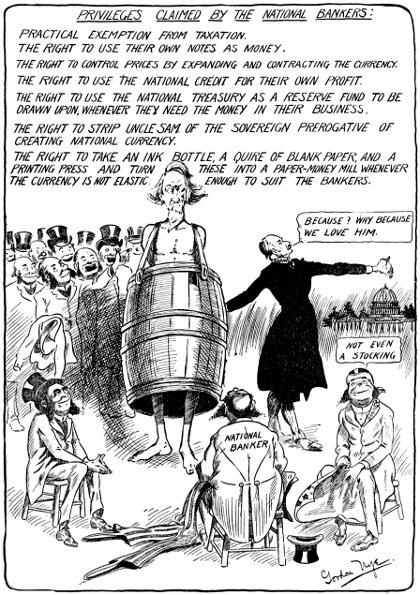
“THE CONUNDRUM IS: WHAT WOULD BE LEFT TO UNCLE SAM, IN THE MATTER OF NATIONAL FINANCE, AFTER THE BANKERS SHALL HAVE GOT ALL THAT THEY WANT?”
[120]
Suppose that they fall due and are presented for payment. Suppose the Doctor has half the money in gold coin and the balance in silver coin. Suppose he offers the entire $100 in coin, in satisfaction of the debt.
Suppose the holder of the notes rejects the silver “coin,” and demands the entire debt in gold coin.
What would the Doctor do?
Would he hurry and scurry about, hunting for gold to satisfy the exacting creditor? I’ll bet a medium sized mouse-colored mule that he wouldn’t.
The Doctor knows that silver coin is legal tender, and was contemplated as one of the coins of payment at the time the contract was made.
Consequently, he would tender the silver, and if the offer to pay in that “coin” were refused, the Doctor would simply let the creditor do what the heathen does when Christian Civilization gets after him—RAGE.
(4) Let the Doctor peruse the Life of Chase, who was Secretary of the Treasury under Mr. Lincoln, and he will realize how much he is in error.
Many other authorities might be cited.
Gold and silver had disappeared. Specie payments had ceased. The Government was about “broke.”
The daily expense account was approaching the two million dollar mark.
Spaulding, Salmon P. Chase, Thaddeus Stevens and others realized that unless the Government could float a paper currency the jig was up.
It was just about then that Lincoln expressed the opinion that some of the Wall Street bankers ought to be shot. They were manifesting every disposition to take advantage of the distress of the Government. They were showing that they meant to get rich off the war. And they accomplished their purpose.
They failed to obstruct the plan to issue paper money, but they succeeded in having Congress virtually say that while the Greenback was good enough for the soldier who was shedding his blood for his country, it was not good enough for the Bondholder who was sitting at ease in the financial Zion of Wall Street.
(5) My understanding is that the first paper money issued by the Confederate Government circulated at par when first issued.
The legal tender currency of any Government must depend, in any case, upon the strength, resources and credit of the Government.
Even the coin-currency sinks to the mere commodity-value of the coin, when the Government sinks.
Even now there is an artificial value in gold coin, put there by law.
No pile of a million dollars in gold coin would sell for a million dollars as metal.
In such a heap of gold you must allow for “wear and tear.”
The law does allow for that very thing. If the gold coin is worn away to a greater extent than ten per cent, the Government will not receive it as legal tender—nor will the metropolitan banks receive it.
But anything less than ten per cent loss in weight, the law makes good, by declaring that such coins are legal tender.
Few people stop to think of that.
Therefore, every kind of money is fiat money; that is, THE LAW MAKES IT.
Now, it must be self-evident that the value which law puts into currency SINKS, WHEN THE LAW-MAKING POWER SINKS.
If one can conceive of such a thing as the annihilation of the United States we must know that our gold coins would at once go into the scales to be weighed and priced as metal; our silver dollars would do precisely the same thing, and each of them would be worth less than 70 cents.
As for our paper money, it would be waste paper, and nothing else.
United States greenbacks would[121] amuse the collectors of fifty years hence, just as Confederate bills do those of the present day.
Enterprise, Ala.
Hon. Thomas Watson, Thomson, Ga.:
Dear Sir:—1. What are the fundamental principles of the four parties, Populist, Socialist, Democratic and Republican?
2. Do you favor the way the United States allows the banks to use national currency without interest and then charge the people 12 per cent? If not, why not?
3. Do you think there is any likelihood of the Rural Free Delivery ever being discontinued and if so on what grounds?
4. What does the Parcels Post Bill advocate?
***
(1) The Populists believe in the Public Ownership of Public Utilities—such as Railroads, Telegraph and Telephone Lines, and Express Companies.
They look upon the iron highway as a Public Road that should belong to the Public. They believe that the tremendous power which private ownership gives to the private corporations now owning the railroads is too great, too ruinous when improperly used, to be exercised by those whose sole aim is to extract the utmost possible dollar of profit out of the franchise.
The Populists believe, also, that there should be a return to the money-system of the Constitution.
The National Banks have USURPED the function of supplying the country with a proper currency.
At the present time, when the Government has but $353,000,000 of its own paper notes circulating as money, the National Banks have the enormous sum of $583,000,000 of their paper notes in circulation as money.
Populists contend that it is the prerogative and THE DUTY of the government to create ALL THE MONEY THAT CIRCULATES, and to hold unto itself the power of regulating the supply.
Populists believe in the Tax upon Incomes, and contend that this tax should progressively increase as the Income increases. They believe also in a tax upon Inheritance.
Populists lay particular stress upon the great principle of Direct Legislation. They believe in allowing the people to compel the law-making power to act when they, the people, want certain laws. They contend that it is no more than right to compel the law-makers to refer proposed legislation to those who are affected by it. This principle has worked happily wherever given a fair trial, and is usually called the Initiative and Referendum.
Populists contend, also, that all officers should be elected by direct vote of the people, and that the people should have the right at any time to retire an officer who has forfeited their confidence.
This principle is usually referred to as the Right of Recall.
In practice it proves a most excellent method of MAKING THE OFFICE-HOLDER “WALK THE CHALK.”
Populists also believe that we should have a system of Postal Savings Banks. These would furnish to the people convenient and safe places of deposit for their savings; and the system would go far to lessen the dangerous power of the metropolitan banks.
Populists are opposed to land monopoly, favor the eight-hour day in factories and similar industries, and believe that the employment of children of tender age in manufacturing establishments, mines, sweatshops, etc., should be watched with hawk-like[122] vigilance and regulated with a parental care which puts the WELL-BEING OF THE CHILD above every other consideration in the case.
Populists believe in UNTAXED NECESSARIES OF LIFE, and contend that whatever tariff duties are imposed should be laid upon luxuries.
In brief, Populists strive for the adoption of those principles which would make this a real Republic, instead of an Aristocracy ruled by a Class, or a Plutocracy in which Dollars dominate.
And during the whole time that the Politicians and Sages and Powers have been laughing at us, we have been quietly furnishing with our garments the wardrobes of such eminent Politicians, Sages and Powers as Roosevelt, Bryan and Hearst.
Bryan accuses Roosevelt of stealing the very clothes that Bryan himself stole from us.
As for Hearst—before he fell down on that Murphy deal—his editorials and speeches were nothing in the world but the echo of James B. Weaver, Jerry Simpson and Mary Ellen Lease!
Had he kept up the lick, and not gone into that deal with Murphy, he would have been elected Governor of New York. He parted with his most valuable asset when he ceased to be an Independent.
The Socialists think they believe in the collective ownership of those things necessary to the production and distribution of wealth, but what they are actually driving at IS THE CONFISCATION OF PRIVATE PROPERTY and a jolly good division of the same, in order that the Have Nots will be upon an equal footing with the Haves.
That’s the inner meaning of practical Socialism, and that’s why it assumes so savage a character in our great cities.
In the hearts of the rank and file Socialists, are burning the same fierce fires as animated the Goths and the Huns when they bore down upon opulent Rome.
I have heard these people talk and I know what it is they really mean.
The Democratic Party, at present, hasn’t got any principles capable of proof.
They are waiting for the next National Convention to hand out a new suit of clothes.
They are awful sick and tired of that Parker platform, which is almost the same as the Republican platform—as poor old Gassaway Davis said.
But they cannot “point with pride” to any other platform until the National Convention meets. Just what will then be done, it would take an able-bodied prophet to tell. My own opinion is that they will adopt the leading principles of Populism and put Bryan to running for the Presidency again.
The Republican Party is doing just what Alexander Hamilton thought ought to be done—running the Government in partnership with the rich, for the benefit of the rich.
The Republican rule is a Plutocracy, tempered by an occasional spasm of Rooseveltism.
(2) No. Because I do not believe in Special Privilege, nor in the confiscation of $134,000,000 of money that belongs to the taxpayers. To take away the people’s money on the pretext that the Government needs it to pay expenses, and then to deliver it over to a few Pet Banks to be used without interest, is Confiscation. And it’s a burning NATIONAL INJUSTICE AND SHAME!
(3) No. Because Congress dare not do it. The people would not stand it.
(4) The transportation by the Government, through the mails, of small packages—say one, two, three, four, five, ten, fifteen pounds—at a moderate cost, thus protecting the people from the robber Express Companies.
[123]
Ann Boyd. By Will N. Harben. Harper & Bros., New York City, Publishers. Price $1.50.
Among the lads whose parents belonged to that great, wholesome class which Lincoln used to call “the plain people,” you would have found the creator of Abner Daniel, Pole Baker, and Ann Boyd had you gone to the little North Georgia town of Dalton, soon after the Civil War.
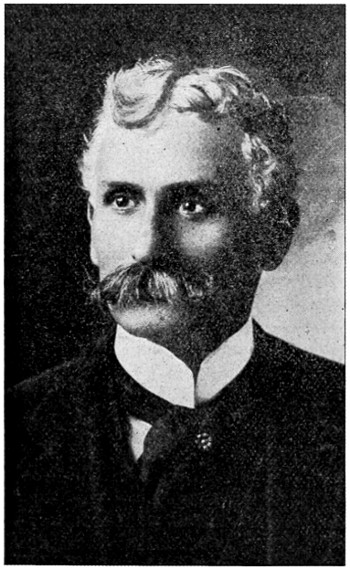
WILL N. HARBEN.
Two years old at the time that the deliberate treachery of William H. Seward provoked the rash Confederates into firing upon Fort Sumter,—the costly folly against which Bob Toombs protested in vain,—Mr. Harben heard and saw much of the actual marching and countermarching of the ensuing four years of the most utterly insane war recorded in History.
Having been given a private education, the young man embarked in business enterprises, and it was not until after 1886 that a mediocre business man was offered up, a willing sacrifice, to a first-class literary artist. Harben, the business man, means nothing to anybody, but Harben, the literary genius, means a vast deal to everybody—for he is, today, the most distinctly original and creative literary genius in America.
David Harum took the world by storm because of its unique portrayal of a typical American business-man—shrewd, strong, persistent, humorous, rough in most places and soft in spots. Banker and horse-trader, David Harum knew human nature like a book, and was chock full of that rare article called common sense.
Abner Daniel was in all respects the equal of David Harum, without being an imitation; Pole Baker was superior, in some respects, to Abner Daniel, and Ann Boyd enters a different class altogether.
The creations of Dickens and Thackeray offer nothing better, nothing more human, nothing more symmetrically natural and fascinating, [124]than this heroic woman—tender-hearted, pure, brave and true—whose husband forsakes her, whose child is taken away from her, whose enemies persecute her, whose friends drop away from her, but who, standing at bay and battling with the whole array, CONQUERS.
It is pathetic and it is grand.
How the proud woman covers her wounds and complains not; how the strong soul finds itself sustained from within; how she brings a stupidly narrow, prejudiced and malicious neighborhood to confusion and utter defeat, is a story that makes one thrill with sympathy and admiration.
This number of the Jeffersonian Magazine begins the serial publication of Mr. Harben’s greatest book.
Read it carefully.
Few better books have been written.
Buff. A tale for the thoughtful. By A Physiopath. Boston. Little, Brown & Co., Publishers. Price $1.00.
Gabrielle, Transgressor. A novel. By Harris Dickson. J. B. Lippincott Company, Publishers, Philadelphia. Price $1.50.
Starting in Life. What each calling offers ambitious boys and young men. By Nath’l. C. Fowler, Jr. With 33 illustrations by Charles Copeland. Little, Brown & Co., Publishers. Price $1.50 net.
The Dragon Painter. A novel. By Mary McNeil Fenollosa. Illustrated by Gertrude McDaniel. Boston. Little, Brown & Co., Publishers. Price $1.50.
My People of the Plains. By Ethelbert Talbot. Illustrated. Harper & Bros., Publishers, New York. Price $1.75 net.
Some Successful Marriages. By Abbey Meguire Roach. Illustrated. Harper & Bros., Publishers, New York. Price $1.25.
Rich Men’s Children. By Geraldine Bonner. Illustrated in color by C. M. Relyea. Bobbs-Merrill Co., Publishers, Indianapolis, Ind. Price $1.50.
The Spirit of Democracy. By Chas. Fletcher Doles, New York. Thos. Y. Crowell & Co., Publishers. Price $1.50.
I Am Sermons. By Thos. Shelton. Published by Christian, Denver, Col. Price 50 cents.
The Teeth and Their Care. By Thaddeus P. Hyatt, D. D. S., Brooklyn, N. Y. King Press. Price 50 cents.
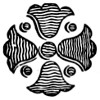
[125]
Sometimes “patience ceases to be a virtue” and this is one of the times.
The Record has kept quiet on the subject of the disgraceful, indifferent, unwarranted and careless manner in which the Southern Railway has treated its patrons from Toccoa to Elberton, through fear of being classed as a chronic kicker.
But the thing has become so awful until this paper can keep still no longer.
Our business men here in Royston—and we suppose it’s the same way in Lavonia, Bowersville, Canon and Bowman—are losing money every day in the week through this giant corporation’s ill-treatment. Our cotton buyers have hundreds of bales of cotton stored here in every conceivable place because they can’t get cars to ship it away.
Our merchants have goods on the road which were shipped to them days, weeks and almost months ago, and are losing sales daily because they can’t get the goods delivered on time.
Sometimes there is no freight train to arrive here for two days at a time. Whose fault this is The Record doesn’t know, but it must be the “Big Guns” who own the road.
Not a freight train has arrived here on time in two months. Thousands of dollars have been lost to the merchants and farmers of this section through the criminal neglect of those who are at the head of this greedy octopus, better known as the Southern Railway, which has Georgia in its power as strongly as ever a boa constrictor of South Africa encircled its victim.
How long? Oh Lord! How long, will this thing last?
Hasn’t Georgia’s Railroad Commission some power to do something for the people of Georgia in this matter? If they haven’t they might as well close up shop and go home and try and find some calling more suitable to their respective talents, provided the members of that representative (?) body have any.
The depot agent at this place is as painstaking and gentlemanly as any railroad official in Georgia, but is helpless. He is worked to death for want of sufficient help. He is doing the work of two men.
From the section boss to the highest official on the line in question—the Elberton Air Line—that’s the road we’re talking about—the pay is less by one third than it should be and not half enough help is employed in any of the departments.
If the crew on the freight train that runs on this road were animals, we could indict the authorities for cruelty to animals, but as they are only human beings there is no law to cover the case. More’s the pity. There’s something wrong with the law when it allows a greedy corporation to work its men to death.
Why not put on two freight trains per day, having them to leave Elberton and Toccoa early in the morning and returning in the afternoon? The Record believes this would solve the problem and stop the congestion of freight on this line, at least.
The people of this section are broad minded and generous, and only want what is due them from any standpoint, but propose to get what is coming to them if it is gettable. [126]
As we said in the beginning, we tried to keep still about this matter, but our hammer has begun to knock and we propose to keep it up until something is done.
The Record will begin, next week, to circulate a petition among our business men regarding this matter and proposes to send said petition to Vice-President Andrews, of the Southern, in Charlotte, N. C., to Mr. McMannus, in Greenville, S. C., and to the great and only Georgia Railroad Commission, in the city of Atlanta.
Will our sister cities along the Southern, from Toccoa to Elberton, do the same thing?
The Record will wait and see.—Royston (Ga.) Record.
The girls of these United States have always borne the name of being the most vivacious, intelligent and common sense mortals of any other nation, but as is the case in all other things, there are exceptions to the rule, and when they do depart from the record they can make the very worse breaks of any. Just think of as intelligent, cultivated girls as Anna Gould and Consuelo Vanderbilt allowing such broken down old foreign sports, gamblers and roues as Count Boni de Castellane and the Duke of Marlborough, persuading them that they were loved, not for their riches but themselves, and marrying such cattle when they could have secured good, honest, sober, loving husbands at home. One is now suing for divorce in Paris after her Frenchman has spent eight millions of her money, and the other is applying for a separation in London. If it was foreign titles these girls were seeking, they have paid dear for their little toy and really deserve no sympathy, but if they sought the men merely for their supposed merits, the two women ought to have guardians appointed over them for the remainder of their lives, for they have no idea of how to take care of themselves.—Gainesville (Fla.) Elevator.
Pope says that an honest man is the noblest work of God and Paul says to provide things honest in the sight of all men.
Webster says that honor is esteem due or paid to worth. Bacon says that some in their actions do woo, and affect honor and reputation.
In common parlance we call a man honest, if he pays his just and true debts. Is that true? If a person pays debts with money secured by extorting the widows and orphans, by pressing the poor, by selling hell and damnation to youths, is he to be called honest? Certainly not. He is neither honest nor honorable.
There is another class of folk, who think themselves honest and would resent with their strong arms even an insinuation of dishonesty on their part, that fall as far short of being honest and honorable men as thieves do of being angels. They are an ingenious sort of people, whose heads are full of tricks and schemes, and their greatest joy consists of working them upon the public. They had rather make money dishonestly than honestly. To enlist them in any cause only the whisper of the word scheme is necessary. Yet, they pay their debts and they seem to think that this alone will carry them to “heaven on flowery beds of ease.”
The honest and honorable men in a community are those, with characters so well known, as to never be approached secretly or otherwise, in behalf of screening any evil, upholding any wrong, fostering any unholy scheme. They stand boldly for right living and everybody knows it.
The clever, popular men of a community are not always the honorable [127] and the honest. Their popularity often results from their closed lips and silent hands. They are polite, generous and liberal, but are approachable and ready participants in any sort of secret deal for a little cash. Money in their eyes looks brighter than honesty and they are neither honest nor honorable, although very clever fellows.
But there is in every community persons, possessed of righteous consciences, with so high ideals of the right and so much hatred for the wrong, as to be unable to restrain themselves in taking brave, bold stands in every civic and religious reform.
Boys, the object of this article is to elevate manhood in Gwinnett county and the latter are the characters for your patterns. Be men.
Say, what is honor? ’Tis the finest sense
Of justice which the human mind can frame,
Intent each lurking frailty to disclaim,
And guard the way of life from all offense,
Suffered or done.—Wordsworth. —Gwinnett, (Ga.) Journal.
Divine right is still to be discovered in high finance, although not so usual as a few years ago it was. A group of minority stockholders, clamoring for an accounting from Mr. HARRIMAN, were consoled by his lawyer with the assurance that “Mr. Harriman moves in a higher world, where stockholders may not hope to enter.” The president of the Union Pacific Railroad may continue to keep stockholders beyond the battlements of his personal paradise; but the Interstate Commerce Commission, by virtue of the Railroad Rate bill, have the right to make inquisitorial entry. The rate bill became a law on August 28. The raising of the Union Pacific dividend from six to ten per cent. was effected by Mr. Harriman on August 16. If the Interstate Commerce Commission have been under embarrassment about picking a railroad which shall be compelled to lower its freight rates, the juxtaposition of dates should make them easy. A road which at once pays exorbitant dividends and charges exorbitant rates seems to need their services. It is not for the purpose of paying higher wages to his conductors and engineers that Mr. Harriman charges high rates. His operating expenses are but 52.51 per cent. of his gross receipts; whereas the average of all our railroads is 67.79 per cent. When a shipper pays Mr. Harriman one dollar, fifty-three cents goes to pay the trainmen and for the other purposes embraced under operating expenses; about two cents goes for taxes, and forty-five cents goes to paying the interest on bonds and to meeting the necessities of Mr. Harriman’s ten per cent. requirements.—Collier’s Weekly.
Our system of criminal jurisprudence is better than most, and as good as any with the possible exception of the English. But no one denies that it has monstrous faults. In New York recently one man shot another over a woman. Both men were rich and the woman beautiful—a combination that will instantly wreck the essential purpose of criminal law anywhere in the United States. Already the newspapers abundantly foreshadow what will happen. The material facts in the case—so far as concerns the purpose of the law to protect human life—were brought out by the coroner in about half an hour. Hereafter we shall hear very little of them.
Press reports assure us that a fine array of legal talent on either side [128] is preparing to play a splendid game of chess. If it can be shown that one of the men led a life more vicious than the other that will score ten for the side that shows it. The sorry muck-heap of the woman’s career will be raked fore and aft until it has yielded every point that will count on one side or the other. The lawyers will construct a great melodrama, with the villain, heroine and hero, to be presented to the jury. The verdict—the very life of the accused—will depend upon the skill with which the game is played and the success with which the melodrama is “put on.”
“Thou shalt not kill,” says the commandment. One can imagine a completely civilized state, in noble dignity, requiring the one man to answer whether he did kill and murder the other, contrary to its statute. It is merely an imagining, however. Our famous murder trials, with their tawdry tricks in the face of death and their rotten plays to sentiment, are pretty exclusively barbarous.—Saturday Evening Post.
Senator Bailey talks, as there is no law against his utterances. “The free negro,” he declares, in his amiable attempt to induce in his hearers a calm and rational mode of thought, “is a more serious menace to the South than the negro in slavery.” In Alabama, a couple of weeks ago, at a Republican convention, there was not a negro present—one of the details indicating a general drift of the Republicans toward leaving the negroes out of their politics. Meantime, the negroes themselves are divided sharply in their meeting of the situation. The so-called “Niagara Movement” puts out an address to the country which observes: “We claim for ourselves every single right that belongs to a free-born American, political, civil, and social.” The whole address is a mass of almost bombastic rhetoric on this theme. Meantime, another leader speaks: “Let constructive progress be the dominant note among us in every section of America. An inch of progress is worth more than a yard of fault-finding. The races that have grown strong and useful have not done so by depending upon finding fault with others, but by presenting to the world evidences of progress in agriculture, industrial and business life, as well as through religious, educational, and civic growth.” Without failing to make it clear that he wishes the equal protection of the law, Mr. Washington refuses to complain, to whine about social rights and aspirations, and prefers to tell his fellows the most useful things to do. He leaves white faults to white men and warns negroes against negro weaknesses. Which leader will the negroes follow, and which speaks with wisdom and with strength?—Collier’s Weekly.
What has become of all our laborers is a question which no one seems able to answer just at present, but that they are not to be had is too well known. In the cotton belt of Texas, churches and Sunday schools are organizing parties and going into the fields to save the crop; in other of the cotton growing states the women are helping the men gather the staple; immigrants are offered work almost before they have put a foot on American soil; out West two great rival railroads are scouring the woods for men; factories where child labor has been legislated out are running short-handed, and it would appear that if our prosperity did not abate a bit from other causes it would do so from lack of labor with which to carry it on. Meanwhile communities are learning the gentle art of smiling, trade is booming and not even an approaching election can offer an opening to the pessimist.—Pensacola News.
[129]
Our Statesmen tell us in one breath that the salvation of the South is in the planting of less cotton and getting more for it and, in the very next breath, they say that immigration will save us. They invite the yankee to come, and the German, and the Irish, and the Scandinavian and even the Italian.
If it be true that we are planting enough cotton, even too much, and it is true, wherein will the South be benefited by having thousands of the foreigners settle here to raise more cotton? There is but one answer. We don’t need any more cotton planters.
But it is contended that foreign immigration will settle the race question. Maybe it will. Maybe it won’t. The cotton patch negro hasn’t given us any trouble, nor will he, and he isn’t going to leave either. He is satisfied, his landlord is satisfied, and a German or a Scandinavian upon the scene will mean two cotton patches instead of one, one for him and one for the negro.
True, there are many of our ambitious farmers who can’t secure enough laborers to make enough cotton to get rich as fast as they would, but they’ll get rich quick enough in using our present available labor, thereby raising less cotton, getting more for it, and, at the same time, either resting their lands or sowing it in small grain. And when these wealthy farmers plant less cotton, they benefit every poor fellow, standing between the plow handles, in the entire South.
And this one or two horse farmer is the ideal citizen, anyway. The best communities are those made up of small farmers. The churches, schools and social conditions in a community, in which one man owns all the land and runs forty plows, are not as good as one with forty land owners. Oglethorpe county would, no doubt, be a better county today, if Jim Smith had never been born, and this is not said with the spirit of criticising a single act of his life, either.
It’s all right for immigrants to build our cities, our railroads, our manufacturing enterprises or to labor in the cities, on the railroads, in the factories or even take servants’ places, but the South doesn’t need any more cotton raisers.—Gwinnett (Ga.) Journal.
The railroad magnates have divided up the lines in this country among nine families of plutocrats, who by controlling transportation of passengers and freight, can control the Government. They are divided as follows:
| Harriman | 22,276 |
| Vanderbilt | 20,493 |
| Pennsylvania | 20,138 |
| Hill | 19,407 |
| Morgan | 18,789 |
| Gould | 13,789 |
| Moore | 13,028 |
| Rockefeller | 10,293 |
| Santa Fe | 7,809 |
| Total | 146,112 |
That is three-fourths of the mileage of the country and the control of the main lines in every state and territory. It puts into the hands of these men a greater power than was ever exercised by any group of kings, lords and dukes who ever formed a community of interests. In all past history, to overthrow such a power as that, a resort to long and bloody wars was the only recourse. It remains to be seen whether the great peace movements of the last few years, for which Andrew Carnegie has built a temple at The Hague, will produce a sentiment strong enough to settle this question peaceably. Would Andrew Carnegie encourage anarchistic disorders if he thought there was a danger [130]of a reduction of the tariff on steel? Railroad combination and robber tariffs are only another manifestation of what we once called the “money power.”—Omaha (Neb.,) Investigator.
Whatever may be the future of the People’s party, whether it is doomed to pass away and give place to some other party that will present its principles, or whether it may yet rise as it deserves to do and get control of the Government, remains yet to be seen.
One thing is certain. It has already accomplished more in this Government in the last fifteen years in the way of creating public sentiment and political conviction than both of the old parties.
Fifteen years ago the two old parties were discussing nothing but Tariff. The Money question, the Railroad question and the Trust question were entirely ignored by them. Not because the leaders of the two old parties did not know the magnitude and importance of these questions; but they got their campaign boodle from these rich corporations and they were willing to accept the money and let the common people perish.
When the Populists came on the scene they began to “cry aloud and spare not.”
They showed that the same laws of supply and demand that regulated the prices of other commodities, also regulated the price of money, that when money was plentiful, prices were high, all kinds of business prosperous and labor fully employed and well paid. While on the other hand when money was scarce it was high; all industries paralized, men out of work and their families suffering for bread.
They showed that the great railroad corporations had secured the public franchises and were taxing the people without their consent and without mercy.
They showed that their great corporations, growing enormously rich were combining together and forming “Trusts” and that they will eventually control all prices, and as completely own and control the country as did the Barons under the Feudal system.
Their cry and their plea was invincible.
Their arguments could not be answered.
Ridicule and abuse might serve to keep them down for awhile, but the just indictment against the two old parties was destined some day to be sustained.
Today the Populist looks on with pleasure and sees his principles growing in public favor every day.
The Republican president and the Democratic leader are endorsing the very doctrines that were fifteen years ago considered the most radical.
All honor to the Populists.—Nevada County (Ark.) Picayune.
Can there be such a thing as a radical conservative? John Temple Graves thinks Col. Pleasant Stovall, of the Savannah Press, fits that kind of a job. We believe that a trimmer—if that is what Col. Graves means to call Col. Stovall—is the most decent citizen that afflicts human society. He stops rushing things when a sense of the proprieties tells him that a thing has been rushed far enough to make it coarse or common (use which word you prefer), and the result is that his hair does not grow too long, nor his ears too puritanically short.
Yes, sir, the medium grade takes the cake. Except in an occasional storm, the radicals may overrun all opposition; but it don’t last, and the fellow that wins on an extravagant moral issue may be found in the ditch [131]dead drunk as soon as public sentiment gets normal and resorts for a season to common sense arrangements of its ethics and politics.
Yes, the men who make an over-display of honesty for the season always get left as soon as the folks get back to their normal qualities. Common sense controls when the excitement has passed.—Cordele Rambler.
Hearst got beat for Governor of New York while the balance of the State ticket he was on got elected. A few of the successful candidates are Independence League men, but most of them are straight Democrats. Thus Hearst’s reform work was turned to the benefit of corrupt and foul Tammany. We hope this lesson in fusion will be enough for the League. Hearst was defeated by about 60,000, while the other State candidates on the League-Democratic fusion ticket were elected by small pluralities. Tammany scratched Hearst. The Wall Street element of the Democratic party either scratched him or voted the Republican ticket. We are inclined to think well of Hearst because of those who scratched him. Hearst says the fight for the rights of the people is still on. With his great daily papers he can do a vast work toward overthrowing the rule of the money power, if he gets into the middle of the road and stays there. But if he endeavors to work within the old party he will do more to prevent the success of the people than forty Clevelands could do. Maybe the thing wasn’t hardly ripe and he had to back out, which he did by fusing with the Democrats after the League had nominated a straight ticket. We are guessing that Hearst will be in the middle of the road supporting Tom Watson for President in 1908.—Missouri World.
Whatever may be said of W. R. Hearst’s individual sincerity and integrity of purpose, the vote which almost landed him in the governor’s chair of New York State—a position which is next to the presidency—is the vote which is dissatisfied with corporation conditions. It is a significant vote. And the strong anti-Hearst sentiment among the “upper ten” all over the South is also significant. Everywhere men are, consciously or unconsciously, taking their positions along lines of economics.—Farmers’ Journal, Abilene, Texas.
Tom Watson is back in Georgia, where he belongs. He is too warm, too impulsive, too frank and too honest for New York—cold, calculating, deceitful, hateful New York.—Farmers’ Journal, Abilene, Tex.

[132]
Lucian L. Knight, Los Angeles, Cal.
I cannot silence without gratifying the impulse which prompts me to write you at once after reading what you have to say about that superlative scoundrel, Mann. As a friend who holds you in loyal and affectionate admiration, I resent with all my heart the treatment which you have received at the hands of one who is man in name only and who in nature is half jackal and half hyena. I am aware how true it is that the most insignificant of insects may vex even the noble lion. Mann may be a millionaire, but I warrant his shillings are dirty. How miserably poor the wretch is when the only assets he has in the world are the millions which lie in the bank!
I know how little things have annoyed me at times and I know how much I have appreciated an impulsive word of sympathy, even from “the least of these.”
I am sorry I could not get the extracts you were to send me in time for Vol. I of the Reminiscences which will be ready for publication within the next few weeks; but I hope to get them in time for Vol. II. The work will require two volumes. I have met with so much encouragement that I am warranted in beginning at once upon Vol. II. Disappointed in other cherished plans and prospects, I am now putting my life’s ambition into this work which I trust to be able to make of literary and historic value to Georgia.
W. H. Eddy, Los Angeles, Cal.
Can you explain what quality there is in human nature, that prompts some specimens of the race to the doing of things which are admirably adapted to the hindrance of all that they profess to be in earnest support of? Now, for instance: in The Appeal to Reason of October 27th, is an unsigned article headed, “Populism and the Pap.” Being unsigned would indicate that it came from the pen of J. A. Wayland, or that of F. D. Warren, the present Managing Editor. Now, both of these men have been earnest workers for several years, or at least for what they conceive to be the cause of socialism. It would seem as though, when two men are associated in a work which each of them has advocated and written signed articles in favor of, lauding it as a movement opposed to dishonesty, deceit and all the baser tendencies of the depraved mind, that when he takes a notion to stultify himself, descend to the lowest practices of the gutter blackguard, he would have consideration enough for his associate to sign his name, so that decent people who may be so unfortunate as to peruse it, and such of the patrons of the paper as have both decency and brains enough to resent it, might not blame the innocent party inadvertently.
If socialism is anything, or is to be anything in human history which is to make for the betterment of humanity, then it must rest upon the fundamental principles of honesty, [133]justice and truth. All those who would not be cursed by its adoption to-morrow, by reason of their lack of development and their consequent lack of capacity to appreciate its meaning and the obligations inherent in it, assert that brotherly love, the golden rule, and the Sermon on the Mount, are also corner-stones in the foundation of its most noble structure.
But let us leave the latter out of consideration for the present. It is not conceivable that there can be dug up in the office of the Appeal one individual so low in the scale of human development as not to concede honor, truth and justice as being the beginning, the very A B C of socialism. What must we think, then, of the estimate that the one who penned the abominable article referred to, places upon the intelligence of his readers, to say nothing of the hundreds who have drawn from the little stock of their earnings which are really needed for the comfort of themselves and family, to assist this poor degenerate in distributing his venom and flaunting his idiocy in the faces of a nation of intelligent people, to the disheartenment of thousands of advocates of socialism, and the great glee of those who aver that the animus of socialism and of all socialists is such as “Breathes the hot breath of brutal hate, and riots as it runs” through the two columns of the “Appeal?” To those who have not been unfortunate enough to read it, suffice it to say that it is a wholly uncalled for, unsocialistic, and, from every point of view, rascally, assault upon Hon. Thomas E. Watson, and to make it, if possible, more pusillanimous, it is given publicity just at a time when, on account of Mr. Watson’s having been grievously misused by his former business associates in the Watson’s Magazine enterprise, Mr. Watson is deserving of the sympathy of every person who possesses a spark of decency. It is cowardly in the extreme to strike a person when he is down or crippled.
Mr. Watson’s life history is now an open book to anyone, not an absolute ignoramus, in this broad country. He has his prejudices. He has his own political ideas, which, at the test of the ballot box, have been shown to be largely in the minority, but, to his honor be it said, the fact that they were not the winning card, has never caused him for one moment to falter in devoting time, money and energy in their advocacy, a fact which of itself would give the lie to the baseless, senseless and hypocritical charge of treachery and double dealing, which, by their own statements, finds 250,000 duplications in this issue of the Appeal.
It is doing too much honor to quote from it, but the readers of progress will excuse the presentation of some short samples. “Tom appears to have a grudge against whatever tends toward progress.” Think of that in reference to the father of the rural free delivery postal system which carries tens of thousands of copies of this very diatribe of lies to the farmers of the country, in whose interest Watson succeeded in having this system established, as the Congressional Record will bear witness. Again, “But he has been repudiated by the respectable democratic press of his state—as witness the merciless exposure of his methods by the Atlanta Constitution and the Macon Telegraph!” Respectable! The Atlanta Constitution and the Macon Telegraph! Socialists of intelligence, what have you to say of the creature so lost to decency as to, in the columns of the leading socialist weekly paper of America, if not of the world, so far as circulation goes, laud the Atlanta Constitution and the Macon Telegraph, notoriously the most mercenary and most thoroughly corporation-serving papers of the entire South, and for no other reason—for he can plead no other—than because [134]they are fighting Tom Watson, who happens to be under the ban of his displeasure?
And why are the ultra corporation journals fighting Tom Watson? Because honest Tom Watson is sacrificing his private interests in a determined effort to defeat the machinations of the Walter Parkers, the Herrins and the Abe Ruefs of his beloved state.
Again: “That Watson received the price for his perfidy is not for a moment to be doubted.” Whoever penned those lines either knew that he was penning a most villainous lie or he is too ignorant to be worthy of the contempt of a chimpanzee. There isn’t a person with intelligence enough to write connectedly on truth, or any part of the scurrilous rot this creature did, but knows perfectly well that if Tom Watson had been corruptible, he could have received ten times more to have sold himself to the very forces this creature is supposed to be fighting, than it has ever been claimed he did get. That is just as true of Tom Watson as it is of ’Gene V. Debs. Everyone, including the writer of that malicious screed, knows that they both could be rolling luxuriously in wealth if they had but followed the course of these very papers which he is pleased to declare “respectable.”
But the last quotation is manly as compared with this one: “It is said that he has been up for sale before, and was knocked down to the highest bidder,” etc., “It is said!” The language of the conscienceless gossip, the method of the footpad, with the sand-bag, or the gas-pipe who strikes you out of the dark. Again: “John M. Barnes, a man for whose veracity many stand ready to vouch, etc.” Very good, Mr. No-name. Mr. Barnes is good enough authority to use in an effort to injure your brother man, Mr. Thos. Watson. Would you accept Mr. John M. Barnes’ statement as to the offices you, your associates and the Appeal to Reason are performing in America, and would you abide by and endorse them in your own case? Never! And that very fact impeaches your honesty in quoting, as against Tom Watson, the slanders of corporation hirelings and political hacks, whom you know are fighting him for what there is in it. No! no! When you go straining a point, you always prove too much.
Be something like a man, and bid him God speed in his task of awakening the people to their dangers, even if he does leave them short of being full-fledged socialists.
Tom Watson’s opinions are not in all respects mine. In fact, there are many points on which we do not agree. But if I have outgrown the tenets of Populism, and he has not, or if he sees so many falling away from the mere party organization of populism as to be heart-sore and discouraged, and chooses to advocate the same principles under the name of Jeffersonian Democracy, he is still entitled to the respect of friend and foe alike, until he sacrifices principle to greed or puerile hatred.
L. A. Benson, Clay Center, Kan.
I write to inquire as to the truth or falsity of the rumor that you have severed your connection with the Magazine which bears your name. I have been a voting Prohibitionist since 1885. I bought the first issue of “Tom Watson’s” and read it, and have hungered for its appearance ever since. I have read every line of Editorial and other matter which came from your pen. I was beginning to think myself so much of a Populist that I could “keep step.” From 1894 until 1901 I lived in Philadelphia, Pa., and judging the Populists from the caricatures appearing in Eastern papers I felt surprised [135]to find that I have all along possessed just such views as constitute the essence of Populism. I find myself unwilling to give up the opportunity to follow your pen. I will regard it as a matter of genuine kindness to me if you will put me in connection with the Magazine which takes your copy and spreads it among your many disciples and admirers. I regard the work which you are doing as fundamental, and I am aware that you, like all leaders in reforms which touch the money-king, will suffer. If it be in the power of “Old Plute” to crucify you, he will not be too tender. He will not be lacking in heartless cruelty. But while you are bidding high for the hate and vengeance of “Old Plute” you are winning the glorious title of “friend” and “brother” to those who are crushed ’neath the heel of this heartless, greedy foe. To oppose him and to stand the loving helper of men, is to trace the footsteps of the Man of Galilee, up a modern Calvary. In plain language, it is the essence of pure and undefiled religion. Here’s my hand, brother, and may God bless and prosper you.
N. B. McDowell, Ronceverte, W. Va.
In reply to your question in Watson’s Magazine of August: “Is it true that railroad corporations insure the lives of the railroad mail clerks?” I cannot speak for the railroad corporations, but it was developed in court here that the St. Lawrence Broom & Manufacturing Co., the largest corporation in this section, has the lives of its employes insured for its benefit. This company employs a large number of men and boys and has never made any provisions for their protection against the inclemency of the weather, or the many dangers of machinery that might be averted.
I was an employe of this company for fifteen years and have seen a number of men and boys mangled and maimed for life, but it was not known until quite recently that the corporation received insurance for every employe that got crippled. A boy got his hand cut off and sued the company for damages and it was clearly proven that the employes were insured for the benefit of the company.
D. H. Chamberlain, Harriston, Miss.
A few days ago I saw in the Memphis Commercial-Appeal that you had severed your connection with Watson’s Magazine. I am a subscriber and have taken the Magazine solely on account of your Editorials, which I regard as the finest and most forceful I ever read in any Magazine. My subscription is about run out and if you are no longer connected with the publication I do not care to renew. This is my reason for making this inquiry, and I will be glad to hear the report is untrue. If it is correct let me know if it will be your purpose to edit a similar periodical. In that event you can count on me as a subscriber, even if the subscription price should be increased to $5.00 per annum.
I think you are doing a great and necessary work in your attempts to arouse the people to the dangers that now menace the liberties of this unhappy land, “to hastening ills a prey.”
There is one point on which I am constrained to criticise you and that is your ill-advised attacks on W. J. Bryan, which is something I am utterly unable to understand.
Why do you do this when you both stand for the same things? It seems to me unfortunate, to say the least, that soldiers of the hosts of Reform should turn their artillery upon each other when so much ammunition is needed to fight the cohorts of [136]Plutocracy, and in this connection nothing will ever be accomplished in the way of bringing this Government again into the possession of the people if any such suicidal policy is pursued. The reformers must get together if this Republic is to be preserved, if it is not even now too late to save it. Of this I am certain: we have no time left us for internal dissensions, and I hope that so splendid a soldier of the common good as yourself, will, in the future, refrain from stirring up discord in the ranks of Reform, and reserve your ammunition entirely for our enemies.
R. W. Barkley, New York City. November 12, 1906.
I note that you are proposed as President of the Cotton Association. I have read your Magazine from the first number until Mann got it, and I know your desire to benefit the South. I control the patent rights on a cotton gin which works on a new principle and which leaves the cotton in natural lengths, thereby enhancing the price to the planter by one to five cents per pound. The gin can be run by hand, or by power, and a few farmers can own one in common and thereby earn money by ginning their own cotton. The gin consists of “mechanism for gradually opening and loosening the cotton fibres while still attached to the seeds, with means for thereafter removing the seeds.” Just take a little cotton and gradually pull the fibres apart, without, however, separating them from the seed, until you have a large puff ball and then see how easily they come off at the seed. Well, that is what this machine does. No “gin cut” cotton in it. Seed practically unhurt, also. Am looking for money wherewith to build a large machine, (the inventor made the working model by hand himself); it does the work fairly well, but it is getting to be ram-shackle for demonstration purposes, and then for capital wherewith to work the gin commercially. Such a gin ought to interest you and also the Cotton Association.
Editor’s Note.—Having just been run through one new and improved gin—known as Town Topics—and having been badly “gin cut” myself, have but slight inclination for new inventions of the gin variety.
S. R. Sikes, Ocilla, Georgia.
I have your card of November 10th, advising me of your withdrawal from Watson’s Magazine, and of your intention of publishing in the near future Watson’s Jeffersonian. I desire to express my sympathy for you in your recent trouble with the New York publication, and to assure you of my friendship and best wishes for you in your new enterprise, “The Jeffersonian.”
I feel sure that you have been treated very unfairly by those New York people, and I feel a spirit of resentment for you, and I am to-day writing them to discontinue mailing Watson’s Magazine to me, and to erase my name from their list of subscribers. (Copy of letter enclosed.)
I would feel worse for you over this transaction than I do if it were not for the fact you have been unfairly treated and falsely accused so many times during the last ten or fifteen years, until I suppose you have to some extent become toughened so that you can stand such treatment better than the average man, and I see very plainly now, and have seen for quite a while past, that the current of public sentiment is rapidly drifting your way. I desire to offer you all the encouragement I possibly can in the noble work you are doing—educating the common people of the country on [137]the public issues that are now facing the American people, and in this connection I will state to you that I have been with you, so far as my ability extends, in this battle, and on some occasions have been severely criticised for taking your part and standing by the principles of original democracy in the days when the Democratic Party was seeking to destroy the principles upon which our government was founded. Of course I will subscribe for the Jeffersonian. I want the first copy that is printed and each succeeding issue. Mail me a few sample copies, and I think I can induce some others to subscribe.
(Copy.)
November 14, 1906.
Editor Watson’s Magazine, New York.
Dear Sir:—After reading and carefully considering the recent differences between you and the Honorable Thos. E. Watson, I wish to say to you that I think Mr. Watson has been treated very unfairly. I am a great admirer of Mr. Watson and his writings, and this led me to subscribe to the Magazine in its beginning. I have been highly pleased with it, and especially so with Mr. Watson’s editorials, but as he has been forced to sever his connection with the Magazine, and as his writings were the principle things which induced me to subscribe to the Magazine, I write to request that you erase my name from your list of subscribers. If I remember correctly, my subscription is paid up to March 1st, 1907, but under the circumstances I do not wish another copy mailed to my address.
Very respectfully,
S. R. Sikes.
V. L. Anthony, Jr., Hurtsboro, Ala.
I subscribed for Watson’s Magazine on account of your connection with it. Now, as you are no longer with it, I wish your new Magazine when you start it.
D. J. Henderson, Sr., Ocilla, Ga.
When the stockholders of the Watson’s Magazine attempted to restrict you as Editor and Manager, causing you to sever your connection with it, they struck, what I call, a death blow to the Magazine. All of its readers who believe in pure Jeffersonian Democracy felt the insult as keenly as you. I enclose you copy of a letter I sent last week to DeFrance, ordering mine discontinued. I am a subscriber to the Weekly Jeffersonian and will be to the Magazine you contemplate starting in Atlanta as soon as the first issue is out.
The editor of the Ocilla Star, whom I asked you some time back to exchange your Magazine with, has, since that time, “passed over the River to rest in the shade.” The paper will be continued by his two young sons, who, I know, if not doing so, will be pleased to exchange with The Jeffersonian.
May the blessings of Heaven be upon you and yours.
(Copy.)
Ocilla, Ga., Oct. 24, 1906.
Mr. C. Q. DeFrance, New York City.
Dear Sir:—Please strike my name from the list of subscribers to the Watson Magazine. I learn the stockholders endeavored to place restrictions on Mr. Watson as Editor and Manager, and he, for that reason, severed his connection with it. Thank God for that. I am glad to know he had so much manhood about him. Tom Watson is one among the greatest statesmen the United States has. It is a source of satisfaction to know that he will neither speak nor write with a corporation muzzle on. When [138]the stockholders attempted to restrict Mr. Watson in his Editorials for the Magazine, they didn’t only insult him, but they insulted every reader of it who believes in the pure Jeffersonian principles which Mr. Watson so ably advocates and defends. I would be proud of Tom Watson were he from any other section of the Union. He being a Southern man and a Georgian at that, I am exceedingly proud of him. I fear somebody has been taken upon the Mount and shown the glorious things the railroads will do if they will only fall down and worship them. If no Watson is with the Magazine then no Magazine for me.
Respectfully,
D. J. Henderson, Sr.
Chas. D. Hunt, Gueydan, La.
Reading with interest your valuable editorials in the October number and the most striking and interesting subject, “It Would be a Noble Charity”—here you have treated a subject in a light that any person could not help from shielding with an honest heart, with a strong desire in mind to spread the cause of charity, but you have almost been selfish with your subject. What of the territory bordering along the Gulf of Mexico? That is, the extreme portion.
Here we have settlers of almost ancient times. They are not altogether uncivilized, but are not able to meet the demands of our educated requirements. Hence are we to still keep them back or are we to give them a helping hand? These people know nothing of education and its help in life, but toil with an earnest heart to maintain merely a scant living and to bring the younger class up in their own path.
I think if the Humane Society would stop and think deeply in regard to the young boys and girls that spend their school days in hard labor out of school there would be something done to protect them and give them a chance for a better future than is now before them.
It would be surprising to anyone who has had the advantages of education and really felt its real value in life to stroll along the prairies and see just how many bright young boys and girls are out of touch with the educated world. Why? Their parents are not able to aid them to secure an education, but are more than willing.
Do you not think much could be done in both mountain and prairie territories?
Burton H. Jeffers, Rose, N. Y.
Having read in the Missouri World that you had ceased writing for Watson’s Magazine, I was greatly surprised. I had supposed that you owned the Magazine, and had taken great pleasure in securing subscriptions for it in this vicinity. Some of those subscriptions have just expired, and the subscribers say they don’t want it again if you are not going to write for it. That would seem to sound the death knell of the now so-called Watson’s Magazine.
When you start your new magazine send me a sample copy, and I will endeavor to give your subscription list a little boost. I would also like a few sample copies of your weekly paper.
J. J. Hunt, El Paso, Tex.
Looking forward and hoping to get the November number of your Magazine, I hear, verbally, that you have severed your connection with that periodical, and I don’t care now whether it ever appears again, for what I read in it was what you wrote, little else. I know you quit your association there for good cause and that your work will not end, and [139]believe I shall hear from you again. I dare say two thirds of the readers of Watson’s Magazine, like myself, will care little for it now.
While I’m traveling, please know that I’m still a citizen of good old Georgia, living at 257 South Pryor Street, Atlanta.
(Copy.)
Boaz, Ala., Nov. 16, 1906.
C. Q. DeFrance.
Dear Sir:—In this paragraph you say too much to get my help; you say that Mr. Watson’s backers cared nothing for Mr. Watson’s “ideas.” But the money which you hoped to get out of those who do care for Mr. Watson and his “ideas” was the object in view. Had it not been for Mr. Watson and the principles he advocated I would not have been a subscriber. This and the fact that Mr. Watson was forced to resign because of non-payment of his salary and what you say in the fourth paragraph forever settles it with me. When Mr. Watson betrays the people’s cause or trust for any cause I am done, for I would never confide in another man as I have in him, but he will never forsake the people.
Yours truly,
T. B. Mosley.
(Copy.)
Mr. C. Q. DeFrance, Business Manager, New York City, N. Y.
Dear Sir:—I received the November number of the Watson’s Magazine a few days ago, and your circular letter and subscription blanks today, and in reply would say that I am one of those who much prefer the play of Hamlet with the Prince of Denmark left in.
Further comments are unnecessary. My subscription expires February, 1907. Please discontinue same with the November number received.
Yours very truly,
A. A. DeLong.
(Copy.)
Watson’s Magazine, 121 W. 42nd Street, New York, N. Y.
Gentlemen:—You will please discontinue my subscription to Watson’s Magazine.
I subscribed to this periodical in order to read Mr. Watson’s editorials; and, inasmuch as he is no longer identified with this publication, it is useless to send it to me any longer.
Very truly,
Burgess Smith.
Chas. E. Harris, Alton, Ill.
I was very much surprised on buying Watson’s Magazine for November to find that you were no longer connected with it as editor. Of course I will have no further use for the Magazine as I only bought it in the first place for your writings.
I saw in one of the St. Louis papers that you intended to start another Magazine and call it Watson’s Jeffersonian. Please advise me if this is true and when it will be ready for publication, as I want you to put me down on your subscription list.
I hope to cast my first vote for you and Bryan in 1908.
Benjamin H. Hill, West Point, Ga.
Some time ago I subscribed for your splendid Magazine solely and only to get to read your articles therein and I notice to-day’s number, with one exception, contains nothing from your able pen. Without your articles I would not give ten cents a year for it, in fact don’t want it at any price. [140]I desire to read after you, but don’t want this other trash.
I regret your trouble and hope it will yet prove for your benefit and help.
Chas. Buttlar, Oakland, Cal.
I have been a regular purchaser of your Magazine from its beginning, and it is with the deepest regret that I learn that you have withdrawn from the Magazine. I presume that the enemies of truth have destroyed its publication as they have done heretofore with others.
Will you kindly inform me, also, whether you will start a new Magazine or paper by which we may enjoy the education that you have given us? I wish you success and strength to overcome all opposition.
H. G. Sumner, Passaic, N. J.
Watson’s Magazine without Watson is of course no longer Watson’s Magazine. I haven’t seen the November number, but it must be like “Hamlet” with Hamlet left out.
I am proud of having been one of the faithful in 1904, when I heard you speak at Jersey City and again in that matchless “old fashioned stump speech” at the Grand Central Palace in New York, where I managed to jam myself through the crowd on the platform and get hold of your hand for a second.
The monthly visits of your Magazine were like those of a dear friend dropping in for an evening to discuss matters which should be of the gravest concern to every true American. I have the numbers all bound in volumes, but now my set is complete much sooner than I had anticipated.
A few minutes ago I took up a copy of The Public, in which I saw a paragraph to the effect that you would soon start a new Magazine. I hope this may be true, and I want to be one of the first subscribers, for I am anxious for the continuation of the “Life of Jackson” and for more of your Editorials.
Jas. E. Dillon, Otwell, Ind.
Too late I learned the sad story of Watson’s Magazine. I have been a subscriber to it from the first number, and I did not want to miss a number.
I sent a long list of names to it a few days before I found it out, for sample copies. But it has lost its attraction to me and I hope such men as DeFrance and Mann will soon be relegated.
I have enclosed a few names that might subscribe to the new Jeffersonian Magazine.
I hope you will have success in spreading the truth and nothing but the truth.
H. C. Britt, Sparta, Ga.
I have been informed that you would send to the present subscribers to Watson’s Magazine, if they so desired, your new publication, free of cost, for the time for which they had paid their subscriptions to the Magazine. I am a subscriber to the Magazine, and have been from the date of its very first issue, and my subscription is paid to the corresponding date in 1907.
I took the Magazine because of your connection with it. I would appreciate the opportunity of getting acquainted with your new Magazine.
[141]
Shouldering the responsibilities and the financial burden of a new magazine, is a serious matter. As nearly everybody will understand, it involves tens of thousands of dollars in the way of necessary expense, and whether you will ever see that money again depends entirely upon circumstances over which you yourself have nothing like absolute control. There are already so many brilliant and beautiful magazines circulating throughout the Union, that establishing another is a venture that borders upon temerity.
But in my case there was no alternative. It had to be done. Flesh and blood could not bear the infamous treatment which was being handed out to me by that fat rascal, Col. W. D. Mann, and that lean sneak, C. Q. DeFrance. Out of consideration for the subscribers, as well as in justice to myself, it was absolutely necessary that I should establish a magazine of my own, which should extend to the subscribers of the New York Magazine the privilege of securing the remainder of their terms from a magazine which was, in fact, what the name of the New York Magazine had led subscribers to believe it to be.
To have Mann and DeFrance publishing, in New York, a Watson’s Magazine, and securing money from thousands of innocent people, who would subscribe upon the faith of my name, and would then be told falsehoods as to why I was no longer writing for it, WOULD HAVE BEEN AN INTOLERABLE SITUATION.
To remain silent and acquiescent under those circumstances, would have been to make myself a party to the fraud. I understand that Col. Mann and C. Q. DeFrance are using, for themselves, the money sent to the Watson’s Magazine by those who are not aware of the fact that there is no Watson connected with THAT Magazine. If they do not extend to the subscriber the option of getting his money back, or of having it sent to the genuine Watson’s Magazine, they will be cheats and swindlers; and they ought to be made to plead on the criminal side of the Court, where the appearance of Col. Mann would not be considered extraordinary.
Not wanting to be a party to a fraud by making no effort to defeat it, and not having a disposition to lie down quietly while those two rascals trampled upon me, I announced the purpose of establishing Watson’s Jeffersonian Magazine. Of course it was hoped that my friends would stand by me. It was hoped that those subscribers who had gone to the Magazine in New York would follow my Magazine in Atlanta.
Did the subscribers of the New York Magazine want a real Watsonian Magazine, or was it just any old magazine that they were after? Were those subscribers men and women who had faith in me, and who were attached to myself, my work and my message? Would they have sufficient interest in the matter to sympathize with me, and follow me? These were the questions. They could not be answered until the opportunity was offered for the subscribers themselves to act. [142]
With grateful heart, I hereby return profound thanks to those steadfast and earnest comrades who have already enrolled themselves with Watson’s Jeffersonian Magazine.
These friends did not wait for a sample copy; they did not wait for the day of publication. They had faith. They knew in advance what my Magazine would be. They had confidence. They knew perfectly well that their money would be safe in my hands. Therefore, from California to North Carolina and from Florida to Michigan, they have poured in upon me their letters of sympathy and encouragement. And together with these letters they sent remittances to cover their subscriptions in advance.
***
From so great a number it is difficult, and perhaps not quite fair, to single out individuals, but as it is my intention to carry in the Magazine from month to month, a Department in which those who are most active in their support of the Magazine will be mentioned by name, a few will be mentioned now. Others will be mentioned later.
I want every one of my friends who have written me, to feel that their encouragement and support is profoundly appreciated.
You naturally inquire, who was the very first subscriber to Watson’s Jeffersonian Magazine?
Dr. Cicero Gibson, Thomson, Ga.
Following closely after Dr. Gibson, came a good many others who arrived so nearly together that it would perhaps be unjust to some to say which was literally the first-comer, yet I cannot refrain from selecting a few for special mention.
There was my gallant and loyal friend of LaGrange, Ga., Dr. Frank Ridley, whose letter I am going to print in full:
“Please know that I am in thorough sympathy with you in the matter of the Magazine contention, and all other matters.
“I have written to the New York office of the Watson’s Magazine, instructing them to discontinue sending me their paper. I am enclosing check for $1.50 for Watson’s Jeffersonian Magazine. With sentiments of my continued warm regard and friendship.
“P. S. Please see that my subscription begins with the first issue.”
***
Then there was the very warm-hearted H. J. Mullins, Franklin, Tenn.; there was J. J. Gordy of Richland, Ga., who had rendered such faithful service for the New York Magazine, and who transferred his zeal and influence immediately to the Jeffersonian; there was whole-souled Frank Burkett, of Okolona, Miss.; and there was that gray-haired but warm-hearted veteran, Thos. H. Tibbles, of Nebraska.
From the Empire State, Texas, came the cheering response of sturdy Milton Park. From Salem, Va., W. H. Tinsley spoke words of encouragement. And my good old friend, Allison W. Smith, of North Georgia, went to work as earnestly and as promptly for the new Magazine as he had done for the old.
And how can I fail to mention Paul Dixon of Chilicothe, Mo? A truer man does not live. Of the many who have stood by me at this juncture and shown a willingness to co-operate, none has been more emphatic than Dixon & Lankford, who enjoy the distinction of publishing one of the three Mid-Road Populist papers which stood the storm, and did not go down in consequence of the awful mistake and of Fusion.
From Los Angeles, Cal., came a heart-warming letter from Lucian L. Knight, which you will find elsewhere in this number of the Magazine. From Athens, Ga., came a most welcome letter from A. D. Cheney; and his [143]bright boy, Jean Cheney, took up the work of canvassing his community, with results so extremely helpful to me that I mention his name in grateful recognition of his service.
From A. G. Thurman Zabel, of Petersburg, Mich., comes the following:
“I saw a notice in the Missouri World, that you were about to publish a new Magazine. Enclosed find remittance for which send me your Magazine as long as that pays for, and then let me know, and I will remit for it for a longer term. I am glad to learn that you will continue your good work.”
From Kentucky comes a cordial word from that veteran editor and gifted gentleman, Hon. Henry Watterson, who, on the eve of his departure for Europe, drops a line to the Atlanta management of the Magazine to say:
“Mr. Watson has few greater admirers or better friends than I am and whenever the Courier-Journal can do anything to advance his personal interests, it is always at his hands.”
Judge John J. Hunt, one of those level-headed Democratic leaders who did his best to prevent the awful mistake that was made by the Men in Control, in 1896, was swift with his assurances of hearty co-operation and support. And my old college friend. Alex. Keese, of Atlanta, was not behind anybody in the warmth and vigor of his protestations against the wrong which had been done me by those knaves in New York.
Nor should I forget stanch W. S. Morgan, of Hardy, Ark., nor J. M. Mallett of Cleburne, Tex., both of whom were emphatic in their denunciation of the New York outrage:—Nor yet sturdy Jo. A. Parker.
From far-off Seattle, State of Washington, the voice of The Patriarch, was heard in scathing condemnation of what had been done by Col. Mann and DeFrance; and from New Jersey, Dr. Geo. H. Cromie was equally emphatic.
My good friend, C. E. Parker, of Bainbridge, not only enlisted under my banner, turning his back upon those New York knaves, but he remitted the largest individual check that was sent—$13.80—and the largest number of subscribers received in any one remittance.
From the Hawaiian Islands, came a cordial hand-shake from that veteran of the Reform Wars, John M. Horner. From Paris, France, spoke the sympathetic voice of John Adams Thayer—the brainy, nervy man who achieved such a wonderful success for Everybody’s Magazine.
Nor must I omit from the Roll of Honor the name of Prof. M. W. Parks, President of the Georgia Normal and Industrial School, and President also of the Georgia Educational Association. His letter was a noble tribute which I highly value.
Taylor J. Shields, of Vineland, Ala., has my sincere thanks for his generous words.
Bay City, Michigan, is the home of an ardent, personally unknown friend whose hand I hope some day to shake—his name is Francis F. McGinniss.
And I must find room to mention my untiring friend, Col. W. A. Huff, of Macon; R. E. Thompson, of Toomsuber, Miss.; J. S. Ward, Jr., of Thomasville; Ben Hill, of West Point, Ga., and Clarence Cunningham, of Waterloo, S. C.; Rev. R. L. Benson, Clay Center, Kan.; H. G. Sumner, Passaic, N. J.; Chas. Butler, Oakland, Cal.; Theron Fisk, Sioux Falls, S. D.; and Prof. Z. I. Fitzpatrick, of Madison, Ga.
And then there is W. F. Smith, of Flovilla, Ga., who has never flickered in his loyal comradeship any more than has that noble old Roman, Gen. William Phillips, of Marietta.
Here is a specimen of the way they [144]are writing to me and below it a sample of how they are writing to the bogus Watson’s Magazine:
Dixie, Ga., Nov. 23, 1906.
Hon. T. E. Watson, Thomson, Ga.
Dear Sir:—I am writing the New York office today cancelling my subscription to the counterfeit Watson’s Magazine. Old man Mann, and DeFrance are a set of fools, if for one moment they entertained the thought that they could detain the followers of the real Tom Watson on their subscription list. The thing can’t be done. When the readers of the New York Watson’s Magazine find out the truth about the manner in which they treated the genuine Tom Watson, you will see them leaving like rats leaving a sinking ship. The idea of Watson’s Magazine with Watson left out! Might as well try to run a locomotive steam engine without steam. Tom Watson was the steam—the electricity—the spirit—yes, the very life of the Magazine, and without him its name is Dennis. It is a burning shame, the way they have treated you.
I am sending my check for $1.50 for your Jeffersonian Magazine, and wish for it the success that you so justly deserve. I hope to be able to get others interested in the new publication. You have thousands and thousands of true and tried friends in old Georgia, and in fact, in every State in the United States, and the numbers are growing all the time, and every effort of the enemies of truth to put you in the background only brings you more prominently before the masses as the friend of Good Government.
May God abundantly bless and prosper you and yours, is the sincere prayer of your friend and brother,
(Signed) G. B. Crane.
(Copy.)
Dixie, Ga., Nov. 23, 1906.
Watson’s Magazine, 2 West 40th St., New York City.
Gentlemen:—I hereby cancel my subscription to Watson’s Magazine, and ask you to refund balance that you are due me on same. I do not care to read your slanderous vaporing about Tom Watson. You will soon find out that, bad as you try to make him out to be, he was really the Magazine, and without him it will sink in the cesspool of public contempt—as it should do.
Yours very truly,
(Signed) G. B. Crane.
Here are others, clean, clear-cut and business-like:
(Copy.)
Honaker, Va., Nov. 14, 1906.
Watson’s Magazine Co., New York.
Gentlemen:—The November number of Watson’s Magazine is at hand. As Mr. Watson is no longer the Magazine, will you please discontinue my subscription and return to me the three month’s unexpired subscription price, and oblige,
Yours truly,
J. L. Kibler.
Dearing, Ga., Nov. 14, 1906.
Hon. Thos. E. Watson.
I received a card from you yesterday concerning the Magazine. I noticed your proposition to make good the subscription to the Watson Magazine. I think mine will be out in June, but I got it at club rates and don’t want to be a burden to you, but I don’t want a Watson’s without a Watson in it, so you send me the Watson’s Jeffersonian Magazine, and I’ll see you and pay for six months at least, as I have great confidence in you as a reform leader and want to help what little I can.
Yours truly,
J. J. Pennington.
G. M. Stembridge, of Milledgeville, is good enough to say, in subscribing, “you are doing more for the Reform cause than any other man in the United States.” “If ever anybody wants to whip you,” writes friend M. [145]S. Chiles, of Macon, in remitting his subscription, “I will be pleased to push you aside and say, ‘Whip me first.’” “I would not carry the New York publication from the postoffice,” says W. W. Shamhart, of Newton, Ill. Dr. R. R. Smith, of Burtons, Miss., doesn’t “like the jingle of the editorials” of the bogus Watson’s Magazine for November and would like to see any response that I may make. Verily, he shall see it. J. K. Sears, of McCoy, Oregon, wants a Magazine “published at Atlanta by Tom Watson and not by Col. Mann at New York.” “Please enter my name from now till doomsday,” writes Prof. J. H. Camp, of Chicago, who at the same time cancels his subscription to what he calls “the New York dummy.” Dr. J. D. Allen, of Milledgeville, enrolls himself and says, “send me the first copy.” “I shall always be a subscriber,” writes W. W. Bennett, Esq., of Baxley. “The reason I subscribed to the other Magazine,” says W. W. Arendell, of Gause, Tex., “was that you were the editor,” so of course he wants the genuine Watson’s Jeffersonian. B. L. Milling, of Neal, Ga., was a subscriber to Watson’s Magazine of New York from the first issue, “and would continue to be, had it not been that ‘the gang’ tried to impose upon you,” he writes. Likewise C. W. King, of Rome, Ga., “only subscribed to the New York publication on account of your colors flying at the mast-head, so”—he writes—“of course I wish to enter my name as a subscriber to your new venture.” H. Gillabaugh, of Missoula, Montana, thinks the bogus Watson’s Magazine as at present conducted, is “like a church with the devil as pastor.” “No more of C. Q. DeFrance for me,” writes J. T. Melbone, of Huntingdon, Tenn. A cordial message greets me from Captain Jack Crawford, the poet-scout. A. Benoit, of Shreveport, La., sends $10, with the request that $1.50 be credited to him for subscription, and the balance be used “for the cause.” From the little city of Flippen, Ga., a list of 25 subscribers to the bogus Watson’s Magazine goes forward to DeFrance. A copy of the letter is sent me with the request that they be enrolled on the Jeffersonian.
And so they go.
It is something to have lived and worked in such a way as to have won true hearts in every part of the Union.
God knows how much I appreciate these stanch friends, many of whom I have never seen and will never personally know.
***
My lady friends—God bless them!—have been just as prompt and just as earnest in taking my side in this struggle against a rascally New York millionaire and a treacherous sneak who are trying to make off with Watson’s Magazine.
Shall I ever forget the warm-hearted letter of Miss Sallie T. Parrish, of Adel, Ga?
Or that of Miss Mattie V. Mitchell, of St. Louis, Mo?
***
Various subscription agencies, as well as newspapers and magazines, had made clubbing rates with Watson’s Magazine while I was with it. Of course Col. Mann and DeFrance would like to have these clubbing rates stand, and would like to have the revenue coming from those who are still subscribing to Watson’s Magazine in ignorance of the fact that it now has no Watson connected with it. The managers of these subscription agencies, and the managers of those newspapers are necessarily compelled, as men of honor, to hold up all subscription money coming from those who wish a Watson’s Magazine, until the managers of the clubbing rates shall have notified the subscriber that Mr. Watson is no longer with the [146]New York Magazine that bears his name, but is now publishing in Atlanta, the Jeffersonian Magazine. In other words, as a matter of common honesty, the subscribers should be put on notice that the New York Magazine which bears my name, has been taken away from me by Col. Mann and DeFrance, and the subscriber should therefore have the option of sending his money directly to the Jeffersonian Magazine.
The Union Library Association, of New York, promptly assured me that this would be its attitude in the matter. They will hold the money until the subscriber shall have elected which of the two magazines he really wanted. This was very honorable in the Union Library Association of New York, and the promptness with which the manager took that position, is highly appreciated by me. I give Mr. Bowman’s letter in full:
New York, Nov. 26, 1906.
Hon. Thos. E. Watson, Thomson, Ga.
Dear Sir:—Yours of the 23rd inst. is at hand. You evidently did not receive our letter, although we have an acknowledgment of receipt of same from your manager.
We wrote you voluntarily that we would be glad to do just what you now ask us to do. That is, endeavor to switch subscriptions for Watson’s Magazine to Watson’s Jeffersonian Magazine.
It seems to us that if anyone wants your Magazine they will not be satisfied with Colonel Mann’s continuation of the original. It is a rather unfortunate state of affairs, but no doubt in time it will get straightened out and everyone know the true facts in the case.
We can assure you of our interest in the matter, and will be glad to do what we can to throw business your way.
Yours very truly,
Chas. L. Bowman.
***
The Atlanta Journal has notified our Circulation Manager, Mr. Clement, that its position would be the same. In fact, I cannot see how the managers of those various clubbing arrangements, which are now standing in the name of Watson’s Magazine, can, as a matter of common justice to me, as well as to the subscriber, turn over the money to Col. Mann and DeFrance, until the subscriber himself says that the money should go to that precious pair.
***
Thanks are due and are hereby extended to the editors of the leading periodicals devoted to literature and current events. Special acknowledgements are due the New York American for the use of striking cartoons reproduced on pages 12, 16 and 28—inadvertently not credited. The friendship and courtesy of such publications as Collier’s Weekly, The Saturday Evening Post, The New York Times Saturday Review of Books, The Literary Digest, The Commoner, and other notable weeklies is gratefully acknowledged, and similar sentiments are hereby expressed towards such leading monthlies as The Century, The Reader, The Review of Reviews, The North American Review, Success, Appleton’s Magazine, and The World’s Events, to such splendid dailies as The Tribune, The American, and The Globe, of New York, The Public Ledger, of Philadelphia, that lively bantling, The Washington Herald,—which is fairly glittering under Scott Bone’s touch,—The New Orleans Picayune, The Tampa Tribune, The Jacksonville Times-Union, and Claude L’Engle’s brilliant Sun, of the same place, The Charlotte Observer, The News and Age-Herald, of Birmingham, The Forum, from far-away Fargo, where the blizzards come from and the Post-Intelligencer from farther-away Seattle, where the salmon come from, The Toronto Globe, dauntless champion of good morals and tariff reform, The Tribune, [147]of Salt Lake, The Columbia State, The Nashville Banner, The Griffin News, and scores of standard weekly papers scattered throughout God’s country down here and in the West.
Editor Walter Hodges, of The Central Texan, who is a native Georgian, “with some of the spirit of the old South,” is cordial in his offer to co-operate with the Jeffersonian; The Opelika, Ala., Post hopes that “Mr. Watson may succeed in his greatest battle of modern times for the people’s rights,” and will lend a hand; the Pretorian Guard, of Dallas, Texas, thinks that “with a leader of Mr. Watson’s originality at the helm, success is certain;” Editor J. P. Sarraman of The Charlotte People’s Paper, is “for Watson first, last and all the time,” and doesn’t want any “imitation;” Editor Fletcher Davis, of the Hondo, Texas, Anvil-Herald assures the new Magazine that he will put in some good licks for the enterprise, and W. M. Ellis, proprietor of the Rusk, Texas, Press-Journal, breaks an established rule to accept our clubbing proposition.
To one and all our distinguished regards and twice over to any whom we have accidentally omitted.
***
Shall I ever forget how generously there came to me the ready, cordial, soulful devotion of Will N. Harben?
And how could I ever fail in appreciation of the disinterested and noble impulse which moved my friends, H. Clement, A. K. Taylor, and Chas. J. Bayne, to cast in their lot with mine, for salaries less than they had been getting elsewhere.
In the same class, stands my brilliant young friend, Gordon Nye, who left the bogus New York concern to come and live with me, and work with me.
With these young men, Clement, Taylor, Bayne, and Nye working with me instead of for me, I go forward without the slightest fear of failure.
Nor would it be fair to fail to give due credit to my friend, Mr. Chas. P. Byrd, who, when he realized that my object in publishing this Magazine was, not so much to make money as to exert a healthy influence over public opinion and to be of service in the largest educational sense to young men, came to me with a generous concession on the cost of doing the mechanical work of the Magazine, and thus enabled me to publish it in my home State.
Had it not been for this magnanimous spirit in Mr. Byrd, the prices which were quoted to me in Atlanta for the mechanical work would have driven me out of my native State and forced me to give the contract to the Columbian Printing Co., of Nashville, Tenn., whose offer was much better than any that had been made to me, until Mr. Byrd generously came to my relief.
***
“We boys” are going to win.
We are going to down that brace of rascals in New York.
Friends!—don’t you think that knavery of that sort OUGHT to be downed?
Don’t you want to see us down those New York fellows?
Then, help us do it.
“We boys” are going to give you just about the livest Magazine that ever you saw—and you must aid us in extending its circulation and therefore its usefulness.
I want no office under the sun, but there is one thing that I do want and mean to have:
Influence with that imperial sovereign before whose irresistible power the haughtiest of heads must bend—Public Opinion.
THOS. E. WATSON.
[148]
What’s the matter with Kansas? This time it is the ears of corn are too long to go into the shellers.—New York Tribune.
The time seems to be drawing near for the powers once more to lay Morocco across their collective knee.—Chicago Evening Post.
Pittsburg Managing Editor: “Where’s the society reporter?”
City Editor: “Covering the police court.”—New York American.
A sporting friend, after reading the election returns, ventured the assertion that in the next inning the “standpatters” will draw cards.—The Commoner.
Now it is boldly asserted that Dr. Crapsey bears a striking resemblance to Richard Harding Davis. This is another severe trial for the doctor.—Washington Herald.
All the satisfaction the Standard Oil Company can get out of it at present is furnished by the fact that its array of legal talent is earning its money.—Washington Post.
The people of Canada are reported to be opposed to some of the magazines published in this country. Is this another bond of sympathy between Canadians and Americans?—Birmingham News.
Having been shelved temporarily on Cuban annexation, Senator Beveridge bobs up with a startling idea for a national child labor law. He went to work in the senate too young himself.—Atlanta Journal.
After figuring over the matter for some months the persons engaged in the task have been able to discover that Mr. Sage left a fortune of between $60,000,000 and $100,000,000. There is a little difference of only some $40,000,000 between these two estimates. Probably they have not yet been able to count up the loose change.—Columbia State.
And now Governor Beckham draws the line on Dr. Powell (who demands Sunday law enforcement). The trouble with the Governor is that whenever some one antagonizes him that some one must be saddled with an unworthy motive. This mode of dealing with critics and criticism is common to bosses, bumble bees and billy goats.—Louisville Courier-Journal.
BAINBRIDGE, GA.,
CITY LOTS FOR SALE
Gilt Edge Values in Real Estate Affords Tangible Opportunity
for Investors and Home Seekers.
Bainbridge is right on the crest of a wave of prosperity and advancement now sweeping over this section. It has good river connection, and is reached by two railroads; while three more are in the course of construction; which goes to show that the present development and future prospect of the city affords a rare opportunity for investments in real estate.
One 65-foot lot on Shotwell street sold thirty days ago for $1,500, will now bring over $2,000.
Some of the greatest fortunes in the South were made by prompt, discriminating investors in this line; and we feel certain that the investor has never been afforded an opportunity more golden in prospect than is afforded in this sale of choice building lots. We are offering on easy monthly payments
300 Choice Building Lots at $50.00 each.
These lots are conveniently located in the eastern section of the city, on Planters, Water, Broughton and Shotwell streets; and within a short distance from Circle Drive, Bainbridge’s most popular driveway. An ideal place for a home.
Some Facts About Bainbridge.
Bainbridge is located on Flint river, deep water short channel to port on Gulf, and enjoys the same freight advantages as Columbus, and is entitled to Port rates, for which Atlanta has striven in vain. As a commercial center, Bainbridge enjoys marked success. Within the past five years have been added such industries as a large Oil Mill, two Barrel Factories, Sash, Door and Blind Factory, Ice Factory, Hardwood Plant, Corn Mill, Foundry and Machine Works, Canning Factory, two Brick Factories, Syrup Refinery, Machine Shops and Car Works—representing an invested capital of nearly half a million dollars. All these industries came to Bainbridge because of its natural advantages, and not because of money inducement by Bainbridge people.
Its location on the river, railroad facilities, new roads, rich farming section, etc., are bound to make Bainbridge the largest town in South Georgia. It is surrounded by the richest farming lands in Georgia—the foundation of the wealth of any town—a fine cotton country; and the home of the famous Georgia Cane Syrup and Sumatra tobacco. The climate is mild and healthy, and truck crops mature early enough for fancy prices ahead of the main crop.
It is the Only Spot in the United States Which Successfully Grows Sumatra Tobacco.
Farmers obtain $500 per acre for their tobacco crops. One New York firm, A. Cohn & Co., has a million dollars invested in their plant to grow and handle this product. Less than one-third of this land is now cultivated. There is room for 10 times the present population, and these great opportunities are certain to attract farmers to this section.
Waiman Hotel, Bainbridge, Ga., Nov. 26, ’06.
Mr. F. R. Graham, City.
Dear Sir:—Before leaving town on the early A. M. train, I wish to request that you reserve ten lots adjoining those I bought of you today, as I think I can place them with some of my friends in New York who are looking for a “dead sure thing” as an investment. My personal inspection of the property today and that adjoining it, which you showed me, leads me to believe that your section is ideally located and that it has a brilliant future. I have covered this southern territory for six years and have seen many sections grow rapidly, but I can honestly say that I regard Bainbridge as the best part of South Georgia, both as a natural business center and residential section, saying nothing of its agricultural qualifications; and I see no reason why you should not soon have a greater Bainbridge, as we have a greater New York. Thanking you again for that delightful ride, I am,
Yours very truly,
(Signed)THOS. H. HEARD,
New York.
For Further Information, Address
F. R. GRAHAM, Dept. A., Bainbridge, Ga.
Image of page
The Proper Foundation
for a comfortable bed is as necessary as a good foundation for a building. No matter what kind of mattress you are using, it will be uncomfortable without the right spring bed.
The cone shape all-wire is the logical construction for the highest comfort. When made of a high class wire, properly tempered, it retains its resiliency and lasting qualities; and combined with the superior construction it conforms to the body, aiding a good mattress to produce perfect repose.
In the BLUE RIBBON Spring we are using the finest pattern known to the scientific world. The construction is so superior that it has been adopted by the U. S. Government as a basis for all of its fine upholstered work, in chairs, couches, and steamer fittings.
The BLUE RIBBON Spring is made of an especially prepared steel wire of the highest quality, depending for its strength like the Damascus Blade, upon the fineness of its temper.
It is not too light for the heaviest person, and not too heavy for the lightest person, conforming absolutely to the shape. The Spirals are so joined and constructed that they act independently, supporting the body at every point. This independent action of each spiral makes it the only practical construction where two persons of different weights occupy the same bed. It entirely eliminates the tendency to roll towards the center of the bed. Each person achieves the maximum of comfort to be derived from individual beds.
As a test of its flexibility and the independent action of each cone, lie on your back on the bare spring, stretching at full length, and you cannot slip your hands between the small of the back and the spring, neither will any part of the spring be affected except the cones in direct contact with the body, so perfect is its construction.
The BLUE RIBBON Spring has a smooth and even surface supporting the mattress at all points. It is bedbug proof, and has no cracks or crevices in which vermin can collect.
We guarantee the BLUE RIBBON absolutely. On each spring is attached a two-color tin tag guaranteeing the spring against sagging or breaking for
FIVE YEARS.
We also give a thirty night trial as to general comfort.
The spring represented below is designed for wood beds or for iron beds when wood slats are used.
We also manufacture the same spring with heavy iron slats—a slat under each row of springs, for use on iron or brass beds.
For additional smoothness and beauty a woven wire top can be stretched over the top of spring.
PRICES:
| No. 2 Blue Ribbon Springs, as illustrated | $5.00 |
| No. 2 Blue Ribbon Springs, with woven wire top | 6.50 |
| No. 5 Blue Ribbon Springs, for iron or brass beds | 7.00 |
| No. 5 Blue Ribbon Springs, woven wire top | 8.50 |
Regular size for wood bed is 4 ft. 4 in. x 6 ft. 0 in. For iron bed, 4 ft. 6 in. x 6 ft. 1 in.
Prices quoted for special sizes on application.
If your dealer does not handle the BLUE RIBBON write to us.
Southern
Spring Bed Co.
ATLANTA, GA.
Image of page

The Right Mattress
Is Rarely Found by Accident.
Knowledge of the methods of mattress making, of the integrity of the manufacturer, and the sincerity of the salesmen are essential to correct buying. As a clean coat sometimes hides a dirty shirt so often does a nice tick hide an inferior filling, dirty and unsanitary.
In the RED CROSS SANITARY FELT MATTRESS we have achieved the acme of mattress making. Money cannot buy its superior. It is far more comfortable and enduring than a hair mattress costing you fifty dollars or more.
THE RED CROSS MATTRESS
IS BUILT TO STAND.
The RED CROSS is built of eight great layers of hand selected sheets of Pure Staple Cotton. It is soft and elastic. It is non-absorbent and vermin proof, and will outwear any mattress made, giving thorough satisfaction and comfort. An occasional sun bath makes it everlasting. It has a smooth even surface conforming to the body’s form, insuring comfortable rest. The workmanship is skilled and thorough. Over a thousand stitches around a six-inch border guarantees it against stretching or losing shape.
Every RED CROSS SANITARY FELT MATTRESS is guaranteed. Give it a thorough test at our expense. Sleep on it sixty nights and if you are not satisfied in every particular it may be returned to your dealer who will refund your money.
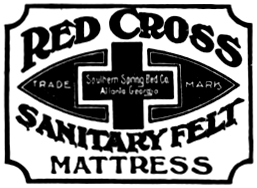
As all successful articles have imitations so is the RED CROSS imitated. Our label is your protection. Be sure and see that it is sewed on the side of the mattress. Every genuine RED CROSS bears the label as shown in cut.
If your dealer cannot show you a RED CROSS SANITARY FELT, write to us, and we will tell the name of the nearest RED CROSS agent.
PRICES:
| 2 ft. 6 in.—25 lbs. | $10.00 | 4 ft. 0 in.—40 lbs. | 13.75 |
| 3 ft. 0 in.—30 lbs. | 11.25 | 4 ft. 6 in.—45 lbs. | 15.00 |
| 3 ft. 6 in.—35 lbs. | 12.50 | ||
All mattresses made 6 ft. × 4 in. long.
In two parts, 50 cents extra.
Prices for special sizes quoted on application.
Southern
Spring Bed Co.
ATLANTA,
GA.
Image of page
Absolutely FREE
To Readers of Watson’s Jeffersonian Magazine.
In order to introduce The Arena, now that it is again under the complete editorial management of its founder, Mr. B. O. Flower, to the many readers who enjoyed this great review in the early nineties when under Mr. Flower’s management it was the first leading magazine to take up and aggressively carry forward the question of fundamental Democracy, Social Justice and Civic Righteousness, we will send absolutely free a copy of a recent issue of The Arena to any reader of Watson’s Jeffersonian Magazine who sends his name and address, together with that of some thoughtful friend who might also be interested in seeing the Magazine.
THE ARENA FOR 1907
The Arena for 1907 will contain in addition to papers from the strongest, ablest and most thoughtful fundamental thinkers who stand for free institutions, just government and civic righteousness, a number of highly important contributions, prepared especially for its pages by the greatest living authors of foreign lands.
Among the early papers of these series, will be contributions by Alfred Russel Wallace, D. C. L., L. L. D., the greatest living evolutionary philosopher and one of the most authoritative writers in the cause of Progressive Democratic advancement; the Hon. J. Henniker Heaton, M. P., the foremost living author on cheap postage, the parcels-post, postal savings-banks and international postal and cable service; and the Hon. Edward Tregear, Secretary for Labor for New Zealand, one of the master statesmen whose constructive work in framing many of the important advanced, progressive and Democratic statutes of New Zealand has placed him in a commanding position in New Zealand among the foremost constructive, liberal statesmen of Australasia.
The first of these important foreign papers appears in the January Arena from the pen of Dr. Alfred Russel Wallace, and deals with the railroad systems of the United States, and how and why the people should take over the railroads. It will be followed by a paper from Mr. Tregear on “New Zealand’s Progressive Attitude.” Mr. Henniker Heaton’s first paper will deal with the Telegraph Cables of the world and how they should be made of service to the millions instead of merely the convenience of the millionaire.
Other papers from equally important and authoritative writers will be a marked feature of the Arena for 1907, and will help to make this Magazine the one absolutely indispensable review of opinion for all thoughtful men and women interested in vital discussions of the larger problems of the day from the view-point of progressive democracy and social justice.
SUBSCRIPTION PRICE OF THE ARENA IS $2.50
SINGLE COPY, 25 CENTS.
Published by ALBERT BRANDT, Trenton, N. J.
Image of page
The Atlanta Journal
Daily-Sunday-Semi-Weekly.
JAMES R. GRAY, Editor and General Manager.
The news of the whole world accurately and entertainingly published on the day it is NEWS.
Fearlessly day after day the Journal fights the battles of the people and it fights a winning battle.
The women of the South find the Journal their most interesting paper. The Woman’s Department of the Journal is kept up to an unapproachable Standard.
The Semi-Weekly Journal
Is offering Agents a fine opportunity to make money easily. A large commission is paid on every subscription taken, and in addition
$1,000.00
will be distributed in January among its Agents.
Write at once for full particulars. Sample Copy of any edition sent for upon request.
The Atlanta Journal
Atlanta, Georgia.
Image of page
The Atlanta Georgian
(Every Day Except Sunday)
AND THE
Watson’s
Jeffersonian Magazine
CLUBBING OFFER
$4.50 PER YEAR FOR BOTH.
The Newsiest and Cleanest Southern Daily Newspaper and the Standard Southern Magazine one year for the price of ........
THE GEORGIAN
20,000 words a day over our New York Wire and 300 men in the South sending us the news each day is how the Georgian gives more news than most papers..........
JOHN TEMPLE GRAVES
IS EDITOR.
Absolutely Reliable and Authoritative Market
Quotations and Sporting News.
The Atlanta Georgian,
ATLANTA, GEORGIA.
Image of page
The Tri-Weekly Constitution
Monday, Wednesday, Friday,—Three Times Every Week
The Farmers’ Every Other Day Paper
$1.00 PER YEAR.
Endorsed by the Farmers’ Union, and by Over 100,000 Individual
Farmer Subscribers.
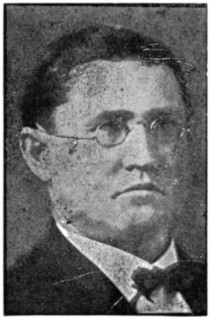
See What President Duckworth Says:
Permit me to congratulate the Constitution on its splendid work in behalf of the Farmers’ Union. Largely through its activity the good work of our great organization has been spread into the remotest sections, not only Georgia but throughout the south.
We have crossed the 11 cent line of cotton and in this the union has won its great victory of the year. Throughout the contest, the Constitution has been a tower of strength in giving us the support of their strong right arm.
Your editorials in behalf of the Income Tax and the Inheritance Tax, with your splendid fight for the R. F. D. Service, and the observance of railroad schedules to enable the farmers to get their mails on time, and to be deprived 24 hours by bad railroad connections, is eliciting the universal approval of our people.
We glory in your good work and we are with you.
R. F. DUCKWORTH,
President Georgia Farmers’ Educational and Co-operative Union.
Atlanta, Ga., November 26, 1906.
At the National Farmers’ Union, in session at Topeka, Kansas, The Constitution was so heartily endorsed that the report says, “resolutions were offered from two sides of the hall at the same time, one by Ben L. Griffin, of Conway, Arkansas, and the other by Campbell Russell, of Russell, I. T.” The character of these two gentlemen, and the unanimity of opinion expressed by them without consultation, indicates that the Constitution has really done a service to the Farmers’ Union that is being appreciated.
The resolutions were practically of the same tenor expressing thanks for the Constitution’s energy displayed and for the interest manifested in the farmers’ organization and co-operative movements, and for placing its power and influence back of these efforts now being intelligently made for the solution of the farmers’ problems.
The Tri-Weekly Constitution will be delivered at your door by the R. F. D. Mail Carrier with the regularity of the sunrise.
| $1.00 | Per Year. |
| .50 | for Six Months. |
| .25 | for Three Months. |
A trial will convince you, and make you a life time subscriber. Address all orders to
THE ATLANTA CONSTITUTION, Atlanta, Ga.
Image of page
Bigger, Brighter, Better Than Ever.
Don’t You Want a Great Daily Paper in Your Home?
THE ATLANTA NEWS
Special Bargain Day.
$2.50
FOR AN
ENTIRE YEAR.
The Famous Bargain Day of the Atlanta News has been fixed this year for TUESDAY, JANUARY FIRST.
To all who remit on or before that date the Evening News will be sent for AN ENTIRE YEAR at the “Bargain Day” price, $2.50. The Evening News and The Sunday News will both be sent to Bargain Day subscribers for $3.50 a year.
BE QUICK
The regular price of The News is $4.50 a year for the daily and Sunday, and you must remit on or before January 1st to get the paper at the “Bargain Day” price. After that date the regular price will be charged. Your postmaster is authorized to receive and forward your subscription; or you can send it direct to
The Atlanta News,
ATLANTA, GA.
LIVE LOCAL AGENTS WANTED.
Image of page
COTTON
THE SOUTH’S CURRENCY.
The newspaper that tells the Planter’s side of the cotton story, fearlessly and honestly, is THE COTTON JOURNAL.
It stands to-day the cleanest exponent of the Cotton Growers’ interest and Southern Agricultural development.
ONE DOLLAR is the subscription price to this weekly cotton paper.
ILLUSTRATED
YOU SHOULD READ IT!!
EDITED BY HARVIE JORDAN.
For full particulars, and sample copy, address,
THE COTTON JOURNAL,
RICHARD CHEATHAM,
Business Manager.
ATLANTA, GA.
Watson’s Jeffersonian Magazine
AND
THE COMMONER.
TOM WATSON’S
MAGAZINE
AND
WM. J. BRYAN’S
PAPER
Both One Year for Only $1.85
Mr. Bryan is the most conspicuous figure in American politics to-day. He is more—he is a World Figure. His views on men and things are awaited with interest in foreign countries as well as at home. THE COMMONER is his medium of communication with the world; but it is more than a personal organ, for it covers the whole realm of political thought. Hence, no one, whether a follower or an opponent of Bryan’s doctrines, can fail to be interested in the columns of this famous paper.
ADDRESS
WATSON’S JEFFERSONIAN MAGAZINE,
ATLANTA, GA.
Image of page

The
Weekly Jeffersonian
Published in Augusta, Ga.
PRICE $1.00 PER YEAR.
IN CLUBS OF THREE OR MORE, 75c.
A Weekly Newspaper Advocating Jeffersonian Principles.
| Editor-in-Chief | THOS. E. WATSON |
| Associate Editor | J. D. WATSON |
| Managing Editor | W. J. HENNING |
| Business Manager | C. E. McGREGOR |
Mr. Watson spares no pains or labor to make his Weekly Paper one of the best.
He devotes his personal attention to it.
He writes most of the editorials.
Being a Weekly it carries a vast deal of original matter which you would never find in his Magazine.

Image of page

If you sympathise with Mr. Watson and want to keep up with his work you simply cannot afford to be without the Weekly Jeffersonian.
In the Weekly, Mr. Watson can keep in closer touch with events as they occur than is possible in a magazine, consequently the Weekly fills a want which the magazine cannot supply.
To these two periodicals Mr. Watson will devote himself exclusively during the remaining years of his life.
He wants no office, but he does have an ambition to make his two publications a power for good throughout the land.
The
Weekly Jeffersonian
AND
Watson’s Jeffersonian Magazine
Twelve Months for
$2.00

Image of page
BEST
VALUES
EVER OFFERED YOU
If you want to buy a buggy, saddle or harness, and want a reliable high-grade article at actual manu- facturer’s prices, less the profit of both jobber and dealer, it will be greatly to your interest to deal directly with us.
BUGGIES, $32.60 and up
HARNESS, $6.88 and up
SADDLES, $2.50 and up
Don’t buy until you see us
or write for Catalogue No. 21.
JOHN FOSTER CO-
265-267 DECATUR ST., Cor. Moore
ATLANTA, GA.
Wanted!
AT ONCE
A Personal Representative in your community to procure new and renewal subscriptions on the Best-Selling, Best-Paying Magazine-Clubbing and Book Propositions Ever Offered.
25,000.00 IN CASH PRIZES
Full particulars free upon re- quest. It will pay you to write today to
The Review of Reviews Co.
13 Astor Place, Room 425, New York.
Your Arm, 1000 Testimonials, (Patented)
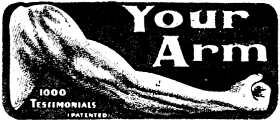
LET ME TELL YOU of a simple and easy way to enlarge your arms an INCH in 1 MONTH, and increase your strength and breathing capacity 50 PER CENT. Develop your arms, shoulders, chest and legs to a wonderful extent. Strengthen your HEART, LUNGS, NERVES and all the internal muscles. Rid yourself of rheumatism, writer’s cramp, dyspepsia and constipation. And attain robust health, great strength, youthful vigor and a perfect form. Write to
R. GIBSON, Boston, Mass., Box 3559 W.
“HOW TO REMEMBER”
Sent Free to Readers of this Publication
You are no greater intellectually than
your memory. Easy, inexpensive, increases
income; gives ready memory for faces, names,
business details, studies, conversation; develops will,
public speaking, personality. Send for Free Booklet.
Dickson Memory School, 711 Kimball Hall, Chicago
WHO’S WHO
IN AMERICA.
Edition of 1906-1907.
This (the Fourth) edition contains 16,216 names (2,786 of which have not appeared in any previous edition) and 2,048 pages. No other work has succeeded in finding and furnishing the address of leading Americans in all parts of the world.
Price, $3.50.
Sold by all Booksellers or sent, Post paid, by
A. N. MARQUIS & CO.
CHICAGO, U. S. A.
MORPHINE
COCAINE AND LIQUOR
Addictions cured in ten days without pain. Unconditional guarantee given to cure or no charge. Write for booklet.
CEDARCROFT SANITARIUM.
Dept., 33, Lebanon, Tenn.
Image of page
THE BUTLER COTTON CHOPPER
It is the only machine ever devised that will chop cotton out to a stand. The machine is simple and strong, and will chop as much cotton in one day as 8 hoe hands. It is easy to adjust, and any plow boy can run it to perfection. The machine will pay for itself the first three days it is used.
This machine has given universal satisfaction to every farmer that has used it, as it helps the Farmer to solve the Labor Question. By using the BUTLER COTTON CHOPPER you can chop out your cotton for a less expense than 20 cents per acre.
The machine weighs 100 pounds, and is drawn by a horse, and will run anywhere that a planter will run. Price, $20.00.
The Butler Chopper took the Blue Ribbon at the State Fair, Atlanta, Ga.
W. J. BROWN,
18 N. Broad St., ATLANTA, GA.
FINEST KNOWN CORN
Our Square-Deal highly improved by us for 40 years, the very highest standard of perfection. Ears foot long, grains 3-4 inch long, 1-2 inch wide, guaranteed the whitest known, with pink cob.
Send for full copyrighted history and full size half tone photographs.
$1000.00 REWARD FOR SAMPLE OF BETTER.
We have seed farms in nearly every southern and south-western state. Ship you acclimated seed from your own state.
Address, SQUARE-DEAL SEED CORN FARMS, Cook, DeSoto Parish, La.
IS IT MONEY YOU WISH TO EARN?
Thousands of people throughout the country are ready, willing, and eager to subscribe for
WATSON’S JEFFERSONIAN MAGAZINE.
Run over the list of your own friends and neighbors in your mind, and you will readily recall 10, 15, or 20 in your immediate neighborhood that would be glad to give you a subscription.
WE PAY LIBERAL CASH COMMISSIONS.
Write us for terms, go to work immediately and have a large list to send us on receipt of our reply.
Representatives for the Magazine wanted in every section.
Address,
Watson’s Jeffersonian Magazine,
ATLANTA, GEORGIA.
Image of page
CHRISTMAS
The season in which the spirit of give is master complete.
Had it occurred to you that Watson’s Jeffersonian Magazine would make a delightful and lasting Xmas present that would please, interest and entertain.
Our readers who wish to assist in increasing our circulation and influence will find our remarkably low clubbing offer of interest to their friends.
| Watson’s Jeffersonian Magazine | $1.50 |
| Review of Reviews | 3.00 |
| Woman’s Work, Athens, Ga | 1.00 |
| $5.50 | |
| OUR PRICE $3.00. | |
| Watson’s Jeffersonian Magazine | $1.50 |
| Bob Taylor’s Magazine | 1.00 |
| $2.50 | |
| OUR PRICE $2.00 FOR BOTH. | |
| Watson’s Jeffersonian Magazine | $1.50 |
| Atlanta Constitution (Daily) | 5.00 |
| $6.50 | |
| OUR PRICE $5.00 FOR BOTH. | |
| Watson’s Jeffersonian Magazine | $1.50 |
| National Co-Operator, Dallas, Tex | 1.00 |
| $2.50 | |
| OUR PRICE $2.00 FOR BOTH. | |
| Watson’s Jeffersonian Magazine | $1.50 |
| The Cotton Journal, Harvie Jordan, Editor |
1.00 |
| $2.50 | |
| OUR PRICE $2.00 FOR BOTH. | |
| Watson’s Jeffersonian Magazine | $1.50 |
| The Atlanta Georgian, John Temple Graves, Editor |
4.50 |
| $6.00 | |
| OUR PRICE $4.50 FOR BOTH. | |
| Watson’s Jeffersonian Magazine | $1.50 |
| Tri-Weekly Constitution | 1.00 |
| $2.50 | |
| OUR PRICE $2.00 FOR BOTH. | |
| Watson’s Jeffersonian Magazine | $1.50 |
| Southern Ruralist | 1.00 |
| $2.50 | |
| OUR PRICE $1.75 FOR BOTH. | |
| Watson’s Jeffersonian Magazine and Missouri World. |
|
| TWELVE MONTHS FOR $2.00. |
| Watson’s Jeffersonian Magazine | $1.50 |
| Review of Reviews | 3.00 |
| $4.50 | |
| OUR PRICE $3.00 FOR BOTH. | |
| Watson’s Jeffersonian Magazine | $1.50 |
| Woman’s Work, Athens, Ga | 1.00 |
| $2.50 | |
| OUR PRICE $1.75 FOR BOTH. | |
| Watson’s Jeffersonian Magazine | $1.50 |
| Bob Taylor’s Magazine | 1.00 |
| $2.50 | |
| OUR PRICE $2.00 FOR BOTH. | |
| Watson’s Jeffersonian Magazine | $1.50 |
| The Watchman, Cleburne, Texas | 1.00 |
| $2.50 | |
| OUR PRICE $2.00 FOR BOTH. | |
NOTE.—As all papers other than weeklies are required to pay special postage in their home city, the above clubbing rates are not open to residents of the respective cities in which the periodicals are published other than regular weekly.
Prices cheerfully quoted on any combination of periodicals desired.
Address
Watson’s Jeffersonian Magazine,
Atlanta,--Georgia.
Atlanta Utility Works,
DESIGNERS AND MANUFACTURERS OF
Improved Cotton Oil Machinery
and Dealers in
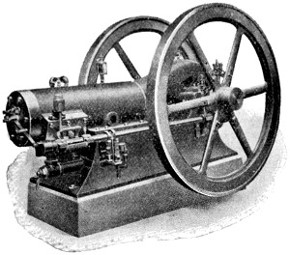
Gasoline Engines, Saw Mills
and Ginning Machinery
Specialties Patented:
ELECTRO-MAGNETS,
SEED CLEANERS and SEPARATORS,
DAVIS PUMP GOVERNORS
SAW RECUTTERS.
Write us for anything in the
MACHINERY LINE.
ATLANTA UTILITY WORKS,
54 W. Mitchell St.,
Atlanta, Ga.
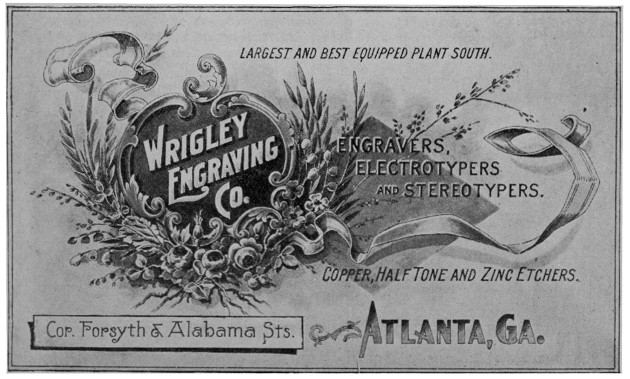
LARGEST AND BEST EQUIPPED PLANT SOUTH.
Wrigley Engraving Co.
ENGRAVERS, ELECTROTYPERS AND STEREOTYPERS.
Copper, Half Tone and Zinc Etchers.
Cor. Forsyth & Alabama Sts. Atlanta, Ga.
SUCCESSFUL ADVERTISING
BY
SUCCESSFUL ADVERTISERS
WHY?
Because they reach the most enthusiastic audience in this country through the columns of
Watson’s Jeffersonian Magazine
All selling finally resolves itself into buying—buying the services of good men, buying business-bringing booklets and form letters, good advertising copy and advertising mediums—buying orders at a profitable figure.
An advertising medium is a known quantity. Why buy advertising space as you must choose a salesman, why trust to intuition or snap judgment, when you can work with figures?
Simply be sure of the answers to these questions and you’ll never buy space in the wrong medium:
(1) What is a publication’s circulation? How is it distributed? Who are the people that buy it? How enthusiastically do they read it? How long do they treasure it? To what degree do they believe in and are they influenced by it?
(2) What is the cost per page per thousand of space in this publication?
(3) What does it cost you to reach these enthusiastic readers in other ways?
(4) What would it cost you to reach our vast audience with one cent post cards?
(5) How do these facts and figures (seemingly conclusive) really work out? What results does the publication quote to make it impossible that these figures lie?
If you do not already know the answer to all these questions concerning Watson’s Jeffersonian Magazine, that it goes into the homes and is read by 100,000; that its readers are of the 35 cent magazine sort in point of quality; that they are the most enthusiastic body of men and women reached by any publication; that they believe in Watson’s Jeffersonian Magazine, and its editor, and know that our advertisers are trustworthy; that every copy of Watson’s Jeffersonian Magazine is read and re-read; that the advertising rate is the lowest quoted by any high-grade publication—about sixty cents per page per thousand readers, then write us and let us tell you more about it.
THIS COUPON SAVES YOU 10%
ADVERTISING DEPARTMENT
Watson’s Jeffersonian Magazine
SEND COPY BEFORE JANUARY 1st.
FOR THE FEBRUARY NUMBER
ATLANTA, GA.
190
Kindly enter my order for lines, six times, in the classified columns of Watson’s Jeffersonian Magazine. Enclosed please find (40c per line) in full payment for first insertion—copy attached.
Upon receipt of memo, bill on the 25th of next and each succeeding month (six-time discount to be credited on bill for sixth insertion) I will remit promptly and advise whether to repeat or to run new copy.
¶ Allow about eight words to the line—most of last line for name and address. 5 lines, 6 times, $10.80. 40c per line additional.
Very truly yours,
Address
Image of page
CLASSIFIED ADVERTISING
IN
WATSON’S JEFFERSONIAN MAGAZINE
Whether You Wish to Buy or Sell Make Your Wants Known Here.
REAL ESTATE.
California.
FOR SALE.—FINE HOME IN PINES NEAR OCEAN beach; summer the year round. Rents for $100 per month. Send for photos and price. R. H. Stevens, Carmel, California.
* * * * * *
MONROVIA.—BEAUTIFUL FOOTHILL suburb of Los Angeles. Electric car service. Refined moral community. Send 2 cent stamp for descriptive matter. C. E. Slosson, Monrovia, Cal.
* * * * * *
A BEAUTY.—RANCH 120 acres behind Stanford University. Fine improvements and stock, all for $900! Great boom coming! Greater San Francisco Corporation, Mayfield, Cal. Information!
* * * * * *
LOS ANGELES, CALIFORNIA.—The most progressive city on the Pacific Coast. Southern California is the ideal summer and winter resort of the world. Information for 5 cents postage. Los Angeles Chamber of Commerce.
* * * * * *
REAL ESTATE BUSINESS SELF-TAUGHT. I teach California methods. Best in world. Sure money-makers. My course shows how. Particulars and map Los Angeles free. Write today. W. A. Carney, Stimson block, Los Angeles.
* * * * * *
A BEAUTY HOME of 2 acres. Finest climate. Near Frisco and University, only $500. Secure it till you can investigate by deposit of $25, returnable. Easy payments. Commissions executed. Greater San Francisco Corporation, Mayfield, Cal.
* * * * * *
BARGAIN.—520 acres in Butte County, Cal. Olives, olive oil, figs, peaches, and mineral springs. No earthquakes. Price, $65,000. After first payment crops will soon pay for property. May I send you prospectus giving full details? C. C. Spotswood, Suite 507-239 N. Clark St., Chicago, Ill.
* * * * * *
CALIFORNIA IRRIGATED land is best for home and investment. 5,000 acres just secured in richest section. Ten acres ample. Long time—ample water. Level and clear. Perpetual water right. Extra inducements to those who improve. $30 to $50 per acre. W. H. Wise, 218 T. W. Hellman Bldg., Los Angeles, Cal.
* * * * * *
CALIFORNIA LAND $1.00 ACRE.—Balance entire purchase $1.00 week for each 5 acres. No taxes. No interest. 5 acre tracts. Level, clear, rich. Ready to plow. Under irrigation. Perpetual water right. Immediate possession given. Particulars, maps, photographs for 2 cent stamp. Stevinson, Colony, 703 W. Van Ness Avenue, San Francisco.
* * * * * *
SOUTHERN CALIFORNIA FARMS.—60 minutes from Los Angeles. Beautiful farms with all modern rural improvements; only $75 to $150 per acre; easy terms; inexhaustible water supply; three transcontinental railroads. Ten acres will make you independent. Fruits, vegetables and alfalfa grow every day in the year; no cold or frost; perpetual summer; the land of sunshine and health; beautiful towns of Pomona and Ontario adjoin our lands; write today for maps and complete literature describing the famous Chino Ranch. Chino Land and Water Co., Dept. A, 516 Wilcox Bldg., Los Angeles, Cal.
Florida.
ST. PETERSBURG, FLA.—For information and literature of value to the homeseeker, invalid, or investor, address Board of Trade. Most popular Florida resort.
* * * * * *
SUMATRA TOBACCO LAND in the blue grass section of Florida. Will produce $1,000.00 worth every year on each acre. Write quick as boom has started. T. A. Ausley, Tallahassee, Fla.
* * * * * *
PROPERTY ON ORMOND PENINSULA on Halifax R. Best location in state for all year or long winter season. Good house, paying groves, price $5,000. Address E. A. Lapp, Bulow, Fla.
* * * * * *
FLORIDA ORANGE AND GRAPE-FRUIT groves and pineries, are paying big returns. We have some bargains. Write for our descriptive booklet. Tidd, “The Real Estate Man,” Jacksonville, Fla.
* * * * * *
ORANGE GROVE.—250 bearing trees twenty years old, including grape fruit and tangerines. In fine condition. One mile from railroad station. High land, near large lake. J. E. Davison, Pawtucket, R. I.
Miscellaneous.
FOR SALE.—81,000 acre ranch, 15 miles from Santa Fe, N. M. 3,000 irrigated. Gold and coal on ranch. Price $4.25 per acre, or $2.121⁄2 for half interest. U. S. Renee, Smithland, Ia.
* * * * * *
BIG BARGAINS IN LAND for investment or homeseeker in Missouri, Kansas, Sunny Texas and Mississippi. Large and small tracts. The Investors Realty Co., 696 W. Hall Bldg., Kansas City, Mo.
* * * * * *
IOWA FARMS FOR SALE AND EXCHANGE.—We have some of the best bargains in improved farms in Iowa. Send for our new illustrated list. Northern Iowa Land Co., Independence, Iowa. Box T. W.
* * * * * *
$10.00 down and $10.00 for nine consecutive months buys a lot in Arcadia, Fla., the booming county seat of the greatest “Florida” orange and cattle region in the state. Remit at once to get in this offer. Address, R. C. Selvidge, Brandon, Miss.
* * * * * *
$300 PER ACRE PROFIT IS THE RECORD for our farmers near Kingsville on the Gulf Coast line, Texas, the winter vegetable garden of America and the finest cotton land in Texas. Send for literature. The National Land Co., 92 LaSalle St., Chicago, Ill. Mox W.
* * * * * *
INVESTORS—HOMESEEKERS—take notice. We have for sale 150,000 acres of the richest improved and unimproved land in Indian Territory and the Southwest. Fertile soil—ideal climate—has no competitor for the raising of stock and the growing of the various fruits and grains. Devore-Birkeland & Co., T. W., 131 LaSalle St., Chicago, Ill.
* * * * * *
FARMING ALONG GULF IN TEXAS PAYS $500 an acre. Will deed that land for $15 an acre on payments. Artesian water; fine climate; below frost line; have large body ready for colonization, which will treble in value within 18 months. Immigration Agts. Rock Island R. R. Excursion $25.00. Oklahoma Texas Land Co., 511 W. Reaper Block, Chicago.
BUY A FARM IN PENNSYLVANIA, NEW JERSEY, OR DELAWARE. The best states for profitable farming; soil adapted to a great variety of crops; near markets that pay best prices for your products; farm lands in these three states my specialty—sold and bought; write for particulars. Raymond C. Frick, 1102 T. Real Estate Trust Building, Philadelphia, Pa.
* * * * * *
NEW ORLEANS BUSINESS PROPERTY.—I have for sale nearly half a square fronting on three streets, near Canal street and the new Frisco Terminal Station. Now covered with numerous small business houses and one palatial residence. The finest location in the city for commercial purposes. Can be bought for $180,000.00. Owner desires to
leave this country permanently. Buy now and double your money within five years. J. M. Lane, Real Estate Broker, 718 Macheca Building, New Orleans, La.
* * * * * *
TWO MILES from Meridian, Miss., on A. G. S. R. R., 506 acres. 200 acres bottom land, balance nice upland, well suited for fruit, vegetables, cotton, corn, etc. Plenty timber—pine, white-oak, hickory, etc. Finest stock farm imaginable. Reed winter pasture. Springs and wells, purest free stone water. Mineral spring not analyzed. Great demand for dairy and products. 250 acres cultivated, balance woodland, $50.00 per acre. J. C. & L. Williams, Bonita, Miss.
FOR THE HOME.
WATERPROOF APRONS LAST A LIFETIME.—Artistic in design, white or colors. Sold by the makers only. 50 cents each, delivered. The Walters, Austen Co., 5th floor, 11th & Chestnut Sts., Philadelphia, Pa.
* * * * * *
FOR CHRISTMAS.—Send $1 up for self or friend. We send handsome clock bank with deposit credited in passbook. 4% interest. Safety Banking and Trust Co., 2921 Kensington Ave., Philadelphia, Pa. Organized 1900.
* * * * * *
ANY MEMBER OF THE FAMILY will appreciate the Imperial Trousers or Skirt Hanger, holds four garments. 50 cents at the furnishers, or 70 cents by mail. Write for booklet, Pynchon & Co., Philadelphia, Pa.
* * * * * *
BUILD MISSION FURNITURE.—For pleasure and profit. We teach how by the Houck Easy System. We furnish plans showing exact size and shape of every piece, give complete directions how to make from start to finish, tell what tools required, etc. So simple anybody can make. Boys and young men acquiring lots of money by making furniture from our designs and selling it. Particulars for stamp. Houck Furniture Pattern Co., Dayton, Ohio, Dept. E. M.
THE BEST PUMP FOR COUNTRY WELLS.—No rusty water on wash day. No plumbers’ bills for repairs. The Blatchley Wood Pump (lift or lift and force) the standard for 38 years. Address C. G. Blatchley, 1052 Drexel Bldg., Philadelphia, Pa.
* * * * * *
BEST 200 RECIPES FREE! THE ENTERPRISING HOUSEKEEPER.—A famous book of tested, economical recipes and illustrated kitchen helps, published to sell at 25 cents. We will send it free. Just send your name and address. The Enterprise Mfg. Co. of Pa., 2225 N. Third St., Phila., U. S. A. Makers of the famous Enterprise Meat and Food Choppers.
* * * * * *
PRIZE CLOTHES WRINGER, WORLD’S PRIZE winner over all competitors; distinctly different from all others; strictly high-grade; automatic clamps fasten on any kind of tub; easiest to operate; guaranteed white rubber rolls; ours is one of the three wringer factories in the U. S., est. 1890. Selling direct saves you at least 50%; satisfaction guaranteed or money refunded. Write us. Reference, Dun’s Agency, Deshler National Bank, here. U. S. Wringer Mfg. Co. (E), Columbus, Ohio.
INVESTMENTS.
I HANDLE NOTHING BUT DIVIDEND PAYING securities, and invite your correspondence regarding any you may desire to buy, sell or exchange. List on application. H. L. McCauley, 1524 W. Chestnut St., Philadelphia, Pa.
* * * * * *
LOS ANGELES, CAL., first mortgages, 6 and 7% net, title guaranteed, papers all complete, delivered through your own bank. Investments, reports, and appraisals free. Bank references. 25 years’ experience. L. C. Crossmin, W. Chamber of Commerce Building.
GUARANTEED MORTGAGE investments. Interest at 54⁄10% and 6% from $1,200 up. Gilt-edged properties. Mortgages insured. My reference is Hamilton Trust Co., Philadelphia. Charles H. Buckley, W. 38 South Fortieth Street, Philadelphia.
* * * * * *
FOR SALE.—5% first mortgage gold bonds to net 53⁄4%, principal and semi-annual interest payable in New York—issued by a water and light company with liberal city franchise in one of the best towns in the South. Jas. Thompson, Walhalla, S. C.
BUSINESS OPPORTUNITIES.
THERE IS BIG MONEY IN ASPARAGUS.—Greater profits from its culture than any other product. Write for free booklet. Napa Improvement Co., San Francisco, Cal.
* * * * * *
I WILL BUY AND PAY SPOT CASH for your store and fixtures, entire contents, no matter where located. Newell D. Atwood, 27 School St., Boston, Mass. Tel. 1322 Main.
* * * * * *
TEN VALUABLE MONEY-MAKING formulas sent for one dollar. Preparations that you can sell. That will pay big profits. W. Formulae Co., 832 Greenmount Ave., Baltimore, Md.
* * * * * *
WANTED.—Patented specialties of merit. We have branch offices in the principal cities of Europe and agencies all over the world. Our correspondence is in eight languages. Power Specialty Co., T. W. Detroit, Mich.
* * * * * *
THERE ARE GOOD OPPORTUNITIES on the lecture and reading platform. Test your talent in a recital for criticism in your locality. Write for plan. Edward Amherst Ott, 252 W. Sixty-first Street, Chicago, Ill.
* * * * * *
COMING TO CALIFORNIA?—$25,000 will buy control of a factory in San Francisco to produce horse collars by a patent process. Profits 40%. Demand steady. Trade established. Principals only address J. C. Hooper, 528 22nd St., Oakland, Cal.
HOME COMPANION TOOL SET.—No. 710.—Special offer. 41 individual tools in hardwood case, sent on receipt of $5 00. Every tool needed by the home carpenter. W. Goodell-Pratt Company, Greenfield, Mass.
* * * * * *
A FEW DOLLARS will start a prosperous mail order business; we furnish catalogues and every thing necessary; by our easy method failure impossible. Send for particulars. Milburn-Hicks, 741 Pontiac Building, Chicago.
* * * * * *
WE CAN SELL OR EXCHANGE YOUR BUSINESS or real estate no matter where located, or find any kind of business or real estate for you anywhere in U. S. and Canada. Write Fidelity Company, C. Bee Bldg., Omaha, Neb.
* * * * * *
CASH for your farm, business, home, or property of any kind, no matter where located. If you desire a quick sale send us description and price. Northwestern Business Agency, 331 Bank of Commerce Bldg., Minneapolis, Minn.
* * * * * *
LONG ESTABLISHED MAIL ORDER and installment house furnishing business for sale. Grand Rapids furniture is celebrated the world over, and big money can be made selling from here. Address C. H. Leonard, Grand Rapids, Mich.
* * * * * *
MEN TO HANDLE high-grade map proposition. Territory in every state. Experience no qualification. Liberal terms. Must be men of good address and ability. Get our proposition. It’s profitable. Scarborough Co., 114 Essex St., Boston, Mass.
PATCHES OF TIMBER turned into big profits by our portable beltless combined sawmill and engine. Small capital required; easy terms. Glean your county for bargains in timber. Lumber prices rising. Wm. Bartley & Sons, W. Bartley, N. J.
* * * * * *
52 CARLOADS OF PURE GOLD does not equal the fortune amassed by a former Missouri County school teacher. The little book, “Missourians Shown,” tells of an equal present-day opportunity. Sent free. Write Jerry Culbertson, 695 Hall Bldg., Kansas City, U. S. A.
* * * * * *
CUBA.—Tropical fruit plantation. Oranges, grape fruit, cocoanuts, coffee. On ten years’ time. Profits enormous. Best investment of kind. By reliable, experienced men; seven years’ experience in Cuban fruit growing. Agents wanted, either sex. Address, Buena Vista Fruit Co., 105 W. Tremont St., Boston, Mass.
* * * * * *
WANTED. A PARTNER WITH $25,000 to $50,000. We have an established and growing business, but lack capital to push it. An investment of thousands will net millions. The investor must be a business man and a worker. Write for particulars, and state fully amount you would invest, previous business experience, etc. Purifico Mfg. Co., B. Ashville, N. Y.
6% ON YOUR MONEY by local Building and Loan Association. 14 years in business. Never had a loss, or failed to meet an obligation. Stock in force $750,000. Write for free literature. Jefferson County B. & L. Association, Birmingham, Ala.
* * * * * *
MONTGOMERY, ALA., offers the homeseeker, investor, and manufacturer wonderful opportunities. Capital of Alabama. Has 50,000 enterprising people and is growing. In rich agricultural section. Has seven great railroads and water transportation on Alabama river to Gulf. Coal, iron and timber close at hand and very cheap. Labor plentiful and high grade. Climate ideal. Schools, churches, public improvements matters of civic pride. Dixie revels in prosperity. Montgomery is Dixie’s heart. For booklet and information, address the business men’s organization, The Commercial Club, Dept. C, Montgomery, Ala.
* * * * * *
DOES YOUR PRESENT INCOME SATISFY YOU? You can double it by taking the SHELDON SHORT CUTS in SELLING and MANAGEMENT. One salesman says: “You added $5,000 to my salary last year.” Another states: “A single deal closed by your method netted 50 times original cost.” 8,000 others and nearly 1,000 firms are using it to increase sales and earnings. All instruction by correspondence. You owe it to yourself to investigate. Write for more facts and proof. SHELDON (1750) the Republic, CHICAGO.
HELP WANTED—MALE AND FEMALE.
PORTRAIT AGENTS.—16×20 crayons 25 cents. Water color 30 cents. Samples and catalog free. Berlin Artists Association, 152-O Lake St., Chicago.
* * * * * *
SALESMEN WANTED.—Men or women, whole or part time to sell advertising calendars, fans and other advertising novelties, for an old reliable house. Box 160, Meridian, Conn.
* * * * * *
$25 PER WEEK AND TRAVELLING EXPENSES paid salesmen to sell goods to grocery stores, drug and general stores. No canvassing. A rapid selling line. Experience unnecessary. Purity D. E. Co., Chicago.
* * * * * *
AGENTS.—HERE’S THE CHANCE OF A LIFETIME. Stoll’s shoes for flat irons, something entirely new, sell in every home. For full particulars address Dexter Supply Co., 334 Dearborn St., Chicago.
* * * * * *
WE WANT HELP.—Anyone desiring pleasant and profitable business should write us at once. Our positive guarantee inspires confidence and makes sales easy. W. T. Allen Medicine Co., Greenfield, Ind.
* * * * * *
MORE MONEY, LESS TALKING, steadier work, bigger field, handling our new inventions, than any other line. Needed in every home. Agents, you can’t beat this. Selwell Co., 105 W. Jackson B., Chicago, Ill.
* * * * * *
BENTON HOLLADAY & CO. Man cleared $1,182, lady $720 last six months selling Celluloid Waterproof Shoe Dressing. Why not you? Demonstrated samples free. Benton Holladay & Co., 260 Clark St., Chicago, Ill.
* * * * * *
AGENTS WANTED to handle our line of high grade novelties. Great sellers for cigar stores and newsdealers. Large profits. Catalogue of 300 and wholesale prices free. Write today. National Mfg. Co., Box T. W., Norfolk, Va.
* * * * * *
AGENTS WANTED in every gas town on salary or commission to demonstrate superheated inverted gas light. Latest light out. Nothing to sell. Sample free. Perfection Light Co., Dept. A, 53 River St., Chicago.
* * * * * *
WE WANT A HUSTLING AGENT in your town for the only automatic shears, the Sheer-Cut Shears. Best shears, best terms. Credit given. Orders filled same day received. Novelty Shear Co., 184 LaSalle St., Chicago, Ill.
* * * * * *
THE HEARWELL TELEPHONE ATTACHMENT makes you hear better and shuts off outside noises. An agency is open for you whether you have a store or are employed. Big opportunity, Hearwell Co., W. 1300 Arch St., Philadelphia, Pa.
WANTED.—TWELVE EXPERIENCED LECTURERS, subject, industrial activities. Also musicians for male quartettes. Give full particulars and references with first letter. Edward Amherst Ott, 250 East 61st Street, Chicago.
* * * * * *
SALESMEN TO SELL the largest line of souvenir post cards in the country. Also large line of advertising fans. Excellent side line. Good commission and prompt settlement. Alfred Holzman, Publisher, 340 Dearborn St., Chicago.
* * * * * *
AGENTS, OUR NEW GOLD window sign letters beat anything on the market. Big profits. Agents make $10.00 to $20.00 daily. Complete sample outfit 25 cents. Particulars free. Sullivan Co., 406 W. Van Buren St., Chicago, Ill.
* * * * * *
“FIRE CHIEF.”—Latest, most effective extinguisher. Acts instantly without damage to surroundings. Handsome, light, inexpensive. Demand universal. $40 per week to high class competent agents. Write today for terms and territory. W. F. A. Company. The Spitzer, Toledo, O.
* * * * * *
WANTED.—AGENTS IN EVERY SHOP IN THE world to sell Vanco hand soap. Send 10 cents for full size can and particulars. Some agents make $40.00 per month in addition to regular work. Address the J. T. Robertson Co., Manchester, Conn. (Dept. E).
* * * * * *
SAFETY DOOR LOCK can be used without tools on any door without scratching. Proof against burglars, sneak thieves, and pass keys. Pocket size, 25 cents. Exclusive territory to good agents. Large profits. Send for samples and terms. Safety Door Lock Co., Seattle, Wash. Dept. T. W.
* * * * * *
HUSTLERS WANTED TO SELL BEST SPECIALTY of recent years. Aggressive workers make $10.00 per day (no exaggeration). Those who mean business write for full particulars. Special—To those wishing to lose no time we will send samples for 10 cents. W. P. Chase & Co., Wilcox Bldg., Los Angeles, Calif.
* * * * * *
LOCAL REPRESENTATIVE WANTED.—Experience unnecessary if honest, ambitious and willing to learn the business thoroughly by mail. Splendid income assured. Write at once for full particulars. Address either office. National Co-operative Realty Co., 298 Athenaeum Bldg., Chicago, Ill., or 298 Maryland Bldg., Washington, D. C.
* * * * * *
YOU CAN SELL PORCELA to every bathtub owner in the U. S.—and there are millions of them. Easy to sell; liberal profits to bright agents. Porcela is the only cleansing preparation that preserves the lustre of the porcelain enamel while cleaning it. Porcela cleans everything from kitchen to bathroom. Write for information today. Porcela Company, Sales Dept. T. W., Pittsburgh, Pa.
MISCELLANEOUS.
MOTION PICTURE MACHINES, film views, magic lanterns, slides and similar wonders for sale. Catalogue free. We also buy magic picture machines, films, slides, etc. R. Harbach, 809 Filbert Street, Philadelphia, Pa.
* * * * * *
SONG WRITING PAYS BIG.—Your poems may be worth thousands. We write music to your words, pay royalty, publish and popularize. Send for booklet. Brown Music Co., 393 Temple Court, New York City.
* * * * * *
THE ANGLE LAMP.—Best, cheapest, most satisfactory of all lighting methods. Burns common kerosene oil. Convenient as gas. Tell us what room you wish to light. Angle Mfg. Co., 78 Murray St., New York.
* * * * * *
SONG WRITERS.—Your poems may be worth THOUSANDS OF DOLLARS. Send them to us for the music. Accept no offer before reading Music, Song and Money. It is free. Hayes Music Co., 223 Star Bldg., Chicago.
* * * * * *
HOME STUDY.—Every reader of WATSON’S JEFFERSONIAN MAGAZINE who is interested in home study and correspondence teaching is invited to send for free copy of our 80-page catalogue and full information in regard to our home study course. The Home Correspondence School, Springfield, Mass.
HOLIDAY GIFTS.—Beautiful holiday novelties in silver. Something special for souvenir collectors. Galt & Bro., Washington, D. C.
* * * * * *
MUSIC LESSONS FREE.—Send for our free booklet. It tells how to learn to play any instrument. Piano, organ, violin, guitar, mandolin, etc. Write National School of Music, 34 P. O. Block, Montclair, New Jersey.
* * * * * *
STOOPING SHOULDERS.—A habit cured without harness or binding braces. The Vitality Suspender scientifically constructed to make large, strong muscles of back carry weight of trousers—through the unconscious law of equipoise—the chest is thrown out with abdomen back—insuring free heart circulation—good lung action—deep breathing—natural digestion. A suspender, not a harness. Sent by mail, postpaid, one dollar. The Perfection Mfg. Co., W. Box. 90, Girard, Ohio.
* * * * * *
OUR PLANT is specially equipped to handle commercial work, enabling us to do it more economically than others. We have envelopes, bill heads, cards and statements, $1.30 per thousand up. Samples of these and better grades promptly mailed to business men. We also have special price list which includes delivery to far-away points at low rates. Orders promptly shipped; get our figures for other work. L. Fink & Sons, Printers, 5th and Chestnut, T. W. Philadelphia, Pa.
AGENTS WANTED
We want agents to sell our made-to-order suits and pants. Suits from $10.00 up. Pants, $3.00 up. We will give liberal commission to the right men. If you are interested, write at once for sample outfit, particulars and territory. Warrington Woolen & Worsted Mills, Dept. 41, Chicago, Ills.
VIRGINIA
HISTORIC
HOMES
on the rivers and Bay. Select country homes in the noted Piedmont region and Valley of Virginia. Choice hunting preserves. Free list.
H. W. Hilleary & Co., Charlottesville, Va.
THE
Atlanta Dental College,
A School of Dentistry
BY DENTISTS FOR DENTISTS
Largest School in the State,
Leading School of the South.
FEATURES:
Large New College Building. Complete New Library. New Practical Porcelain Department. Heavy Operatory Clinic, Exclusively White Patients. Monthly Examinations and Daily Recitations. Central Location. Experienced Demonstrators.
Write for Souvenir Catalogue and Further Particulars to . . . .
WILLIAM CRENSHAW,
D. D. S.,
DEAN.
Box 401.
ATLANTA, GEORGIA.
Mention this Magazine when writing.

TYPEWRITERS
AT LESS THAN HALF PRICE.
500 machines of all standard make, REMODELED, REBUILT or SLIGHTLY USED, at less than HALF PRICE. Shipped to any part of the United States on approval.
WE REBUILD all makes of Writing Machines.
Write Us Today.
BUTLER TYPEWRITER CO.
717-18-19 Fourth National Bank Bldg.
ATLANTA, GA.
Manufacturers of the “BUTLER’S BEST” Typewriter Ribbons and Carbons.
Image of page
MAGAZINE BARGAINS.
In placing your order for Magazines this year, do not forget to include WATSON’S JEFFERSONIAN MAGAZINE.
Subscriptions may go to one or different addresses. If you do not find just what you want, send your list to us for prices.
| Class A. | |
| Price Per Year |
|
|---|---|
| American Agriculturist | $1.00 |
| American Boy | 1.00 |
| American Magazine | 1.00 |
| Brann’s Iconoclast | 1.00 |
| Business Philosopher | 1.00 |
| Camera Craft | 1.00 |
| Commoner | 1.00 |
| Cosmopolitan Magazine | 1.00 |
| Farming | 1.00 |
| Garden Magazine | 1.00 |
| Good Housekeeping | 1.00 |
| Harper’s Bazar | 1.00 |
| Kindergarten Magazine | 1.00 |
| Kindergarten Review | 1.00 |
| Little Folks. Salem | 1.00 |
| National Magazine | 1.00 |
| Pacific Monthly | 1.00 |
| Philistine | 1.00 |
| Photo Era | 1.50 |
| Physical Culture | 1.00 |
| Pictorial Review | 1.00 |
| Pilgrim | 1.00 |
| Suburban Life | 1.50 |
| Success | 1.00 |
| Times Magazine | 1.50 |
| Travel Magazine | 1.00 |
| Woman’s Home Companion | 1.00 |
| World To-Day | 1.50 |
| Youth | 1.00 |
Watson’s Jeffersonian Magazine and any Class A, $2.00.
Watson’s Jeffersonian Magazine and any two of Class A,
$2.65.
Watson’s Jeffersonian Magazine and any three of Class A,
$3.30.
Watson’s Jeffersonian Magazine and any two of Class A, with any Class B, $4.00.
Watson’s Jeffersonian Magazine and any Class A, with any Class C, $3.00.
Watson’s Jeffersonian Magazine and any Class A, with any Class D, $3.15.
Watson’s Jeffersonian Magazine and any Class A, with either Class E, $4.00.
Watson’s Jeffersonian Magazine and any Class A, with Class IX, $4.25.
Watson’s Jeffersonian Magazine and any Class B, $2.70.
Watson’s Jeffersonian Magazine and any two of Class B, $4.05.
Watson’s Jeffersonian Magazine and any Class D, with any Class A, $3.50.
Watson’s Jeffersonian Magazine and either Class E, $3.35.
Watson’s Jeffersonian Magazine and any Class D, $2.85.
| Class B. | |
| Automobile | $2.00 |
| Independent | 2.00 |
| Outdoor News | 2.00 |
| Outing | 3.00 |
| Reader Magazine | 3.00 |
| Review of Reviews | 3.00 |
| Short Stories | 1.80 |
| Yachting | 3.00 |
| Class C. | |
| Appleton’s Magazine | $1.50 |
| Country Gentleman | 1.50 |
| Etude | 1.50 |
| Keith’s Magazine | 1.50 |
| Motor Age | 2.00 |
| Overland Monthly | 1.50 |
| Pearson’s Magazine | 1.50 |
| Ram’s Horn | 1.50 |
| Recreation | 1.50 |
| Class D. | |
| Ainslee’s Magazine | $1.80 |
| House Beautiful | 2.00 |
| Lippincott’s Magazine | 2.50 |
| Toilettes | 2.00 |
| Class E. | |
| Burr McIntosh | $3.00 |
| Smart Set | 2.50 |
Compendium Subscription Agency,
No. 12 Howell St.,
BATH, N. Y.
December, 15, 1906.
Mr. Business Manager:—
Is your business increasing? Is your office system adequate to the demands? Do not wear yourself out with old methods. Take the short cuts to success by having your office machinery in full revolution. Office system minimizes worry, capacitates the brain, concentrates power, broadens the field, increases business and reduces expense.
There is no office large or small that does not need our goods. We do not confine our trade to Atlanta. Our travelling men and mail order system is at your command, and your orders or inquiries will receive our careful attention.
If you are in need of anything special in office appliances, write us fully on the subject. If interested in any of the articles below named, please check the item, cut out the page and mail to us for prices.
ADDING MACHINES.
Addressographs
Architects Supplies
Book Cases
Bank Furniture
Bank Safes & Vaults
Blank Books
Blue Print Paper
Court House Furniture
Card Index Systems
Check Files
Check Protectors
Chairs & Tables
Church Pews & Seating
Desks
Drawing Material
Filing Cabinets
Gunn’s Sectional Bookcases
Inks, Mucilage & Paste
Indexes & Transfer Cases
Loose Leaf Ledgers & Books
Mimeographs & Supplies
Miscellaneous Stationery
Metal Furniture
OLIVER TYPEWRITERS
Opera Chairs & Seating
Paper & Twines
Pencils & Pens
Pocket Books & Wallets
Pigeon Hole Cases
Ribbons & Carbon
Roll & Flat Top Desks
Roller Copiers
Routing Systems
Sectional Bookcases
Sectional Filing Cabinets
School Furniture
STANDARD ADDING MACHINES
Typewriters & Supplies
Typewriters Repaired
Waterman Fountain Pens
Wire Goods
Vertical Filing Systems
YARMAN & ERBE FILING SYSTEMS
YORK SAFES & VAULTS
ANYTHING FOR THE OFFICE
Yours very truly,
FIELDER & ALLEN CO.
Image of page
J W Fielder, Pres. Ivan E Allen, Secy & Tre
“ANYTHING FOR ANY OFFICE”
Fielder & Allen Co.
“The Office Outfitters”
OFFICE FURNITURE,
TYPEWRITERS,
SAFES & VAULTS STATIONERY,
BLANK BOOKS.
OFFICE & SALESROOMS
61 PEACHTREE STREET
MANUFACTURERS & DEALERS.
LOCAL AND LONG DISTANCE TELEPHONE 262
CABLE ADDRESS FIALCO
P O BOX 454
NEW YORK 101, 103 DUANE ST
CHICAGO COR WABASH & MONROE STS
FACTORY
150 152 154 156 158 160 EDGEWOOD
TELEPHONE 3800
FILING CABINETS
Atlanta, Ga.
SAFES & VAULTS
The OLIVER STANDARD VISIBLE WRITER
Standard ADDING & LISTING MACHINE
EDISON’S MIMEOGRAPH
SECRETARIAL BOOK CASES
BANK & OFFICE FIXTURES.
L. C.
SMITH
Visible
Typewriter
Writing in Sight
Is in Line of Progress
See Our 1907 Models
H. M. ASHE CO.
GROUND FLOOR Y. M. C. A. BUILDING
Bell Phones 1541 & 1896
Standard Phone 296
ATLANTA,
GEORGIA
We have $8,000 worth of our competitors’
standard machines which we will sell at less
than half price. :: :: :: :: :: ::
Image of page
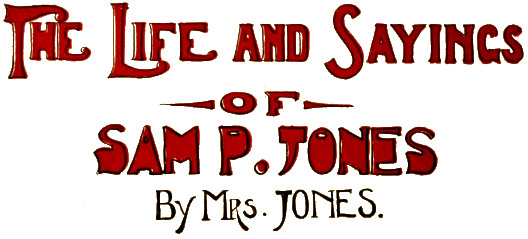
Why Sam Jones Appealed to the Masses With Whom He
Came in Contact.
1. He hated the sin, but he helped the sinner.
2. He thought an ounce of mirth was worth a pound of sighs in any market place.
3. He had no mercy for the Pecksniffs of this world, and punctured sham and hypocrisy with his keen wit.
4. He was himself a living exemplar of the truths he preached. From a member of the “Down-and-Out Club” he raised himself to a prophet of light.
5. He preached and proved the optimistic lesson that life is livable; for he foresaw the day when Death, the slayer, shall himself lie slain.
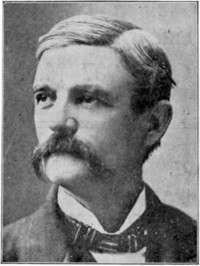
6. He never forgot that Christianity was a religion of joy and laughter, not one of tears and sorrow; a living help for this earth, now and here, and not a bundle of dried and moldy dogmas.
7. He was a man of and for the people.
8. He was a humanitarian in every sense that the word implies.
9. With all his firmness and steadfastness of purpose and conviction he was gentle, tender and kind in the truest sense.
10. Above all, he was a man.
Only Authorized Edition.
AGENTS COIN MONEY.
HANDSOME OUTFIT, 50 CENTS.
CIRCULARS FREE.
Big Book, 91⁄2x7, Over 400 Pages; Half Morocco, $3.50,
Cloth, $2.50; Postpaid. Order Today.
J. L. NICHOLS & COMPANY
930 Austell Building,
Atlanta, Georgia
Image of back cover
The Life and Sayings
OF
SAM P. JONES
By Mrs. JONES.
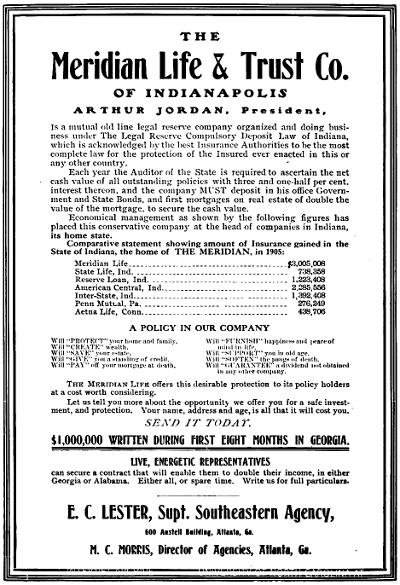
Return to advertisement
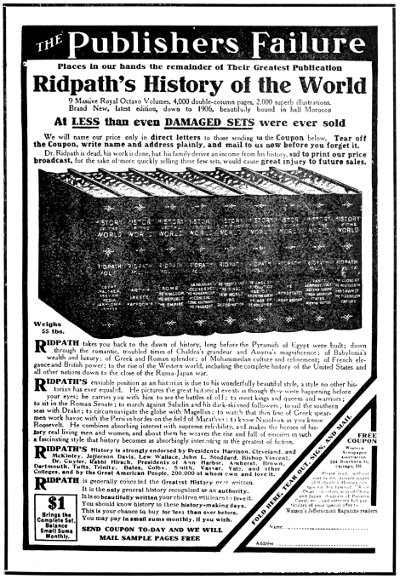
Return to advertisement
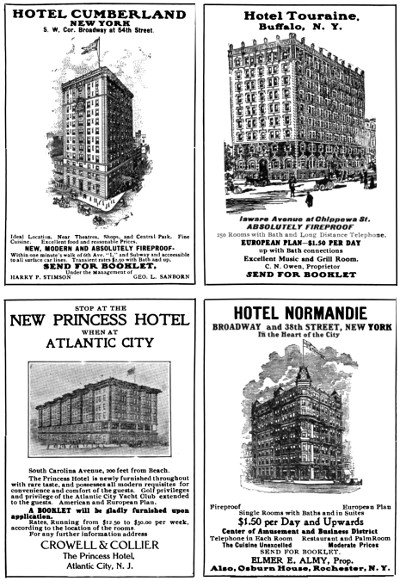
Return to advertisement
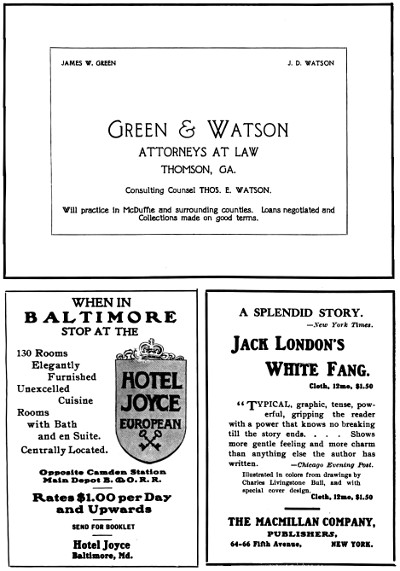
Return to advertisement
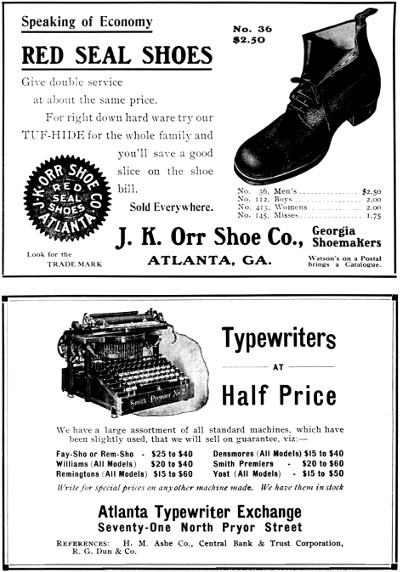
Return to advertisement
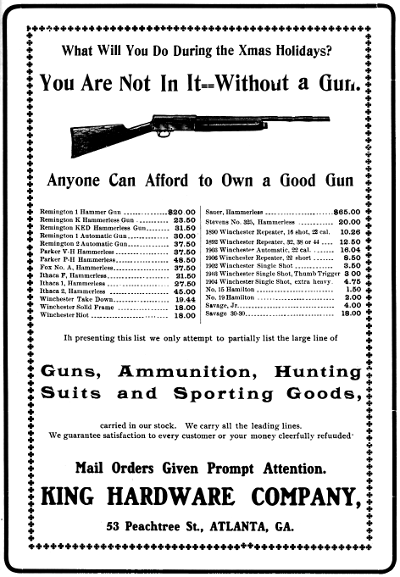
Return to advertisement
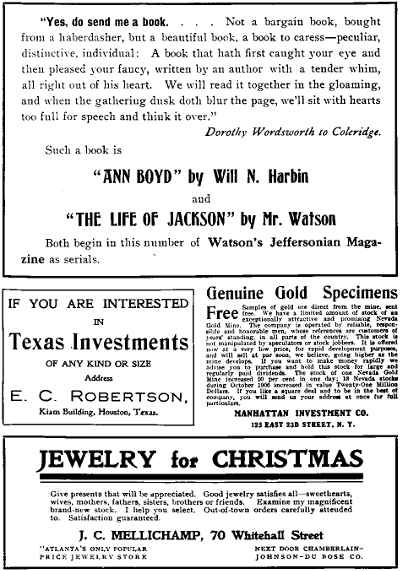
Return to advertisement
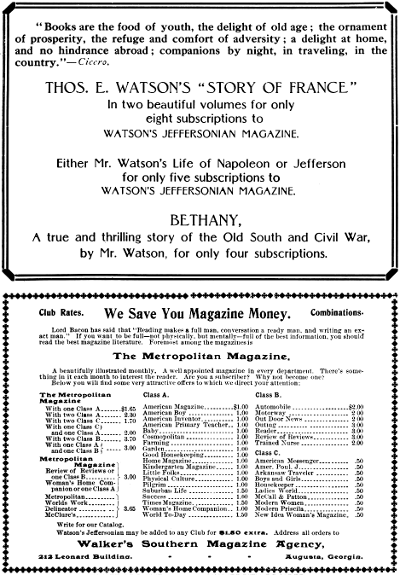
Return to advertisement
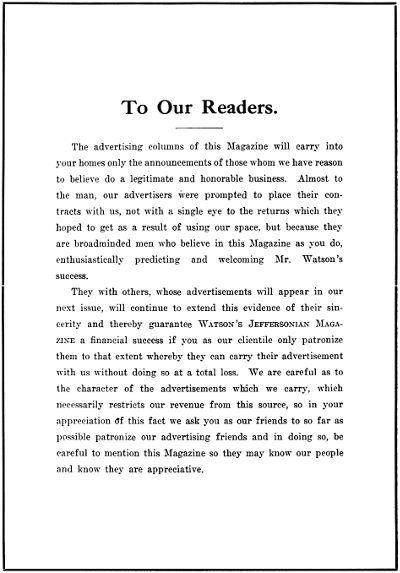
Return to advertisement
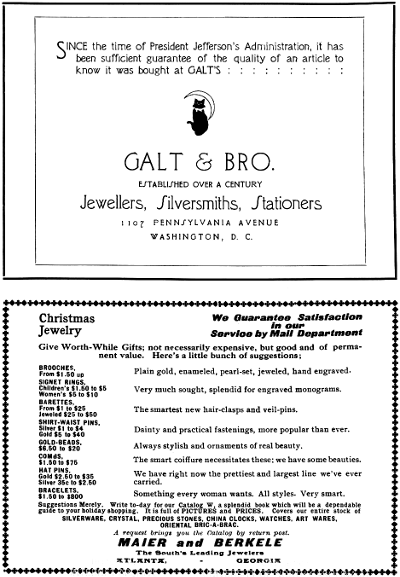
Return to advertisement
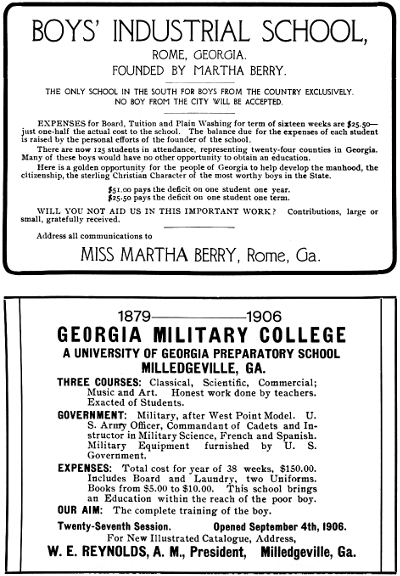
Return to advertisement
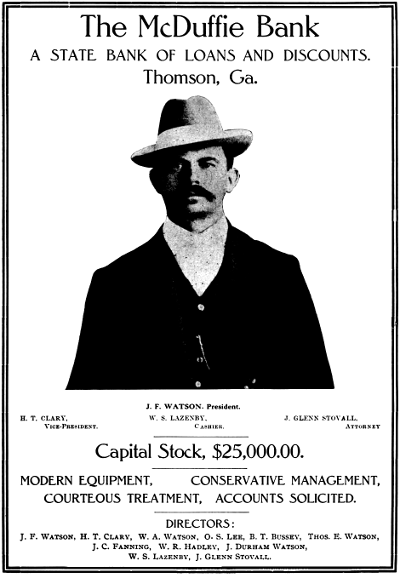
Return to advertisement
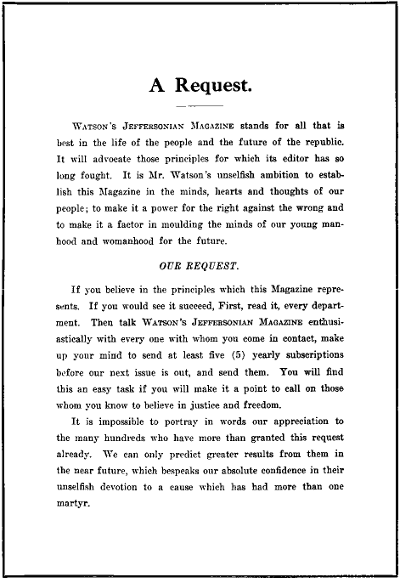
Return to advertisement
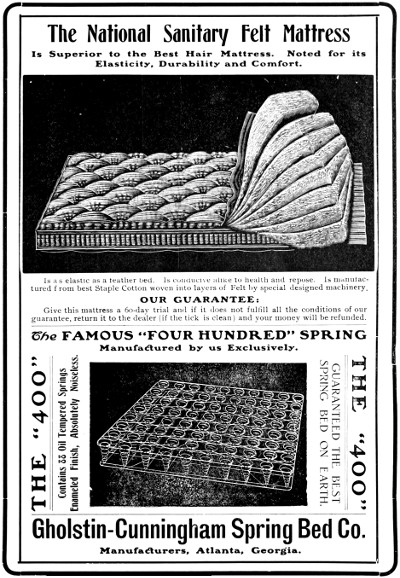
Return to advertisement
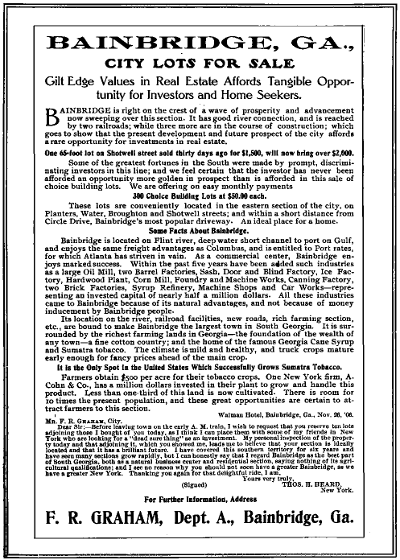
Return to advertisement
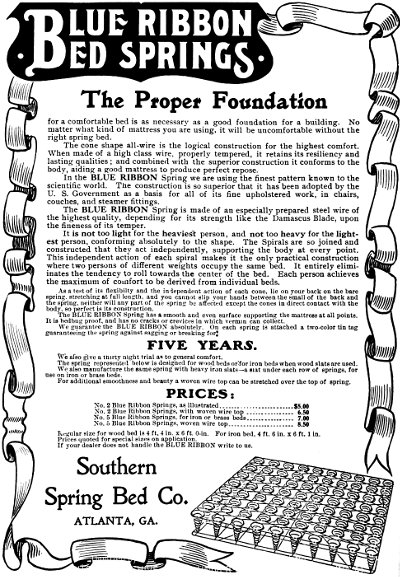
Return to advertisement
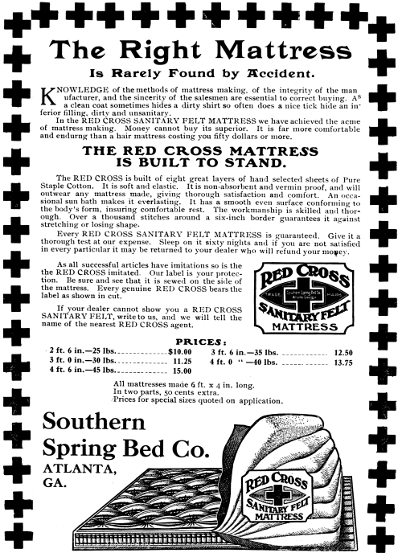
Return to advertisement
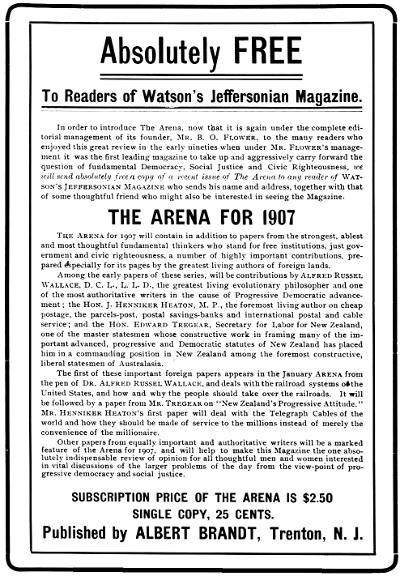
Return to advertisement
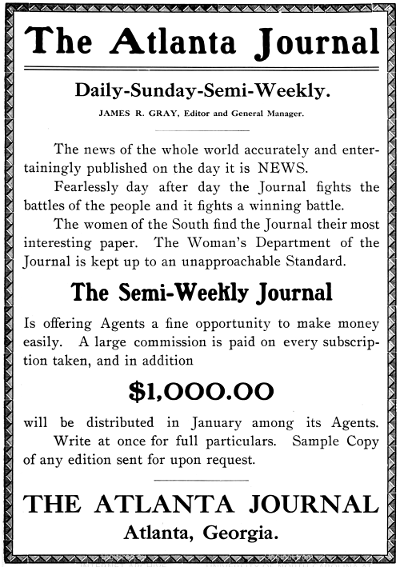
Return to advertisement
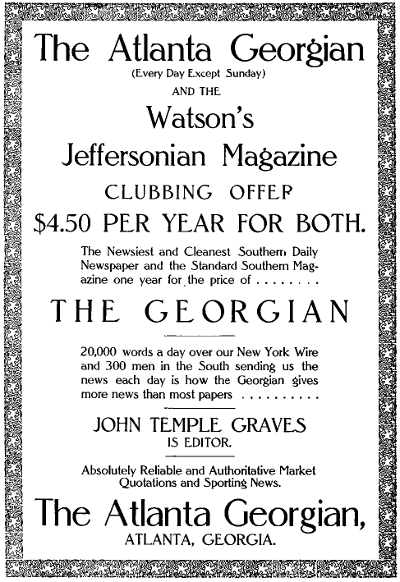
Return to advertisement
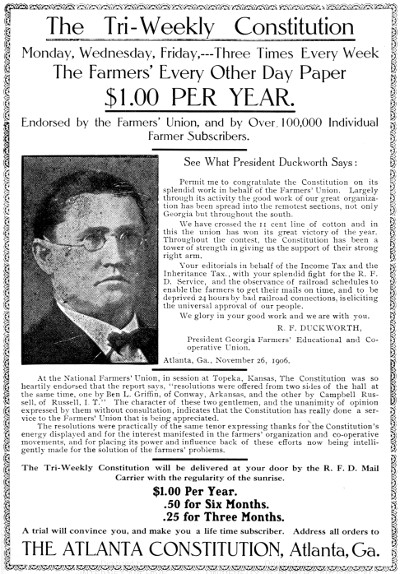
Return to advertisement
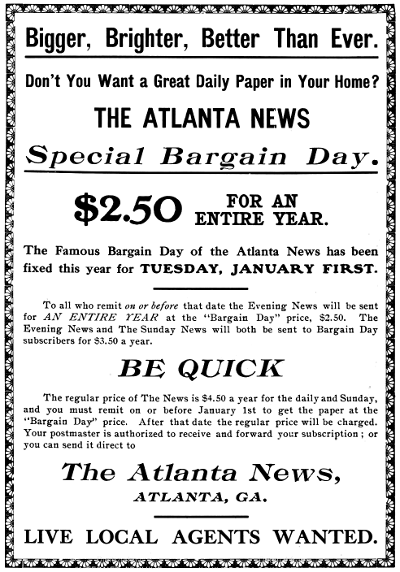
Return to advertisement
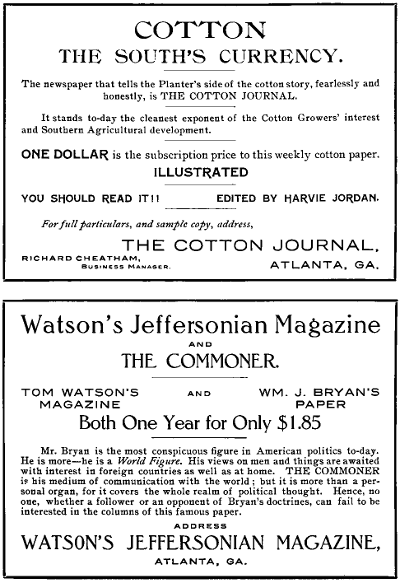
Return to advertisement
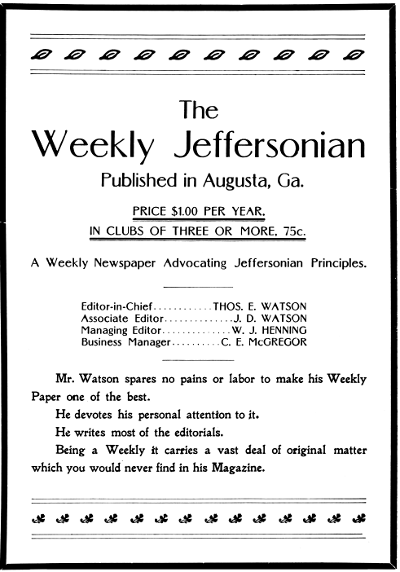
Return to advertisement
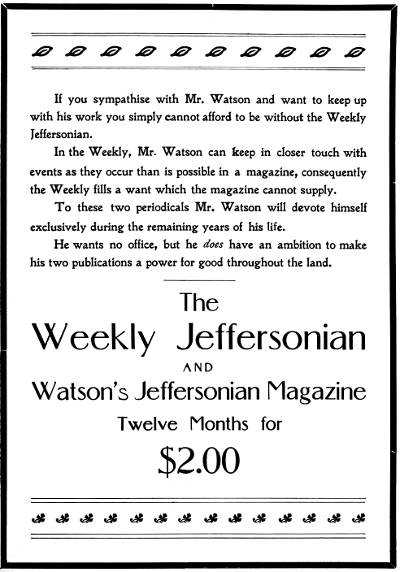
Return to advertisement
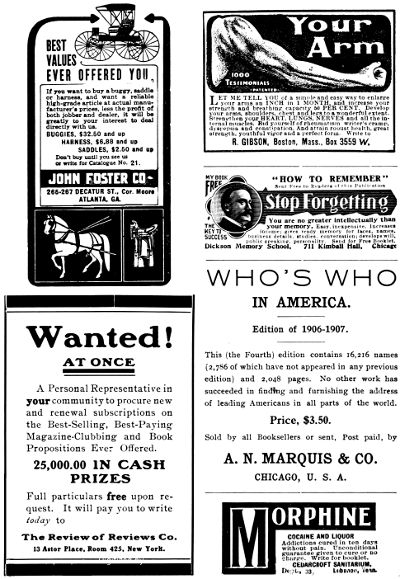
Return to advertisement
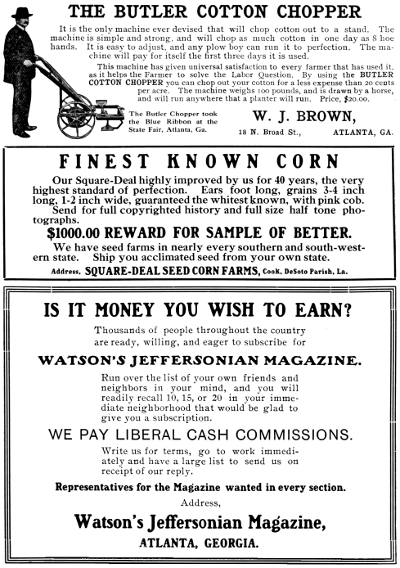
Return to advertisement
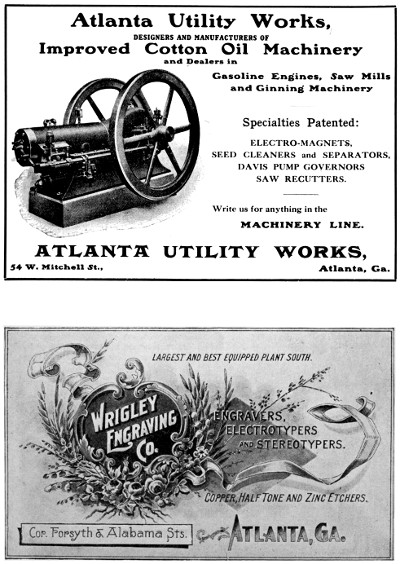
Return to advertisement
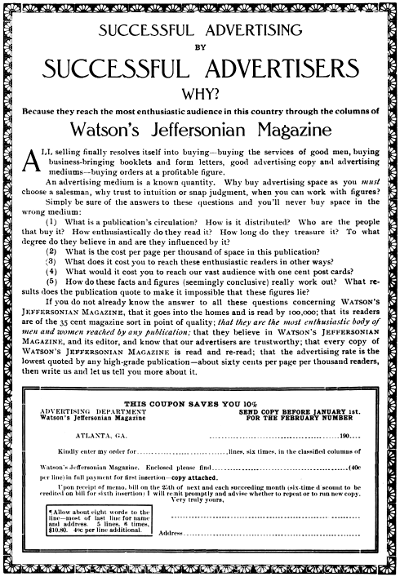
Return to advertisement
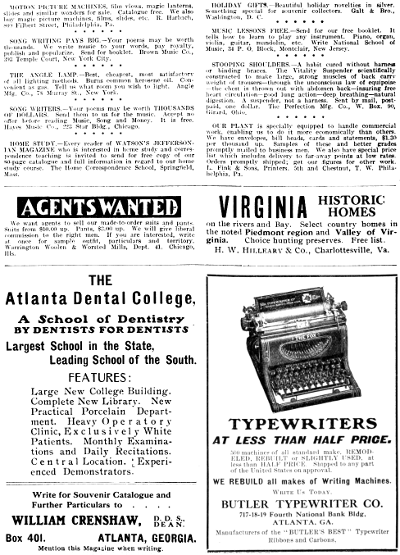
Return to advertisement
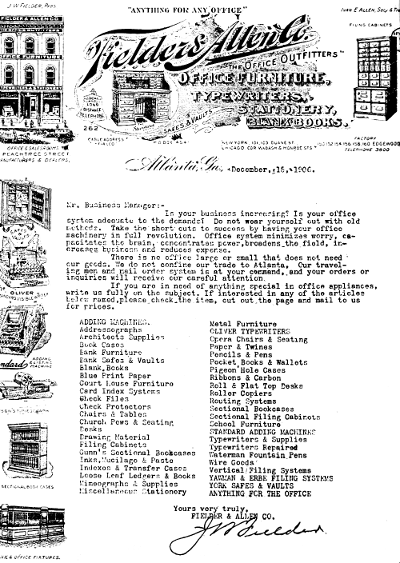
Return to advertisement
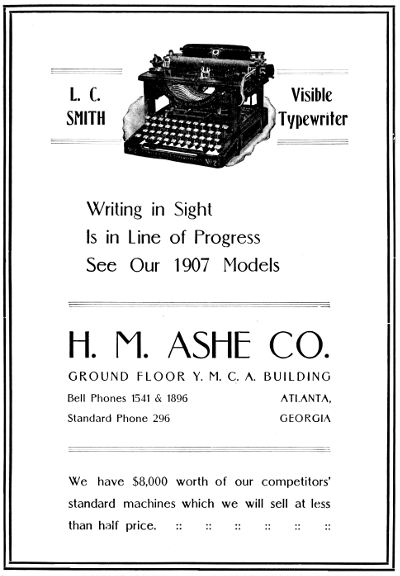
Return to advertisement
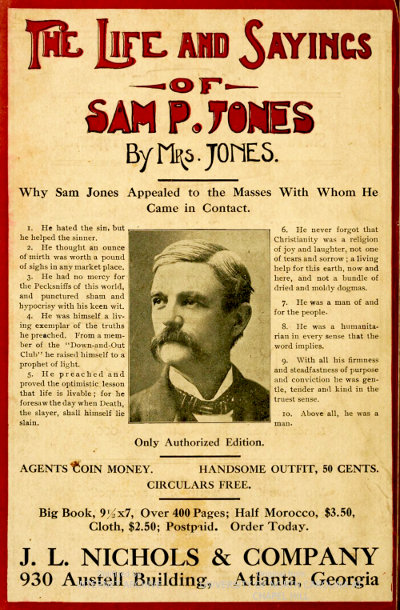
Return to back cover
Inconsistent, archaic and unusual spelling and hyphenation have not been corrected or standardised, unless listed below. (The spelling of) non-English names, words and phrases have not been corrected, unless mentioned below.
Text inside a dotted box has been transcribed for the sake of clarity from the illustration underneath which it is presented. Where the quality of the scans allows, and where there is a lack of detail in the small illustrations of this e-text, hyperlinks to larger illustrations have been provided (not available in all formats).
At the end of the text, the advertisements (other than the text-only ones) have been inserted as images. The lay-out of the advertisements in the text has been simplified somewhat.
Depending on the hard- and software used and their settings, not all elements (in particular in the advertising sections) may display as intended.
Front advertisement section: Red Seal Shoes advertisement: hard ware and Boys, Womens, Misses: as printed in the source document.
Pages 1 and 105, Prosper Merimee: as printed in the source document, actually Prosper Mérimée.
Page 8/9: the primeval forest off these old red hills: as printed in the source document.
Page 37, ... leader. * * *: as printed in the source document; possibly intended to be a thought break similar to others on this and other pages.
Page 65, ... may be imposed for ever day ...: probably an error for ... may be imposed for every day ...
Page 91, Life and Times of Andrew Jackson: there is no (heading for) Chapter I.
Page 109, La victoire est nous!: more commonly La victoire est à nous!
Page 111, Qu’allais-je faire dens cette galere? As printed in the source document (should be ... dans cette galère).
Rear advertisement section: Bainbridge advertisement: the Waiman Hotel was actually called the Wainman Hotel; Fielder & Allen advertisement: tre is probably (an abbreviation for) treasurer (the remainder of the word as printed has disappeared in the book’s gutter).
Changes
Some obvious minor typographical and punctuation errors have been corrected silently.
Some ditto symbols have been replaced with the dittoed text.
Front advertisement section: laware Avenue changed to Delaware Avenue; To Our Readers: clientile changed to clientele.
Page 4: my friends changed to my friends.
Page 47: Sugar Trust-ims changed to Sugar Trust-isms; aristocritic brute changed to aristocratic brute.
Page 54: George B. Cartelyou changed to George B. Cortelyou.
Page 57: to present all the states changed to to present to all the states.
Page 83: she same changed to she came.
Page 91, Note: moved to directly under the paragraph in which it is referenced.
Page 106: moveover changed to moreover.
Page 107: cried he Englishman changed to cried the Englishman; without offering any thinks changed to without offering any thanks.
Page 117: fronties changed to frontiers.
Page 121: Pertinent Question changed to Pertinent Questions.
Page 127: Wordworth changed to Wordsworth.
Page 133: is this issue changed to in this issue.
Rear advertisement section: Buena Bista Fruit Co. changed to Buena Vista Fruit Co.; T. W. Philahelphia changed to T. W. Philadelphia; Classified ads: Medidian, Miss. changed to Meridian, Miss.
End of Project Gutenberg's Watson's Jeffersonian Magazine, by Various
*** END OF THIS PROJECT GUTENBERG EBOOK WATSON'S JEFFERSONIAN MAGAZINE ***
***** This file should be named 62535-h.htm or 62535-h.zip *****
This and all associated files of various formats will be found in:
http://www.gutenberg.org/6/2/5/3/62535/
Produced by hekula03, Harry Lame and the Online Distributed
Proofreading Team at https://www.pgdp.net (This book was
produced from images made available by the HathiTrust
Digital Library.)
Updated editions will replace the previous one--the old editions will
be renamed.
Creating the works from print editions not protected by U.S. copyright
law means that no one owns a United States copyright in these works,
so the Foundation (and you!) can copy and distribute it in the United
States without permission and without paying copyright
royalties. Special rules, set forth in the General Terms of Use part
of this license, apply to copying and distributing Project
Gutenberg-tm electronic works to protect the PROJECT GUTENBERG-tm
concept and trademark. Project Gutenberg is a registered trademark,
and may not be used if you charge for the eBooks, unless you receive
specific permission. If you do not charge anything for copies of this
eBook, complying with the rules is very easy. You may use this eBook
for nearly any purpose such as creation of derivative works, reports,
performances and research. They may be modified and printed and given
away--you may do practically ANYTHING in the United States with eBooks
not protected by U.S. copyright law. Redistribution is subject to the
trademark license, especially commercial redistribution.
START: FULL LICENSE
THE FULL PROJECT GUTENBERG LICENSE
PLEASE READ THIS BEFORE YOU DISTRIBUTE OR USE THIS WORK
To protect the Project Gutenberg-tm mission of promoting the free
distribution of electronic works, by using or distributing this work
(or any other work associated in any way with the phrase "Project
Gutenberg"), you agree to comply with all the terms of the Full
Project Gutenberg-tm License available with this file or online at
www.gutenberg.org/license.
Section 1. General Terms of Use and Redistributing Project
Gutenberg-tm electronic works
1.A. By reading or using any part of this Project Gutenberg-tm
electronic work, you indicate that you have read, understand, agree to
and accept all the terms of this license and intellectual property
(trademark/copyright) agreement. If you do not agree to abide by all
the terms of this agreement, you must cease using and return or
destroy all copies of Project Gutenberg-tm electronic works in your
possession. If you paid a fee for obtaining a copy of or access to a
Project Gutenberg-tm electronic work and you do not agree to be bound
by the terms of this agreement, you may obtain a refund from the
person or entity to whom you paid the fee as set forth in paragraph
1.E.8.
1.B. "Project Gutenberg" is a registered trademark. It may only be
used on or associated in any way with an electronic work by people who
agree to be bound by the terms of this agreement. There are a few
things that you can do with most Project Gutenberg-tm electronic works
even without complying with the full terms of this agreement. See
paragraph 1.C below. There are a lot of things you can do with Project
Gutenberg-tm electronic works if you follow the terms of this
agreement and help preserve free future access to Project Gutenberg-tm
electronic works. See paragraph 1.E below.
1.C. The Project Gutenberg Literary Archive Foundation ("the
Foundation" or PGLAF), owns a compilation copyright in the collection
of Project Gutenberg-tm electronic works. Nearly all the individual
works in the collection are in the public domain in the United
States. If an individual work is unprotected by copyright law in the
United States and you are located in the United States, we do not
claim a right to prevent you from copying, distributing, performing,
displaying or creating derivative works based on the work as long as
all references to Project Gutenberg are removed. Of course, we hope
that you will support the Project Gutenberg-tm mission of promoting
free access to electronic works by freely sharing Project Gutenberg-tm
works in compliance with the terms of this agreement for keeping the
Project Gutenberg-tm name associated with the work. You can easily
comply with the terms of this agreement by keeping this work in the
same format with its attached full Project Gutenberg-tm License when
you share it without charge with others.
1.D. The copyright laws of the place where you are located also govern
what you can do with this work. Copyright laws in most countries are
in a constant state of change. If you are outside the United States,
check the laws of your country in addition to the terms of this
agreement before downloading, copying, displaying, performing,
distributing or creating derivative works based on this work or any
other Project Gutenberg-tm work. The Foundation makes no
representations concerning the copyright status of any work in any
country outside the United States.
1.E. Unless you have removed all references to Project Gutenberg:
1.E.1. The following sentence, with active links to, or other
immediate access to, the full Project Gutenberg-tm License must appear
prominently whenever any copy of a Project Gutenberg-tm work (any work
on which the phrase "Project Gutenberg" appears, or with which the
phrase "Project Gutenberg" is associated) is accessed, displayed,
performed, viewed, copied or distributed:
This eBook is for the use of anyone anywhere in the United States and
most other parts of the world at no cost and with almost no
restrictions whatsoever. You may copy it, give it away or re-use it
under the terms of the Project Gutenberg License included with this
eBook or online at www.gutenberg.org. If you are not located in the
United States, you'll have to check the laws of the country where you
are located before using this ebook.
1.E.2. If an individual Project Gutenberg-tm electronic work is
derived from texts not protected by U.S. copyright law (does not
contain a notice indicating that it is posted with permission of the
copyright holder), the work can be copied and distributed to anyone in
the United States without paying any fees or charges. If you are
redistributing or providing access to a work with the phrase "Project
Gutenberg" associated with or appearing on the work, you must comply
either with the requirements of paragraphs 1.E.1 through 1.E.7 or
obtain permission for the use of the work and the Project Gutenberg-tm
trademark as set forth in paragraphs 1.E.8 or 1.E.9.
1.E.3. If an individual Project Gutenberg-tm electronic work is posted
with the permission of the copyright holder, your use and distribution
must comply with both paragraphs 1.E.1 through 1.E.7 and any
additional terms imposed by the copyright holder. Additional terms
will be linked to the Project Gutenberg-tm License for all works
posted with the permission of the copyright holder found at the
beginning of this work.
1.E.4. Do not unlink or detach or remove the full Project Gutenberg-tm
License terms from this work, or any files containing a part of this
work or any other work associated with Project Gutenberg-tm.
1.E.5. Do not copy, display, perform, distribute or redistribute this
electronic work, or any part of this electronic work, without
prominently displaying the sentence set forth in paragraph 1.E.1 with
active links or immediate access to the full terms of the Project
Gutenberg-tm License.
1.E.6. You may convert to and distribute this work in any binary,
compressed, marked up, nonproprietary or proprietary form, including
any word processing or hypertext form. However, if you provide access
to or distribute copies of a Project Gutenberg-tm work in a format
other than "Plain Vanilla ASCII" or other format used in the official
version posted on the official Project Gutenberg-tm web site
(www.gutenberg.org), you must, at no additional cost, fee or expense
to the user, provide a copy, a means of exporting a copy, or a means
of obtaining a copy upon request, of the work in its original "Plain
Vanilla ASCII" or other form. Any alternate format must include the
full Project Gutenberg-tm License as specified in paragraph 1.E.1.
1.E.7. Do not charge a fee for access to, viewing, displaying,
performing, copying or distributing any Project Gutenberg-tm works
unless you comply with paragraph 1.E.8 or 1.E.9.
1.E.8. You may charge a reasonable fee for copies of or providing
access to or distributing Project Gutenberg-tm electronic works
provided that
* You pay a royalty fee of 20% of the gross profits you derive from
the use of Project Gutenberg-tm works calculated using the method
you already use to calculate your applicable taxes. The fee is owed
to the owner of the Project Gutenberg-tm trademark, but he has
agreed to donate royalties under this paragraph to the Project
Gutenberg Literary Archive Foundation. Royalty payments must be paid
within 60 days following each date on which you prepare (or are
legally required to prepare) your periodic tax returns. Royalty
payments should be clearly marked as such and sent to the Project
Gutenberg Literary Archive Foundation at the address specified in
Section 4, "Information about donations to the Project Gutenberg
Literary Archive Foundation."
* You provide a full refund of any money paid by a user who notifies
you in writing (or by e-mail) within 30 days of receipt that s/he
does not agree to the terms of the full Project Gutenberg-tm
License. You must require such a user to return or destroy all
copies of the works possessed in a physical medium and discontinue
all use of and all access to other copies of Project Gutenberg-tm
works.
* You provide, in accordance with paragraph 1.F.3, a full refund of
any money paid for a work or a replacement copy, if a defect in the
electronic work is discovered and reported to you within 90 days of
receipt of the work.
* You comply with all other terms of this agreement for free
distribution of Project Gutenberg-tm works.
1.E.9. If you wish to charge a fee or distribute a Project
Gutenberg-tm electronic work or group of works on different terms than
are set forth in this agreement, you must obtain permission in writing
from both the Project Gutenberg Literary Archive Foundation and The
Project Gutenberg Trademark LLC, the owner of the Project Gutenberg-tm
trademark. Contact the Foundation as set forth in Section 3 below.
1.F.
1.F.1. Project Gutenberg volunteers and employees expend considerable
effort to identify, do copyright research on, transcribe and proofread
works not protected by U.S. copyright law in creating the Project
Gutenberg-tm collection. Despite these efforts, Project Gutenberg-tm
electronic works, and the medium on which they may be stored, may
contain "Defects," such as, but not limited to, incomplete, inaccurate
or corrupt data, transcription errors, a copyright or other
intellectual property infringement, a defective or damaged disk or
other medium, a computer virus, or computer codes that damage or
cannot be read by your equipment.
1.F.2. LIMITED WARRANTY, DISCLAIMER OF DAMAGES - Except for the "Right
of Replacement or Refund" described in paragraph 1.F.3, the Project
Gutenberg Literary Archive Foundation, the owner of the Project
Gutenberg-tm trademark, and any other party distributing a Project
Gutenberg-tm electronic work under this agreement, disclaim all
liability to you for damages, costs and expenses, including legal
fees. YOU AGREE THAT YOU HAVE NO REMEDIES FOR NEGLIGENCE, STRICT
LIABILITY, BREACH OF WARRANTY OR BREACH OF CONTRACT EXCEPT THOSE
PROVIDED IN PARAGRAPH 1.F.3. YOU AGREE THAT THE FOUNDATION, THE
TRADEMARK OWNER, AND ANY DISTRIBUTOR UNDER THIS AGREEMENT WILL NOT BE
LIABLE TO YOU FOR ACTUAL, DIRECT, INDIRECT, CONSEQUENTIAL, PUNITIVE OR
INCIDENTAL DAMAGES EVEN IF YOU GIVE NOTICE OF THE POSSIBILITY OF SUCH
DAMAGE.
1.F.3. LIMITED RIGHT OF REPLACEMENT OR REFUND - If you discover a
defect in this electronic work within 90 days of receiving it, you can
receive a refund of the money (if any) you paid for it by sending a
written explanation to the person you received the work from. If you
received the work on a physical medium, you must return the medium
with your written explanation. The person or entity that provided you
with the defective work may elect to provide a replacement copy in
lieu of a refund. If you received the work electronically, the person
or entity providing it to you may choose to give you a second
opportunity to receive the work electronically in lieu of a refund. If
the second copy is also defective, you may demand a refund in writing
without further opportunities to fix the problem.
1.F.4. Except for the limited right of replacement or refund set forth
in paragraph 1.F.3, this work is provided to you 'AS-IS', WITH NO
OTHER WARRANTIES OF ANY KIND, EXPRESS OR IMPLIED, INCLUDING BUT NOT
LIMITED TO WARRANTIES OF MERCHANTABILITY OR FITNESS FOR ANY PURPOSE.
1.F.5. Some states do not allow disclaimers of certain implied
warranties or the exclusion or limitation of certain types of
damages. If any disclaimer or limitation set forth in this agreement
violates the law of the state applicable to this agreement, the
agreement shall be interpreted to make the maximum disclaimer or
limitation permitted by the applicable state law. The invalidity or
unenforceability of any provision of this agreement shall not void the
remaining provisions.
1.F.6. INDEMNITY - You agree to indemnify and hold the Foundation, the
trademark owner, any agent or employee of the Foundation, anyone
providing copies of Project Gutenberg-tm electronic works in
accordance with this agreement, and any volunteers associated with the
production, promotion and distribution of Project Gutenberg-tm
electronic works, harmless from all liability, costs and expenses,
including legal fees, that arise directly or indirectly from any of
the following which you do or cause to occur: (a) distribution of this
or any Project Gutenberg-tm work, (b) alteration, modification, or
additions or deletions to any Project Gutenberg-tm work, and (c) any
Defect you cause.
Section 2. Information about the Mission of Project Gutenberg-tm
Project Gutenberg-tm is synonymous with the free distribution of
electronic works in formats readable by the widest variety of
computers including obsolete, old, middle-aged and new computers. It
exists because of the efforts of hundreds of volunteers and donations
from people in all walks of life.
Volunteers and financial support to provide volunteers with the
assistance they need are critical to reaching Project Gutenberg-tm's
goals and ensuring that the Project Gutenberg-tm collection will
remain freely available for generations to come. In 2001, the Project
Gutenberg Literary Archive Foundation was created to provide a secure
and permanent future for Project Gutenberg-tm and future
generations. To learn more about the Project Gutenberg Literary
Archive Foundation and how your efforts and donations can help, see
Sections 3 and 4 and the Foundation information page at
www.gutenberg.org Section 3. Information about the Project Gutenberg
Literary Archive Foundation
The Project Gutenberg Literary Archive Foundation is a non profit
501(c)(3) educational corporation organized under the laws of the
state of Mississippi and granted tax exempt status by the Internal
Revenue Service. The Foundation's EIN or federal tax identification
number is 64-6221541. Contributions to the Project Gutenberg Literary
Archive Foundation are tax deductible to the full extent permitted by
U.S. federal laws and your state's laws.
The Foundation's principal office is in Fairbanks, Alaska, with the
mailing address: PO Box 750175, Fairbanks, AK 99775, but its
volunteers and employees are scattered throughout numerous
locations. Its business office is located at 809 North 1500 West, Salt
Lake City, UT 84116, (801) 596-1887. Email contact links and up to
date contact information can be found at the Foundation's web site and
official page at www.gutenberg.org/contact
For additional contact information:
Dr. Gregory B. Newby
Chief Executive and Director
gbnewby@pglaf.org
Section 4. Information about Donations to the Project Gutenberg
Literary Archive Foundation
Project Gutenberg-tm depends upon and cannot survive without wide
spread public support and donations to carry out its mission of
increasing the number of public domain and licensed works that can be
freely distributed in machine readable form accessible by the widest
array of equipment including outdated equipment. Many small donations
($1 to $5,000) are particularly important to maintaining tax exempt
status with the IRS.
The Foundation is committed to complying with the laws regulating
charities and charitable donations in all 50 states of the United
States. Compliance requirements are not uniform and it takes a
considerable effort, much paperwork and many fees to meet and keep up
with these requirements. We do not solicit donations in locations
where we have not received written confirmation of compliance. To SEND
DONATIONS or determine the status of compliance for any particular
state visit www.gutenberg.org/donate
While we cannot and do not solicit contributions from states where we
have not met the solicitation requirements, we know of no prohibition
against accepting unsolicited donations from donors in such states who
approach us with offers to donate.
International donations are gratefully accepted, but we cannot make
any statements concerning tax treatment of donations received from
outside the United States. U.S. laws alone swamp our small staff.
Please check the Project Gutenberg Web pages for current donation
methods and addresses. Donations are accepted in a number of other
ways including checks, online payments and credit card donations. To
donate, please visit: www.gutenberg.org/donate
Section 5. General Information About Project Gutenberg-tm electronic works.
Professor Michael S. Hart was the originator of the Project
Gutenberg-tm concept of a library of electronic works that could be
freely shared with anyone. For forty years, he produced and
distributed Project Gutenberg-tm eBooks with only a loose network of
volunteer support.
Project Gutenberg-tm eBooks are often created from several printed
editions, all of which are confirmed as not protected by copyright in
the U.S. unless a copyright notice is included. Thus, we do not
necessarily keep eBooks in compliance with any particular paper
edition.
Most people start at our Web site which has the main PG search
facility: www.gutenberg.org
This Web site includes information about Project Gutenberg-tm,
including how to make donations to the Project Gutenberg Literary
Archive Foundation, how to help produce our new eBooks, and how to
subscribe to our email newsletter to hear about new eBooks.